
blog
Recent blog post

Can You Sue an Assisted Living Facility for Wrongful Death in Florida?
Losing a loved one is already a masterclass in misery. Add the possibility that their death could have been prevented, and grief morphs into something darker, a cocktail of anger and unanswered questions.
Families who entrust their relatives to assisted living facilities do so with the hope of safety, dignity, and at least a baseline of competence. However, when that trust is broken, the fallout feels like betrayal disguised as tragedy.
And this leads to the question no one wants to ask but everyone deserves an answer to, can you actually sue an assisted living facility for wrongful death?
If you’d rather skip my rambling paragraphs and hear it straight from Robert Johnson at Carter Injury Law, here’s a short video of your questions questions .
Now that you’ve seen Robert explain the basics, let’s break down exactly what counts as wrongful death in Florida and what families can do next.
1) What Counts as Wrongful Death in an Assisted Living Facility?
In Florida, a wrongful death is a legal definition. It applies when someone dies because another party was negligent, reckless, or outright abusive. Assisted living facilities don’t get a free pass just because they market themselves with brochures full of smiling grandmas playing bingo. They still owe residents a basic standard of care, and when that care collapses, the consequences can be fatal.
A study by the U.S. Government Accountability Office found that over 82% of nursing homes were cited for infection control deficiencies in recent years. If nursing homes are fumbling infection control at that scale, it doesn’t take much imagination to see how similar lapses in assisted living could lead to preventable deaths.
In the context of assisted living facilities, wrongful death could stem from failures like:
Lack of supervision, allowing residents to wander, fall, or suffer unnoticed emergencies.
Ignoring or delaying responses to medical needs, infections, or dehydration.
Creating unsafe living environments, from poor maintenance to hazardous conditions.
Neglecting clear signs of distress that any attentive caregiver should have caught.
Families who hand over their loved ones to these facilities aren’t asking for miracles. They’re asking for competence, safety, and some basic human decency. Florida law agrees that when those standards crumble, accountability is a right.
2) Is There a Difference Between Nursing Homes and Assisted Living Facilities?
People often lump assisted living facilities and nursing homes into the same depressing category, as if they’re interchangeable warehouses for the elderly. However, there’s an important difference, at least on paper.
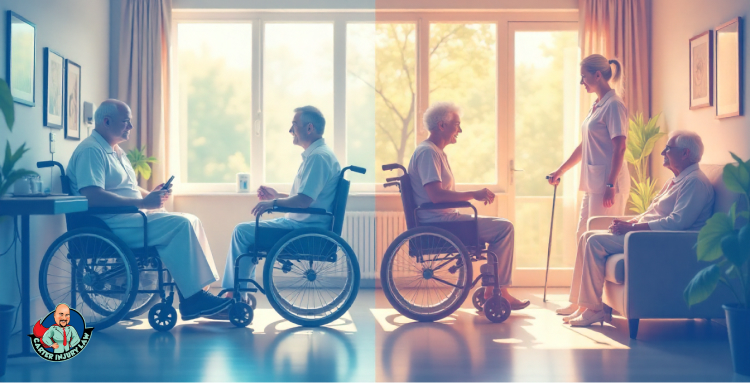
Nursing homes are healthcare facilities. They are staffed and equipped to provide ongoing medical care, which includes medication administration and chronic illness management.
Assisted living facilities are designed to be a step down, providing assistance with daily living needs such as meals, hygiene, and supervision but not 24-hour medical care.
That distinction sounds neat in theory. In practice, it’s a blurry mess. Families put their trust in assisted living because they believe the facility will keep residents safe, even if it’s not a hospital. Yet, if the staff shrugs off emergencies, ignores medication schedules, or fails to notice obvious distress, that “step down” in care can become a nosedive into tragedy.
Assisted living facilities don’t get to play the “we’re not a medical center” card as a legal shield. Florida law still holds them accountable when negligence leads to wrongful death. And if you’ve ever watched how quickly small mistakes can snowball in fragile health, you know why that duty matters.
3) Who Can File a Wrongful Death Claim in Florida
Not everyone with a broken heart automatically has standing in court. Florida law is pretty specific about who gets to bring a wrongful death claim. The lawsuit has to be filed by the personal representative of the deceased’s estate, which sounds like an intimidating title but usually boils down to the person closest to the victim.
Typically, that means:
A surviving spouse.
An adult child.
A parent.
These representatives act on behalf of all eligible survivors, which means one person steps into the legal ring but the outcome affects the entire family. It’s less about who signs the papers and more about ensuring every loss, financial or emotional, is accounted for.
So if you’re wondering whether you can march into court with your grief and demand answers, the technical reply is maybe, but only if Florida law recognizes you as the one to do it. Otherwise, you’ll be cheering from the sidelines while the official representative carries the fight.
4) What You Can Actually Claim While You’re Busy Grieving

When a family files a wrongful death claim, it isn’t about putting a price tag on a life, it’s about holding a facility accountable for failing to provide the most basic standard of care. Florida law allows families to pursue compensation for a wide range of losses, both financial and emotional.
These damages often include:
Funeral and burial expenses.
Medical bills tied to the final illness or injury.
Loss of companionship and guidance.
Emotional pain and suffering.
Loss of financial support the deceased may have provided.
If those categories sound clinical, it’s because the law likes tidy boxes. Real grief is messier. A study published in The Gerontologist found that nearly 70% of family members of deceased nursing home residents reported significant emotional distress and lasting regret about the quality of care their loved one received.
That statistic doesn’t fit neatly on a claim form, but it underlines why legal accountability matters. Families aren’t just chasing money, they’re demanding acknowledgment that negligence caused harm that never should have happened.
Compensation, in this sense, becomes less about checks and balances and more about justice and closure. It’s a way of saying thatthis death mattered, and it should not have been inevitable.
5) The Clock Is Ticking and It’s Not on Your Side
Nobody who is grieving wants to think about how quickly time passes. Florida gives families just 2 years to file a wrongful death claim. That may sound like plenty of time, but grief has a way of eating months before you even realize the calendar has flipped.
Waiting too long can be disastrous. Facilities don’t exactly keep evidence gift-wrapped for you. Medical records can go missing, witness memories fade, and staff turnover turns key employees into untraceable ghosts. The sooner you act, the stronger the case.
Florida law isn’t trying to rush you through mourning, but it does force a deadline. Two years may be generous if you’re applying for a gym membership, but for a legal fight that requires collecting records, interviewing witnesses, and untangling a facility’s failures, it’s a blink.
So while it feels almost cruel to worry about paperwork while you’re grieving, the statute of limitations makes speed non-negotiable. If you wait, you risk losing not only your case but also the chance to hold anyone accountable at all.
6) Let Us Handle the Legal Dumpster Fire While You Breathe
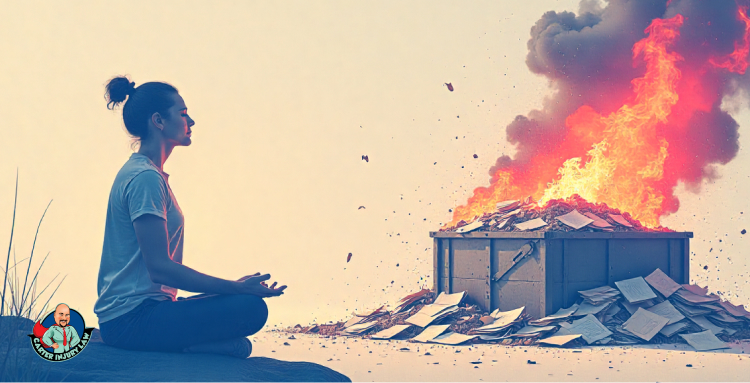
Let’s be honest, no family wants to spend their mourning period decoding Florida statutes or chasing down facility logs that mysteriously vanish when lawyers get involved. While you’re trying to process a loss, we take on the messy part, the evidence, the paperwork, and the legal chess match the facility will try to play.
Here’s what that actually means:
We investigate the circumstances thoroughly, pulling medical records, facility reports, and witness statements.
We build a case that connects the dots between negligence and loss, because facilities rarely admit fault with a polite press release.
We make sure deadlines, filings, and all the procedural headaches are handled so you don’t have to.
And in case you’re wondering if you’ll be bankrupted by legal fees on top of funeral costs, no, you won’t. Carter Injury Law works on a contingency basis, which means you don’t pay unless we win. The consultation is free, the advice is confidential, and the goal is simple, justice for your family and accountability for theirs.
Grief is enough of a burden. Let us handle the fight.

Motorcycle Crash Evidence and what Riders Must Document (Beyond Photos)
In Florida, a motorcycle crash rarely ends at the roadside. The real battle often begins later, inside an insurance office or a courtroom, where evidence carries more weight than memory. Riders who rely only on photos discover quickly that insurers want more than snapshots. They want context, corroboration, and documentation that can withstand scrutiny.
The difference between fair compensation and financial loss often comes down to what a rider captures in the critical hours after a crash. And most riders miss the one category of evidence that can decide everything.
1) Police Reports, The Baseline of Every Claim
The first document that shapes any motorcycle accident claim in Florida is the police report. Even in collisions that seem minor, riders should never leave the scene without law enforcement involvement. An officer’s account is more than a formality, it becomes the foundation that insurers, attorneys, and courts rely on to reconstruct the event.
A strong police report often contains:
Objective observations such as vehicle positions, skid marks, debris, and weather conditions.
Diagram of the crash scene that illustrates how vehicles came into contact.
Driver and witness statements which, while sometimes excluded from trial, help direct investigations.
Notations on traffic laws that were potentially violated, shaping early assessments of fault.
When insurers seek to reduce payouts, they comb through these reports line by line. Even if your health insurance has some limits, you may need uninsured motorist coverage. A missing detail, a vague description, or an incomplete diagram can shift leverage in their favor. Riders who understand the role of this report see it as more than paperwork, they see it as a shield.
Yet no matter how precise an officer’s notes may be, the story is never complete without the voices of those who witnessed the crash.
2) Witness Accounts, Voices That Corroborate
After a crash, riders often find themselves repeating the same line, “It happened so fast.” That reality makes witnesses critical. Independent voices can either reinforce or challenge your account, and in a legal setting, credibility often rests on more than just the rider’s perspective. A bystander’s words bring balance to a claim, filling gaps that no photo or diagram can capture.
When gathering witness information, focus on:
Names and contact details so they can be reached later if insurers or attorneys need statements.
Immediate recollections while the memory is fresh, before details fade or change.
Neutral perspectives from people unconnected to the riders, which tend to carry more weight with insurers and courts.
Research underscores how fragile memory can be after an accident. A study published by the National Center for Biotechnology Information found that nearly 50 percent of witnesses altered details in their recollection within a week of the event (NCBI, 2017). This is why securing statements for motorcycle accidents promptly is not just useful, it is essential.
Still, even the clearest voice can be challenged without physical proof. That is why the gear a rider wears, from helmet to gloves, often speaks louder than words.
3) Preserving Gear and the Motorcycle Itself
Every scrape on a helmet, every tear in a jacket, every dent on a motorcycle tells a story that words cannot. Riders often overlook the value of these items, rushing to repair or replace them. In Florida, that decision can cost them leverage. Damaged gear and the motorcycle itself are more than reminders of a bad day, they are evidence that helps experts measure speed, force, and angles of impact.

Key items worth preserving include:
Helmet and protective clothing which show the points of contact and severity of the crash.
Gloves and boots that can reveal impact angles and ground friction.
The motorcycle in its post-crash condition, with dents, broken parts, and fluid leaks recorded before repairs begin.
Attorneys often use these items alongside accident reconstruction experts, turning physical damage into technical testimony. This evidence can rebut claims that a rider was reckless or that injuries were exaggerated.
But proof of impact only sets the stage. The next question is whether the injuries were real, immediate, and connected to the crash, and that is where medical records take center stage.
4) Medical Records and Economic Losses
A crash may last seconds, but the medical trail it creates can stretch for months. For riders in Florida, documenting that trail is not optional, it is the backbone of any injury claim. Doctors’ notes, imaging scans, therapy logs, and prescriptions do more than track recovery, they tie injuries directly to the accident. Without this link, insurers often argue that the harm came later or from another cause.
To build a credible record, riders should collect:
Emergency room and urgent care notes from the first visit.
Diagnostic tests such as X-rays, MRIs, and CT scans that objectively confirm injuries.
Treatment logs from physical therapy or rehabilitation clinics.
Prescriptions and bills that document both care and cost.
The financial side is just as important. Pay stubs, employer letters, or tax records help prove lost wages and reduced earning potential. When combined, medical and financial documentation give a full picture of the toll a crash takes.
The scale of the problem is striking. According to the National Highway Traffic Safety Administration, the average economic cost of a motorcycle crash injury in the United States is more than $17,000 per person, not including long-term medical care (NHTSA, 2019). For many riders, that number climbs far higher when rehabilitation and time off work are factored in.
Yet even the strongest medical file cannot tell the whole story. To capture what unfolded at the moment of impact, riders must look to technology and analysis that goes beyond the hospital.
5) Surveillance, Digital Trails, and Expert Analysis
Not every crash is witnessed in person, but many are recorded without riders realizing it. In Florida’s cities and suburbs, traffic cameras, storefront security systems, and even nearby doorbell cameras can capture the seconds that matter most. Riders who act quickly, or who work with an attorney who knows how to preserve footage, often uncover evidence that is impossible to dispute.
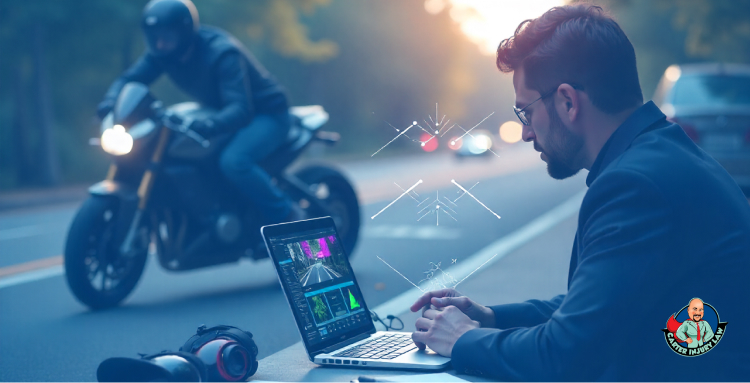
Sources of overlooked evidence include:
Business surveillance systems that may auto-delete footage within days.
Traffic and red-light cameras which can show vehicle speed and light timing.
Dashcams from other vehicles that provide an unfiltered angle of the crash.
Cell phone records of the other driver if distracted driving is suspected.
When paired with expert analysis, this material strengthens a case. Accident reconstruction specialists can measure skid marks, align impact points, and run computer models that translate physical data into clear explanations. For juries, what might seem like technical jargon becomes a visual map of cause and effect.
These layers of digital and expert-driven evidence give riders leverage, but they do not override the legal framework itself. Florida’s deadlines and comparative negligence rules can determine whether evidence even makes it into court, and that makes the law the next piece of the puzzle.
6) Deadlines and Comparative Negligence
Even the most carefully documented evidence means little if a rider misses the legal window to act. In Florida, the statute of limitations for motorcycle accident injury claims is two years from the date of the crash. Miss that deadline, and even the strongest case can collapse before it begins. For minors or special circumstances, the clock may run differently, but for most riders the countdown starts immediately.
Florida also applies a modified comparative negligence rule. This means:
If a rider is found more than 50 percent at fault, they cannot recover damages.
If the rider is less than 50 percent at fault, they can recover compensation, but it will be reduced by their share of responsibility.
Insurers often push this defense, pointing to speed, lane position, or gear use to shift blame.
This framework makes evidence more than supportive, it makes it decisive. Each photo, witness account, medical record, and expert report helps counter attempts to assign blame to the rider.
But even with the right documentation, riders rarely win these battles alone. At some point, evidence needs to be organized into a strategy, and that is where the right legal guidance turns raw facts into a winning claim.
7) Build a Case That Can Stand Up

The challenge is that most riders are not prepared to weave these threads into a legal case while trying to heal. Insurers know this, and they use delay, technicalities, and partial blame arguments to reduce what is owed. That is why guidance matters as much as documentation.
Carter Injury Law helps Florida riders take scattered records and turn them into a structured case. With a team that understands both the mechanics of a crash and the nuances of Florida law, they ensure no piece of evidence is wasted and no insurer holds the upper hand. For riders facing the aftermath of a crash, that level of preparation is not just an advantage, it is the difference between walking away with what is fair and walking away with less.
If you’ve been involved in a motorcycle crash in Florida, don’t leave your claim to chance. Contact Carter Injury Law today to protect your evidence, preserve your rights, and ensure your case is handled with the expertise it deserves. Your recovery starts with the steps you take now.

Deadly Staircase and Balcony Falls in Florida
Families rarely imagine that a simple fall could take someone’s life, yet across Florida these accidents happen in hotels, apartment complexes, shopping centers, and even vacation rentals. The aftermath is brutal. Loved ones are left reeling with grief, bills stack up overnight, and a single question takes hold: how could this have been allowed to happen?
The truth is, these tragedies are not always random. Property owners are legally bound to maintain safe premises. When they cut corners or ignore warning signs, the risk of disaster climbs. Loose handrails, poor lighting, crumbling steps, or outdated guardrails might sound like small issues, but they can make the difference between a safe evening and a fatal fall.
So when a family is left asking who should be held accountable, the law has an answer. The only question is whether someone failed to act before it was too late.
1) The Duty Every Property Owner Owes
Property owners in Florida carry a responsibility that goes far beyond collecting rent or hosting guests. Whether the building is a beachfront hotel, a suburban apartment complex, a bustling shopping center, or a trendy Airbnb, the law requires that these spaces remain safe for anyone who steps inside.
At the core of this duty is premises liability law, a set of rules that hold owners accountable if their negligence leads to injury or death. It is about reasonable care. If a hazard is visible, known, or should have been noticed, owners are expected to fix it before it turns into a life-threatening problem.
According to the Florida Department of Health, falls are the leading cause of injury-related death among adults over 65, with more than 3,000 deaths annually in the state. Nationwide, the toll reaches over 12,000 lives each year, and thousands more occur in shared or public spaces.
The list of what owners must monitor is not short:
Staircases must meet current building codes
Railings must be stable and regularly inspected
Broken or uneven steps must be repaired immediately
Lighting must be adequate to prevent hidden risks
Balconies must have guardrails at the required height
Each of these details seems small on its own, but together they decide whether a staircase is safe or a balcony becomes a death trap. And when a property owner cuts corners, the consequences can be irreparable.
If you’d rather set my words aside and hear it directly from Robert Johnson at Carter Injury Law, here’s the short video
2) Negligence, Plain and Simple
The law does not punish property owners for every accident. Instead, it asks a sharper question: did the owner know, or should they have known, about the danger? If the answer is yes, and they failed to act, that inaction is negligence.
Negligence is not always obvious, but it often hides in plain sight. The warning signs are there, but they get ignored until it is too late. Families left behind after a fall often discover that the hazard had been flagged before or was so clear that any responsible owner would have fixed it.
Common examples of negligence include:
Loose or missing handrails on staircases
Balcony guardrails that are too low to meet code
Stairs that are cracked, uneven, or dangerously slippery
Stairwells without lighting, leaving steps invisible at night
Outdated construction that fails modern safety standards

In Florida, these numbers are magnified by the state’s reliance on high-rise condos, hotels, and vacation rentals, where stairs and balconies are everywhere.
When owners overlook hazards like these, they are legally liable. And that liability can open the door to a wrongful death claim that forces them to answer for what happened.
3) When Corners Are Cut, Lives Are Lost
Accidents often start as ordinary moments, but when safety is ignored, the results can be devastating. Imagine someone staying in a beachfront condo, leaning casually against the balcony railing, only for it to give way. A single misstep, a moment of trust, and a life is lost. The tragedy is not always obvious until the investigation begins, and that is when liability comes into focus.
Or picture a guest at a restaurant, navigating a dark stairwell with no lighting and no handrail. One slip, one fall, and the outcome could be fatal. In situations like these, responsibility is rarely limited to one party. The property owner may be liable for failing to maintain safe conditions, the management company might share blame for neglecting inspections or repairs, and even a third-party contractor could be responsible if faulty construction or poor maintenance contributed to the hazard.
Our role is to carefully piece together the chain of events. We investigate, uncover who ignored warnings, and ensure accountability is assigned where it belongs.
4) The Cost for Families
When a deadly fall happens, the story does not end at the accident scene. For families, it is only the beginning of a long and painful aftermath. The grief is overwhelming, but layered on top of that are practical burdens that strike with equal force.
Medical expenses can start piling up immediately, especially if there was an emergency attempt to save the victim’s life. Even after death, families are faced with funeral and burial costs that can reach thousands of dollars within days. For many, this sudden financial blow comes at the exact moment they are least able to handle it.
The loss of income is another crushing weight. If the person who died was the primary earner, a household can go from stable to uncertain overnight. Spouses, children, and dependents are left without the financial support they relied on. According to the National Vital Statistics System, falls are among the top three causes of unintentional injury deaths in the United States, leaving thousands of families each year facing not only grief but financial devastation.
A wrongful death claim is designed to help recover these losses. Families may be entitled to compensation for:
Funeral and burial expenses
Outstanding medical bills
Loss of financial support and benefits
Pain and suffering
Emotional loss and companionship
It is not about replacing a loved one, because no amount of money can do that. It is about giving families the stability to move forward without being crushed under bills and uncertainty. Most importantly, it is about sending a clear message that negligence has consequences.
5) Why Accountability Matters
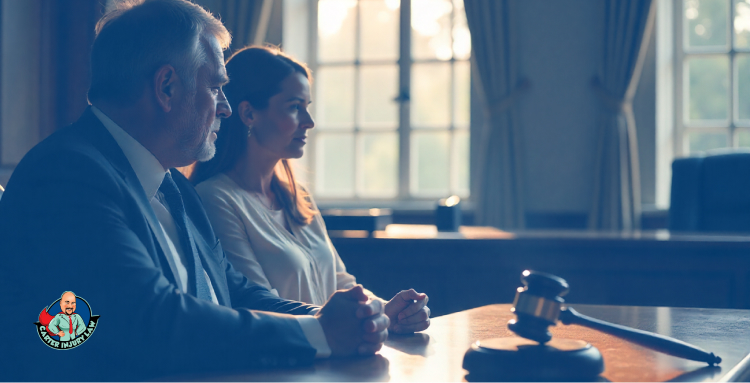
At first glance, a wrongful death claim looks like a personal fight for one grieving family. But the ripple effects stretch far beyond a single household. These cases are about accountability, and accountability changes behavior.
When a property owner is forced to answer for negligence in court, it sends a signal to every other landlord, hotel operator, and management company watching. Cutting corners is no longer just risky, it is expensive. That pressure raises the standard of safety for everyone.
It also protects families in the future. A repaired balcony railing, a newly lit stairwell, or updated building codes may prevent the next tragedy entirely. In that sense, every case is not just about one victim, it is about creating a safer environment for all who come after.
There is another layer, too. Families who pursue claims are often told they are “just looking for money.” That is a myth. The reality is that these lawsuits are about financial survival. Covering funeral costs, replacing lost income, and finding the resources to keep life on track. At the same time, they make sure the people who failed to act cannot quietly move on without consequences.
As one Florida building safety report noted, nearly 70 percent of structural failures investigated in the past decade were linked to ignored maintenance or outdated codes. That is not chance, it is choice. And when choices cost lives, justice requires a response.
6) What Families Can Do
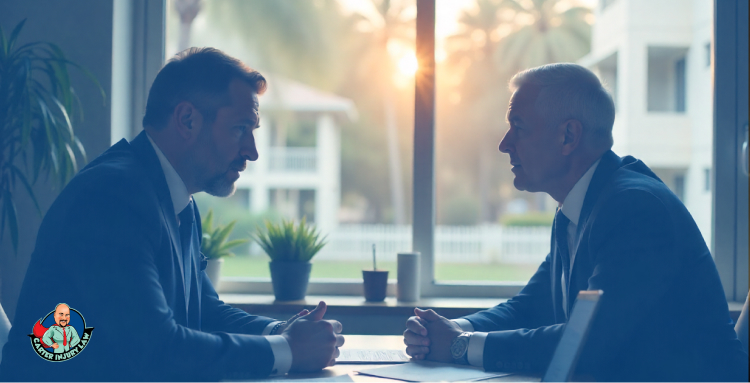
For families who have lost someone in a fall, the days and weeks that follow are filled with grief and confusion. Legal questions may feel overwhelming, especially when the focus should be on mourning and healing. Still, understanding your rights is the first step toward protecting your future.
When you contact Carter Injury Law, there is no payment required unless we win your case, and there is no pressure to commit. Instead, families receive honest guidance about whether negligence may have played a role and what legal options exist.
Our role is not only to investigate but also to shoulder the burden that families should not have to carry. This includes gathering evidence, consulting experts, identifying every responsible party, and building a case for accountability. While we work, families can focus on honoring their loved one and finding space to heal.
The types of support a family may gain through Our legal action include:
Answers about how and why the fall happened
Financial recovery for funeral and burial costs
Compensation for lost income and support
Recognition of the family’s pain and suffering
A measure of justice that helps prevent future negligence
No lawsuit can erase the loss, but it can stop unsafe conditions from being ignored again. It can also give families the stability they need to move forward without fear of financial ruin.
If you are unsure whether a fall could have been prevented, reaching out for answers costs nothing. The right guidance may be the difference between carrying the burden alone and finding both justice and closure.

Lost Someone on Unsafe Property? Know Your Rights in Florida
Losing someone you love is never something you can prepare for. When it happens on another person’s property, whether a home, a business, or a vacation rental, the grief can feel heavier because of the questions left behind. Was the place safe? Could it have been prevented?
In Florida, property owners have a legal duty to protect the people who step onto their premises. When that duty is ignored, families are left not only with loss but also with uncertainty. It is in that uncertainty where the truth often begins to surface.
1) Florida Property Owners' Legal Duty
Every property owner in Florida, whether an individual or a corporation, carries a responsibility to keep their spaces safe. It is not just about fixing what is broken but preventing harm before it happens. When safety is ignored, accidents can turn into tragedies.
Here are just some of the duties property owners are expected to uphold:
Repair broken steps, flooring, or railings before they cause harm.
Secure balconies, decks, pools, and ponds to avoid preventable accidents.
Clean up spills and hazardous materials promptly.
Provide adequate lighting in walkways, stairwells, and parking lots.
Control aggressive animals that could put visitors at risk.
These may sound like simple, everyday tasks. Yet when they are neglected, the consequences can be devastating, sometimes even fatal.
What follows is the harder truth, the part that no grieving family wants to face but cannot afford to overlook. It is how an unsafe condition can transform a place that should have been secure into the setting for a wrongful death.
If you'd rather skip the paragraphs that follow and get the scoop directly from Robert Johnson of Carter Injury Law, here's a short video .
2) When Unsafe Conditions Lead to Wrongful Death
A wrongful death is not an accident in the truest sense. It is a loss that could have, and should have, been prevented. When a property owner ignores obvious dangers, what might have been a minor injury can turn into something irreversible.
Some of the most common places where these cases arise include:
Apartment complexes, where broken railings or poor lighting create hidden dangers.
Vacation rentals, where pools or balconies may not be properly secured.
Retail stores, where spills or clutter are left unattended.
Construction zones, where exposed wiring or unsafe structures threaten lives.
Private homes, where hazards often go overlooked.
The types of accidents tied to these unsafe conditions are equally varied:
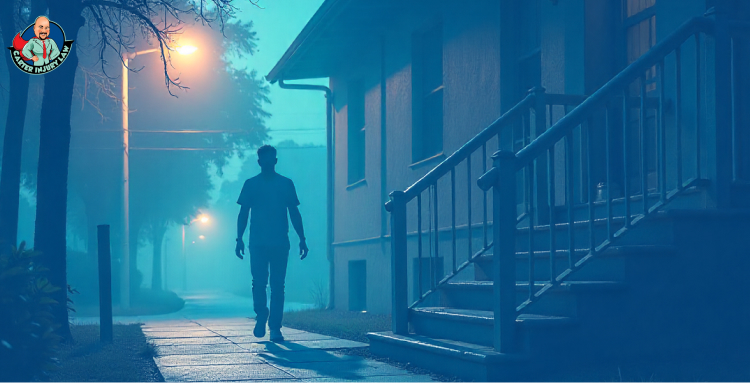
Slips and falls that should never have happened.
Electrocutions from faulty wiring left unrepaired.
Drownings in pools or ponds left unguarded.
Other injuries were caused by negligence that escalated into tragedy.
To understand how serious this issue is, according to the National Safety Council, falls alone account for over 44,000 preventable deaths each year in the United States, making them one of the leading causes of unintentional injury-related fatalities. Behind each of those numbers is a family whose grief is compounded by the knowledge that safety measures could have saved their loved one.
This is why families need to know what steps to take after such a tragedy. Preserving the truth is the first defense against silence, and it starts in the immediate aftermath.
3) What Families Should Do After a Tragedy
In the hours and days after losing someone, it can feel impossible to think about legal steps. Yet what happens in those early moments often determines whether the truth is preserved or lost. Families who take simple but important actions give themselves the strongest chance to find accountability.
Here are the most crucial steps:
Preserve evidence: Take photos or videos of the scene, the hazard, and any conditions that may have contributed to the accident.
Gather witness information: Collect names, phone numbers, and written statements if possible.
Save documents: Keep incident reports such as the report of the compulsory medical examination (CME), medical records, and anything else tied to the event.
Be cautious with insurance companies: Avoid giving recorded statements without first seeking legal advice.
Do not wait: Time works against families, as evidence can disappear quickly and memories fade.
These steps may seem overwhelming during a period of grief, but they serve a purpose. They help ensure the story of what happened is not rewritten by those who failed to keep the property safe.
Still, evidence is only the beginning. Families also need someone who knows how to piece it together and use it to fight for accountability. That is where an experienced attorney becomes essential, and it is where the path to justice truly begins.
4) Why a Wrongful Death Lawsuit Matters

When a loved one is lost because of negligence, filing a lawsuit is rarely about the money first. For most families, it is about accountability. It is about standing up to say this death should never have happened and making sure the same carelessness does not harm another family. The law provides a way to demand that property owners take responsibility for the dangers they ignored.
Still, the financial side cannot be overlooked. Grief does not erase the bills that come in the days and weeks that follow. Funeral and burial costs arrive almost immediately. Medical expenses linger even after a life is gone. The income a family once depended on may suddenly vanish. These are heavy burdens to carry while mourning, and the law recognizes them.
The emotional toll is harder to measure but no less real. Courts consider the pain of losing companionship, guidance, and stability. In certain cases, punitive damages may even be awarded, not only to help the family but also to punish reckless behavior so it is not repeated.
The scale of these losses is staggering. According to the National Vital Statistics System, unintentional injuries, many linked to unsafe conditions, are the fourth leading cause of death in the United States. Each number in that figure represents a family left with questions, bills, and grief that never should have been theirs to carry.
This is why a wrongful death lawsuit matters. It gives families both a voice and a measure of relief. It turns silence into accountability and loss into a chance to protect others from the same fate.
5) Make the First Move Toward Truth
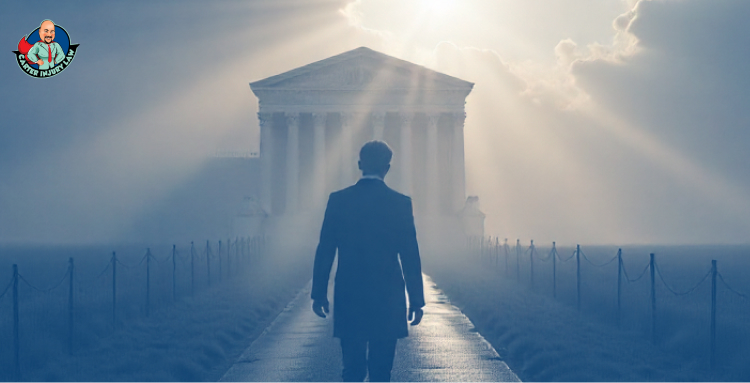
From the very first moment we speak, we want to understand what happened to your family. Every photo, every witness, every report tells a story, and together they reveal the truth of what went wrong. We use that truth to hold those responsible accountable, but more than that, we make sure you are not carrying this weight alone.
We offer a free consultation because deciding your next step should not feel like another burden. There are no upfront costs, and we only get paid if your case succeeds. It’s not about money but about giving you space to grieve, to process, and to fight for justice without fear.
Pick up the phone, or visit our website. You don’t have to face this by yourself. The first step is simply to ask for help and to know that answers and support are waiting.

Wrongful Death from Sepsis in Nursing Homes And What Families Should Know
The experience of losing someone you care about in a nursing home is unlike any other type of grief. You trust a place to provide care, to notice small changes, to call a doctor when needed. When that trust breaks, it leaves behind questions that do not go away with time.
One of the most painful questions is also one of the most necessary. If sepsis took your loved one’s life, was it a tragedy of illness alone, or was it something more?
The answer can change everything.
1) What Sepsis Really Means in a Nursing Home
Sepsis is not some rare medical mystery. It is the body’s overreaction to an infection, turning the immune system against itself. It can begin with something that looks small, almost ordinary, like a urinary tract infection, a patch of pneumonia, or a bedsore that should have been cleaned and dressed. Left untreated, those small beginnings can spiral into organ failure and death.
Inside a nursing home, sepsis is often preventable. Proper hygiene, timely medical checks, and attentive staff can stop an infection before it turns dangerous. Which is why, when it does happen, families are left wondering whether their loss was fate or neglect.
If you'd like to skip my expository paragraphs and hear it straight from Robert Johnson at Carter Injury Law, here's a short video breaking down about losing someone to sepsis.
2) When Neglect Becomes Wrongful Death
Not every case of sepsis points to neglect, but there are moments when a nursing home’s failure becomes impossible to ignore. Families often discover signs that something went wrong, and those signs can be haunting.
Some of the most common red flags include:
Infections ignored until they spread
Bedsores or wounds left untreated
Residents not given enough food or water
Doctors called only when it was already too late
Medical records that are missing or incomplete
Each of these points tells a story of care that was not given. Nursing homes are held to what is called a “standard of care,” the basic level of attention and treatment any patient has the right to expect.
When a facility falls short of that standard, and a death follows, the law recognizes it as more than a mistake. It becomes negligence, and negligence can open the door to a wrongful death claim.
3) Who Can File a Claim in Florida
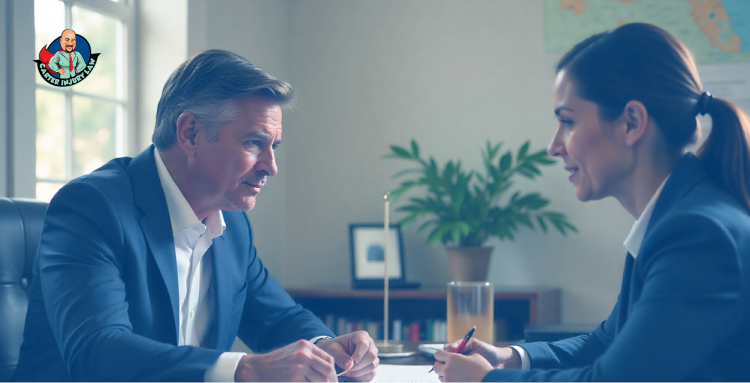
In Florida, a wrongful death claim is not something just anyone can bring forward. The law requires a personal representative of the deceased’s estate to file on behalf of surviving family members. That representative speaks for those left behind, whether it is a spouse, children, parents, or even others who were financially dependent on the person who passed away.
The idea is simple, though the process can feel overwhelming: the law gives families a voice, but it must be carried through the estate.
It is worth noting how widespread the issue has become. According to the Centers for Disease Control and Prevention, about 1.7 million people in the United States develop sepsis each year, and nearly 270,000 die from it. Those numbers remind us that sepsis is not rare, and when it happens in a nursing home, prevention should have been possible.
Even more striking, a study in Critical Care Medicine found that almost 80 percent of sepsis cases start outside of hospitals, often in long-term care facilities. That means the responsibility for early detection often falls squarely on nursing homes, where staff are supposed to be watching closely.
4) What Families Can Ask for in a Wrongful Death Case
When a wrongful death claim is brought forward, it is not only about money. It is about naming the loss, recognizing what was taken, and holding a facility accountable. The law provides a way to measure that loss, but families know it is deeper than numbers.
The kinds of damages that may be recovered include:
Medical expenses left behind
Funeral and burial costs
Pain and suffering experienced by surviving family members
Loss of companionship and emotional support
The value of lost services or financial support the deceased once provided
Every case looks different, because every family is different. A spouse may feel the silence in the evenings, a child may miss the parent who once gave advice or care, and parents may carry the grief of losing a son or daughter they never expected to outlive.
The law tries to translate those absences into damages, but what families often want most is recognition that what happened should not have happened at all.
5) Why Time Is Never on Your Side
Grief does not move on a schedule, but the law does. There is a fixed timeframe to make a personal injury claim. In Florida, families generally have two years from the date of death to bring a wrongful death claim. It may feel harsh, but once that time passes, the chance to hold a facility accountable can be lost.
There are other risks in waiting as well. Medical records can be misplaced. Staff members who witnessed what happened may move away or forget details. The longer a family waits, the harder it becomes to gather the truth.
Taking action early does not mean rushing through grief. It means protecting your right to ask questions later, with evidence that has not faded.
6) Justice Is About More Than Money
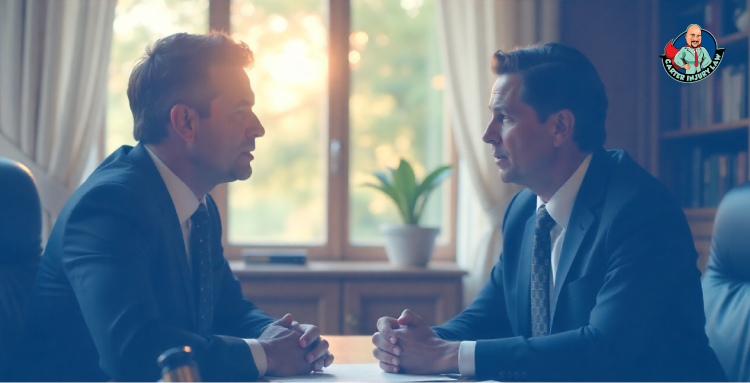
When a loved one dies from sepsis in a nursing home, the loss feels heavier than words can carry. Families are left with a choice: to let it be written off as illness or to ask if it could have been prevented. This is where justice and accountability meet. A wrongful death claim is not just about recovering costs, it is about ensuring that the same neglect does not harm someone else’s family tomorrow.
There are several reasons families choose to pursue legal action:
Accountability for the facility
Nursing homes have a duty to provide attentive care. When they fail, it is not only one family that suffers. A claim forces the facility to answer for its actions, creating pressure for better standards.Protecting future residents
Legal cases shine a light on dangerous practices. By pursuing justice, families may prevent other vulnerable residents from facing the same fate.Recognition of the loss
A claim acknowledges that a life had value. It gives weight to the companionship, support, and love that were taken away, something no financial number can fully express.Financial stability for survivors
Beyond the emotional toll, families often face unexpected medical bills, funeral costs, and the loss of financial support. Seeking damages can help provide stability during an unstable time.
It is important to understand that compensation is only part of the picture. Many families say what mattered most was not the check at the end, but the acknowledgment that their loved one’s death was not invisible. It was investigated, it was explained, and the facility had to face its role in it.
For some, taking legal action is also an act of care. It is a way of protecting others, honoring the person they lost by making sure that neglect does not continue unchecked. The lawsuit becomes not just a case, but a statement that what happened was wrong, and it cannot be repeated.
7) Taking the First Step Toward Answers

No one plans to make a phone call to a lawyer after losing a loved one. The grief is enough to carry. But families who ask hard questions often discover that silence serves only the facility, not the memory of the person they lost.
That’s why we listen. We gather the details. We explain what the law allows and what steps may be taken. There is no fee unless we win, and consultations are free and confidential.
If your family has lost someone to sepsis in a nursing home, you deserve answers. You may also deserve justice. Reaching out is not just about compensation but also about standing up for the care your loved one was owed.
The choice is yours, but you do not have to make it alone. Call Carter Injury Law or visit our website to schedule a consultation. We are ready to help you understand what happened and to walk with you toward the truth.

Wrongful Death of A Loved One After a Slip and Fall
You never expect it to happen. One moment your loved one is laughing over breakfast, steady on their feet, and the next, a simple misstep changes everything. Slip and fall accidents feel absurd in their suddenness, cruel in their randomness. They can happen in a grocery store, on a quiet staircase, or even in the familiar halls of home.
And when they do, they leave questions that twist through your mind long after the shock fades. Who was responsible? Could it have been prevented? And most haunting of all, what do you do when the person you love the most is gone, and the world expects you to carry on?
1) How a Simple Fall Becomes Something Life-Changing
Slip and fall accidents often get dismissed as clumsy mistakes or minor mishaps. The truth is far more serious. A simple fall can unleash devastating consequences on the human body, especially for older adults. Bones that once healed easily can shatter, and the brain, protected only by a thin skull, can suffer trauma that changes everything in an instant. If you’d like to hear it straight from David Carter at Carter Injury Law, here’s a short video
Among the most common outcomes are head injuries. A blow to the head can cause bleeding or swelling in the brain, sometimes leading to permanent disability or death. Spinal cord injuries are another devastating result, robbing victims of mobility and independence. Even when someone survives, the long road of medical care can strain families financially and emotionally.
For seniors, the risks are multiplied. A hip fracture can lead to complications that spiral quickly, including infections, reduced mobility, and long hospital stays. What seems like a fall that someone should be able to walk away from can instead set off a chain reaction that ends in tragedy.
And when that tragedy turns fatal, families are left searching for answers. However, the most important question still lingers in the shadows. Could this death have been prevented?
2) What Makes It a Wrongful Death Case
Not every fall leads to legal action, but when negligence is involved, the story changes. A slip or trip that results in death is no longer just an accident. It becomes a wrongful death case. That means the loss could have been avoided if the property owner had taken proper care.
Under Florida law, property owners have a duty to keep their spaces reasonably safe. This applies whether the property is a grocery store, an apartment complex, or even a private residence. When that duty is ignored, and someone pays the ultimate price, accountability follows.
Examples of negligence include:
A wet floor left unmarked with no warning sign
A broken step or railing that was never repaired
Poor lighting in stairwells or hallways
Hazards that owners knew about, or should have known about, but failed to address
This concept is called premises liability, and it does not discriminate. Businesses, landlords, homeowners, and in certain cases even government properties can all be held responsible.
The question remains: when a property owner fails in their duty and tragedy strikes, who has the right to step forward and demand justice? When lawyers talk about wrongful death from a fall, the legal concept at the center is called premises liability. At its core, it means property owners are responsible for keeping their property safe. If hazards are ignored and someone gets hurt, the law allows families to hold them accountable.
This liability does not stop at grocery stores. It extends to apartment complexes, private homes, hotels, and in some circumstances government-owned properties. The rule is simple: if a dangerous condition exists and the owner knew about it, or reasonably should have known about it, they have a duty to fix it. Failing to do so can create deadly consequences.
The Centers for Disease Control and Prevention reports that falls are the leading cause of injury-related deaths among adults 65 and older, with more than 36,000 fatalities recorded in 2020.
The National Floor Safety Institute notes that slip and falls account for over one million emergency room visits in the United States each year.
Numbers like these show that slip and falls are not freak accidents. They are predictable, preventable, and often tied to negligence.
So when a fall ends a life, the legal framework is clear. The next question becomes, who can actually step into the courtroom and make a claim?
4) Who Can Claim Justice
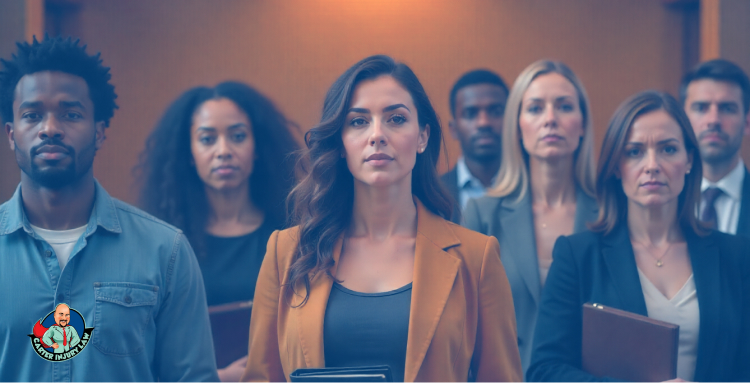
When a slip and fall leads to wrongful death, the law allows certain family members to take action. These cases are not filed on behalf of strangers or distant relatives, but by those most directly impacted by the loss. In Florida, that usually means a spouse, a child, or a parent. In some circumstances, other dependents or representatives of the estate may also have legal standing.
The compensation available is designed to ease both the financial and emotional weight that follows a sudden death. It is not a windfall, it is support meant to help families move forward after an avoidable tragedy.
Compensation may include:
Funeral and burial expenses
Medical bills related to the accident before death
Lost income or benefits that would have supported the family
Pain, suffering, and emotional loss for surviving loved ones
Each of these categories represents a piece of the story, the gap left behind when someone’s life is cut short by negligence. But for many families, pursuing justice is about more than money.
The bigger question is, how do you confront a culture that has painted slip and fall claims as nothing more than a punchline?
5) Why People Dismiss Slip and Falls and Why They Shouldn’t

Television and advertising have long turned slip and fall accidents into a joke. The trope is familiar, someone tosses water on the floor, stages a stumble, and then sues for a quick payout. That storyline has shaped public opinion for decades, and it has left many people skeptical whenever they hear about a slip and fall case.
But the reality is nothing like the punchline. These incidents can cause catastrophic injuries and, in the worst cases, death. Families dealing with the aftermath are not chasing easy money. They are facing hospital bills, funeral costs, lost income, and the emotional shock of losing someone they loved.
Wrongful death claims are not about revenge. They are about accountability, about making sure that property owners do not ignore hazards that put lives at risk. They are also about restoring some measure of stability for families who are suddenly left without the support they depended on.
Still, even with the truth on their side, families face another obstacle. The law gives them only a narrow window to act, and once that time runs out, the chance for justice disappears. But how long do they really have?
6) Acting Fast Saves Your Case
The law in Florida places a strict time limit on filing wrongful death claims tied to negligence. Families have two years from the date of death to bring a case forward. On paper, that might sound like plenty of time. In practice, it is far less. Every day that passes makes it harder to gather the proof needed to hold a property owner accountable.
Building a strong case is not just about filing paperwork. It is about investigation, preservation, and documentation. Lawyers move quickly because evidence has a way of disappearing. Surveillance footage gets erased. Witnesses forget details. Property owners fix the hazard and deny it was ever there. Acting fast is the difference between a case with weight and a case with holes.
Steps that must be taken include:
Sending preservation letters to secure key evidence
Obtaining and reviewing surveillance footage before it is deleted
Interviewing witnesses while memories are still fresh
Documenting the scene and the hazard before conditions change
Families already burdened with grief are not expected to handle these steps on their own. That is where experienced legal teams step in, protecting the case before time runs out.
But what about the cost? After all, taking on a legal battle while facing funeral bills and lost income might feel impossible. Or is it?
7) Support Without Upfront Costs
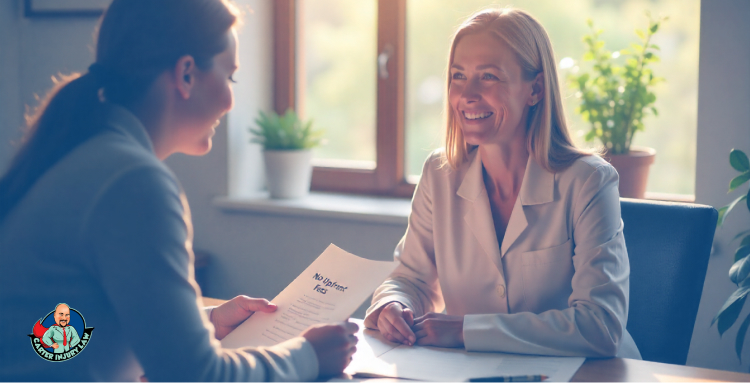
Facing a wrongful death claim can feel overwhelming. Families are grieving, processing medical bills, funeral arrangements, and the sudden loss of support. Adding legal fees to the mix often feels impossible. That is why Carter Injury Law works on a contingency basis. You do not pay anything upfront. You only pay if the case is won.
This approach allows families to focus on healing instead of worrying about mounting legal costs. Every step of the process is explained clearly and honestly, with no pressure to make hasty decisions. The goal is to provide support, guidance, and advocacy during one of the most difficult times of a person’s life.
Carter Injury Law offers:
Free consultations to discuss your options
Step-by-step guidance through the investigation and legal process
Representation focused on accountability and fair compensation
A team that listens and answers questions with compassion
Your family has already been through enough. The law exists to protect your rights and give you the chance to hold negligent parties accountable. With the right team by your side, you can focus on grieving, while we focus on securing the justice your loved one deserves.

Wrongful Death Claims in Florida Pedestrian Fatalities
Walking across a street should not be a gamble with your life. Yet in Florida, it often feels that way. The numbers alone tell a story of risk, of hurried intersections in Tampa, distracted drivers in Miami, and unmarked crosswalks in Orlando, where the ordinary act of crossing the road can turn into something fatal.
When a loved one is taken this way, families are left holding questions that have no easy answers. Was it just bad luck, or was it something more?
The truth is, how you answer that question can change everything.
1) When a Wrongful Death Claim Applies
In Florida, a wrongful death claim exists when the loss is not only tragic but preventable. If a driver acted carelessly, the law recognizes that families deserve more than silence.
Negligence can take many forms:
Texting while driving , a habit that still claims lives despite endless reminders. The National Highway Traffic Safety Administration reports that distracted driving killed 3,308 people in 2022 in the United States, and Florida is among the hardest hit.
Speeding through lights , ignoring the seconds that separate safety from disaster.
Running red lights , a problem that the Insurance Institute for Highway Safety notes leads to over 1,000 deaths nationwide each year.
Simple inattention , a glance away that costs a family everything.
What makes this difficult to bear is that even when criminal charges never appear, the family still has a path. Justice in these cases is not just about jail time. It is about accountability, about holding someone responsible so that loss is not treated as an afterthought. David Carter at Carter Injury Law speaks plainly about it, and you can hear him yourself in this short video.
2) Who Can Speak for the Loved One
The law in Florida does not leave the question of who may step forward to chance. It is clear, even if it feels heavy in the moment. A wrongful death claim must be filed by the personal representative of the estate, a role that carries both responsibility and weight. This person speaks for the loved one who can no longer speak and also for the family left behind.
The law outlines who may hold this position:
A surviving spouse , who often carries the closest bond and the deepest loss.
Parents , for whom the loss of a child, no matter the age, feels like a tearing out of time itself.
Adult children , who suddenly step into a place they never imagined, making decisions they once believed were decades away.
Someone appointed by the court , when no immediate family member is available or able to serve.
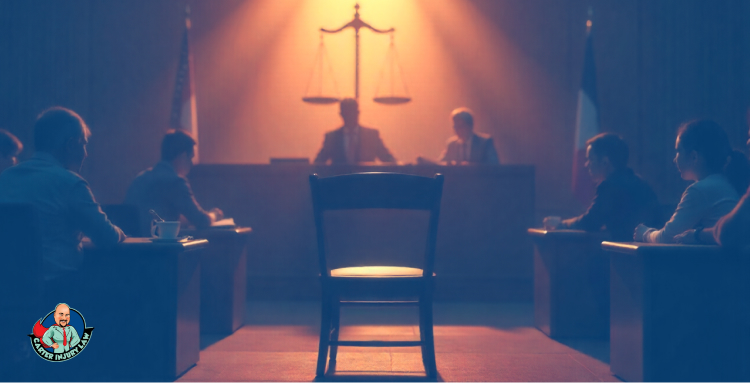
This representative becomes the bridge between memory and justice. They gather the story of what happened, the financial losses, and the emotional toll. They carry the duty of making sure that the life cut short is not treated as a statistic but as a voice that must still be heard in the courtroom.
The role can feel impossible. Families in grief are often in no condition to take on legal burdens, yet the system requires that someone step into that place. This is why many families lean on lawyers who know not only the law but also the way grief moves through a household. Without guidance, deadlines pass, opportunities slip away, and insurance companies grow stronger in their silence.
To understand who can file a claim is to begin understanding how the law tries, imperfectly, to put shape around loss. It is not about replacing what has been taken, because no law can do that. It is about ensuring that the absence left behind is recognized, measured, and answered, at least in part, by accountability.
3) Types of Compensation Available
When a wrongful death claim is filed, the question becomes not only who can speak for the loved one, but also what may be spoken for. The law in Florida recognizes that loss is not a single thing. It ripples outward, touching money, time, and the quietest corners of family life.
Funeral and burial costs are often the first and most immediate weight. Families should not have to bear the expense of saying goodbye when the death was caused by someone else’s negligence. Medical bills may follow for the care that was given in the moments before life slipped away. These are debts no one plans for, yet they arrive all the same.
Beyond the tangible bills is the loss of financial support. A spouse or parent may have been the steady source of income, the person who kept the household upright. When that income disappears, the absence is not only emotional but practical, showing up in rent, groceries, tuition, and the thousand small costs of daily living.
Florida law also allows families to seek damages for pain and suffering, a phrase that feels too thin for what it tries to contain. It covers the ache of children growing up without guidance, of partners lying awake in beds that now feel too large, of parents carrying the silence of a child they once expected to outlive them.
There is also recognition of companionship and guidance lost. A family is not only sustained by money but also by presence, by encouragement, and by the ordinary rituals of care that make up a life together. When these are taken, the law attempts to account for them, however imperfectly, through compensation.
The purpose is not to put a price tag on a life. It is to acknowledge that what has been lost is vast and that the family left behind should not carry the burden alone.
4) Why Every Life Leaves a Mark

A wrongful death claim is not only about pointing to what went wrong on the day of the accident. It is also about holding on to the threads of what would have continued if that driver had been more careful. A life is never just the moment it ended, it is the years that were still to come.
For many families, this is the heart of the matter. A parent is no longer there to guide a child through choices. A spouse is missing from the conversations that shape a home. A son or daughter is absent from the future their parents once imagined. These are not things that can be replaced, but they can be recognized in court.
To say a claim matters is to say the person mattered. It is a way of refusing to let their story be reduced to a statistic on Florida’s rising accident charts. It is a reminder to the driver, to the insurer, and to the community that every pedestrian killed was someone whose laughter filled a room, whose work carried meaning, and whose presence changed lives.
5) The Obstacles Grieving Families Encounter
After a pedestrian fatality, families often expect that the truth will speak for itself. But the reality is harder. Insurance companies step in quickly, and their priority is rarely compassion. They are trained to protect their bottom line, not the grieving household left behind.
Some of the most common challenges include:
Blame shifting , where the insurer suggests the pedestrian was careless, even when the evidence points elsewhere.
Minimizing losses , offering settlements that do not come close to covering funeral costs, medical bills, or the years of financial support a loved one would have provided.
Delays and denials , dragging out the process in the hope that families will give up under the pressure of grief and mounting expenses.
The weight of grief already makes it difficult to manage daily life. Add to that the complexity of legal deadlines, paperwork, and negotiations, and it becomes clear why so many families feel overwhelmed. This is not a process designed with tenderness in mind. It is designed for efficiency and cost-saving, often at the expense of justice.
6) Finding Support When the System Feels Cold
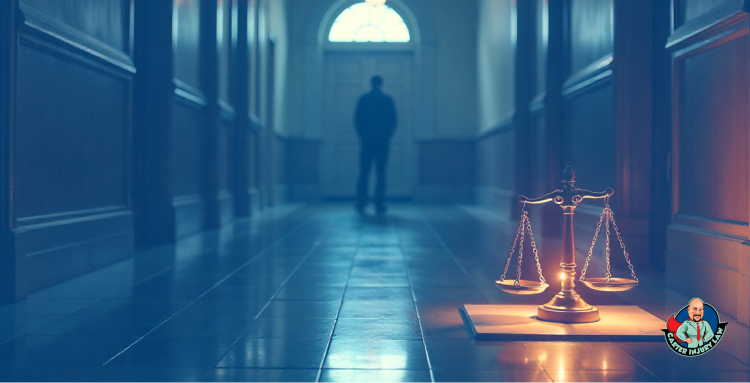
When the system feels tilted against grieving families, the role of an attorney is not just legal but human. Our focus is on bringing clarity to chaos and giving families space to grieve while the legal work is carried forward.
Here is what that looks like in practice:
Thorough investigations , gathering police reports, witness statements, and camera footage to uncover exactly what happened.
Expert witnesses , including accident reconstruction specialists, who can rebuild the scene and make clear what negligence occurred.
Storytelling in court , making sure the life of the loved one is not reduced to numbers but shown in its full weight and humanity.
Standing up to insurers , refusing to accept attempts to downplay loss or shift blame onto the victim.
Each of these steps serves the same purpose, to make sure a family’s pain is translated into a legal claim that is strong enough to stand before a judge or jury.
For families, the work is not only about the outcome but also about knowing someone is in their corner. It means they do not have to carry the burden of explaining, defending, and fighting for their loved one while also navigating grief.
At its heart, Carter Injury Law’s role is to make sure that accountability is not lost in paperwork and that justice, however imperfect, is pursued with the care and seriousness these cases demand. Reach out today for a free consultation. Let us help you find clarity, support, and a path forward when it feels impossible to take the next step alone.

What To Do After a Fatal Hit and Run in Florida
Losing someone is never simple, but when the person responsible disappears, it feels like the universe itself has abandoned you. The grief is not just sorrow, it is confusion, anger, and a hollow sense of injustice. How can someone leave a scene like this and continue on as if nothing happened? You try to make sense of it, but logic is a poor companion in these hours.
And yet life presses forward, even when you cannot. Bills must be paid, calls must be returned, and questions must be answered. In Florida, after a fatal hit and run, there is a sequence of events, some practical, some procedural, that begins to shape the path toward answers. It is a strange mixture of law, investigation, and human effort against chaos. Each step can feel fragile, like a small light flickering in the dark. Let’s talk about it…
1) What Happens First After a Fatal Hit and Run
When a fatal hit and run happens in Tampa, the response is swift. Police do not wait around, they open a case right away. Depending on where it happened, the investigation might be led by Tampa Police, the Hillsborough County Sheriff’s Office, or the Florida Highway Patrol.
Investigators know time is everything. The first hours can determine whether the driver is caught or stays hidden. That is why they move fast, gathering every lead they can find.
Here is what typically happens:
Surveillance footage from nearby businesses or homes is reviewed.
Witness statements are taken on the spot.
Traffic cameras and plate readers are checked for matching vehicles.
Physical evidence like broken glass or paint transfer is collected.
Sometimes the trail leads straight to the driver. Other times, despite every effort, the trail runs cold. Families are left in limbo, waiting for answers that may or may not come. You’re invited to hear directly from David Carter at Carter Injury Law, sharing his expert insights in this short video .
2) The Safety Net You Might Not Know About
When a driver vanishes after a crash, families often feel like their options vanish too. The truth is, insurance can step in even when the other driver is never found.
Uninsured motorist coverage is designed for exactly this situation. If your loved one was covered by a policy that included it, that policy may provide financial help even when the hit and run driver is nowhere to be found. Insurance companies call these cases “phantom driver” situations, and while the name sounds strange, the protection it offers is real.

Here is why this coverage matters:
One in five Florida drivers has no insurance at all according to the Insurance Research Council.
Hit and run crashes account for over 25% of all accidents in Florida, based on data from the Florida Department of Highway Safety and Motor Vehicles.
Those numbers tell a clear story. Drivers flee because they have no license, no insurance, or no way to face the consequences. However, your family should not carry the burden of their choices.
So if coverage can provide a financial lifeline, what happens when the driver is actually caught? That is when the fight moves into the courtroom... And what happens if the person who caused the crash is never found? The answer is not as hopeless as it sounds...
3) Wrongful Death Claims Against the At-Fault Driver
When investigators track down a hit and run driver, the legal fight takes on a new dimension. Families suddenly have the option to hold that driver accountable in civil court, not just wait for criminal charges.
A wrongful death claim is about more than paperwork. It is a way to demand financial recovery for the very real losses a family faces. These claims can cover:
Funeral and burial expenses that no one plans for
Loss of income that a family depended on
Medical bills tied to the crash
Emotional damages for the pain of losing someone too soon
Meanwhile, prosecutors may pursue criminal charges against the driver. But it is important to know that criminal court and civil court are not the same. Criminal court is about punishment. Civil court is about compensation. Families deserve both.
Still, even with a case filed, working through the system can feel hard. That is why most families in Tampa turn to legal teams who know how to balance both sides of the fight.
4) Why Facing This Alone is a Mistake
The aftermath of a fatal hit and run is is an emotional storm that collides with confusing rules, unreturned phone calls, and an insurance system that rarely feels like it is built for grieving families. In Tampa, many people describe the process as a maze where every turn seems to add more frustration.
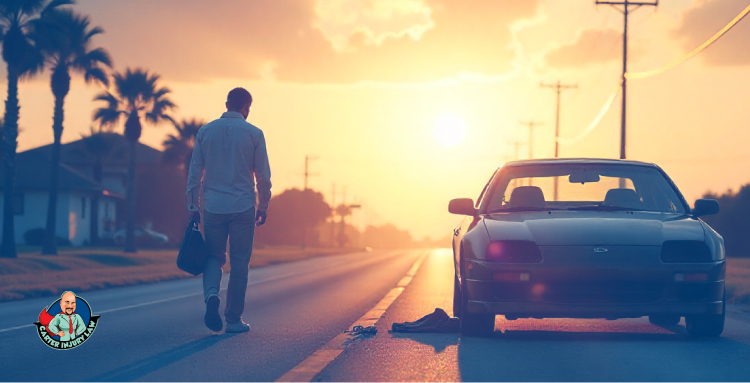
Trying to face this maze without support can leave families drained and vulnerable. Insurance companies may appear sympathetic, but their primary goal is to protect their bottom line rather than your future. Police officers may want to help, but once the investigation slows down, updates often stop. Even well-meaning friends and relatives cannot always understand the pressure that comes with trying to hold a system accountable while mourning a loss.
This is where having experienced legal guidance changes everything. A skilled team can push for answers, demand accountability, and focus on justice while families focus on healing. It is not about rushing into a courtroom, it is about making sure that every possible path to support and compensation is explored.
But the real question every family faces is this, once the shock wears off, what should you do next...
5) Finding Answers, Finding Justice for Your Family with Carter Injury Law
After a fatal hit and run, families often find themselves unsure of what to do first. The grief is profound, but the choices made in the early days can shape the entire case. That is why knowing what not to do is just as important as knowing what steps to take.
Here are the biggest mistakes to avoid:
Do not talk to the insurance company alone. they are trained to minimize payouts, no matter how welcoming they may sound.
Do not assume you have no case. Even if the driver was never found, uninsured motorist coverage or other legal options may still be available.
Do not sign anything in a rush. Quick settlements often leave families with far less than they deserve.
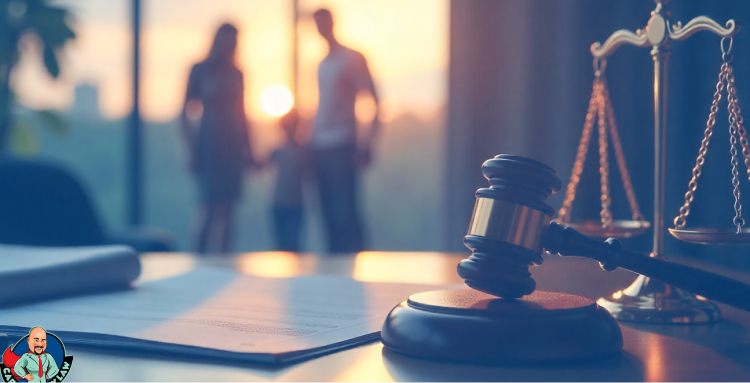
A fatal hit and run is a story of loss, anger, and unanswered questions. Families in Tampa should never have to face that story alone. From the first police report to the final insurance negotiation, every step can feel like a battle, and every delay can feel like another injustice.
However, investigations can bring answers, uninsured motorist coverage can provide a financial safety net, and wrongful death claims can hold reckless drivers accountable. Even when the system feels impossible, the right guidance can shift the balance.
We start every case with a conversation, not a contract. Consultations are free, and there will be no fees unless we win for you. Families are not just clients, they are partners in finding justice.
If you have questions, if you need clarity, or if you just want to know what your options are, reach out today. Justice does not wait, and neither should you.

When a Drunk Driver Kills, What Can Florida Families Really Do?
A knock on the door in the middle of the night. A phone call you wish you never answered. The news that someone you love was taken in an instant because another person chose to drink and drive.
Grief comes with a silence that feels heavier than words. Families are left not only with the heartbreak of absence but also with questions no one prepared them to ask. What happens now? Who is held accountable? Is there any way to make sense of what feels senseless?
In Florida, the law recognizes two paths after a fatal DUI crash. One seeks to punish the offender. The other asks a harder question, one that many families never realize until they are standing in the middle of it…
1) The Two Sides of Justice After a Fatal DUI Crash
When a family loses someone in a drunk driving accident, the legal system splits the response into two distinct tracks. Both matter, but they serve very different purposes. Understanding the difference can help families make sense of what lies ahead.
(I) The Criminal Case
The state of Florida takes DUI fatalities seriously. A drunk driver who causes a death will often be charged with DUI manslaughter, which is a second-degree felony. That means the offender could face years in prison, steep fines, and a permanent mark on their criminal record. The goal of this process is accountability to society. The government steps in to punish reckless behavior and protect the public from future harm.
However, the criminal case is not about the victim’s family. It does not cover the bills that arrive in the weeks after a funeral. It does not address lost income or emotional pain. It is about punishment, not recovery.
(II) The Civil Case
This is where the second track begins, and it is the part that many families never hear about until they sit down with an attorney. Civil law is about giving families a way to demand justice that is more personal. It is a path created to provide support, not just penalties.
In Florida, a wrongful death claim can be filed against the drunk driver and sometimes against others who played a role, such as the vehicle’s owner or their insurance provider. Unlike the criminal trial, this case is not about jail time. It is about financial accountability and easing the burden of loss.
Families can pursue damages for:
Funeral and burial expenses.
Medical costs related to the accident.
Lost wages and income that the loved one would have provided.
Pain, suffering, and the emotional toll on survivors.
The civil case does not erase grief, but it gives families a tool to rebuild. It is about ensuring that the burden does not fall entirely on the shoulders of those already hurting.
And yet, even within this framework, many families wonder who is allowed to take action and what rights they actually have. That is where the next part of the journey begins… Hearing directly from an expert can make a difference. David Carter from Carter Injury Law explains, in his own words, what families need to know after a fatal DUI crash in Florida. Watch the short video below
2) Who Can Stand Up for Justice?
When a life is lost because of a drunk driver, the criminal trial is not the only avenue for justice. Florida law opens the door for families to take civil action, and this step can be just as important as the courtroom verdict.
Who can file a wrongful death claim? Florida allows certain family members to step forward:
A surviving spouse.
Children, no matter their age.
Parents, when a child is lost.
The personal representative of the estate.
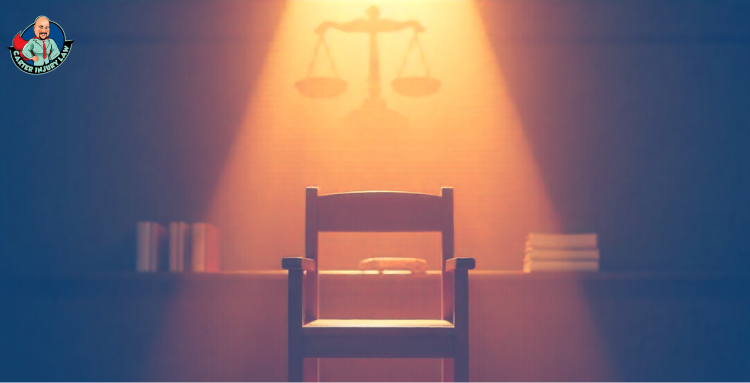
The purpose is accountability. A wrongful death claim forces those responsible, whether it is the driver, their insurance company, or even the person who lent them the car, to face the consequences in a different way.
The CDC reports that about one in three traffic deaths in the United States involves a drunk driver. Behind every statistic is a family forced to navigate bills, grief, and unanswered questions. Wrongful death claims exist to ease that weight.
It is not an easy choice to make. But understanding how these claims work is often the first step toward regaining control. And that leads to the next question families ask most often...
3) What Can Compensation Really Do?
No amount of money can bring someone back. Families know this before they ever step into a lawyer’s office. But what financial recovery can do is soften the blow of the costs that appear almost immediately after a fatal crash.
Here are some of the most common forms of compensation available in Florida wrongful death cases:
Funeral and burial expenses that can overwhelm a family within days.
Lost income that a spouse, parent, or child relied on to keep life steady.
Medical bills tied to emergency care before the loss.
Emotional pain and suffering, a category that recognizes the weight carried by those left behind.
A wrongful death claim is not meant to put a dollar value on a person’s life. It exists to ensure families are not left struggling under the financial aftershocks of a tragedy.
Every case is different, and the scope of compensation depends on the unique circumstances of the family and the crash. Which leads directly to the questions most families ask when they first reach out...
4) The Questions Families Ask First
When families walk into our office, they rarely come with legal documents. They come with questions. Here are the ones we hear most often.
(Q1) Can we file a civil claim if the driver already faces criminal charges?
Yes. The civil case is separate. You can move forward even if the criminal trial is still ongoing or if the driver is found not guilty.
(Q2) What if the drunk driver has little or no insurance?
There are options. We may pursue the driver’s personal assets or look to uninsured motorist coverage under your loved one’s policy. Every case requires digging to uncover all potential sources of compensation.
(Q3) Is filing a wrongful death claim complicated?
It's not always easy, but families do not shoulder the burden alone. We handle the legal process while you focus on grieving and healing.
The questions never stop at three. They unfold as families move through the process, and every answer leads to another layer of understanding. One of the most urgent concerns is timing, and that is where the law in Florida becomes especially clear...
5) Why Time Is a Silent Enemy in Wrongful Death Cases
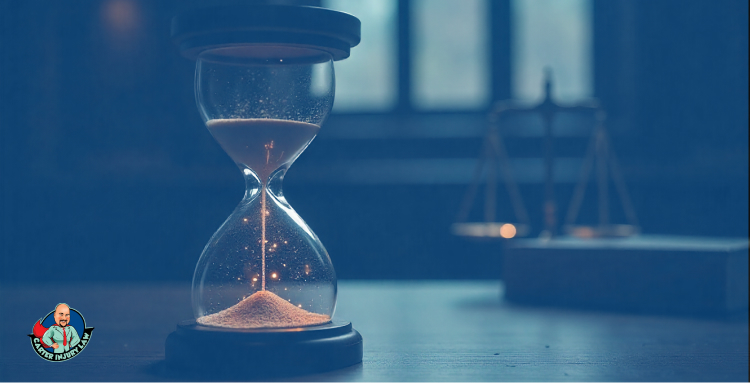
Grief does not move on a schedule. But the law does. In Florida, families have two years to file a wrongful death claim. At first, that may sound like enough time. In reality, the clock runs faster than most people expect.
Here is why acting early matters:
Evidence fades. Surveillance footage is erased. Phone records disappear.
Memories blur. Witnesses forget details as the months pass.
Paper trails vanish. Insurance files and employment records are not always kept forever.
Every week that passes makes it harder to build a strong case. That is why attorneys push to begin the process quickly, even while the criminal case is unfolding. The sooner the civil side starts, the more leverage families have in pursuing justice.
And for families, there is one more piece of relief that comes with moving forward. You do not have to wrestle with the paperwork or the legal maze yourself. That is where the role of Carter Injury Law becomes essential…
6) They Took a Loved One, We Take the Burden
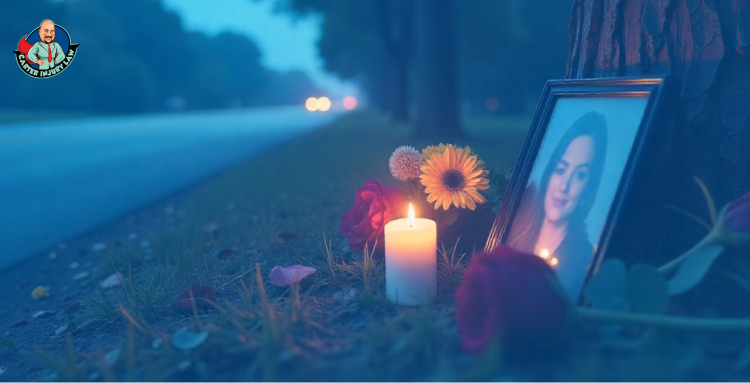
The legal system is built on rules, deadlines, and documents. Families in mourning should not have to face that weight alone. At Carter Injury Law, our role is to carry it for you.
Here is what that looks like in practice:
We handle the paperwork, filings, and negotiations.
We explain each step in clear, simple language.
We investigate every possible source of compensation.
We stand by you in court if the case goes that far.
For families, this means more time to focus on what matters most, being together, remembering, and healing.
Every case starts with a conversation. There is no pressure, and there is no fee unless we win. It is a chance to ask questions, hear options, and decide what path is right for you.
Losing a loved one in a drunk driving crash changes everything. But with the right guidance, it does not have to leave your family without answers or support. Carter Injury Law is here to make sure of that.

Top 5 Mistakes People Make After a Car Accident in Florida (and How to Avoid Them)
The first few seconds after a car accident feel like someone hit pause on the world, except your heart did not get the memo. Metal bends, glass breaks, and time stretches thin, yet decisions must arrive instantly.
In Florida, where palm trees sway but the laws rarely do, those decisions can decide whether you walk away with dignity or with debt that ages like spoiled milk. Most people believe they will handle it with common sense, that clarity will guide them through flashing sirens and shaken voices. But clarity, like brakes on wet asphalt, often fails when you need it most.
And that is when the real mistakes begin.
Mistake 1: When You Think a Police Call Is Optional
The scene looks harmless enough, a dented bumper, two drivers rubbing the back of their necks, muttering that it is “not that bad.” In Florida, this is the moment where good intentions quietly dig a financial grave. People convince themselves that skipping the police will save time, that a handshake and an exchanged phone number are enough. Except memory is a fragile witness, and trust evaporates faster than gasoline on pavement.
A police report is more than paperwork, it is the skeleton key of your case, the detail that decides whether insurance takes you seriously or treats you like background noise. Without it, your version of events becomes a bedtime story, comforting to you but irrelevant to everyone else.
How to avoid it? Call the police, every single time. Even if the accident feels small, even if the other driver promises they will “handle it.” Because when the dust settles and the bills arrive, the only thing worse than a bent bumper is a bent truth.
Mistake 2: Adrenaline Is Not a Doctor
The body is a magician in the moments after a crash. Adrenaline cloaks pain like a cheap stage curtain, convincing you that you are fine, that you can drive home, sleep it off, maybe even laugh about it later. In Florida, that illusion can cost you far more than a sore back. The state’s Personal Injury Protection, politely known as PIP, demands that you seek medical attention quickly. Wait too long, and your right to coverage evaporates, as if your injuries never existed.
The tragedy is quiet. By the time the pain finally announces itself, sometimes days later, the law has already decided you were careless. And the insurance adjuster, who suddenly sounds friendlier than your own relatives, will happily remind you that your hesitation has left them off the hook.
How to avoid it? Do not trust adrenaline. See a doctor immediately, even if you feel like nothing is wrong. Pain has a way of whispering late, and in Florida, lateness is the most expensive voice of all.
Mistake 3: Sorry Can Cost More Than the Crash
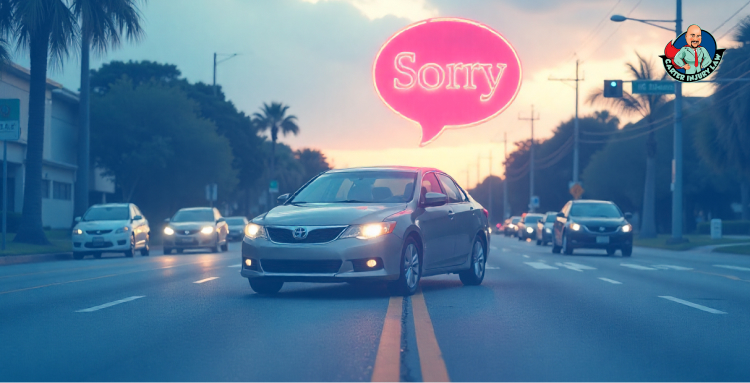
Human instinct is a strange companion at an accident scene. Our first reflex is often to apologize, even when we have done nothing wrong. In Florida, those two little words, “I’m sorry,” can echo through courtrooms and insurance claims louder than the crash itself.
Politeness as poison. In everyday life, courtesy is harmless. At the dinner table, an apology smooths over spilled wine. At an accident scene, it can be read as an admission of liability, one that Florida’s comparative negligence system is all too eager to use against you.
Your words become evidence. Insurance companies do not listen for compassion, they listen for leverage. Every phrase you utter, every shrug, every nervous laugh, can be twisted into a confession you never meant to make.
Facts, not feelings. The safest response is to stick to the basics: exchange information, wait for law enforcement, provide the facts without embroidery. Think of it as writing the world’s driest diary entry, boring but bulletproof.
How to avoid it? Let silence do the heavy lifting. You are not on trial at the scene, you are simply surviving it. Save the apologies for when they will not empty your wallet.
Mistake 4: The Smiling Voice on the Other End May Not Be Your Friend
The kind voice on the phone, the one that calls you by name and asks how you are holding up, is not there to be your confidant. In Florida, insurance companies are legally obligated to minimize payouts, which means their sympathy is often a velvet glove over an iron fist.
A recent report by the Insurance Research Council found that accident victims who hired attorneys received settlements that were 3.5 times higher than those who went it alone. That statistic is not just numbers on a chart, it is a mirror showing how much insurers rely on your trust to save themselves money.
And according to a study from the Florida Office of Insurance Regulation, insurers deny or reduce nearly 20% of PIP claims for technical reasons, often exploiting paperwork errors or delays. Translation, their business thrives when you stumble.
How to avoid it? Treat every interaction with caution. Share only the facts, avoid speculating about your injuries or the accident, and if possible, let an attorney speak for you. Remember, the insurer is not your partner in healing, they are your opponent in a game you did not choose to play.
Mistake 5: Going It Alone, and Losing Twice
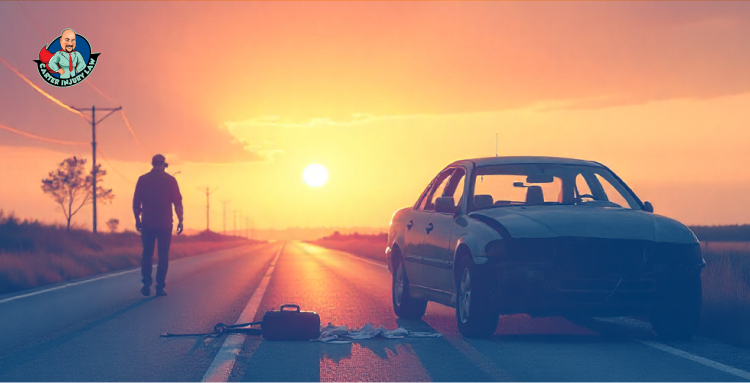
Many people convince themselves that hiring a lawyer is an extravagance, something reserved for blockbuster lawsuits with headlines and camera crews. After a Florida car accident, that belief is one of the most expensive myths to cling to. The truth is less cinematic and far more painful.
Complex laws, simple traps. Florida’s accident system is wrapped in statutes, deadlines, and exceptions that are easy to overlook. Miss a filing deadline or fail to document correctly, and your case may collapse before it begins.
Insurance loves a solo act. Adjusters know that without legal representation, you are more likely to accept the first offer, no matter how insulting. Data from the Insurance Research Council shows that unrepresented victims routinely settle for a fraction of what they could have received.
Stress disguises itself as strength. People tell themselves they can manage the phone calls, the forms, the negotiations, while healing from injuries. In reality, every unanswered question becomes another weight on a body already bruised.
The problem is not just the crash itself, it is the aftershocks that ripple through your finances, your health, and your sense of control. And this is where most people realize too late that skipping professional guidance is not a shortcut, it is a detour into deeper loss.
We Carry the Weight You Shouldn’t Have to Bear
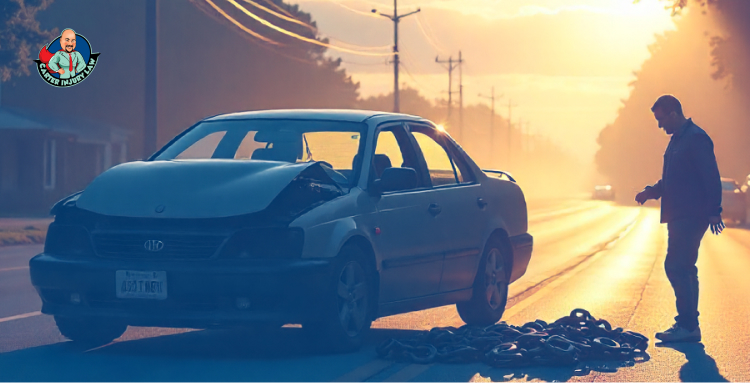
Survival is not the same as recovery. You can patch your car, you can ice your neck, but without someone to navigate the labyrinth, you are left standing at the entrance, exhausted before the first turn.
We do not promise you perfection, because life already broke that illusion on the road. What we promise is protection, strategy, and a voice that does not bend when yours trembles. In a state where one wrong word can erase your claim, Carter Injury Law makes sure your story is not only heard but also respected.
Expert knowledge of Florida law. We make sure that everything is filed correctly and on time, so you never have to pay a penalty for a technicality.
Communication with insurers should be strategic. Adjusters speak in euphemisms and loopholes. We are there as your translator and advocate, ensuring that your words and your story cannot be twisted against you.
We coordinate with healthcare providers to make sure every injury is documented properly, protecting your entitlement to compensation.
The data shows that represented clients receive significantly higher payouts. We negotiate assertively, looking for what you deserve rather than what the insurance company hopes you will accept.
We work on a contingency fee basis, which is a fancy way of saying you do not pay us unless we win for you. No upfront bills, no awkward conversations about hourly rates while you are still reeling from the crash.
If we succeed, our fee comes from the recovery we secure, not from your wallet while you are still picking up the pieces. In other words, we only succeed when you do. The accident may not have been your choice, but how you rise from it can be.

Why You Should Consider a Lawyer for Your Florida Workers Compensation Claim
No one wakes up expecting their day to be interrupted by pain. You punch in, go through the motions, maybe even plan dinner in your head. But the body is a fragile machine, and the workplace doesn’t always wait for caution. One misstep, one sharp twist, and suddenly, you’re part of a process that sees you more as a case file than a person.
In Florida, the rules around workers’ compensation aren’t written with compassion in mind. They’re structured, technical, and filled with decisions made by people who’ve never met you. You start out thinking the system is there to help, but somewhere between the paperwork, the insurance adjusters, and the company-approved doctors, that idea begins to crack.
And here’s where it gets interesting in a way that makes all the difference if you’re not careful…
1) Why You Need A Lawyer Now
Workers’ compensation in Florida isn’t small potatoes. We’re talking billions in benefits distributed every year. However, the system doesn’t just hand out those benefits like coupons at a grocery store. It filters, delays, and, in many cases, denies.
Plenty of folks get that first “no” and assume it’s the end of the line. What they don’t realize is that the denial rate is higher than expected, and yet many of those cases could’ve been turned around with the right legal help. Because lawyers know how to speak the system’s language, spot red flags early, and push back when things start to slip sideways.
And this brings us to the part about the difficulties you'll face while swimming through this murky water...
2) What’s at Stake Without Legal Help

Getting hurt at work is rarely simple. On the surface, it might look like a cut-and-dry injury, but once you’re in the system, the layers start to show. Sometimes you’re not just dealing with the pain itself but with the paperwork delays, awkward conversations with supervisors, or worse, outright denial of your claim.
For starters, benefits don’t always show up when you expect them. It’s not uncommon for workers to face delays or complete denials without a clear explanation. Often it comes down to paperwork technicalities or vague pushback from the insurance companies. If you don’t know what to look for, you may not even realize something’s wrong until it’s too late to fix it easily.
Then there’s the return-to-work issue. Some employers, intentionally or not, push injured workers to come back before they’re ready. Maybe it’s light duty that isn’t actually all that light, or maybe it’s pressure masked as “support.” Either way, if your body’s not ready, you could end up worse off than when you started.
In more serious cases, people lose their jobs entirely after filing a claim. Florida is an at-will state, yes, but retaliation for reporting a workplace injury is a legal line that employers aren't supposed to cross. That doesn’t always stop them from trying.
And what if the injury turns out to be permanent? That opens up a whole different discussion. Disputes over permanent disability benefits are common and often complex. These cases involve medical testimony, ongoing care estimates, and the long-term financial impact of your condition. Most people aren’t equipped to fight that battle on their own.
On top of all that, some injuries trace back to equipment failures, unsafe conditions, or third parties like contractors or vendors. In those situations, you’re not just dealing with workers’ compensation anymore. You might have a separate personal injury case on your hands, which calls for a completely different approach.
And these complications aren’t rare. In fact, a report from Florida’s Division of Workers’ Compensation showed that nearly 1 in 5 workers’ comp cases ended up in formal dispute resolution. So, if your situation feels messy or like something just isn’t adding up, it probably isn’t.
3) Why Carter Injury Law Always Makes a Difference
Getting through Florida’s workers’ compensation system requires experience, strategy, and a genuine commitment to each client. Carter Injury Law combines all three. We know the ins and outs of the state’s laws and have a track record of negotiating claims that others might overlook or undervalue.
What sets us apart is our approach. Every case is personal, not just another file on the desk. From the first free consultation, you’re treated like a partner, not a number. And the best part is that you don’t pay a dime unless we win the case. It’s a risk-free way to make sure you have someone who’s truly invested in your recovery and your future.
With that kind of support, you’re facing it with a team that’s got your back. Next, let’s take a quick look at what the workers’ compensation system covers in Florida, so you know exactly what’s at stake.
4) The Basics of Florida Workers’ Compensation

Florida’s workers’ compensation system is designed to protect you when the unexpected happens on the job. If you’re injured while working, chances are you’re covered for a slip, a fall, or a repetitive strain injury. Over 80% of Florida employers carry workers’ comp insurance (Florida Division of Workers’ Compensation), meaning most workers have access to benefits when accidents occur.
Those benefits cover necessary medical treatment to get you back on your feet, wage replacement to help ease the financial strain when you can’t work, and disability payments if your injury affects your ability to return to your job long-term.
Knowing these basics can make a big difference when it’s time to file your claim. However, understanding the system is one thing and dealing with it successfully is another.
Next, we’ll walk through what the claims process really looks like.
Check out some of our most relevant blogs:
5) What to Expect in the Claims Process
Filing a workers’ compensation claim is a series of important steps that have to happen just right. First, you report your injury to your employer as soon as possible to create an official record. Then comes filing the claim with Florida’s Division of Workers’ Compensation, which kicks off the formal process.
Next up are medical evaluations. You’ll be examined by doctors who assess your injury, sometimes including independent medical exams requested by the insurance company. These evaluations play a big role in deciding what benefits you’re entitled to.
Finally, if all goes smoothly, you move toward settlement talks. However, “smoothly” can be a stretch when paperwork errors, missed deadlines, or unclear medical reports can delay or derail your claim. That’s where timing matters most; a missed deadline in Florida can cost you the chance to get benefits.
Having legal support through all of this means you have someone watching for these pitfalls, making sure your forms are filed correctly, and deadlines are met. A lawyer keeps the process moving and pushes back against any insurance company tactics designed to slow you down or reduce your benefits.
6) You Deserve Support During Tough Times
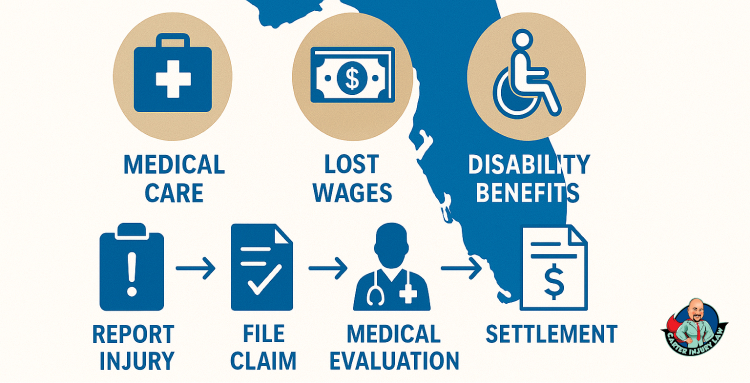
The earlier you reach out for help, the better. Waiting until problems arise can cost you valuable time and benefits. Getting advice from a trusted professional at the start means you can avoid common pitfalls and devote yourself to recuperation.
If you find yourself wondering what to do next or feeling unsure about your claim, don’t hesitate. Support is available, and you deserve it.
Reach out today by calling or visiting our website. Whether you have questions, concerns, or just want to know where to start, Carter Injury Law is ready to listen and guide you with care and expertise.

Injured at Work in Florida? Here's How Carter Injury Law Can Help
No one clocks in thinking they’ll leave in an ambulance. You show up ready to work, maybe a little tired, maybe distracted, but ready. Then suddenly, in the blink of an eye, a slip on a wet floor, a piece of machinery that doesn’t behave as it should, or one wrong step changes everything. What started as a normal day turns into a moment that shakes you physically, emotionally, and financially.
It’s not just the pain in your body that you have to manage. It's the weight of missed work, mounting bills, and the quiet fear of what this injury will mean for you or your family. That security you had, the idea that your job was a steady ground beneath your feet, starts to feel like it’s slipping away.
You might assume your employer or their insurance has it handled. That someone’s looking out for you. However the system is not built for comfort. It’s built for cost control.
And that’s where things start to get tricky…
1) Immediate Support After a Workplace Injury
You’re hurt, your adrenaline’s spiking, and suddenly there’s a clipboard in your face. It’s not just pain now, it’s also paperwork.
The first move? Say something. In Florida, the clock starts ticking the moment the injury happens. You’re expected to report it within 30 days, but waiting even a few days can give insurance adjusters just enough room to raise an eyebrow. Late notice is one of the most common reasons claims hit a wall. Over 80% of disputes start with how and when the injury was reported (Florida Division of Workers’ Compensation).
Next, see a doctor approved by your employer or their insurance. Skipping this step or picking your own provider without permission can complicate your case later. Documentation matters, and so does the source.
This early window sets the tone for your entire claim. Do it right, and you’re laying a solid foundation. However, even with the best start, Florida’s workers’ compensation process has its own hurdles. And not all of them are easy to spot.
Let’s talk about the system you’re about to walk into.
2) Florida’s Workers’ Compensation System

Once you’ve reported the injury and seen a doctor, you’re officially in the system. However, they have rules, but they also have friction.
Florida’s workers’ compensation law is supposed to cover your medical treatment, a portion of your lost wages, and, in some cases, rehab or retraining. Sounds straightforward. However, what’s written on paper doesn’t always play out cleanly in practice.
Insurance companies are known to push back. They might question the severity of your injury, suggest it wasn’t work-related, or insist you’re ready to return before you actually are. Some claims stall out for weeks. Others get denied entirely. In fact, nearly 30% of workers’ comp claims in Florida hit a wall due to disputes or delays (National Academy of Social Insurance).
It’s a system that works for the system. And when your injury begins to interfere with your job, independence, and sleep, you may require more than just a claim number and a case manager. Sometimes, the real problem isn’t just what happened at work, but who else might be involved. Let’s go there.
3) When Workers’ Compensation Isn’t Enough
Workers’ compensation has limits. It’ll cover some medical bills and lost wages, sure, but pain, long-term disability, or full income loss is outside its jurisdiction.
Now, here’s where it gets interesting. If someone other than your employer caused your injury, you may be able to file a separate claim. This is not a case of double dipping. It's about holding the right people responsible.
Identifying that third party early can make all the difference. However, knowing who to name and how to prove it? That's where legal counsel comes in.
Which brings us to the point where having someone on your side who understands how to play the long game can often make all the difference.
4) Carter Injury Law's Game Plan for Increasing Your Compensation
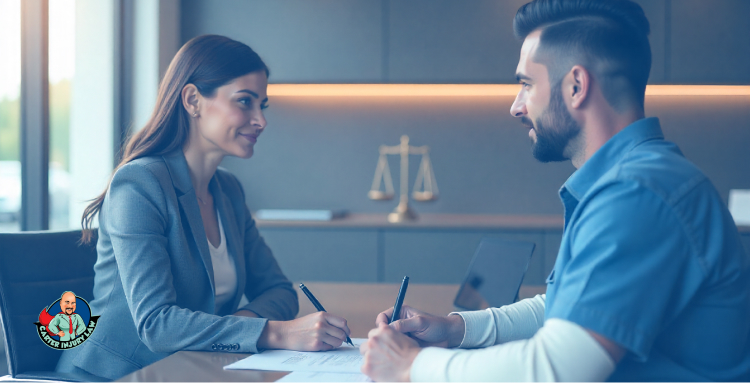
Carter Injury Law handles both sides of the coin. The structured grind of workers’ compensation and the nuance of personal injury law. That dual focus means fewer dropped balls, a tighter case strategy, and less of the waiting game.
Deadlines? Managed. Disputes? Anticipated. We know how to spot weak points in an insurer’s pushback and how to build leverage during negotiations. Whether it’s a denied claim or a third-party suit, we stay one step ahead on paper and at the table.
The payoff speaks for itself. According to the American Bar Association, people who work with experienced injury attorneys see up to 40% higher settlements on average. That’s not fluff; rather, it’s preparation meeting pressure.
And while that number matters, what matters more is what it buys back, like recovery time, financial stability, and a sense that someone’s actually fighting for you.
Next, let’s look at why Carter Injury Law stands out from the crowd and why it might be the best call you make this year.
5) The Benefits of Choosing Carter Injury Law
Not every law firm feels like a good fit. Some are quick to take your case, slower to return your calls. Carter Injury Law does it differently.
First, there’s no upfront cost. We work on contingency, which means they don’t get paid unless you do. That alone shifts the dynamic. We are not billing you for time, we’re working for your outcome.
Second, the consult is free. Whether your injury happened yesterday or you’ve been stuck in a claim for months, you can talk through your situation without pressure. No forms in triplicate, no sales pitch.
What stands out most is how personal the approach is. This isn’t a volume firm. You’re not just case number 238B. They listen. They explain. They actually remember the details of your story.
And being rooted in Tampa means they know the ins and outs of Florida’s system, the local companies and the way hearings really play out.
You’ve got one more step, and it’s simple. Let’s lay it out.
Want to learn more about your rights after a personal injury? Check out our related posts
Dog Bites in Florida: What You Need to Know About Your Rights
Protecting Your Rights As a Cyclist - What to Do After an Accident
6) Getting in Touch by Taking the Next Step
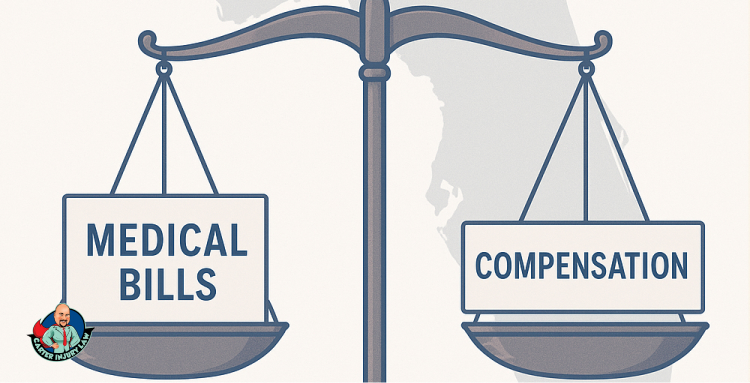
You’ve been carrying a lot of pain, paperwork, and pressure to stay strong while everything around you feels off-balance. Asking for help might not come naturally.
So, when you’re ready, reaching out is simple. We offer free consultations, and scheduling one takes less time than ordering lunch. Call, fill out the short form on our site, or stop by the office if you’re nearby.
To make the most of that first conversation, it helps to have a few basics ready, like when and where the injury happened, who was involved, and any documents or medical notes you’ve already received. You don’t need to have it all figured out. That’s part of what the consult is for.
The important part is not waiting too long. There are deadlines in place that can quietly chip away at your options if you let them. Acting early means protecting your rights while you still have the leverage.
Don’t panic right now. You’ve just found a place to start. And sometimes, that’s the thing that shifts everything back into motion.

Fired After Filing for Workers Compensation? Here’s What You Need to Know
Some things knock the wind out of you. A workplace injury is one. Getting fired while you’re still recovering is another. You start to question what just happened. Was it bad timing, or something more deliberate?
In a perfect world, standing up for your health wouldn’t put your job on the line. However, reality has sharper edges. Employers sometimes make choices that feel like punishment in disguise, and if you've filed for workers' compensation, you might be wondering if that played a role.
Let’s unpack what’s going on, what your rights are, and how you can protect yourself from being taken advantage of when you’re already down.
1) Florida Law Does Not Let Employers Fire You Just Because You Filed a Claim
Filing for workers’ compensation isn’t asking for a favor. It's using a right the law gives you. In Florida, that right is protected by Statute § 440.205, which clearly states that no employer is allowed to fire, intimidate, or coerce an employee just for filing or attempting to file a workers’ compensation claim.
This means if you were injured while doing your job and followed the proper steps to report it, your employer can’t legally punish you for it. They don’t get to decide you’ve become inconvenient. They don’t get to take away your paycheck because you followed the law.
Florida’s workers’ compensation system exists to make sure injured employees get medical care and wage replacement without having to sue their employer. The law is structured so that filing a claim should be treated as part of the workplace protections every employee in the state is entitled to.
If your employment ended after you filed that claim, timing matters. So does what your employer said (or didn’t say). A pattern of retaliation doesn’t always start with one event, it can unfold over weeks.
2) Being an At-Will Employee Does Not Cancel Your Legal Protections
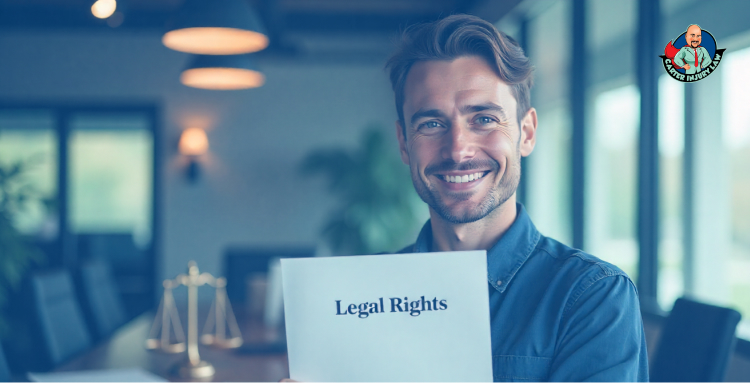
A lot of people hear the phrase “at-will employment” and assume that means an employer can fire someone for any reason at any time. While Florida is indeed an at-will state, there are limits. Employers still have to follow anti-retaliation laws, and firing someone for exercising a legal right, like filing for workers’ compensation, is not allowed.
The confusion comes from how the term “at-will” is used. It sounds like a blank check for employers, though it doesn’t erase legal protections written directly into Florida law. One national study by the National Employment Law Project (NELP) found that over 20 percent of low-wage workers reported facing discipline after they reported an injury on the job. That statistic alone shows how often retaliation hides behind the label of “at-will.”
If someone gets let go shortly after filing a claim, even if the employer offers a vague excuse, that timing often raises red flags. Being “at-will” doesn’t mean Florida workers lose the right to a fair workplace after getting hurt.
3) Retaliation Does Not Always Come With a Pink Slip
Sometimes, retaliation shows up in quieter ways. You might not get fired right away. Instead, you start seeing changes that make your job harder or less secure, shifts cut without warning, a surprise negative review, or a demotion that no one can clearly explain.
These moves aren’t always announced as retaliation, though the pattern usually speaks for itself. The Occupational Safety and Health Administration (OSHA) receives over 3,000 retaliation complaints every year across the U.S., and many come from workers who were still technically employed when the retaliation began.
In one Florida case, an appeals court looked at a worker who was moved to less favorable duties after filing for benefits. The court didn’t need a termination letter to recognize something had gone wrong. That’s the thing, retaliation doesn’t always need a pink slip to cause damage.
4) You Still Have Legal Rights Even After You Are Fired
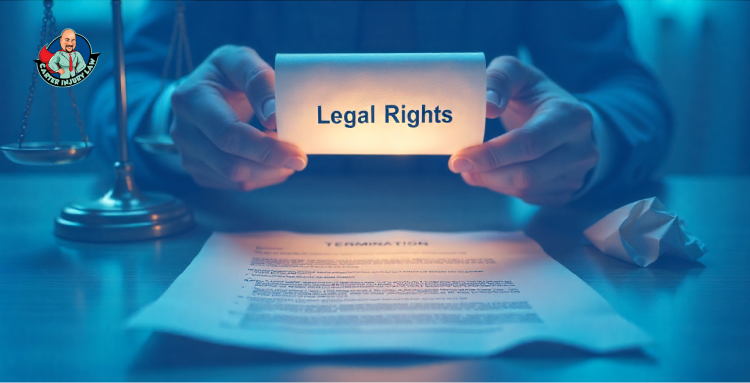
Getting fired after a work injury can feel like the end of the road. It’s not. Florida law offers a clear path forward. Under Florida Statute § 440.205, workers who believe they were terminated for filing a workers’ compensation claim can file a retaliation complaint.
There’s a deadline to act, and it matters: workers generally have a limited time from the date of the retaliatory action to take legal steps. That’s enough time to gather facts and get advice, though not something to put off.
Legal remedies can include reinstatement, back pay, or compensation for emotional distress. Every situation is different, and outcomes vary. What matters most is that Florida workers are not expected to walk away without answers, or options.
Want to learn more about your rights after a workplace injury? Check out our related posts
Dog Bites in Florida: What You Need to Know About Your Rights
Protecting Your Rights As a Cyclist - What to Do After an Accident
5) When You Are Not Fired but Work Becomes Unbearable
Sometimes, retaliation doesn’t result in a clear termination. Instead, the workplace changes so much that staying becomes impossible. This is called constructive discharge, where the environment becomes so toxic or hostile that quitting becomes the only real option.
In these cases, employers may claim the employee left voluntarily. What really happened is often much more complicated. The key is recognizing the shift in treatment and keeping a record of how things changed after the claim was filed. Were you excluded from meetings? Suddenly micromanaged? Given unrealistic deadlines?
Even if no one else has acknowledged what’s going on, your experience counts. It’s not about proving someone yelled or made a scene. It’s about the bigger picture, the shift in tone, in treatment, in expectations. Those changes are worth tracking, and they often speak louder than official memos ever do.
6) Steps to Take if You Think Your Employer Is Retaliating
If something feels off at work after you’ve filed a claim, there are a few steps you can take to protect yourself, no guesswork required.
Start by documenting everything. Changes in work assignments, new rules, performance reviews, or anything else that feels out of sync with how things worked before. Save texts, emails, meeting notes, or even voicemail transcripts if they show a change in how you’re treated.
Talk to an employment lawyer in Florida as early as possible. Even if you’re unsure what the next step should be, that early legal advice helps preserve your options and protect any claims before deadlines run out. The sooner you understand what’s happening, the more likely it is that you can respond with clarity rather than reacting under pressure.
7) You Are Not Imagining Things if the Timing Feels Off

Many workers hesitate to speak up because they’re unsure if what they’re feeling is real. They wonder if they’re overthinking things or reading too much into events. That hesitation is common, and it makes retaliation harder to name.
Timing, however, speaks volumes. If your dismissal or mistreatment followed shortly after a workers’ compensation claim, the pattern itself becomes a key part of the story. According to EEOC data, retaliation is the most common workplace discrimination complaint in the U.S, a reminder that this isn’t rare or overblown. It’s a documented reality.
Noticing the pattern doesn’t mean jumping to conclusions. It means paying attention and taking your experience seriously. If the timing feels too exact to be coincidence, you’re likely not the only one who would see it that way.
Fired for Filing a Workers Compensation Claim in Florida? Carter Injury Law Fights Back When Employers Cross the Line
Think the timing feels off after filing your workers’ comp claim? You’re not overthinking it. We’ve helped workers across Florida who suddenly faced schedule changes, write-ups, or cold treatment right after speaking up. That kind of pattern often points to retaliation, and Florida law does not allow it.
We look closely at what shifted after the injury report. A demotion, a drop in hours, or a wave of hostility can speak volumes. We don’t take that lightly. We build legal responses grounded in real facts, not assumptions. Workers' comp is your right, not something you need permission to claim.
If your workplace changed overnight, let’s talk. We’ll listen first, explain your protections under Florida law, and help you decide what to do next. Contact us, we’re ready to step in when employers cross the line.

What to Do If Your Florida Workers Compensation Claim Is Denied
You did everything by the book. Got hurt on the job, reported it, saw the doctor, and filed your workers’ comp claim. Then, out of nowhere, the denial letter shows up.
Now what?
Take a breath. You’re not alone. In Florida, denials like this are more common than most people realize. A denied claim isn’t a dead end. It’s just the start of a tougher road.
So, why did it get denied? And more importantly, what can you do about it? Let’s break it down but be ready, because the next part might surprise you.
(I) 4 Common Reasons for Denied Workers Compensation in Florida
Having a workers' compensation claim denied can feel like a punch in the stomach, especially if you are already dealing with an injury. However, understanding why claims are denied is the first step toward turning things around. In Florida, certain reasons reoccur. Understanding these common pitfalls can help you avoid making mistakes.
1. You Missed the 30-Day Reporting Deadline
Florida law requires you to report any workplace injuries to your employer within 30 days of the incident. If you have an occupational illness, the clock starts ticking the day your doctor tells you it is work-related.
If you miss this deadline, your claim may be denied, even if your injury is legitimate. Insurers frequently argue that delays indicate that the injury was not serious or occurred outside of the workplace.
2. Your Employer Disputes That the Injury Happened at Work
Employers or their insurers may argue that your injury occurred outside of the workplace. They might argue that:
You were off the clock
You were doing something outside your job duties
The injury happened elsewhere
Florida law requires that your injury happen "in the course and scope of employment." If your boss tells you otherwise, that's a red flag for denial.
3. There Is Insufficient Medical Documentation
Insurers examine medical records. If your paperwork is missing, inconsistent, or does not clearly link your injury to your job, they may reject your claim.
Additionally, Florida requires treatment from an authorized medical provider. Visiting your personal doctor without authorization? That might be a problem.
4. The Injury Involved Horseplay, Intoxication, or a Pre-Existing Condition
Florida law exempts the following situations from workers' compensation coverage:
Horseplay: Getting hurt while goofing off at work? That is your responsibility.
Intoxication: If you were under the influence when the incident occurred, your claim may be denied.
Pre-existing conditions: If your injury is the result of a previous condition and the work incident was not the major contributing cause (more than 50%), your claim may be denied.
(II) How to Fight a Denied Work Injury Claim: Step-by-Step
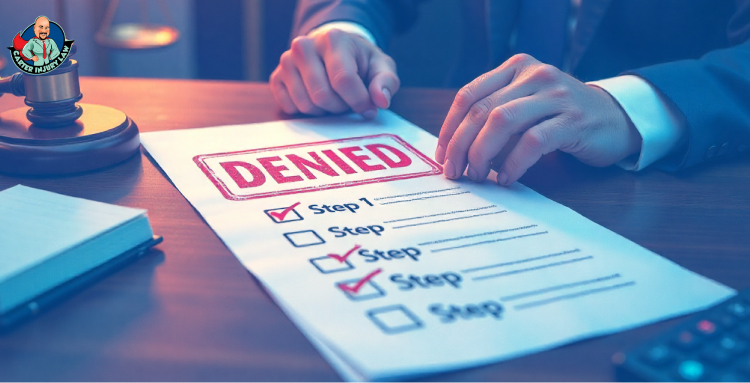
Receiving a denial on your workers' compensation claim can be discouraging; however, it does not mean the end of your search for fair compensation. Here's a step-by-step guide for successfully challenging a denied claim in Florida.
1. Maintain Thorough Documentation
Accurate record-keeping is essential. Save all relevant materials, including:
Detailed incident reports describing the nature and circumstances of the injury
Comprehensive medical records that document diagnosis, treatment, and work-related causation.
Written communications with your employer and insurance company
Statements of witnesses who can confirm the injury
According to Florida law, a Petition for Benefits must be filed within 2 years of the injury date or one year of the last authorized medical treatment or indemnity payment, whichever occurs later.
2. Request a Formal Explanation for Denial
Obtain a detailed, written statement from your employer or their workers' compensation insurer that explains the specific reasons for denial. Understanding their reasoning will enable you and your legal counsel to prepare an appropriate response.
3. Consult with an Experienced Florida Workers’ Compensation Attorney
It is strongly recommended that you hire a qualified attorney who is knowledgeable about Florida workers' compensation laws. Legal representation offers significant advantages, including:
Petitions and paperwork should be filed properly.
Evidence collection and presentation should be done strategically.
Representation at mediations and formal hearings
“Workers/claimants with legal representation are 47% more likely to have their claims approved.”
Source—Workers Compensation Research Institute, WCRI
They also tend to receive higher indemnity payments. This means that not only are your chances of approval increased, also the financial compensation you receive is frequently significantly higher when you have skilled legal representation on your side.
4. Follow the Formal Appeals Process
If initial informal resolution attempts fail, the following step is to initiate formal proceedings before the Florida Division of Administrative Hearings:
Pretrial Conference: A judge of compensation claims establishes procedural schedules and attempts to facilitate settlements.
Formal Hearing: Each party presents evidence and legal arguments. The judge makes a binding decision within 30 days.
Further Appeal: Unfavorable decisions can be appealed to the Florida District Court of Appeal within 30 days.
(III) Filing a Workers Compensation Appeal in Florida: What to Expect
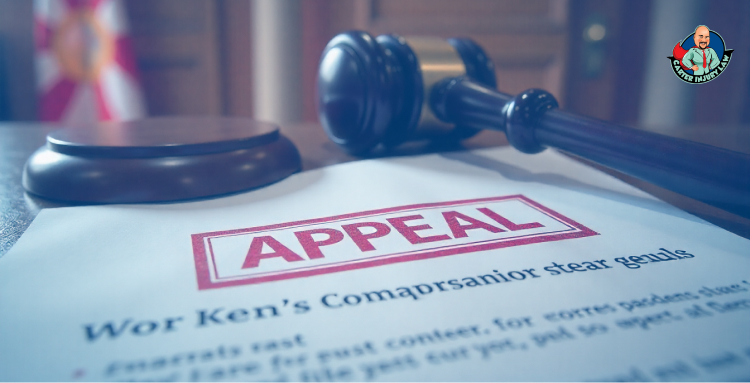
If your workers' compensation claim has been denied in Florida, you have the right to appeal the decision. Understanding the process and timelines is crucial to ensure your appeal is handled effectively.
Timeframe for Filing an Appeal
Under Florida law, you must file a Petition for Benefits within:
Two years from the date of your injury, or
One year from the date of your last received benefit or authorized medical treatment, whichever is later.
Failure to meet these deadlines may result in the forfeiture of your right to appeal.
Steps in the Florida Workers' Compensation Appeal Process
Petition for Benefits
Initiate the appeal by filing a Petition for Benefits with the Florida Office of the Judges of Compensation Claims (OJCC). This petition should detail the benefits you're seeking and the reasons for the appeal.Mediation
After filing, a mediation conference is scheduled, typically within 130 days. This informal meeting involves you, your employer, the insurance carrier, and a neutral mediator aiming to resolve the dispute amicably.Pre-Trial Hearing
If mediation doesn't lead to a resolution, a pre-trial hearing is conducted. Here, both parties outline the issues, present evidence, and identify witnesses in preparation for the final hearing.Final Hearing
The final hearing before a Judge of Compensation Claims is held within 210 days of filing the petition. During this formal proceeding, both sides present their cases, and the judge renders a decision.
Anticipate Potential Delays
While the process has defined timelines, various factors can cause delays. It's essential to remain patient and maintain open communication with your legal representative throughout the process.
Mediation Outcomes
Mediation plays a pivotal role in the appeal process. According to the Florida Division of Administrative Hearings, over 25% of disputed workers' compensation claims in Florida are settled during mediation.
(IV) Get Legal Help from Carter Injury Law
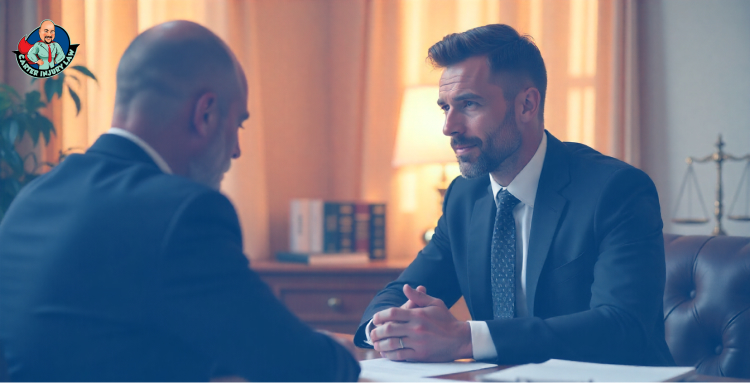
Getting injured at work is difficult enough. Being denied the benefits you rightfully deserve? That's a completely new level of stress. We understand you didn't ask for a legal battle; all you want is to heal, pay your bills, and move on. Carter Injury Law provides clarity, direction, and an unwavering commitment to help you move forward with confidence.
Our team understands the system inside and out, and we know how to use it in your favor. We handle every legal step with care and precision, from filing your workers' compensation appeal to representing you in mediation or a final hearing. We're here to protect your rights and help you get the best possible outcome in your case.
You'll always know the status of your case. We keep you informed, explain the process clearly, and ensure that every question is answered directly. Carter Injury Law provides you with more than just legal representation; you also gain a partner who is completely committed to your recovery.
Call us today at 813-922-0228 or visit carterinjurylaw.com for a free case review. Your next step forward starts here, and we’re ready to walk it with you.

Understanding the Difference Between Workers Compensation and Personal Injury
When you've been injured on the job, the last thing you want is to be confused about your legal options. Yet for many Florida workers, the difference between a workers compensation claim and a personal injury lawsuit is the make-or-break factor in whether they’ll receive the full support they need to recover.
Both legal options exist to protect injured people; however, they operate in very different ways. Choosing the wrong path could mean missing out on compensation you’re legally entitled to or worse, being stuck with bills and wage losses you can’t afford.
So, let’s walk through your options together.
1) Difference Between Workers Compensation and Personal Injury
When you’ve suffered an injury on the job, one of the first legal decisions you’ll face is whether to pursue a workers compensation claim or a personal injury lawsuit. Both offer a way to recover damages. However, they operate under entirely different rules, timelines, and compensation limits.
(I) Workers Compensation, A No-Fault, State-Regulated System
Workers compensation is a form of insurance that your employer is legally required to carry in Florida if they have four or more employees (or just one, if they’re in construction). It doesn’t matter who caused the accident. Even if it was your mistake, you’re still entitled to benefits if the injury happened while performing work-related duties.
This system is intended to get you support quickly, without the burden of proving fault. You’ll typically receive:
Full coverage of necessary medical treatment
A portion of your lost wages (usually 66⅔% of your average weekly earnings, up to the state’s cap)
Disability benefits (temporary or permanent)
Vocational rehabilitation, if needed
However, you cannot sue your employer for negligence if you accept workers compensation. That’s the tradeoff. It’s a system built for speed and stability, not maximum financial recovery. Industry reports estimate that well over 90% of workplace injury claims are resolved through workers compensation, not lawsuits.
(II) Personal Injury, Fault-Based Yet Financially Reliable
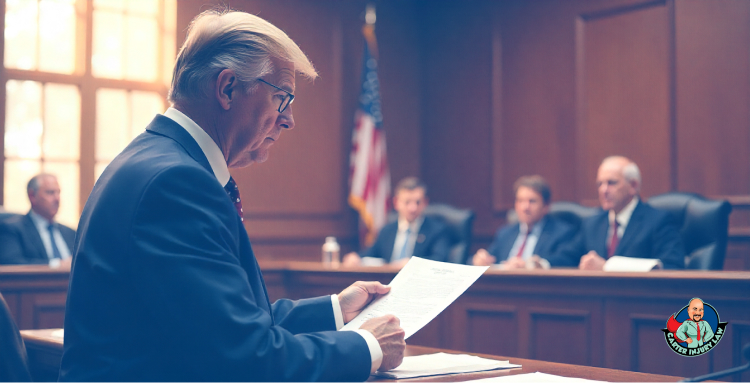
Personal injury law, by contrast, requires proof that someone else’s negligence or wrongful act caused your injury. This could be your employer if they intentionally ignored safety protocols or a third party, like a subcontractor or equipment manufacturer.
What makes personal injury lawsuits appealing (and in some cases, necessary) is the scope of damages available. Unlike workers compensation, a lawsuit can cover:
100% of your lost income , both past and future
Medical expenses (including long-term or experimental treatments)
Pain and suffering
Emotional distress
Loss of enjoyment of life
Punitive damages, in rare cases
However, personal injury cases take time. They involve investigations, negotiations, and sometimes trial. And most importantly, they require evidence of fault.
(III) Who Qualifies for What?
You’re eligible for workers compensation if you’re an employee in Florida and your injury occurred during the course of your employment. This includes injuries from sudden accidents or cumulative trauma (like repetitive strain).
You may qualify for a personal injury claim if:
A third party (not your employer) caused or contributed to your injury
Your employer acted with gross negligence or deliberate misconduct
You were injured due to unsafe premises, faulty equipment, or untrained subcontractors
Your employer failed to carry legally required workers comp insurance
In some exceptional cases, you may even pursue both workers compensation from your employer and a third-party personal injury lawsuit simultaneously.
2) What Does Workers’ Compensation Cover in Florida?
In Florida, workers’ compensation offers a no-fault safety net, meaning you don’t need to prove your employer did anything wrong. If your injury happened on the job and your claim is accepted, you’re entitled to specific benefits defined by law. Here's what that includes:
(I) Medical Care
All authorized medical treatment related to your injury is covered, such as hospital visits, surgeries, prescriptions, diagnostics, therapy, and mileage to appointments. You must use providers approved by your employer’s insurance company.
(II) Lost Wages
After being out of work for seven calendar days (or starting from Day 1 if the disability lasts more than 21 days), you become eligible for wage replacement. That’s 66⅔% of your average weekly wage, up to a legal maximum of $1,295 per week for injuries starting in 2025.
(III) Disability Benefits
Depending on your recovery, you may qualify for:
Temporary Total Disability (TTD): if you’re totally out of work
Temporary Partial Disability (TPD): if you can work with restrictions and earn less
Permanent Impairment Benefits (IIB): when you reach maximum medical improvement but still have lasting impairment
Permanent Total Disability (PTD): if you’re unable to work at all, even in other fields
(IV) Vocational Rehabilitation
If you can’t return to your previous job, Florida law may entitle you to vocational rehabilitation services. This includes vocational counseling, job skills training, transferable skills analysis, and job placement support. These services help you return to suitable gainful employment.
3) Can You Sue Your Employer Instead of Filing for Compensation?
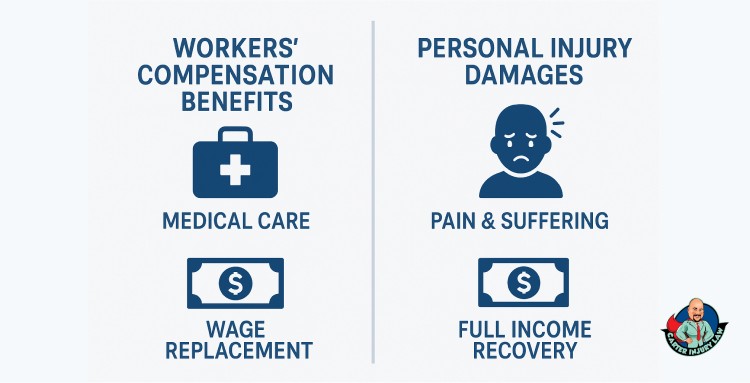
Under Florida law, most injured workers can’t sue their employer directly. That’s because of the “exclusive remedy” rule under Florida Statutes § 440.11, which means workers’ compensation is typically your only legal option if your employer has coverage.
However, exceptions do exist, and they can make all the difference in your case.
No Workers’ Comp Insurance? If your employer doesn’t carry the required workers’ comp insurance, you’re no longer limited to the workers’ comp system. In this situation, you may file a personal injury lawsuit, potentially recovering damages for pain and suffering, emotional distress, and more things workers’ compensation never covers.
📎 Source: Florida Division of Workers' Compensation
Third-party liability can offer legal options. Your employer is not to blame for every workplace injury. If your accident was caused by someone other than your employer, a subcontractor, delivery driver, equipment manufacturer, etc., you may be able to file a third-party lawsuit, even if you are receiving workers' compensation.
When an employer's actions go too far. While rare, lawsuits may be permitted if your employer's conduct exceeds negligence and crosses the line into intentional harm or gross misconduct. According to Florida Statutes § 440.11(1)(b), employers can take this action if they meet specific legal requirements.
Check out our most relevant blogs :
Should You File or Sue? Carter Injury Law Helps You Decide
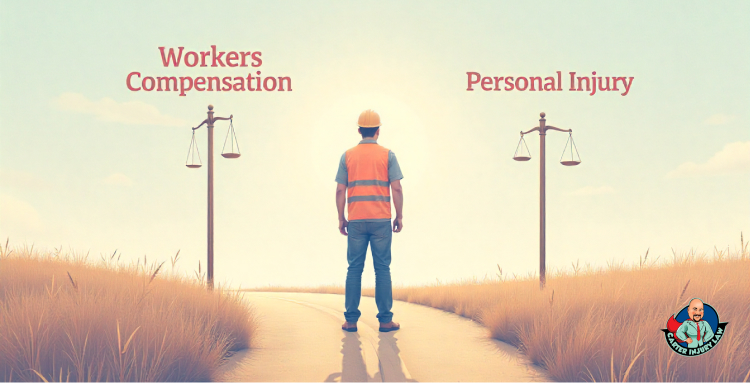
Every injury has a story. Maybe it was a fall. Maybe you were using faulty equipment. Or maybe you were hurt by someone from another company entirely. No matter how it happened, Carter Injury Law is here to help you choose the legal path that puts your recovery first.
If you’re caught between filing a workers’ comp claim and wondering if you can sue your employer instead, you shouldn’t have to figure it out on your own. Florida law can be tricky, especially with its “exclusive remedy” rule; however, that doesn’t mean you’re without options. Choosing the right path isn’t about being litigious; it’s about protecting your future.”
We, the attorneys at Carter Injury Law, understand both sides of workplace injury law. Whether you’re eligible for traditional workers' comp, or your case involves third-party liability or even a rare exception that lets you sue your employer directly. We'll help you make the right move from the start.
Don't attempt this on your own. Reach out to Carter Injury Law for a free case evaluation. We’ll help you protect your rights, avoid delays, and maximize the compensation you deserve.

Florida Workers Compensation Explained: Your Rights After a Workplace Injury
Maybe it was a fall. Maybe your back gave out after years of heavy lifting. Maybe your hand slipped under a machine that should’ve been better guarded. Whatever happened, you’re now tangled in a system you didn’t ask to be part of. One that speaks in forms and deadlines when all you really want is to heal and breathe again.
You’ve probably heard the term workers compensation. But what does it actually mean in Florida? Who decides if your injury is “bad enough”? And what happens if your employer or their insurance company starts playing games?
The truth is, a lot of people never find out. But you’re here. And that changes everything. Because once you understand how the system works, you can make it work for you.
And it all starts with one question...Are they telling you the full story?
1) Florida Workers Compensation Lists Benefits Clearly Though the Reality Often Looks Different
Florida’s workers compensation law outlines a range of benefits that look solid on paper. These include payment for necessary medical care, partial wage replacement during recovery, and even job retraining in cases where a person’s work abilities are permanently altered. The system is meant to be a safety net for workers who get hurt doing their jobs.
Even though these benefits are written into law, the process to receive them often tells a different story. Many injured workers report delays in treatment authorizations, limited communication from insurance adjusters, and benefit checks that arrive weeks after they were supposed to.
According to NCCI Florida Data Report, only 59 percent of injured workers return to their previous positions, showing that a significant portion of people are left dealing with long-term disruptions. These numbers suggest that access to care and support does not always match what the statute claims to offer.
2) Reporting Your Injury on Time Makes a Huge Difference in What You Receive
Timing is a major factor in how a workers compensation claim moves forward in Florida. Once a work-related injury occurs, the law gives you a fixed period to report it to your employer. That deadline is not flexible. Even if the injury seems minor or you’re unsure how serious it is, waiting too long can shut down access to benefits entirely.
The Florida Division of Workers’ Compensation has reported that over 25 percent of claims face difficulties due to late reporting or missing information. Informal conversations with coworkers or supervisors often don’t meet the standard required under state law. A valid report needs to be clear, directed to the proper person, and preferably documented in writing. Filing quickly and correctly not only keeps your benefits available, it also creates a stronger case if any part of the process is challenged later.
3) Your Employer Chooses the Doctor and That Can Complicate Recovery
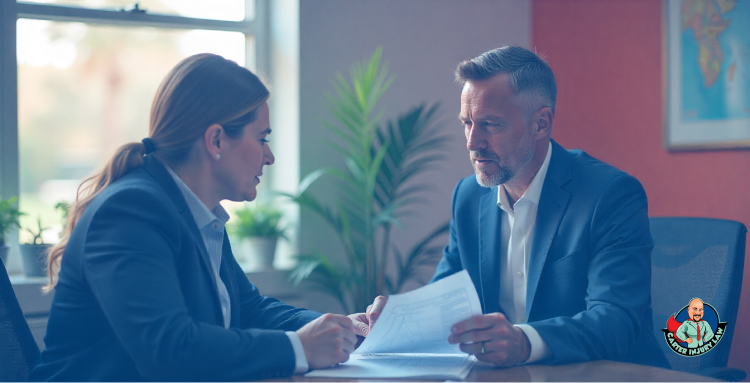
When it comes to medical treatment under workers compensation, most people are surprised to learn they won’t be choosing their own doctor. In Florida, employers and their insurance companies hold the authority to decide which medical providers handle your care. While this setup follows state law, it can create tension between what the injured worker needs and what the insurance carrier is prepared to approve.
Many workers say that these assigned doctors move too fast, focus heavily on return-to-work timelines, and are less concerned with the actual pain or long-term recovery. You do have one opportunity under the law to request a different doctor.
This request must be submitted in writing, and it only applies once. Making that change at the right moment can create a better path forward if you feel your concerns are not being fully addressed during appointments.
4) Your Lost Wages Are Replaced Up to a Limit Though the Math May Surprise You
Florida’s workers compensation system includes wage replacement as part of its core benefits. Injured workers who are temporarily unable to work may receive 66 and two-thirds percent of their average weekly wage, with a 2024 cap set at $1,260 per week according to the Florida DWC. These payments are meant to provide financial stability while you recover.
Still, the numbers don’t always match expectations. The calculation uses pre-injury earnings, which might not reflect overtime, bonuses, or side income. The classification of your injury, temporary total, temporary partial, or permanent impairment, also changes what you receive and how long payments continue.
Late medical updates, missing wage documentation, or communication gaps between the doctor and insurer can affect the timing and accuracy of payments. Staying organized and making sure everything is submitted correctly helps prevent unnecessary delays.
5) Retaliation Still Happens Even Though the Law Says It Should Not
Filing a workers compensation claim is supposed to be a protected action in Florida. The law is clear, employers are not allowed to retaliate against employees for reporting injuries or seeking benefits. Florida Statute 440.205 makes it unlawful to terminate, demote, or harass someone because they used the workers compensation system.
Still, retaliation remains a frequent issue. According to the EEOC’s 2023 report, workplace retaliation is the most common complaint filed nationwide. Workers describe being pushed into different shifts, removed from normal responsibilities, or left out of meetings after filing.
These changes may not always come with a formal explanation, though they can signal that the employer is unhappy about the claim. Keeping a written record of changes in treatment, job duties, or behavior from supervisors can help build a strong case if legal support becomes necessary later.
6) Most Injuries Stay Within the System Though Rare Situations May Open Other Doors

Workers compensation in Florida is built to operate as the sole remedy for most workplace injuries. That means once a claim is filed, it usually prevents the worker from suing the employer directly, even if negligence was involved. This system is meant to provide guaranteed support without needing to prove fault.
There are situations, however, where the standard claim process does not apply. If a third party, such as a contractor, manufacturer, or property manager, played a role in causing the injury, a separate legal claim may be possible. In addition, if the employer failed to carry required workers compensation coverage, the injured worker may be allowed to pursue damages through a different legal channel.
These circumstances remain relatively rare. The NCCI reports that fewer than 5 percent of cases involve legal action outside the workers comp system. Still, these paths should not be dismissed outright, especially when something in the case stands out as unusual.
7) When You Cannot Return to Your Old Job There Are Other Options to Consider
Injuries can change the direction of a career in ways that are hard to predict. Some workers reach the end of treatment and find they no longer meet the physical demands of their old job. Florida law includes options for those facing long-term restrictions.
These include vocational rehabilitation programs that help workers gain new skills or transition into a different field entirely. The Florida Division of Workers’ Compensation offers support services such as job placement assistance, educational grants, and retraining programs.
Often, these programs go unused simply because injured workers are not informed they exist. If returning to your prior role no longer feels realistic, exploring these programs may open a path toward more sustainable employment.
Visit our related posts for more context and next steps
Do I Have to Sue After an Accident? (And Why You Might Not Have To)
Can I Change My Lawyer During a Personal Injury Case in Florida?
8) Getting Help from a Lawyer Can Shift the Process in Your Favor
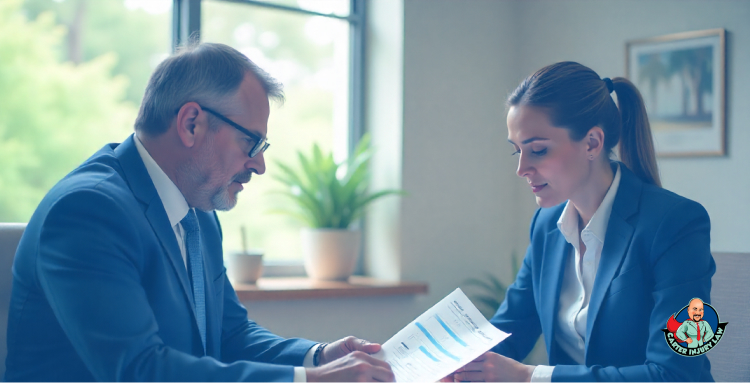
When medical updates slow down, wage payments stop without explanation, or communication with the insurance company becomes one-sided, many workers start feeling overwhelmed by the system’s complexity. These slowdowns are common, not necessarily because the worker did anything wrong, but because the system rarely moves efficiently on its own.
Having legal support can make a measurable difference. According to the Workers’ Injury Law & Advocacy Group’s 2022 findings, claims involving legal counsel are more likely to result in complete benefit payouts and fewer denials. A lawyer steps in to manage communication, challenge delays, and apply pressure where needed.
Legal assistance does not guarantee a perfect outcome, though it often brings clarity and control to a process that otherwise feels hard to follow. When the system stops working as it should, legal guidance becomes more than just useful, it becomes necessary.
What Carter Injury Law Wants Florida Workers to Know Before Giving Up on Their Claim
Getting hurt on the job often leads to more questions than answers. Some workers wait weeks without clear updates. Others get sent to rushed appointments that barely address the pain. The law lists benefits like wage replacement and medical care, though those promises can feel distant when forms go missing or calls go unanswered.
Carter Injury Law wants injured Florida workers to know they don’t have to settle for silence or stress. You can challenge a denial, request a new doctor, and take steps when retaliation happens. We’re here to keep your claim from falling through the cracks. Contact us to find out where your case stands and what you can still do.

Can You Sue a Third Party for a Workplace Injury in Florida?
There’s a certain script everyone expects after a work injury. You get hurt, you report it, you file for workers’ comp, and then you wait. Maybe the checks come through. Maybe they don’t. Either way, most people assume that’s the end of the story.
However, there are times when another thread is hidden in the background. A careless delivery driver. A contractor who didn’t follow protocol. A company that made a tool that never should’ve passed inspection.
And suddenly, the question changes. It's no longer just about how you got hurt, but also about who else could be to blame.
So before you close the book on your case, here’s what you need to know…
1) What Is a Third-Party Work Injury in Florida?
When you're hurt on the job, your mind usually goes straight to your employer. However, in Florida, not every work injury starts or ends there. Sometimes, the real problem comes from outside your company walls.
A “third party” just means someone who isn’t your employer or a coworker. Think of the extra players on the field. A subcontractor rushing a job. A distracted driver who hits you while you’re on a delivery route. A property manager who never fixed that stair railing. Even the company that made the defective tool in your hand when things went sideways.
These are the folks who can be held legally responsible in what’s called a third party work injury Florida claim. And they show up more often than you'd think.
Over 1 in 5 construction injuries involve a third party's negligence (Bureau of Labor Statistics). So if someone else’s mistake set off the chain of events that landed you in pain, you may have more than just a workers’ comp claim on your hands.
Let’s look at how that works and what makes it so different from the standard route.
2) Workers’ Comp vs. Suing a Third Party: What’s the Difference?
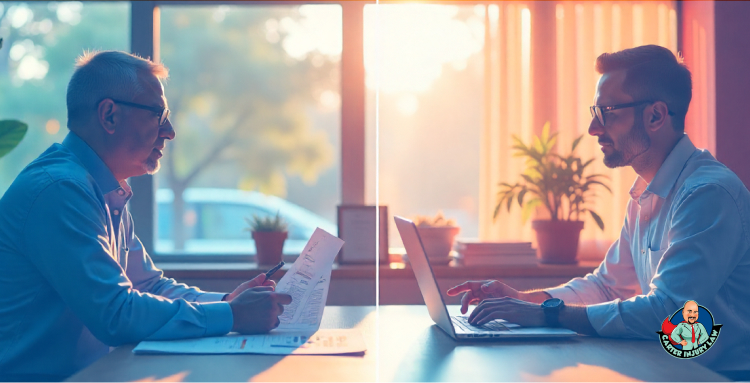
Workers’ comp is built to move quickly. You don’t have to prove fault, and in theory, you start getting help right away. It usually covers your medical treatment and a portion of your lost wages. However, workers’ comp doesn’t cover pain and suffering. It also doesn’t pay for everything you’ve missed, financially or otherwise.
A third-party claim comes into play at this point.
If someone outside your company caused the injury, you may be able to sue them directly. And that opens the door to compensation that actually reflects what you’ve been through. Full lost wages. Ongoing pain. Emotional distress. Even punitive damages if their actions were reckless enough.
You don’t have to pick one or the other. In many cases, you can pursue workers compensation and a third-party claim together. However, these cases get mixed up fast when insurance companies start fighting over who owes what.
Florida’s average workers’ comp payout lands between $20,000 and $40,000. Third-party settlements often go well beyond $100,000 (Florida Division of Workers’ Compensation Annual Report).
So how do you know if you can sue someone else? The next part’s where the story gets clearer.
3) When Can You Sue a Third Party for a Work Injury in Florida?
Not every work injury opens the door to a third-party claim. There are a few clear conditions that have to line up and when they do, it’s usually because someone outside your workplace made a preventable mistake.
Here’s the general rule:
That person or company had a responsibility to act with care.
They didn’t.
Their negligence directly led to your injury.
And they aren’t your employer.
Simple enough in theory. In real life, it shows up in all sorts of ways.
Maybe you slipped on a slick floor at a job site leased by another company. Maybe you were T-boned in traffic while making a delivery. Or maybe a scaffold collapsed beneath you because it was poorly designed or never inspected properly.
Each of these situations involves a third party stepping into a role they weren’t supposed to play, often with painful results.
Florida is one of the top 5 states where third-party liability claims arise in workplace injury cases (National Safety Council).
So, if something about your accident feels out of place, as if it came from somewhere else, it's time to investigate further. The next question is whether you can recover through both systems at once. And how to do it without losing your footing.
4) Can You Sue and Get Workers’ Comp at the Same Time?

The brief response is "yes." You can pursue both. However, like most things in law, there’s a catch hidden in the fine print.
If you file a third-party lawsuit and win or settle, part of that money might have to go back to the workers’ comp insurer. It's called subrogation, which is a fancy word for reimbursement. Basically, if your employer’s insurance already paid for your treatment or lost wages, they’ll likely want a portion of that back if someone else is held responsible.
That doesn’t mean you walk away empty handed. It just means the final math matters.
A skilled attorney can often reduce that repayment or restructure the settlement so you still walk away with more than what workers’ comp alone would’ve offered. This is where experience pays off, quite literally.
And if you’re wondering whether time is on your side with this kind of claim, that brings us to something most people overlook until it’s too late.
5) Florida's Legal Deadlines: Do Not Wait Too Long.
In Florida, you’ve got 30 days to report a work injury to your employer if you plan to claim workers’ comp. That clock starts ticking the moment you get hurt, even if you’re hoping the pain will just go away.
For a third-party lawsuit, the window is 4 years from the date of the injury. Still, that doesn’t mean you should wait around.
Job site videos get erased. Witnesses forget what they saw or move on. The longer you wait, the harder it becomes to connect the dots in a way that holds up in court.
Acting early helps preserve both claims. It gives your attorney the time to secure evidence, notify the right parties, and build a case with clarity instead of chaos.
And if this is already starting to feel like a lot to sort out, that’s a good sign it’s time to call in someone who knows how to do exactly that. Let's talk about why that's important next.
6) Why Third-Party Claims Are Tough to Handle on Your Own
On paper, a third-party claim might appear simple. Someone outside your company caused your injury, and you want them held accountable. But once insurance adjusters and corporate lawyers enter the picture, things rarely stay that straightforward.
Third-party insurers are quick to deny responsibility or downplay what you’ve been through. Add in workers’ comp on the other side, and now you’ve got two systems with their own rules, forms, deadlines, and fine print working on parallel tracks. And neither is known for making things easy.
Blame can bounce between parties. A contractor might point fingers at a property manager. A manufacturer might argue the equipment was misused. Meanwhile, you're caught in the middle, trying to recover while everyone else tries to avoid paying.
In cases like these, one missed deadline or overlooked form isn’t just a paperwork problem. It could mean losing tens of thousands of dollars you’d otherwise be entitled to.
That's where the right legal team can take over, fix the mess, and keep your claim moving forward, allowing you to focus on getting well rather than arguing over liability.
And if you’re wondering who to trust with that job, let’s introduce you to a team that does this work every single day.
Check out these related blogs to refresh your insights.
7) Call Carter Injury Law: We Handle These Cases Every Day

When it comes to workplace injuries in Florida, Carter Injury Law knows the terrain inside and out. Serious work injuries are complicated, especially when third parties are involved and that’s exactly where we focus our expertise.
We don’t handle workers’ compensation or third-party claims separately. We manage both together, making sure your case gets the full attention it deserves without sending you from one office to another. It’s one team, one plan, working to get you the best possible outcome.
We understand that reaching out can feel overwhelming, so we offer free, confidential consultations. And you don’t pay us unless we win your case. That means we’re invested in your recovery just as much as you are.

What’s Your Workers Compensation Case Worth? A Florida Attorney Explains
Some injuries hit harder than just pain. They come with paperwork, lost wages, and a pile of questions no one really prepares you for. In Florida, workers’ comp is supposed to help, but figuring out what your case is actually worth can feel like guessing in the dark. Is it based on your medical bills? The time you’ve missed from work? Or something else entirely?
There’s a formula behind it but it’s not as evident as people think. And if you don’t know how the system works, you could be walking away with far less than you rightfully deserve.
So before you settle for a number that sounds “good enough”... let’s talk about what actually impacts the value of your case.
1) The Basics of Workers’ Compensation in Florida
Florida’s workers’ compensation system was built to protect employees after an injury, covering medical care and a portion of your lost wages while you recover. It’s not a lawsuit, and it doesn’t require you to prove your employer did anything wrong. If you were hurt on the job, and your employer carries coverage, the benefits are supposed to kick in automatically.
Covered injuries can range from sudden accidents, like a fall or machinery injury, to repetitive strain or occupational illness that builds up over time. Even psychological conditions might be covered in certain high-stress professions, though those claims are more complex and harder to prove.
According to the Florida Division of Workers’ Compensation, over 50,000 new work-related injury claims were filed in 2023 alone. Most involved sprains, fractures, and wounds from slips or equipment-related incidents. But just because an injury is common doesn’t mean your case will look like someone else’s. The value depends on far more than just what happened.
Let’s break down the facts that actually shape the value of a Florida workers’ compensation case.
2) Reasons That Drive the Value of Your Workers’ Compensation Case

Every case starts with the injury, but what really shapes the value is what comes after. Medical treatment is the first piece. That includes doctor visits, surgeries, therapy, prescriptions, and sometimes long-term rehab. If you need care into the future, that projected cost gets factored in too.
Then there’s your ability to work. If you’re off the job temporarily, the benefits are based on a percentage of your average weekly wage. However, if the injury leaves you with lasting limitations or prevents you from returning to your job altogether, the compensation shifts. Permanent impairment, partial or total, increases the value significantly. According to the National Academy of Social Insurance, the average benefit paid for lost wages in Florida was roughly $580 per week in 2023, though serious injuries often exceed that range.
And workers’ comp doesn’t pay for pain and suffering. No matter how life-altering the injury feels, the system sticks to a formula focused on wages and medical costs. That’s why cases involving permanent damage or third-party claims often open the door to additional compensation.
So how do some claims grow much larger than others? Let’s look at why some cases settle high and others settle fast for less.
3) Why Some Cases Result in Larger Settlements
Some cases settle for modest amounts, while others stretch into six figures. The difference usually comes down to how badly someone was hurt, how long the effects last, and how many layers the claim has.
If the injury causes permanent damage, especially to a critical area like your spine, hands, or legs, the settlement goes up. Because the system recognizes that your ability to earn a living may never be the same.
Quality of life matters too. If your injury prevents you from doing your regular job or forces a major career shift, the value reflects that change. You’re losing income and options. That carries weight.
Then there are claims with added complexity. If someone other than your employer contributed to the injury, you could have a separate third-party lawsuit on top of the workers’ comp claim. Those cases often lead to much larger recoveries. According to case studies published in the Florida Bar Journal, third-party liability claims significantly increase total compensation, especially when permanent injuries are involved.
But with more moving parts comes more risk. Small mistakes can cost you big. So next, let’s look at the errors that quietly chip away at even the strongest cases.
4) Common Mistakes That Can Lower Your Case Value

One of the biggest mistakes is waiting too long to report the injury. Florida law gives you 30 days, but waiting even a week can raise questions about whether the injury really happened at work.
Another issue? Not sticking with your treatment plan. If you skip follow-up appointments or ignore medical advice, the insurance company may argue that you’re not as injured as you claim or worse, that you made things worse on your own.
And then there’s social media. A single post, photo, or comment taken out of context can seriously damage your credibility. If you say you can’t lift heavy things but your profile shows you helping a friend move a couch, even as a one-off, it gives the defense something to work with. The Journal of Workers’ Compensation has documented how insurers increasingly use surveillance and online activity to challenge claims.
These slip-ups might seem harmless, but they can quietly shrink your settlement before you even realize it. That’s why having someone in your corner from the beginning can make all the difference.
5) How Carter Injury Law Increases Your Compensation
Workers’ comp might look simple on paper, but in real life, it’s anything but. Between deadlines, medical forms, and back-and-forth with insurance adjusters, even a straightforward case can turn into a pile of red tape.
We know how to keep your claim on track, making sure nothing gets missed and no deadlines sneak up on you. We also know how to deal with insurance companies that are more focused on closing cases than paying what’s fair. That negotiation process, done right, can significantly affect the final outcome.
Not every work injury starts and ends with workers’ comp. If someone else played a role in what happened, you could have a third-party case on top of your claim. That means the possibility of compensation beyond what the workers’ comp system allows.
We handle both sides under one roof. We focus on serious work injuries where the stakes are high and the long-term impact is real. Whether your case involves a machinery malfunction, unsafe working conditions, or an outside contractor’s mistake, our team knows how to build a claim that accounts for all of it.
And when you understand the process, it’s easier to know what comes next. So let’s walk through what to expect during the claims process.
6) What to Expect During Your Workers’ Compensation Claim Process

The process kicks off the moment you report the injury to your employer. From there, a timeline begins to develop that varies depending on the injury, the response from the insurance company, and whether there are any disputes.
Once your claim is filed, you’ll start receiving medical care through a provider approved by the insurance company. At some point, you may be scheduled for an Independent Medical Exam (IME). This isn’t just a routine check-up. It’s often used by the insurance company to get a second opinion or challenge your current doctor’s diagnosis. The outcome of an IME can heavily influence your benefits.
If everything moves smoothly, a settlement offer may come your way within a few months. But when there are disagreements about your condition, your ability to return to work, or the benefits owed, it can shift to a more formal phase. That could mean a hearing before a judge of compensation claims, and in some cases, an appeal.
According to the Florida Division of Workers’ Compensation, most claims resolve without a hearing, but when one is needed, the timeline can extend significantly. Having legal guidance during these stages is especially important, because this is where strategy matters as much as the paperwork.
Some of our most relevant blogs to help you further along the process:
7) Get a Free Case Evaluation Today
If you’ve been injured at work, guessing your way through the claims process isn’t your best move. The right advice early on can change the outcome entirely. That’s why we offer free, no-obligation case evaluations because we know how many questions come up after an accident.
You don’t have to sort through medical records, wage reports, and insurance forms alone. Our team walks you through the options, explains what matters most in your case, and helps you understand where your claim stands without pressure and confusion.
Whether you’re just getting started or you’ve hit a wall with the insurance company, let’s talk. Call us today to take that first step toward the outcome you actually deserve.

Florida Workers Compensation Deadlines: When and How to File Your Claim
There’s something surreal about getting hurt at work. One moment you’re stacking boxes, checking inventory, making rounds, doing what you’ve always done. The next, your back seizes, or your wrist gives out, or you’re waking up on the floor with a dozen eyes staring down at you. And in that moment, it’s just pain and confusion.
However, then the real questions start showing up quietly at first, then all at once. Who do you tell? When do you file? Are you already out of time without even realizing it?
Here’s what most people don’t know about Florida’s workers’ compensation system…
1) The Most Important Deadline: You Have 30 Days to Report Your Injury
In Florida, the law gives you 30 days to report your injury to your employer. Not 30 days to think about it, or talk to a doctor, or wait and see if it gets better. Thirty days from the moment it happens, or from when you first noticed something was wrong.
Miss that window, and you might be out of luck. According to the Florida Division of Workers' Compensation, more than 1 in every 10 denied claims is the result of waiting too long to speak up.
You don’t need a lawyer to report it. You don’t even need to do it in writing, technically. But here’s the thing: if it’s not documented, it’s hard to prove. A quick email, a message to HR, even a note scribbled and handed to a supervisor can make the difference later.
And once it’s reported, the next question is whether you need to file a full claim. That deadline’s different and just as risky if you miss it. Let’s take a look.
2) The 2-Year Deadline to File a Petition for Benefits
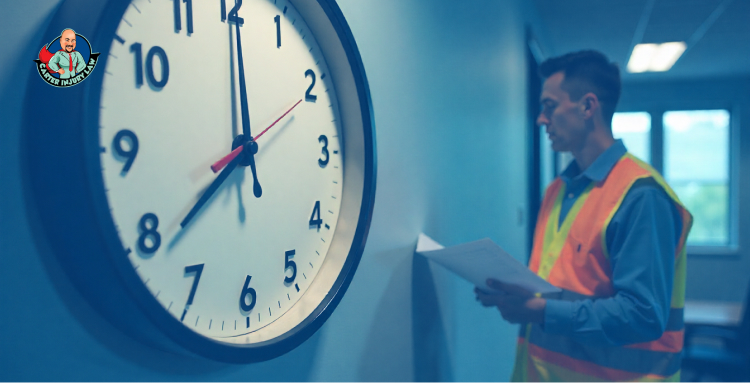
Reporting the injury is just the beginning. To formally pursue benefits, you’ll need to file a Petition for Benefits and Florida gives you 2 years to do it. That might sound like plenty of time, but that clock starts ticking the day you got hurt or the day you realized your condition was related to your job.
However, if a full year goes by without any authorized treatment or payments from the insurance company, your case can quietly close itself. The law doesn’t wait around to see how things play out.
And unfortunately, too many workers find that out the hard way. In 2022 alone, more than 15% of petitions were tossed out because the deadline had already passed. That number climbs even higher for people who tried to handle things without legal help.
Part of what we do is watch the calendar for you. No missed filings. No silent deadlines. Just a steady hand on the wheel while you focus on getting better.
But what if your injury didn’t happen all at once? What if it built up slowly, over time? That changes the equation and it changes when your timeline really begins.
3) What Happens If You Miss a Deadline?
In most cases, missing a deadline in a workers’ compensation claim doesn’t mean delays. It means disqualification. Even if the injury is obvious. Even if your employer admitted what happened. Florida’s system is built on timelines, and once the window closes, it’s hard to reopen.
Now, there are exceptions. If your employer misled you, if you weren’t mentally capable of understanding your rights, or if fraud was involved on the carrier’s side, you may still have options. But these situations are rare, and you’ll need solid documentation to back them up.
That’s why it’s always worth checking before you assume the door is closed. We’ve helped clients recover claims they thought were long gone. If you’re unsure where your case stands, it costs nothing to ask.
And for those injuries that you didn’t notice until weeks or months later, your timeline might work a little differently. Let’s unpack that next.
4) Not Every Injury Shows Up All at Once
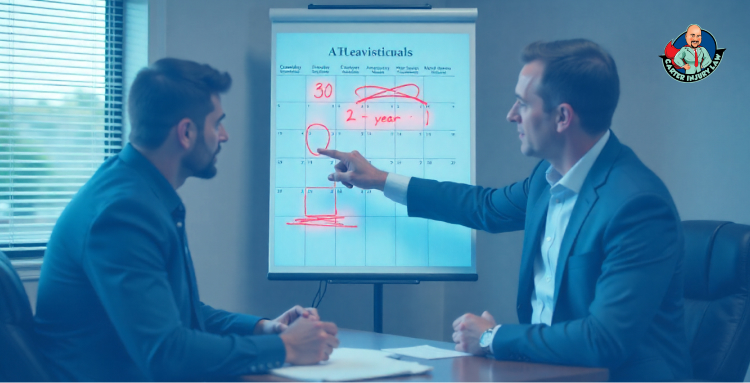
Some work injuries aren’t dramatic. They don’t involve a fall or an accident or a trip to the ER. They build slowly from years of typing, back pain from lifting, hearing loss from daily exposure to loud machinery.
In these cases, Florida law gives you some room. The 30-day reporting period begins not when the damage occurred, but when you knew or should have known it was related to your job. That sounds simple, but in practice, it often takes a diagnosis, a second opinion, or even a review of job duties to figure that out.
We’ve helped clients trace the signs back, get the right doctors involved, and connect the dots between their job and their symptoms. If you’re not sure when your “day one” was, that’s something we can work out together.
Now, once your injury is reported and your claim is filed, the system doesn’t just stop and wait. There’s a process and each step has its own set of deadlines. Here’s what happens next.
5) What’s Next on the Journey After You File
Filing your claim is a big step, but it’s just the beginning. Once it’s in the system, expect a series of events that keep the process moving and your claim on track.
First, your employer or their insurance carrier will investigate. They’ll review medical records, incident reports, sometimes even talk to coworkers. Then, you might be asked to attend an Independent Medical Examination (IME), where a doctor hired by the insurance company assesses your injury.
If there’s disagreement about your claim, the next step is often state-sponsored mediation, a chance to work things out without going to court.
Each of these stages comes with deadlines between 10 and 30 days to respond, provide documents, or show up. Miss one, and your case could stall for months, or worse.
That's where Carter Injury Law can support you. We keep track of every form, every appointment, every deadline, so you don’t have to. You concentrate on recovery, while we handle the issues at hand.
To deal with dire situations, check out these relevant blogs:
6) Who’s Getting Hurt in Florida and Why It Matters

The most common injuries? Sprains and strains make up about a third of all claims like pulled muscles and torn ligaments. Then come falls, slips, and trips, responsible for nearly one in five injuries. Motor vehicle incidents round out the top three, accounting for roughly 12%.
Certain industries feel the impact more than others. Construction workers, healthcare professionals, and transportation employees tend to file the most claims, often because their jobs put them in harm’s way every day.
No matter your job or injury type, Carter Injury Law has seen it all. We don’t believe in “too small” or “too complex.” Your case deserves the same dedication and attention as anyone else’s.
7) Why Carter Injury Law? Local Florida Team for All Your Legal Needs
Many firms stick to either workers’ compensation or personal injury cases. However, we handle both. That means if your injury involves a third party like a negligent driver or faulty equipment, then you won’t have to juggle multiple lawyers or firms. We manage everything under one roof.
We believe in making legal help accessible. That’s why we offer free consultations and work on a no-win, no-fee basis. You only pay if we win your case.
Being local to Florida means we know the ins and outs of the state’s workers’ comp system better than anyone. Our entire focus is on helping injured workers get the benefits and compensation they deserve.
So don’t wait for the deadline to sneak up on you. Call Carter Injury Law now, and make sure your case isn’t left behind.

What Medical Treatment Do I Need After an Auto Accident?
Sometimes, the real disruption after a car accident isn’t the crash itself. It’s what comes next. The confusion. The quiet pain that creeps in days later. The endless second-guessing about Do I really need to see a doctor? What kind of treatment should I even get? And if I don’t go right away, will it hurt my case?
The truth is, you’re not just trying to heal your body. You’re also dealing with a system that seems more interested in paperwork than people.
And the decisions you make early on can influence everything from how you recover to how seriously the insurance company treats your injuries.
So, where do you even begin?
1) Emergency? Start with Immediate Care First
The very first thing after an accident is figuring out if you need emergency care. If you’re feeling like something is really wrong, or if there’s any doubt at all, don’t hesitate to call 911 or get yourself to the emergency room.
You wouldn’t want to second-guess that because waiting can make things worse. In fact, studies show about 4.4 million people head to the hospital after car accidents every year, and nearly two-thirds of those who put off emergency care end up with symptoms that get worse (Injury Facts).
That immediate step sets the tone for everything else, because how you start your medical care can affect the rest of your treatment. But what if it’s not urgent enough for the ER? The next decision is whether to go to urgent care or see your primary doctor. Let’s talk about how to figure that out.
2) ER, Urgent Care, or Nothing at All? Making the First Medical Choice
So let’s say you didn’t go by ambulance. You felt okay enough to stay at the scene, maybe even drive yourself home. That doesn’t mean you’re in the clear. It just means the clock is ticking, and the next move matters.
At this point, a lot of people hesitate. Do you go to the emergency room? Walk into an urgent care? Wait and see if the pain gets worse?
Here’s how to think about it. If you have severe symptoms such as dizziness, sharp pain, or anything else that makes you pause, go to the emergency room. They’ll run tests, rule out anything serious, and document it right away. That documentation becomes part of your case, whether you decide to pursue one or not.
Urgent care is a more flexible option if your pain feels manageable but still needs attention. They’re used to seeing car crash patients and can treat minor to moderate injuries. Plus, they can refer you out if you need imaging or a specialist.
Primary care physicians seem like a natural next step, but in Florida, that gets tricky. Many of them don’t handle auto accident injuries. Because billing auto insurance is a hassle, and it’s not part of their usual flow. What usually happens is they’ll refer you out to a clinic they trust, or sometimes to one that just wants your business. Either way, it’s worth checking the provider’s background before walking through that door.
3) Your Claim Depends on Medical Bills and Insurance Valuation
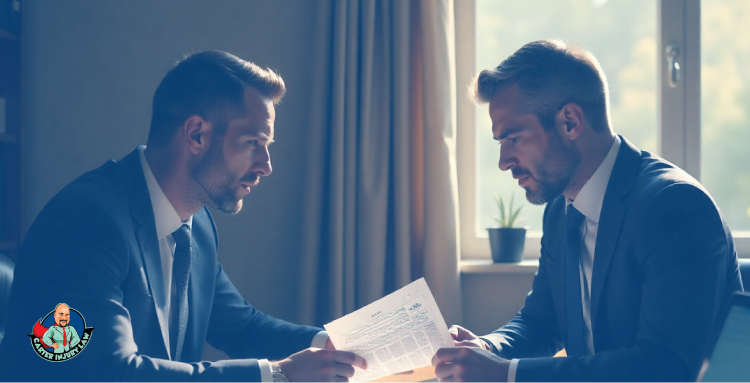
What kind of care you get after a car accident also shapes how your injury claim is valued. Insurance companies look at more than just whether you were treated; they also consider where you went, when you started, and what providers were involved. The more legitimate and consistent your treatment, the more seriously your injuries are taken.
This is where it helps to be cautious. Some clinics operate like assembly lines. They're often called “PIP mills” that churn through car accident cases to bill insurance fast. You might get referred to one without realizing it, especially if your primary care office doesn’t treat accident injuries and sends you elsewhere. And while not every referral is a red flag, it’s smart to do your homework.
Look up the clinic. Read the reviews. Know who your doctor will be before you walk in. Because the quality of care you receive could also be the difference between a claim that’s respected and one that’s dismissed as inflated or questionable. Here’s a short video from Attorney David Carter explaining what kind of medical treatment you might need after a car accident.
Once you’ve found a provider you trust and you’ve begun treatment, the focus shifts to how you’re treated, and in most cases, that starts with the most conservative approach.
4) Conservative PT and Chiropractic Therapy Care Comes First
Once the initial evaluations are done, most people begin with the least invasive option available. That usually means physical therapy or chiropractic treatment. And there’s a reason these are the go-to starting points. They focus on restoring function without introducing anything too aggressive.
Physical therapy rebuilds what the injury took away. You’ll work on strength, flexibility, and stability. It’s especially useful if you’re dealing with soft tissue injuries, whiplash, or reduced range of motion. In fact, early physical therapy can improve symptoms in up to 60% of whiplash patients (National Library of Medicine).
Chiropractic care, on the other hand, centers around alignment. After a car crash, it’s common for the spine or joints to shift slightly out of place, creating pressure and discomfort. A chiropractor’s job is to adjust those misalignments and help your body recalibrate itself. For many people, it brings real relief.
Neither of these treatments involves surgery, needles, or long recovery times, which makes them ideal early steps. And if your pain persists despite this conservative care, that’s when doctors typically take the step of finding out what’s going on beneath the surface.
5) Diagnostic Imaging: What’s Really Going On Inside?
Once conservative care starts, your medical team will probably want a closer look at what’s actually happening beneath the surface. MRIs, X-rays, and CT scans are not only useful tools for doctors, but they are also essential in the eyes of insurance companies.
Because symptoms like pain or stiffness are subjective. Imaging gives you objective evidence. It shows what can’t be seen from the outside like herniated discs, torn ligaments, joint damage, and inflammation. These are the kinds of findings that carry weight when your claim is being reviewed.
And it’s not just about the legal side. Accurate imaging also guides your treatment plan. A normal X-ray might rule out fractures, but an MRI can catch nerve compression or soft tissue injuries that don’t show up anywhere else. That’s what tells your doctor whether you need to continue with therapy, move on to pain management, or consider something more advanced.
6) What Happens If The Pain Persists?

If you’ve gone through therapy and imaging but the pain’s still hanging around, that’s when you need specialists. These are doctors who focus on pain management, often anesthesiologists or physicians trained in treating chronic injury-related pain.
They don’t jump straight to heavy interventions. Instead, they often begin with targeted injections like epidural steroid injections or branch blocks. These are designed to reduce inflammation and calm irritated nerves. If those don’t do the trick, the next level might involve procedures like radiofrequency ablation. That’s where they use heat to temporarily disable specific nerve pathways sending pain signals.
It sounds intense, but these are outpatient procedures toreduce pain, restore function, and avoid surgery if possible. About 1 in 5 people injured in car accidents who deal with lingering pain end up needing this kind of interventional care, according to the American Pain Society.
But what if the injections only offer temporary relief, or the damage is more structural?
7) When Surgery Becomes the Next Step
Surgery isn’t where anyone wants to start, but for some, it ends up being the path forward when other treatments haven’t done enough. By this point, the injury has usually been clearly diagnosed through imaging and specialist care.
The types of procedures vary depending on the injury. Arthroscopic surgery is commonly used for joint damage because it is minimally invasive and can clean up torn tissue or repair damage. For more serious spinal issues, you might be looking at procedures like spinal fusion or a discectomy, where damaged discs are either removed or stabilized.
Of course, not all treatments come out of a hospital or clinic. Some people turn to therapies that live outside the traditional system that help them feel better, even if the insurance companies don’t always take them seriously.
8) Massage, Acupuncture, and Alternative Therapies: Will Insurance Cover It?
Not every path to healing looks like a prescription or a procedure. A lot of people find real relief in massage therapy, acupuncture, or even gentle practices like yoga.
However, most insurance companies don’t put much weight on these types of care when evaluating your claim. They see them as supportive, not essential. That doesn’t mean you shouldn’t do them. If they help you feel better, sleep better, and move better, then they’re worth considering.
Your attorney can still include them in your claim, especially if you’ve kept clear records and receipts. Sometimes they get reimbursed. Sometimes they don’t. Either way, it’s a personal decision, and one that can make your overall recovery feel more sustainable.
And while alternative therapies may not always check the insurance boxes, there’s a new category of treatments that’s slowly gaining attention.
9) Stem Cells and Brain Injury Therapies
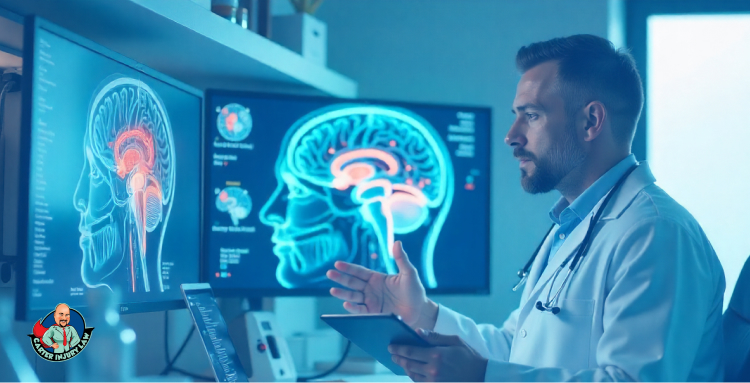
There’s a growing interest in newer, less conventional treatments for injuries that don’t respond to standard care. Stem cell therapy is one of them. It’s experimental in the eyes of many insurers, but some patients swear by the results.
The idea is to use your body’s own regenerative cells to promote healing in damaged tissues. Sounds promising, but it’s not without controversy. Insurance companies often push back, and defense attorneys may try to discredit it in court. Still, if your doctor recommends it and you believe in the process, it’s an option worth exploring.
Recovery from a TBI usually starts with a neurologist trained to evaluate cognitive and neurological changes. From there, treatment might include speech therapy, neuropsychology, or other forms of rehabilitation aimed at restoring memory, focus, or emotional balance.
These newer therapies might not be the norm yet, but they’re becoming part of the conversation. And when your health is on the line, knowing every option matters. Even if the system doesn’t always recognize them, your recovery plan should be about what works.
10) How Carter Injury Law Can Assist With Your Medical Treatment and Claim
After a car accident, you’re trying to get better, but at the same time, you’re dealing with insurance, medical bills, and referrals that might not always have your best interest in mind. It’s a lot to handle.
We walk with you through the whole process. We help you figure out what treatments actually matter, make sure your medical records tell the full story, and catch any problems before they become bigger issues. We ask the questions you might not think to ask.
You do not have to handle this on your own. If you’ve been in an accident and you’re confused about your medical care or how it affects your claim, give Carter Injury Law a call. We offer free consultations to help you understand your options and take the next step.

What Is a Compulsory Medical Examination (CME) and Why It Matters for Your Case
You get a letter in the mail. It's from the defense attorney. Inside, it says you’ve been scheduled for a “compulsory medical examination.” Sounds routine enough, right? However, then the questions start piling up.
Who’s this doctor? Why aren’t you seeing your own? What happens if you say the wrong thing or say too much? And here’s the part no one tells you until it’s too late. That exam could be the moment your whole case starts to shift.
Let’s talk about what really happens behind those doors.
1) What Is a CME and Why You Should Take It Seriously
If you're in a personal injury lawsuit, sooner or later the defense is going to schedule something called a compulsory medical examination. Not your regular doctor, not someone who's treated you before. This is their doctor and hand-picked expert.
Now, they’ll sometimes try to call it an IME, an “independent medical exam,” which sounds neutral enough. Don’t fall for it. These exams aren’t independent, and they’re definitely not neutral. This doctor is being paid a lot to examine you and give the insurance company an opinion they can use.
And that’s exactly what they do. They look for ways to say you’re not injured. Or if you are injured, it wasn’t from this accident. Or maybe it was, but now it’s magically healed.
So no, this isn’t just a routine check-up. It’s a key move in the defense playbook. And it sets the tone for what comes next, starting with who’s really pulling the strings behind that exam.
2) Who’s Really Behind the CME? (Not Your Doctor)
Let’s be clear, this doctor doesn’t work for you. The defense attorney chooses them, hires them, and pays them. And not in pocket change. Some of these physicians are making thousands per exam, often seeing one injury plaintiff after another, day in and day out. It’s a revolving door.
From the moment you walk in, the boundaries are clear. You’ll usually be asked to sign something confirming there's no doctor-patient relationship. That means they're not treating you, they’re not diagnosing for your benefit, and they’re definitely not invested in your recovery.
So when the report comes back saying your injuries are minor, unrelated, or magically resolved, it’s no accident. A 2022 review by the Journal of Legal Medicine found that CME doctors agreed with the plaintiff's injury severity just 18% of the time. That’s not a coincidence but a pattern.
And this is exactly why you’ve got to go in prepared. Next up is how to protect yourself the moment you step into that exam room.
3) How to Protect Yourself During the Exam
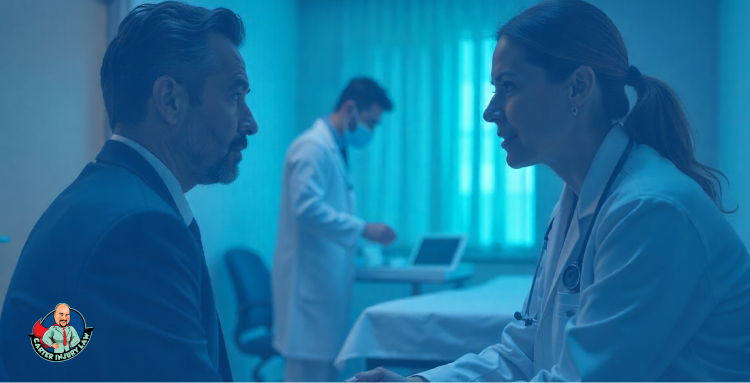
This part matters more than people think. If you're going to a CME, don’t walk in alone. We send a professional videographer to every single one of our clients. Because when that report comes back saying things didn’t hurt or you didn’t complain, we’ve got the footage to show otherwise.
It’s not just about catching a lie. It’s about keeping things honest. If the doctor lifts your arm and you wince in pain, that moment’s on record. If you clearly say, “That hurts,” and they try to claim you didn’t, we can play the video.
In fact, according to the National Institute for Trial Advocacy, when video is used, plaintiffs are 34% more likely to successfully challenge inaccurate CME testimony. That’s not a small number.
You can also have a court reporter there. Sometimes we bring both. They’ll document every word, just in case anything gets twisted later.
Attorney David Carter explains why CMEs can greatly impact your injury case and what to watch for during your exam
And now that you know how to protect yourself during the exam, let’s talk about how to protect yourself from your own words.
4) What to Say, What Not to Say
A simple rule of thumb when attending a CME is to only answer the questions that are asked. You’re not there to make conversation. You’re not there to win anyone over. You’re there because the defense wants their doctor to look for holes in your case.
Some of these doctors will talk sports, ask about your kids, maybe comment on the weather like it’s small talk in a grocery line. Don’t take the bait. That kind of friendly chatter isn’t just small talk, it’s bait for you to open up. And anything you say can end up in their report.
So be honest, be polite, but stay focused. If something hurts during the exam, say it. Out loud. Don’t try to tough it out. If you feel pain, speak up clearly so there’s no confusion later.
Like we tell our clients: they’re not your friend, they’re not here to help you… answer their questions directly. Now let’s look at what happens if you show up late, or worse, don’t show at all.
5) Be Early or Be Ready to Pay
This part’s not negotiable. If you’ve been scheduled for a CME, show up early. We tell our clients to be there at least 30 minutes ahead. Because if you’re even 15 minutes late, some of these doctors will cancel the exam on the spot and slap you with a massive bill.
And we're not talking about a small fee. According to the Florida Injury Law Journal, some CME doctors in Florida have charged up to $7,000 for no-shows or late arrivals. That’s the kind of bill you don’t want showing up in your mailbox.
One way we protect against this? We get a court order before the exam. That judge-signed order locks in the rules about how much notice they need, what happens if someone’s late, when the report is due, and more. Without it, the defense can play fast and loose with the rules.
Once that clock starts ticking, every step has to be done right. And the next step is to understand what happens after the exam ends.
6) What Happens After the Exam
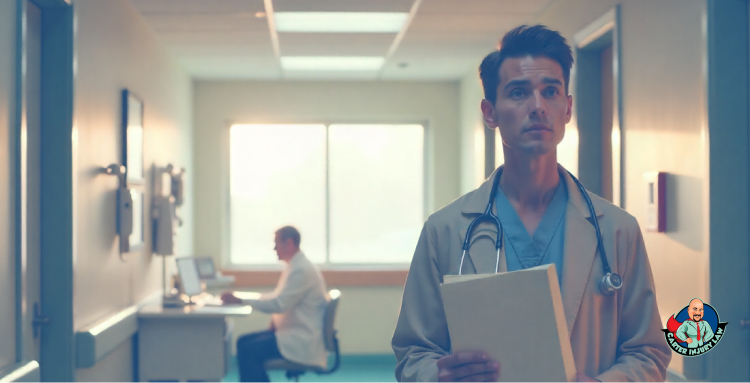
Once the exam is done, the doctor heads back to their office to write a report. By law, they usually have 30 days to send it in. However, this report doesn’t just land in front of a judge or jury. It’s not automatic evidence.
What really matters is what that doctor says in court. Their testimony, not their paperwork, is what carries weight. But that report still plays a big role. It gives your lawyer a preview of the doctor’s stance about what they’re claiming, what they’re downplaying, and where they might’ve stretched things a little too far.
That’s why your attorney reads it carefully. Every word in that report helps shape the cross-examination. Knowing their playbook before they take the stand can make all the difference.
Next, let’s look at who’s got your back when you walk into that exam room and why not every law firm treats it the same.
7) Not All Attorneys Attend CMEs, But Carter Injury Law Does
This is where law firms start to differ. Some attorneys stay behind the scenes when it comes to CMEs. They’ll prep you, sure but when it’s time for the actual exam, you’re on your own. However, that’s not how we do it.
We go with our clients. We wait in the parking lot. We walk in together. We meet the videographer together. And when the exam starts, we’re right there in the room. Making sure everything goes the way it’s supposed to.
It’s not about dramatics. It’s about presence. And when the defense knows we’re paying attention, they tend to behave a little differently. Now let’s talk about how their opinion lands in court and why that report they write is only the beginning.
8) Confused About Your CME? We’re Right Here

It's unsettling to be told to show up for a medical exam in order to be judged rather than healed. You're not walking into a clinic; you're walking into someone else's plan. And it’s okay if that feels off.
We understand the quiet pressure that builds before a CME. The letters, the schedule, the uncertainty, none of it is intended to make you feel heard. However, that is why we provide something unique. A chance to talk, free of charge. Just a conversation about what this exam really means and how to prepare for it with your rights intact.
Whether the exam is days away or still sitting unopened in your mailbox, you can depend on us.

What’s an Independent Medical Examination (And Why You Got Scheduled for one)
Got a letter from your insurance company about an independent medical examination, or IME? What exactly is this that your insurance company is asking you to attend? Simply put, it’s a medical check-up, but not with your regular doctor. Instead, it’s with a doctor chosen by the insurance company. That could be a chiropractor, a medical doctor, or even a specialist like an orthopedic physician. The goal is to get an evaluation from their side, not yours.
Florida law requires every driver to carry Personal Injury Protection (PIP) benefits, which cover at least $10,000 in medical bills after an accident, no matter who’s at fault. This means your insurance company has to pay for your medical treatment up to that amount. But when they schedule an IME, it’s often because they want to verify your condition and decide whether to keep paying those bills.
This leads right into why insurance companies push for these exams, and how it can affect your benefits. Let’s look at that next.
1) Why Insurance Companies Set You Up for These Exams
Insurance companies don’t schedule these exams just out of curiosity, they’re usually trying to cut off your benefits. You’ve paid your premiums faithfully, expecting that if you get hurt, your medical bills will be covered.
However, many insurers, like Progressive in particular, are quick to send you to their chosen doctors to review your case. More often than not, these doctors end up saying your treatment isn’t necessary anymore, and just like that, your benefits stop.
It’s frustrating to take time off work, travel to appointments, and then face the possibility that your care will be cut short. It feels like a constant battle just to get what you’ve already paid for.
Understanding what happens during these exams helps you stay prepared and protect your rights. So, what actually goes on during an IME? Let’s break down the process.
2) What Happens at an IME (and Why It’s Rarely in Your Favor)

When you show up for an IME, the process is pretty straightforward but don’t let that fool you. You’ll meet the doctor the insurance company picked, they’ll examine you, ask questions, maybe review your medical records, and then write a report.
Taking time off work to attend, traveling to an unfamiliar doctor’s office, and dealing with the stress of the whole situation is a burden on top of an already difficult time. And often, the doctor’s conclusion is that your care is “no longer reasonable or necessary.” That’s the phrase they use to justify stopping payments.
This happens in about 70% of IMEs, where the exam leads to denial or reduction of medical benefits. So while you’re doing everything right, the system is set up to challenge your claim at this stage.
Next, we’ll talk about how we fight back against unfair doctors and protect your right to the care you deserve.
3) How We Push Back: Doctors We Object To and Why
Not all doctors assigned for these exams play fair. Some have earned a reputation for biased or even dishonest reports that don’t reflect the full picture of your injury. When we spot these providers, we accept it and we formally object. That means telling the insurance company, “No, we won’t accept that doctor,” and standing up for you.
In certain situations, the law even allows us to refuse an exam with a provider known to be obstructive or untruthful. If the insurance company insists, we’re prepared to take legal action, including suing for the benefits you’re rightfully owed.
Knowing when and how to push back is key to protecting your claim. But there’s more you can do to safeguard yourself during the exam itself.
Not a fan of reading long blogs? No problem. In this video
I break down exactly what an independent medical exam is, why insurance companies send you to one, and how it could impact your case.
4) Yes, You Can (and Should) Record Your IME
If you’re going to an IME, one of the smartest things you can do is record it. To protect themselves, we always recommend that our clients video their exams. Insurance companies don’t love this idea. Some will insist that you hire a professional videographer, but we don’t believe that’s necessary. There’s no legal rule in Florida saying you can’t use your own phone or have someone you trust help with the recording.
Why does it matter? Because things get misrepresented. With a recording, you’ve got proof. It’s your word backed by video, not just your memory versus theirs.
Next, we’ll look at how insurance companies sometimes schedule these exams without even checking with you first, and what we do when that happens.
5) Don't Let Them Dictate the Time Without You
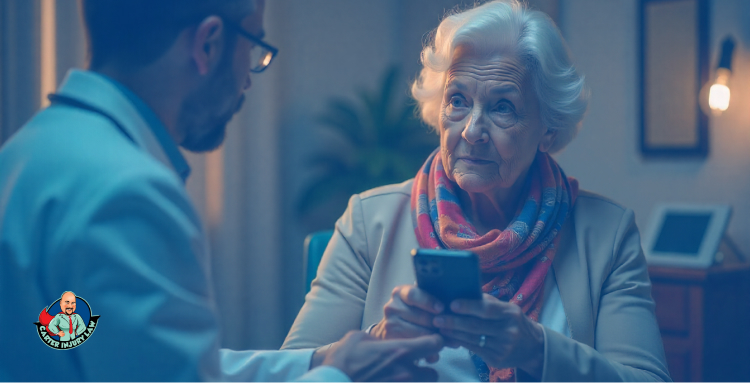
One of the more frustrating things we see is insurance companies setting IME appointments without even asking if the date works for you. They just send a letter with a time and place, expecting you to rearrange your life around it. That’s called unilateral scheduling, and no, we don’t let it slide.
When that happens, we step in. We tell the insurance company they need to coordinate with you first. You deserve to have a say in when and where this appointment happens. It doesn’t mean you can skip it altogether but it does mean it needs to be reasonable. You shouldn’t have to miss work, scramble childcare, or drop everything for an appointment you didn’t agree to.
Now, even with all of that, you still have to go. And here’s why skipping it can hurt your case.
6) Why You Should Still Attend the IME (Even If It Feels Wrong)
We get it. The whole process feels unfair. You're being sent to a doctor you didn’t choose, at a time you didn’t ask for, and it’s clear the exam isn’t meant to help you heal. But as frustrating as that is, skipping the IME can do more damage than the exam itself.
Under your insurance policy, you’re required to “reasonably comply” with requests like these. That means showing up, even if you disagree with the setup. If you don’t go, your insurer can and almost always will deny your benefits. According to the Florida Bar Journal, nearly 100% of missed IMEs lead to automatic denial of coverage.
More importantly, if you ever need to sue for those benefits later, not attending the exam gives the other side an easy argument. They’ll say you didn’t cooperate, and that can seriously hurt your case. So yes, go to the appointment but do it on your terms, with support and preparation.
Next, let’s look at how these IME reports can reach far beyond just your PIP benefits and affect your entire personal injury case.
7) So What’s the Difference Between an IME and a CME?
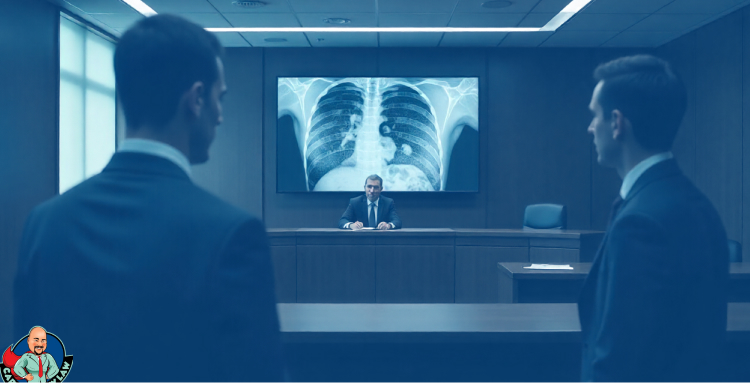
You might’ve also heard the term CME thrown around and wondered if it’s the same thing. It’s not. A CME, or Compulsory Medical Examination, comes up during the litigation stage. That means it's requested by the defense attorney when a lawsuit is already in progress.
An IME, on the other hand, usually happens before a lawsuit is even filed. It’s set up by your own insurance company as part of their claims process. Both exams serve similar purposes but they come at different times and involve different players.
For now, if you’ve gotten a letter about an IME, the next step is understanding what to do with it and how we can help you through it.
Read these relevant blogs to address pressing circumstances:
8) Confused About Your IME? Let’s Walk Through It Together
Getting that IME letter can throw everything off. You're being told to show up for an exam with a doctor you’ve never met who might be there to shut down your care. It’s stressful, it’s confusing, and it can feel like the system is working against you.
That’s exactly why we’re here. We walk our clients through every part of the process, from what to expect at the exam to how it might impact your case later on.
If you’ve been scheduled for an IME and you’re unsure about what to do, call us. We offer free, confidential evaluations, no obligations attached.

Will the insurance company be watching me? Surveillance explained
After an accident, a lot of people think the insurance company is watching them right away. Like someone’s already out there with a camera as soon as the claim is filed. That’s usually not how it works.
Surveillance doesn’t happen in every case. It costs money, and most companies won’t spend that unless they believe your case could cost them a lot more. If you’re asking for a higher settlement or you’ve filed a lawsuit, that’s when the red flags go up for them.
And when they do decide to watch, they don’t always make it obvious. Let’s talk about that…
1) The Classic Kind of Surveillance: The Van on Your Street
When people think about being followed after a personal injury, they picture someone sitting in a van, holding a camera, waiting for that one moment they can use against you. And honestly, that’s not far from reality.
Surveillance like this is usually done by private investigators. They blend in. Their cars don’t have logos. Their cameras are discreet. And they’re not there by accident. They’ve been hired to watch and wait.
However, this kind of effort doesn’t happen right away. It usually starts once a lawsuit is filed and the claim looks like it’s going to cost the insurance company real money. Before that, most of them don’t want to spend the resources.
Legally, they can record you in public spaces. If you’re walking through a parking lot or sitting at a park, that’s fair game. However, there are lines. They can’t peek into your windows. They can’t film you inside your house or in private areas where you’d reasonably expect privacy. Those boundaries matter.
Claims Journal reported that private investigators are used in about 1 in 5 litigated personal injury cases, especially when claims go beyond $50,000. It’s not routine, but it’s common enough to take seriously.
Still, the camera outside isn’t always the biggest concern. These days, the real risk often starts with something most of us use every single day.
2) What Can Go Wrong ?
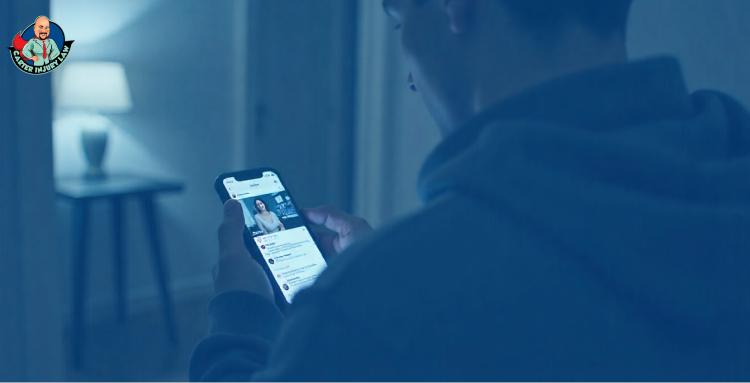
Let’s say you tell the insurance company you can’t lift anything. You’re in pain, and you’re not exaggerating. But a few days later, you roll your garbage can down the driveway. It’s part of your routine. Doesn’t seem like a big deal. Except someone’s filming and now they’ve got you on video doing the one thing you said you couldn’t.
That’s where the real damage happens.
It’s not about whether you took the trash out. It’s about whether your words match your actions. Juries don’t expect perfection. They expect honesty. And if something you said under oath doesn’t line up with what ends up on camera, the case can start to slip.
According to the Insurance Research Council, surveillance footage leads to a lower payout in 15 to 20 percent of disputed injury claims.
That’s why being accurate matters more than sounding limited. And while in-person surveillance can cause these problems, it’s nothing compared to what can come from something as small as a social media post.
3) Social Media Surveillance is The Real Risk
These days, the camera doesn’t have to be in a van. It’s already in your pocket. Social media has become one of the easiest ways for insurance companies to gather information, and they don’t need a private investigator to do it.
Even if your profile is set to private, that doesn’t mean it’s off-limits in a legal case. Courts have allowed access to private posts, photos, comments, and even messages, depending on the situation. If a judge thinks the content might be relevant to your injury or credibility, they can order you to hand it over.
That’s what makes social media so risky. You don’t have to post something dramatic. Even a picture of you smiling at a friend’s barbecue could be used to question how you’re feeling or what you’re capable of. It doesn’t take much to shift the tone of a case.
And while you can’t always control who’s watching, you can control what you post or whether you post at all… Here’s David Carter with a quick explanation of what’s at stake and what not to post.
4) What to Do with Your Social Media While Your Case Is Active
When it comes to social media during an injury case, the best move is simple: pull back.
Option one is to deactivate your accounts. Not forever, just while the case is active. It’s the cleanest option. No posts, no pictures, no chance something gets taken out of context. It also removes the temptation to scroll and share like nothing happened.
Option two is to stay quiet. Keep your profile, but use it just to browse. Don’t post anything, don’t comment, and definitely don’t let anyone tag you in photos. Most platforms have settings to turn tagging off.
Option three is for the ones who absolutely have to stay visible. Maybe you run a business online, or maybe social media is part of your income. If that’s the case, only post neutral content. No pictures of yourself, no updates about your health, and nothing that could be twisted into an argument against your injury.
The Journal of Legal Technology Risk reported that people who post during an open injury case are three times more likely to end up under surveillance. Not because they’re doing something wrong, but because the posts attract attention.
And once the defense is looking, they won’t stop at Facebook or Instagram. They’ll dig through everything. Which brings us to the next thing you should be ready for…
5) What You Say in a Deposition Matters More Than You Think
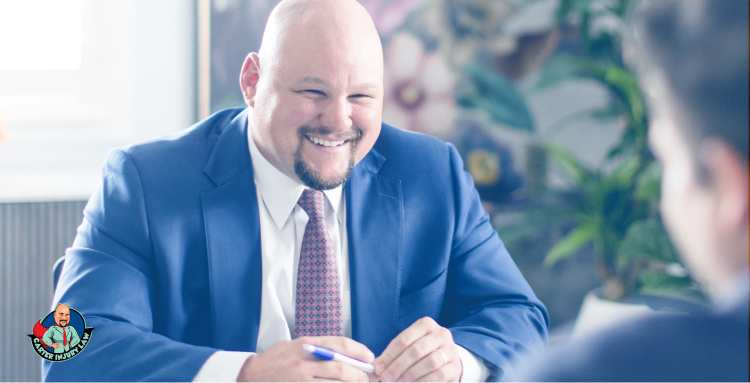
A deposition is where your words start to shape the case. And once you’ve said something under oath, it sticks. If you tell them you can’t lift anything, and then later there’s footage of you unloading groceries or moving a chair, that becomes a problem.
That’s what they’re really looking for. Contradictions. Not signs that you’re completely healed or back to full strength. Just enough inconsistency to create doubt in front of a jury.
According to Law360’s Litigation Trends Report, in 1 out of 4 injury cases involving surveillance, the footage is used to challenge testimony, not to disprove the injury itself. It's about trust. And once a jury starts questioning that, the rest of the case can get shaky.
Which is why staying consistent is part of your strategy. The next step? Knowing what to expect when the insurance company plans to use surveillance against you.
6) The Exhibit List: When You’ll Know They’ve Got Footage
You won’t always be left wondering. If the defense has surveillance footage they plan to use, they’re required to disclose it. It usually shows up in what’s called an exhibit list—a document that outlines what evidence they intend to bring to mediation or trial.
Here’s the key difference: at mediation, they don’t have to share everything upfront. It’s more flexible. But when trial gets closer, the rules tighten. If they want to use that footage in court, they have to show their hand.
That’s where Carter Injury Law pays extra attention. We review every exhibit list the moment it’s filed. If there’s video evidence listed, we dig in, prepare, and make sure it doesn’t catch anyone off guard. Being proactive makes all the difference when you're walking into a negotiation or courtroom.
So if it’s listed, we’ll know. And we’ll be ready. Next, let’s talk about what kind of footage actually changes a case and what doesn’t.
7) When Surveillance Crosses a Line: Know Your Privacy Rights
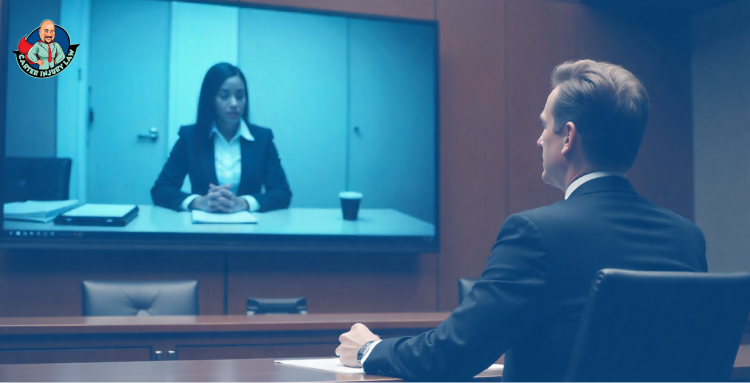
There’s a difference between watching and crossing a line. Insurance companies are allowed to observe what happens on sidewalks, in parking lots, or at the grocery store. That part is legal. However, they can’t peer through your windows, trespass onto private property, or install hidden devices near your home.
The legal boundary is simple: if you're in a place where the general public has access, surveillance is usually fair game. The moment it enters your fenced backyard, your phone, your home office, the protections begin to apply.
Still, those lines can blur, especially when you don’t have someone watching out for you. Having an attorney early on means having someone who understands where the boundaries are and how to act if they’re pushed.
And that brings us to your honesty, your story, and how you carry that forward in your case. Let’s close by talking about what juries actually care about when all is said and done.
8) Don’t Panic, Just Be Honest and Get Advice Early
Surveillance isn’t some secret trap set to catch you being human. It’s a tool. And like most tools in injury litigation, it’s less about the act and more about the story that follows.
That’s why early legal guidance can go a long way. If you’re unsure whether a post is safe, if a message from an adjuster feels a little too casual, or if someone starts asking questions that make your stomach twist, talk to us.
Carter Injury Law offers free, confidential consultations. You don’t need to have a case file in hand or a strategy mapped out. Even if you’re just wondering what to post, we’re here to help you protect your story before someone else tries to rewrite it.

Should I Interview Multiple Attorneys for My Personal Injury Case?
You don't really prepare for the time when you'll need a lawyer. It usually occurs following an accident, a phone call, or a hospital visit that separates your life into before and after. And in the middle of all that, you’re expected to make legal decisions fast.
So you Google. You scroll. You try to read between the lines of star ratings and office photos. Everyone promises to fight for you. Everyone claims they care. Still, how do you know who’s actually going to show up when it matters?
That’s the thing, no one really prepares you for the injury nor the paperwork, and definitely not this next part…
1) Should You Talk to More Than One Attorney? (Short Answer: Yes)
A lot of people sign with the first lawyer they call. No interviews. No comparisons. Just a quick phone call and that’s it. They’re in.
Now, I get it. When you’ve just been in an accident or you’re dealing with a serious injury, the last thing you want is to feel like you're shopping around. However, this decision deserves your time. It's not like picking a mechanic. This is someone who may be handling your case for months or even years.
In fact, 68% of clients only consult one attorney before signing a contract (Clio 2023 Legal Trends Report).
And you know what that often leads to? Regret. Not always but often enough. Because they find out later the attorney doesn’t actually go to trial. Or they never speak to the same person twice. Or worse, they feel like a number instead of a human being.
Interviewing more than one attorney helps you see the difference between someone who just wants to sign a case and someone who’s actually going to stand with you. You learn who listens. Who asks the right follow-up questions. Who’s transparent about their strategy and who gives vague answers and promises the moon.
2) What Should You Ask in That First Conversation?

That first call with an attorney? It’s your chance to figure out whether this is someone you trust enough to guide you through what could be a long and emotional process.
So ask real and specific questions. Start with: Have you handled a case like mine before? Not just any case. Your case. If it’s a car crash where the other driver ran a red light, ask how they’ve handled that exact situation. If it’s a nursing home neglect case, ask what they’ve seen before. Details matter but experience matters more.
Next, ask: If my case doesn’t settle, will you take it to trial? Some firms don’t file lawsuits. They settle fast and move on. That’s fine when the offer is fair—but if it’s not, you need someone who’s not afraid of a courtroom. You don’t want to find out later that your case is being handed off because your lawyer wasn’t prepared to fight.
And don’t forget to ask: Will you personally be handling my case? It’s a fair question. In larger firms, the attorney you speak to first might not be the one actually working your file. Could be someone else entirely. That doesn’t always mean it’s a bad setup but you deserve to know who you’ll be working with and what their experience is.
And that brings us to one of the most important questions of all…
4) What’s Their Litigation Strategy? (And Why You Should Care)
Let’s say your case doesn’t settle right away. The insurance company lowballs the offer, or they flat-out deny the claim. What happens then?
That’s where you really find out what kind of attorney you hired.
Some lawyers run what's called a "max and settle" operation. They take the case, send a demand, and hope it settles without ever filing a lawsuit. That can work fine if the offer’s fair. But when it’s not, you need someone ready to step into court, not step aside.
So ask: Are you willing to litigate if we need to? And not just “in theory.” Have they actually done it? Do they file lawsuits regularly? Will they handle it or pass it off?
Because here’s the thing: only 4% of personal injury cases ever make it to trial, (U.S. Department of Justice, Bureau of Justice Statistics), but when they do, the payout is often 3 times higher than pre-suit settlements.
That’s a huge difference. And unfortunately, some firms will refer your case out the minute it gets complicated. Why? Sometimes it’s about the fee. Settling in-house often means they keep a larger cut. Referring it out? That usually means giving up a percentage to another lawyer.
Let’s break it down:
The lawyer's fee is usually a third, or roughly $33,000, if you settle for $100,000 up front.
That fee, however, increases to 40%, or $120,000, if you proceed to trial and win $300,000. If the lawyer sent your case to another lawyer, they might only receive a quarter of that, which is about $30,000.
For some lawyers, that kind of math quietly shapes how far they’re willing to take your case, whether they say it out loud or not.
We don’t refer out our litigation cases. If your case needs to go to court, we take it there ourselves. You stay with the same team. Same attorney. Same phone number. And speaking of staying close, let’s talk about why having a local lawyer matters just as much. Watch this quick video where David Carter breaks down how to choose the right personal injury lawyer and what he wishes every client knew before signing a contract .
5) Do They Actually Live and Work in Your Area?
These days, a lot of firms are expanding across the state or even the country by renting office space wherever they want to say they “serve.” They slap a local phone number on the site and a nice photo of the city skyline, but they’re not actually here. You call them, and you're routed to a call center. You ask to meet the attorney, and suddenly, it’s Zoom or nothing.

Now, there’s nothing wrong with remote options. However, if you're hiring someone to represent you in your community, especially in a serious case like a car crash or wrongful death, don’t you want someone who knows the roads, the local adjusters, and the judges? Someone who can actually walk into the courthouse if needed?
When a lawyer lives in your town, their name means something. Their reputation was developed in church pews, at the grocery store, and while waiting in line at the coffee shop, not on Google ads. People know who they are. And if that lawyer drops the ball? The community remembers.
That's why I always tell people that you're choosing a relationship rather than just hiring a lawyer. And in any relationship, trust starts with presence.
6) Can You Reach Them Directly Or Just Through a Wall of Staff?
A lot of folks don’t realize this is even something they can ask. They assume it’s normal to only talk to case managers or voicemail boxes. And hey, support staff are important. No good law firm runs without them. However you didn’t hire a receptionist. You hired a lawyer. And you should know exactly who that is.
If you're about to trust someone with your future, you should at least know their name, their voice, and how to get a hold of them. Do they give out their direct number? Do they have a response time policy? If you call with a real concern, will they get back to you that day or will you get a polite email two weeks later?
So let’s finish this out. If you're still wondering how to actually know you've found the right attorney for you... there’s one last thing to consider.
7) What Happens If You Change Your Mind?
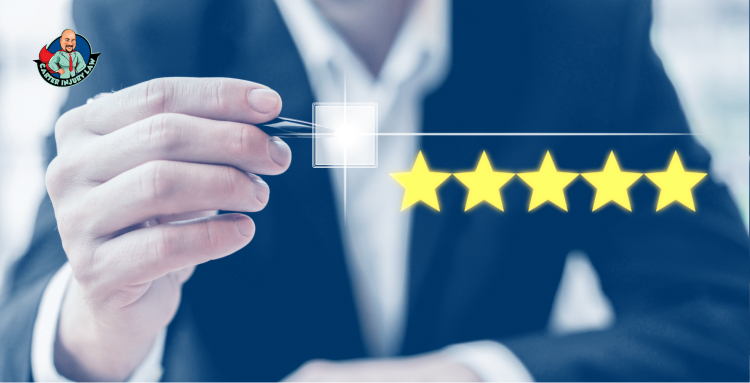
In Florida, you have the legal right to cancel that agreement within 3 business days. It's called the 3-day cancellation rule, and most people don’t even know it exists.
We take that a step further. We offer a 30-day no-fee satisfaction guarantee. That means if you sign with us and decide within the first month that it’s not the right fit, you can walk away with no hard feelings.
If it doesn’t feel right early on, it probably won’t get better with time. And that’s okay. Choosing a lawyer shouldn’t feel like locking into a contract you can’t get out of. It should feel like hiring someone who actually wants to earn your trust.
And you'll know when you've found someone who actually shows up for you, listens, and responds to your inquiries. Because it won’t feel like a gamble anymore. It’ll feel like someone’s finally in your corner.
8) How to Vet a Lawyer Beyond Google Reviews
Google reviews are a good place to start but they shouldn’t be the only thing you look at. A five-star rating doesn’t tell you much unless you actually read what people are saying. Was the lawyer responsive? Did they keep the client in the loop? Did they deliver on what they promised?
That’s what you want to know.
One last tip? Don’t just skim. Take the time to read the reviews. Look for patterns in how people describe their experience. That’s where the truth usually sits.
Now, let’s say you’ve done your homework. You’ve talked to a few lawyers. You’ve checked their credentials, read the reviews, and maybe even gotten a gut feeling about who’s worth your time. So… what’s next?
If you're still in that early stage, just trying to figure it out, we're here for that too. Let’s talk.

What Should I Do If I Drive Someone Else’s Car and Get Involved in an Accident?
Suppose you're doing someone a favor. You borrow a friend's car to run a quick errand, or perhaps you are the designated driver for the evening. The next thing you know, you're involved in an accident. The car has been damaged, people have been shaken up, and you're suddenly drowning in questions: am I responsible? Whose insurance pays out? Is this going to jeopardize my record?
A surprising number of accidents involve drivers behind the wheel of another person's vehicle. In fact, 1 in 5 younger drivers admit to regularly driving cars they don’t own. Accidents in borrowed cars, whether it's a family car, a roommate's ride, or even your boss's vehicle, involve a unique combination of legal responsibility, insurance red tape, and a little awkwardness.
We'll break it down clearly: who is legally liable and what to do immediately following the accident.
1) Who’s Legally Responsible?
When you borrowed someone else's car and ended up in an accident, the most pressing question is who is legally liable. Let's look at it in more detail.
In the context of auto insurance, "permissive use" refers to situations in which the car owner has explicitly or implicitly given someone, such as you, permission to drive their vehicle. This concept is important because the owner's insurance policy often covers permissive users.
In most cases, if you drive someone else's car with their permission, their auto insurance policy will provide primary coverage in the event of an accident. This means that their insurer would typically handle any claims for damages or injuries caused by the incident.
However, permissive users should be aware that this coverage may be subject to certain limitations or higher deductibles.
“About 77% of auto insurance policies in the U.S. cover permissive use.”
Source—NAIC report
While permissive use frequently provides coverage, there are some notable exceptions:
Business Use: If you use the borrowed vehicle for business purposes, such as deliveries or ridesharing, the owner's policy may not cover any resulting accidents unless it specifically states so.
Unlicensed or Inexperienced Drivers: If the person borrowing the car does not have a valid driver's licence or is deemed inexperienced, the insurance company may refuse coverage.
Non-Permissive Use: If someone takes the car without the owner's permission, any accidents that occur may not be covered by the owner's insurance policy.
It's important to note that permissive use coverage is common, however not universal. Most major insurance companies include it in their policies, though the specifics vary. Always review the policy's terms to determine the scope of coverage.
2) Immediate Steps to Take After the Accident

What can you do after getting into an accident while driving someone else's car? First and foremost, take a deep breath. The situation must be handled calmly and professionally. Here's what you need to do:
Check for injuries and dial 911: Ensure the safety of yourself and any passengers. If someone is injured, contact emergency services right away. Turn on the hazard lights to warn other drivers. Even if the accident appears to be minor, it is advisable to call the police. An official report can be extremely useful for insurance claims and legal proceedings.
Exchange Information with Involved Parties: Collect relevant information from all drivers: full name, contact info, driver's license, and plate numbers. Record both the license number and the vehicle’s plate number. Include insurance details—company names and policy numbers. Note the vehicle's model, color, and year. Avoid discussing fault or making statements that may imply guilt.
Document the Scene: Take detailed photographs of the vehicles, any visible damage, the surrounding area, and any relevant road signs or signals. Note the time, date, and location of the accident. If there are any witnesses, gather their names and contact information.
Contact the Car Owner Immediately: Inform the vehicle owner of the accident as soon as possible. They must contact their insurance company to report the incident. Share all of the information you've gathered with the vehicle owner to help with the insurance claim process.
3) The Car Owner’s Role in the Process

Even if you weren't driving, you still need to take certain precautions to protect yourself and your vehicle. Let's break it down:
Reporting the Accident to Your Insurance Provider: First and foremost, notify your insurance company of the accident as soon as possible, preferably within 24 hours. Even if you were not driving, your insurer should be aware of any incidents involving your vehicle. Provide them with all pertinent information, including the driver's name, the circumstances of the accident, and any available documentation, such as the police report.
Repair Claims and the Potential for Premium Increase: Once the claim is filed, your insurer will evaluate the damage and estimate the cost of repairs. Keep in mind that even if you were not at fault, filing a claim may result in an increase in your insurance premium. According to Bankrate, depending on your state and insurance company, your insurance premiums may rise after an accident. The increase usually lasts three to five years, depending on your insurance company and state regulations.
Subrogation Possibilities If the Driver Is Found At Fault: If the person driving your car is found at fault, your insurance company may pursue a process called subrogation. This means they will request reimbursement from the at-fault driver's insurance company for the amount paid out in the claim. If successful, this can help you recover your deductible and potentially keep your premiums from rising.
More Relevant Blogs You May Find Useful:
What Should You Do if You’re the Defendant in a Florida Car Accident Lawsuit?
Can You Still Have a Personal Injury Case If There’s Little to No Car Damage?
Should You Accept an Insurance Company’s Offer to Pay Your Medical Bills After an Accident?
4) In an Accident With a Borrowed Car? Here’s How Carter Injury Law Protects You

We understand that the insurance industry does not make things easy. That's why we're here to help you understand, protect your rights, and move your case forward, whether you were driving someone else's car or someone crashed into yours.
Carter Injury Law does more than just file claims; we manage the entire process. We'll deal with the insurers, determine liability, and handle legal details such as subrogation and damages, so you can rest easy. Our job is to keep you away from unnecessary expenses and stress.
If you've been in an accident with a borrowed car and aren't sure where to start, contact us. The sooner you speak with us, the more options you will have. For a free case review, please contact Carter Injury Law at 813-922-0228 or visit carterinjurylaw.com.

Medical treatment Phase after a car accident in Florida
After the chaos of a car accident, a strange silence settles in. The adrenaline fades. The tow truck leaves. And then you find yourself in a waiting room with fluorescent lights and unfamiliar forms, unsure whether your pain is just a bruise or the beginning of something bigger. The insurance company knows what they’re doing. Do you?
This part or this phase won’t be loud. However, it might be the most important stretch of your entire case. And the truth is, most people get it wrong.
Let’s make sure you don’t.
1) What Is the Medical Treatment Phase of a Personal Injury Case
At this point, your case is about your body, your recovery, and what the doctors are seeing. We’ve already cleared the investigation. Now, your focus is getting the medical care you need so we can understand the full picture.
This phase is where your injuries are tracked in two ways:
Subjectively — what you tell your doctor hurts. Where the pain is. How it’s affecting your sleep, work, and daily life.
Objectively — what the medical imaging actually shows. MRIs, X-rays, and CT scans are the evidence we use to prove what’s really going on beneath the surface.
Eventually, your treating physician may determine you’ve reached something called Maximum Medical Improvement, or MMI. It means the doctor believes your condition has stabilized. It’s a medical milestone, and it helps us know when to start building the case for settlement.
The American Medical Association recommends a 6-month care period before a doctor can issue a permanent injury rating. Once you hit that point, we’ll be ready to move your case forward with facts.
2) Don’t Skip the Imaging, It’s the Backbone of Your Case
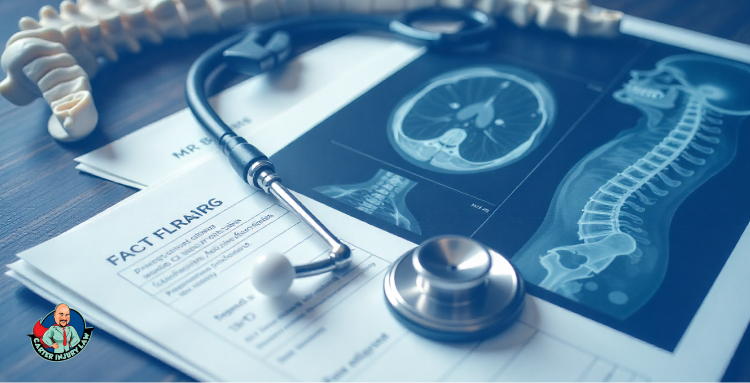
If your doctor recommends imaging, go. Don’t wait on it; don’t shrug it off. MRIs, X-rays, and CT scans are not just tools for diagnosis; they’re tools for proof.
Telling us you’re in pain matters. But the reality is, the insurance company isn’t going to just take your word for it. They want to see what’s showing up on film. Imaging gives us objective evidence that backs up everything you’ve been saying to your doctors and that’s what helps us build a stronger case.
Disc herniations, ligament damage, and nerve compression aren’t things you can always feel on the surface, but they show up clear as day with the right scans.
A study in The Spine Journal found that disc herniations are frequently missed without advanced imaging like MRIs, making them critical in identifying injuries accurately. So if you haven’t had those tests yet, let us know. We’ll help you get them scheduled.
3) Which Doctors You See Tells the Insurance Company Everything
Insurance companies look at medical care in levels. The more specialized and serious the treatment, the more seriously they’ll take your injuries. Here’s how it breaks down:
Conservative care: This includes physical therapy or chiropractic treatment. It’s where most people start.
Intermediate care: Pain management specialists step in here like injections, trigger point therapy, and ablations.
Invasive care: This is the surgical level — whether it’s spine surgery or an operation on your shoulder, knee, or other extremity.
Now, we’re not saying you need surgery to have a strong case. But seeing the right kind of doctor helps us understand how severe the injury is and what kind of recovery you’re facing.
4) How Long Does Treatment Last? Longer Than You Think
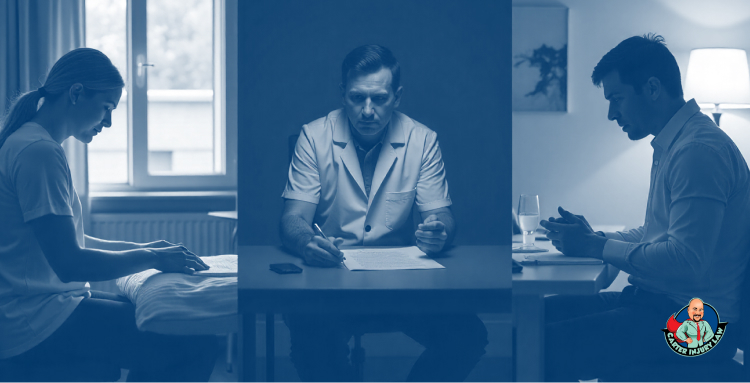
One of the most common questions we get is, “How long will this take?” And the honest answer is, it depends on your body. But generally speaking, this part of your case doesn’t wrap up in a few weeks.
Most clients are under a doctor’s care for 6 to 8 months after the injury. That’s not because we’re stalling. That’s because the medical guidelines require time to track how you’re recovering, and whether your injuries will have long-term effects.
Before we can even begin talking about settlement, we need that full picture. We don’t rush to settle cases. We settle them when the timing is right. When we’ve got the facts, the records, and a full understanding of what you’re really dealing with.
5) We’re Still Working Behind the Scenes While You Heal
Just because you’re focused on treatment doesn’t mean your case is on hold. We’re still moving. Every week, we’re checking in with your doctors, collecting records, updating the insurance companies, and keeping tabs on your medical bills.
We’re setting the stage for what comes next — the demand phase. That’s when we officially present your case for settlement. And by the time we get there, we want to have every record, every bill, and every recommendation lined up and ready to go.
However, we can’t create evidence that doesn’t exist. You’ve got to do your part: go to your appointments, follow through with treatment, and keep us in the loop if something changes. The insurance company is watching for consistency. So are we. Let’s watch what this phase means with a bit more clarity.
6) What You Do Now Affects What You Can Recover Later
This part is pretty simple, if you're hurt, get treated. And if you’re already treating, stick with it.
We know life gets in the way. Work, family, schedules — it’s easy to push off an appointment or skip a follow-up. But every gap in care becomes a talking point for the insurance company. They’ll use it to argue you weren’t really hurt… or that you got better and just didn’t tell anyone.
And your case is only as strong as your medical records. Not what you feel, not what you say, only what’s documented. So don’t leave room for doubt. Go to your appointments. Follow the treatment plan. And give us the best version of your case to fight for.
7) One Shot, One Settlement, No Do-Overs
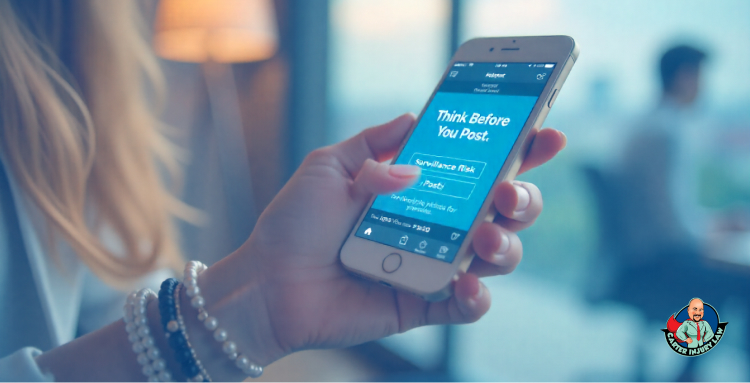
When your case settles, it’s over. There’s no tab left open. No asking for more money later if things get worse. That’s not how personal injury claims work.
And we’ve seen it happen — people rush into a settlement before they understand the full extent of their injuries. Then 6 months down the line, they’re told they need surgery. Or they’re still in pain. But the case is closed, and there’s nothing more we can do at that point.
That’s why this phase matters so much. Now is the time to get answers. See the specialists. Get the imaging. Understand what’s ahead, not just what hurts today.
8) Social Media and Surveillance — Just Don’t Do It
We get it — you want to update your friends, post vacation photos, or show you’re “doing fine.” But if you’re in the middle of a personal injury case, the best advice we can give you is simple: don’t post anything.
Insurance companies do check. They have entire departments that monitor social media. And they’re not looking for the whole story — just one picture, one video, one post they can twist to say you’re not really hurt.
It might seem harmless at the time. But later, that one moment could end up in front of a jury. You’re better off healing in silence than posting for sympathy. Let your medical records do the talking — not your timeline.
9) We’re Ready When You Are
There’s no perfect moment to ask for help. But there’s value in knowing you're not expected to walk this alone. The medical phase is quiet, often slow, and full of questions most people don’t know they’re supposed to ask.
You don’t need to have everything figured out. You just need someone who’s done this before and still cares every time like it’s the first. Call us at 813-922-0228 or visit CarterInjuryLaw.com. We'll guide; you make the choice.

True Facts You Must Know About the Demand Preparation Case Phase
Some phases in life don’t come with a clear sign or a closing door. If you’ve been injured, if you’ve done the hard part of showing up to every appointment, breathing through the pain, and waiting patiently through the silence... then you’re here. Not at the finish line, but at the edge of something else.
This in-between moment is what we call settlement negotiation preparation. By now, your body has started to tell its version of the story through MRIs, physician notes, pain scales, and progress charts.
And yet, strangely, just as the dust starts to settle, we ask you to do one more thing that most people forget. And that’s where everything starts to change...
1) Yes, You Still Need to See the Doctor And Here’s Why
So here’s where a lot of folks start to wonder,“Do I still need to keep seeing my doctor if I’ve been released from care?” And the answer? In most cases, yes.
Maximum Medical Improvement, or MMI, is a clinical term. It means your doctor believes you’ve recovered as much as you're going to, for now. But it doesn’t mean you're done hurting. Remember, if you’re still hurting, you’re still healing and you’ve got to keep treating.
Why? Because continuing treatment does 2 critical things at once. First, it helps your health, your function and your quality of life. And second, it helps your legal team build a stronger, clearer and more complete picture of your injury when we go up against the insurance company.
The medical records show your current condition, your pain level, and the fact that this injury didn’t just disappear overnight. Without that continuity, the insurance company gets room to argue. And trust me, they’ll take it.
In fact, a 2022 study published in Injury Epidemiology found that over 60% of accident victims who ended treatment early had worse long-term outcomes.
So even if your doctor says, “You’re released,” that often means you're now on an as-needed basis. It doesn’t mean “don’t come back.” It means you decide when you need to come back—and if the pain is still there, then yes, you do.
2) Paperwork Is not Only Paper; It’s Also Your Proof

Clients often assumes we’ve got everything we need to move forward. The bills, the records, the photos—they figure it’s all in the file. But in reality? Sometimes a key document or provider slips through the cracks. And when it does, it slows everything down.
The truth is, the settlement prep phase is all about proof. Not just that you were injured, but how it happened, how bad it was, how much it cost you, and how long it lasted.
So we gather everything. And I mean everything:
Ambulance transport reports
Emergency room visits
MRI and imaging results
Chiropractor and physical therapy notes
Acupuncture and massage therapy
Pain management or orthopedic records
Photos of injuries, vehicles, scenes—anything that helps us tell your story
These are the foundation of your case value. The insurance company doesn’t go on feelings or fairness. They go on paper. If it’s not documented, they don’t count it.
That’s why we’ll ask you more than once if you’ve seen any providers we don’t know about. A lot of times, folks forget to mention something like a one-off visit to a walk-in clinic or a massage therapist. But that one visit might contain a diagnosis, a pain level, or a key timeline detail that adds real weight to your claim.
3) Why One Doctor’s Word Could Damage or Save Your Case
Now, you might think a doctor just writes up your symptoms, maybe gives you a treatment plan, and that’s that. But in the legal world, what that doctor says on paper about your injury carries major weight. Especially when it comes to two words that really matter: permanency and causation.
Let me explain.
When a doctor says your injuries are permanent, insurance companies take notice. And when they say those injuries were caused by the accident we’re representing you for? That’s the gold standard. That’s what makes your case harder to ignore and harder to lowball.
Without that opinion, the insurance company has wiggle room. They might claim your injury came from something else or that you’re fine now, so no harm done. That’s why we need a treating physician to say in clear terms: Yes, this injury is real. Yes, it’s permanent. Yes, it came from this crash.
So what should you do? Talk to your doctor. Ask, “What does this report mean?” Ask, “Should I still come back?” And if you’re not sure what your doctor said or didn’t say—tell us. We’ll take it from there.
4) The Hunt for Hidden Bills And How We Find Them
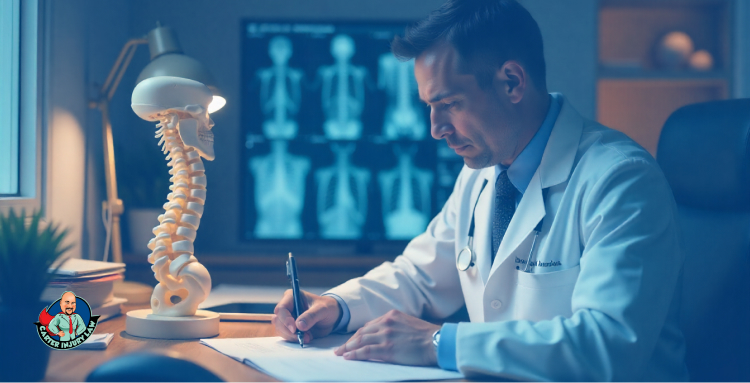
According to the Health Care Cost Institute, one hospital visit can turn into 4 or 5 separate bills and not all of them are easy to spot.
You may have gone to the ER once, but behind the scenes, separate bills pile up from the ambulance, ER, radiology, doctors, and labs, none of whom coordinate with each other.
That’s why we dig. Our case managers and legal staff comb through every corner of the file. We ask:
Have we seen a bill from radiology?
Did the ER doc bill separately from the hospital?
What about that chiropractor you mentioned two months ago?
Any acupuncturist, massage therapist, walk-in clinic?
And if you saw someone and we didn’t get their records? That’s our cue to chase them down. Or better yet—let us know first. That saves time and makes sure nothing important slips through.
Then comes the insurance side of what was billed, what was paid, and what was adjusted.
Let’s say we get a $3,000 bill from a provider, but your health insurance already paid $1,200 and negotiated a discount. We need to know exactly what was paid, what was written off, and what might still be owed. That’s where lien resolution comes in.
If your insurance paid out, they may expect reimbursement once the case settles. That’s a lien. And we handle that negotiation too—so you’re not left paying more than you should. David Carter himself provides a more simplified explanation here.
5) The ‘Demand Letter—Your Story, Your Evidence, Your Voice
This is where we write your demand letter. And no, it’s not just a form or a quick email. It’s a detailed, aggressive, strategic letter that lays everything out for the insurance company inluding your injuries, your treatment, your losses, and the value of your claim.
It’s also the very first thing the insurance adjuster sees. That’s why we don’t cut corners. We make sure it hits hard and clear. Now, here's the part clients often ask about: “Do I get a say in that letter?” Absolutely.
Before we send anything, we will reach out and walk you through it. We’ll explain the numbers, the structure, and what happens next. If we need written permission to send it, we’ll get it. You’re part of the process every step of the way.
6) Delays, Deadlines & the Real World of Medical Records

By law, providers must send records within 30 days under HIPAA, which gives us the right to access them for your case. It’s frustrating but we handle this kind of thing all the time. So what do we do about it?
We follow up, we escalate, and in some cases, we’ll even pay the provider’s invoice just to get the records moving. Sometimes we’ll send the request by mail, by fax, by email—whatever it takes.
We know these delays can be frustrating, especially when it feels like nothing’s happening. But trust me—something is happening. Behind the scenes, we’re pushing until every piece of your file is where it needs to be because your case deserves to be complete, and the insurance company won’t take shortcuts on our watch.
7) We’re Not Just Getting Ready, We’re Getting You Paid
You’re still showing up to appointments. You’re still healing. You’re still keeping us in the loop. And on our side? We’re not sitting still. We’re building, reviewing, and verifying every form, every photo, and every bill. Every missed piece matters, and we’re making sure nothing gets lost.
We don’t send anything to the insurance company until your case is airtight. Just the full truth, ready to speak for itself.
And when the time comes, we’ll fight for the value of what you’ve been through because we know Florida, and we know it can deliver the justice. Still have questions? Call us. Free case evaluations. No fees unless we win.

How Long Does It Take to Get Paid After a Wrongful Death Settlement?
Reaching a settlement in a wrongful death case can feel like a long-awaited step toward closure after unimaginable loss. For many Florida families, that sense of relief is quickly followed by a practical, pressing question,“How long will it take before we actually receive the settlement funds?”
It’s not just about money. It’s about stability, finality, and the ability to take the next step forward, emotionally and financially. And while settling the case may bring a degree of resolution, it doesn’t always mean the payment will arrive right away.
So, what causes the delay between a signed settlement and a check in your hands? Let’s take a closer look.
1) How Long Does It Usually Take to Get Paid After a Wrongful Death Settlement in Florida?
Once a wrongful death settlement is reached, most families expect a swift resolution. However, in Florida, the average time to receive funds typically ranges between 30 to 90 days, and that’s under relatively smooth circumstances.
The timing largely depends on the complexity of the case and what must happen behind the scenes before funds can be disbursed. While it’s true that
“Most insurance companies issue settlement checks within 30 days of receiving a signed release“
Source: Florida Department of Financial Services
That’s only one step in a multi-layered process. In straightforward cases where there are no disputes, no minor beneficiaries, and no probate (the court process) required, the timeline can move fairly quickly.
For example, if the deceased had a clear estate plan, there are no medical or funeral liens to resolve, and all parties agree on the distribution of funds, beneficiaries might receive payment within 4 to 6 weeks after finalizing the settlement.
On the other hand, in situations where delays are expected, cases that involve probate court proceedings. Such as when there’s no will, multiple heirs, or disputes, the process can take several months, especially if the court must approve the settlement or appoint a personal representative.
Additionally, unresolved medical liens or funeral costs can also delay payment, as these must be satisfied before any funds are distributed.
2) What Happens Behind the Scenes Before You Receive the Funds
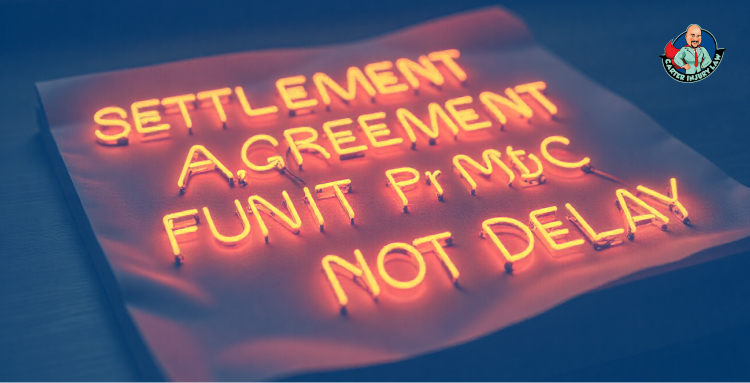
After a wrongful death settlement is reached, payment isn’t immediate. First, the release agreement must be signed by the appropriate parties and returned to the insurance company. Once received, insurance typically issues the settlement check within 20 to 30 days.
The funds are then deposited into the attorney’s trust account, where they remain until all obligations are resolved. This includes attorney fees, court costs, and any liens, such as medical bills or government claims, that must be paid before distributing the remaining amount to beneficiaries.
Resolving liens can sometimes cause delays, especially if negotiations or government approvals are needed.
“If there are no court proceedings involved and no minors among the beneficiaries, the net settlement is often paid out within 45 days of signing the release.”
Source: Florida Statutes §768.25.
While this process may seem slow, it ensures that all legal and financial responsibilities are met before families receive their settlement funds.
3) When Probate Is Required in Florida Wrongful Death Cases
In Florida, probate, aka court proceeding, is required when wrongful death settlement funds are paid to the estate, typically when there’s no named beneficiary or the damages include lost earnings. These funds must go through probate before heirs can receive their share.
Florida offers two types of probate. One is summary administration. Another one is formal administration. Summary administration is available for smaller estates (under $75,000 in non-exempt assets) or when the decedent has been deceased for more than two years.
However, most wrongful death cases involving larger settlements require formal administration, which typically takes 6 to 10 months, or longer depending on the situation. If disputes arise, such as challenges to the will or disagreements among heirs, the process can take even longer.
A personal representative, also known as the executor, plays a central role in this process. They are appointed by the court to manage the estate, file necessary documents, notify creditors, resolve any debts, and ultimately distribute the settlement according to Florida law or the decedent’s will. Without a designated personal representative, or if beneficiaries contest the appointment, the process can stall early on.
That's why early estate planning is especially super important in wrongful death cases. When there’s a valid will in place and a personal representative is named, it gives the legal process a clear path to follow. Without that structure, families may face avoidable delays and complications, just when they’re hoping for resolution.
4) Factors That Can Delay Your Wrongful Death Settlement Payment
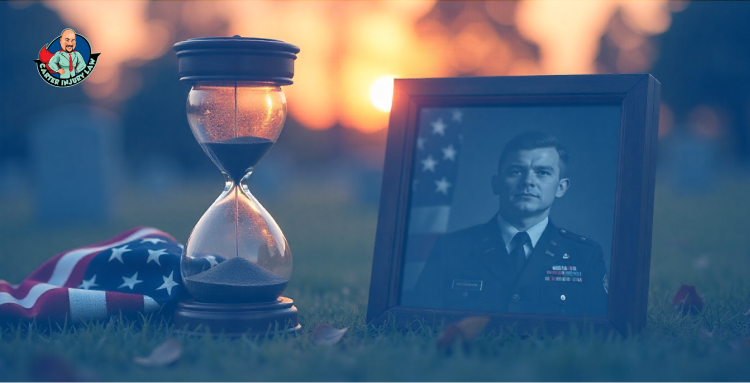
Even after a wrongful death settlement is finalized, legal and administrative steps can delay payment until required conditions are met. These delays are common and often unavoidable.
A common cause of delay is outstanding medical or funeral liens. Providers or programs like Medicare may claim part of the settlement, and these must be resolved before any funds are released.
Court approval can also delay payment, especially when minors or incapacitated individuals are involved. Florida law requires judicial review to protect their interests, which can add weeks or even months to the process.
Disputes between heirs may also slow things down. If multiple heirs disagree on how to divide the settlement, it often requires court intervention. Likewise, without a court-appointed personal representative, the funds can’t be properly received or distributed.
Additionally, delays in estate administration, such as locating beneficiaries, gathering required documentation, or opening a probate case, can further complicate matters.
While some delays are unavoidable, many can be prevented with early guidance from an experienced wrongful death attorney. An attorney can help families receive their compensation as promptly as the law allows.
More Relevant Blogs You May Find Useful:
Will You Go to Court After a Car Accident?
How Long Will Your Personal Injury Case Take? Carter Injury Law Reveals the Truth
How Carter Injury Law Helps Families Avoid Delays and Move Forward
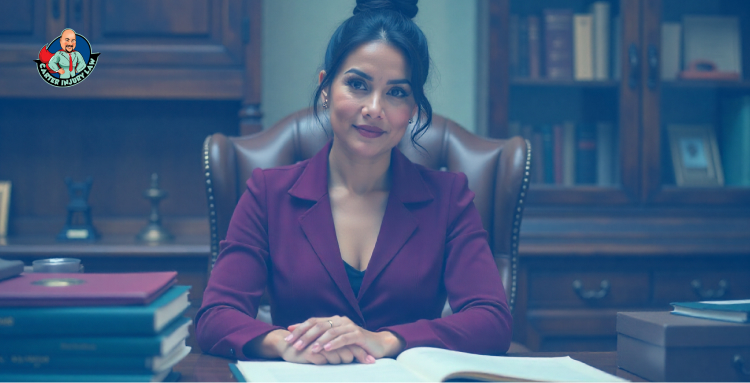
We know that after the loss of a loved one, every step forward can feel uncertain. Settling the case is one thing, but making sure you actually receive the funds without delay is another. That’s why we come with every legal support you need.
Our team works behind the scenes to protect your rights. We can handle liens, probate, and legal details so you can focus on healing and moving forward.
Whether your case involves multiple beneficiaries, court approval, or estate administration, we’re ready to manage the details with precision and care.
We also believe in keeping things simple and honest. You won’t be left wondering what’s going on; we stay in touch. Explain the process in plain language and give you a clear path forward.
If you’ve suffered a loss and aren’t sure where to begin, the best thing you can do is ask. A simple conversation can make the difference between recovery and regret. So, let’s talk. Carter Injury Law is here to help you figure that out. Call us today at 813-922-0228 for a free case review or visit carterinjurylaw.com. Let’s find out how much time you have before it slips away.

Your Case Just Settled, But What Happens Now? (and What We're Doing for You)
You might think that once your case settles, the hard part’s over. That the paperwork is signed, the deal is done, and all that’s left is to collect your check. However, life, like the law, rarely moves in straight lines. Settlements are not moments of arrival but steps in a longer journey — the final quarter of a game that still has plays to be made.
What happens in those quiet days after the deal? Why do days stretch into weeks, and what unseen work is happening behind the scenes?
Before you get ahead of yourself, let’s pull back the curtain and see what the next chapter really looks like.
1) Settlement Is Not Instant Cash & Why It Takes Time to Close Your Case
Alright, so your case settled. That’s a big step, but it doesn’t mean the money hits your bank account the next day. There’s still work to do. The timeline depends a lot on whether we settled before filing a lawsuit or if your case was already in court.
If we settle pre-suit, things usually wrap up in 30–60 days. Fewer bills, no court filings, and a faster response from the insurance company.
Now, if your case was in litigation then it takes longer, about 60 to 90 days. Because we’re dealing with the court system, more medical bills, multiple parties like experts, and more paperwork to close out. It’s a bit like finishing the last quarter in a football game with a tougher defense.
According to the U.S. Courts Annual Report, civil cases that settle pre-suit resolve an average of 35% faster than those in litigation. We’re in the last quarter now, but the clock hasn’t run out yet. There’s still some serious game left to play before you get that final payout.
2) Checks Are on Their Way But It Usually Takes 20 to 30 Days
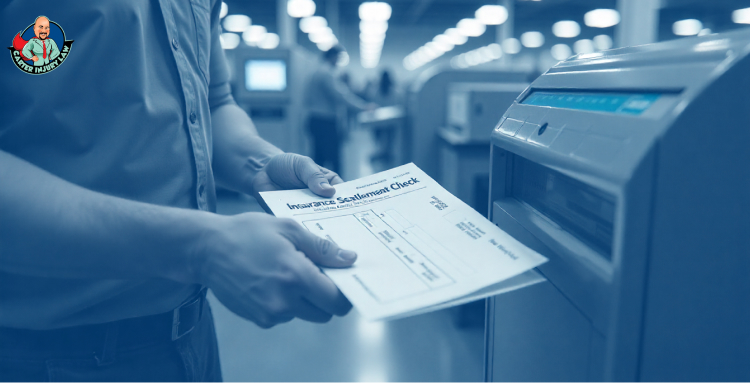
So, you might be wondering, “When do I actually get my money?” Well, once we settle, the insurance company cuts a check and sends it our way. Typically, that takes about 20 to 30 days. Sometimes it’s faster — maybe overnighted right to our office. Other times? It’s like the check decided to take a scenic tour between Tallahassee and Tampa.
“On average, mail delivery times within Florida can vary from 2 to 5 business days, but unexpected delays happen.”
(Source: U.S. Postal Service Delivery Statistics)
Occasionally, the check might get delayed in the mail or lost in transit, which can slow things down. We keep a close eye on it and follow up as soon as it’s supposed to arrive. Until that check is safely in our hands, we can’t start the next steps.
3) Why We Dig Deep Into Every Medical Bill So You Don’t Overpay
Before we hand you any money, we have to make sure every medical bill is right. That means we’re not just glancing over the numbers; we’re digging in, requesting updated medical ledgers, and double-checking every charge.
Because hospital bills can be a mess. They get adjusted, sometimes overcharged, and sometimes they include stuff unrelated to your injury. We don’t want you paying for someone else’s mistake.
We’ve seen cases where a hospital slapped a $30,000 charge on your bill when it should have been $6,000. Our job is to catch that and fight to get those extra charges knocked off. We’re not just crossing T’s and dotting I’s—we’re making sure you don’t overpay a single cent.
4) The Real Battle Happens with Liens, Fights, and Double Charges

After we settle, we have to deal with lienholders, meaning Medicare, Medicaid, your health insurance, and sometimes workers’ comp. These folks have a legal right to get paid back from your settlement, but that process isn’t always smooth.
Sometimes, you end up with double billing like when both your auto insurance and health insurance pay for the same treatment. If we don’t catch that, you could lose money that should be yours.
Hospitals don’t mind getting paid twice but we mind for you. Our job is to fight through that mess, make sure every bill is accurate, and keep as much money in your pocket as possible. Check out this video by David Carter on what happens after your case is settled.
5) You’re the Boss But We’re Here to Fight for You
At the end of the day, you call the shots. If you want to skip the waiting game and pay off your medical bills right away, that’s your choice. But from where we stand, holding the line and negotiating can save you thousands.
These negotiations aren’t quick; sometimes they take months but that’s the price of making sure you keep as much of your settlement as possible.
“Patients who engage in post-settlement bill negotiations save an average of 25% on their medical debts.”
(Source: Consumer Financial Protection Bureau)
Our job is not to close your case quickly. It's to ensure you leave with the most money in your pocket.
6) Closing the Case With Signatures, Notaries, and Yes, Even Swag Bags
Before you get your final check, there’s paperwork to finish, mainly release forms that officially close your case. Some insurers need your signature first; others wait until closing. We handle it all, whether in the office, via DocuSign, or with a mobile notary.
If your case was in litigation, we file a voluntary dismissal with prejudice. Fancy term, but it just means your case is closed for good — no going back.
“E-signatures are legally valid in 99% of contracts and speed up settlement processes by 30%.”
(Source: National Notary Association)
So, whether you’re Zooming in from across the state or swinging by to pick up your pizza cutter and swag bag, we’ll get those signatures locked down and get your case officially closed.
7) The Payout is The Last Step And The Only One That Matters to You
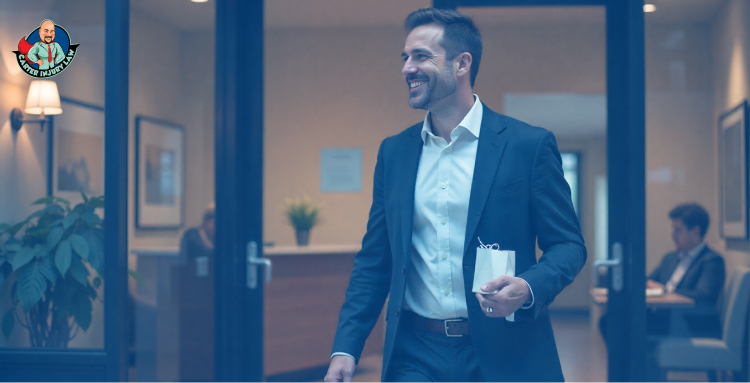
By the time we’re wrapping things up, you’re probably asking, “So how much am I actually getting?” We get that. We usually give you an estimate based on the bills and liens we’ve reviewed so far. However, until every bill clears and every lien is settled, it’s tough to give an exact dollar figure.
We’d rather be precise than promise something we can’t deliver. That way, there are no surprises when the check finally hits your hands. Our goal is to get you the maximum take-home compensation, without cutting corners or rushing the process.
8) Fast Is Easy But The Right Way Takes Time
Quick fixes are tempting. The idea that everything should wrap up neatly and swiftly feels good but when it comes to something as important as your settlement, fast can mean leaving money on the table. Getting it right takes patience, careful attention, and a steady hand.
Carter Injury Law isn't just pushing papers; we're holding the line, fighting the tough fights, and keeping you informed all the way through. You won’t be left wondering what’s next or left behind in the details.
If you have any questions at all, don’t hesitate. Reach out. We’re here in Florida, just around the corner, still working, listening, and fighting for you.

What to Expect in the First 60 Days of Your Injury Case ?
They say after the chaos comes the quiet. However, for most people, the stillness following an accident is not peace, but confusion. You've already done the hard part. You made the call. You signed up. You sat in the office, nodded at words like “liability” and “coverage,” and told your story.
Now? No courtroom drama. No immediate check in the mail. Just this strange waiting room between injury and justice, what we call the Case Phase.
And while it might feel like nothing’s happening, I promise you... that couldn’t be further from the truth. Because behind the scenes, something very important is already underway. Let me show you what’s really going on.
1) We’re Figuring Out Who’s At Fault in Liability
Sometimes it’s obvious. Other times, we have to dig a little deeper. That’s why this phase of the case matters so much. We’re building a legal foundation that will hold up if and when the insurance company pushes back.
If you’ve already given us evidence like photos, names, or any written statements—great. If not, now’s the time to get serious about it. We're looking for anything that helps paint the whole situation:
Pictures from the scene (cars, injuries, surroundings)
Contact info for any witnesses
Statements from anyone who saw what happened
Prior medical records related to the areas of the body that were injured
And we will never tell you that you sent us too much. Ever. If you’re not sure whether something matters, send it anyway. Sometimes the smallest detail turns into the strongest part of your case.
2) Your Medical History Matters More Than You Think
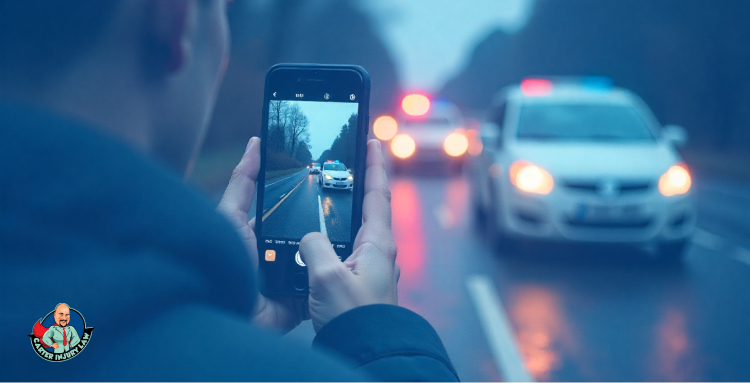
When we ask for details about prior injuries, surgeries, or treatment, especially to the same part of the body, we’re trying to shield your case from surprises. If something comes out later that we didn’t know, it can do real damage to your claim.
And now, with Florida’s new tort reform laws, Under House Bill 837, passed in 2023, the law limits how far back providers can bill for care. That shifts the spotlight onto your pre-existing conditions. Defense lawyers are going to lean hard into that.
If you had a back injury 10 years ago and you don’t tell us, they will find it, and they’ll use it to argue that this injury isn’t new.
So if you had an accident five years ago, let us know. If you’ve seen a chiropractor before, tell us. Even if you believe it is unrelated, please provide us with the full picture.
3) Don’t Post It, or They Will Find It
I know it’s second nature now, like posting updates, sharing photos, and checking in at your favorite spots. However, if you are in the middle of an injury claim, stop. Right now.
Because I promise you, the insurance company is watching. Their attorneys are watching. If you wouldn’t want a jury to see it on a projector screen in court, don’t put it online. Facebook check-ins. Gym selfies. Poolside shots. Comments that sound like you’re doing “fine.” These things get twisted fast.
What feels like an innocent post can be used to downplay your pain, question your credibility, or even sink your claim.
According to the ABA Journal, more than 90% of insurance defense attorneys are now using social media to evaluate claims. That’s just the reality. We’ve seen too many strong cases take a hit because someone didn’t think before posting.
So my advice is, lock down your accounts, stop posting, and don’t message about your case online. If something doesn’t feel clear, call us. It’s always better to talk now than to sort through chaos later, when the damage is already done.
4) How Insurance Coverage Affects Who Will Pay

When we talk about coverage, we’re looking for the insurance that applies to your situation. In most injury cases, that means bodily injury (BI) coverage, which helps cover your medical bills, pain and suffering, and long-term effects. If your car’s damaged, we’re also looking at property damage (PD) coverage.
Sometimes the person who caused the crash hands over an insurance card but the policy’s canceled. Maybe they stopped paying. Maybe their name’s not even on the policy. Sometimes they let someone else drive their car, and the insurance doesn’t apply at all. That’s when we start running into denied claims.
This is also why we always check your policy for uninsured or underinsured motorist coverage (UM/UIM). That’s the coverage that steps in when the other driver doesn’t have any or enough insurance to cover your losses. And sadly, that happens more often than you’d think.
You could be doing everything right, like having your seatbelt on and stopping fully at the red light, and still get hit by someone with no insurance. That’s why this part of the investigation means so much. Here's a brief explanation of coverage and liability investigation.
5) What Carter Injury Law Does Behind the Scenes to Investigate Your Case
We’re pulling crash reports, tracking down witnesses, and requesting surveillance footage when it’s available. If it’s a car accident, we may try to inspect the vehicles involved, pull black box data, or even get dash cam footage. If it’s a fall or injury on someone’s property, we send out preservation of evidence letters and requests to inspect the scene.
We’re also sending letters to the other side to preserve what they have. Once a lawsuit is filed, it’s a different ballgame. But even before that, we're laying the groundwork to ensure that nothing important is overlooked or conveniently "lost."
If it feels like nothing’s happening right after you sign up, I get it. However, the first 30 to 60 days are one of the most important windows in your case. Legally, we have to give the insurance companies time to respond to our requests. That’s just to get the policy.
During this time, we’re digging into liability, insurance coverage, witness contact, medical history and the overall picture. That’s why it might feel like a waiting game but trust me, this phase is anything but passive.
So yes, you might go a couple of weeks without a major update. But that doesn’t mean your case is stuck. And we’ll always tell you what we know, even if what we know is that we’re still waiting. You won’t be left in the dark.
6) We’ve Got Your Back; Let Us Handle the Rest

The days after an injury feel heavy. There’s pain, there’s confusion, and then there’s the weight of what comes next. Let us worry about the forms, the letters, the phone calls you don’t want to make.
You focus on healing, on breathing, on living. Because while your body and mind mend, we’re quietly working in the background—piecing it all together so you don’t have to.
We understand that this process is deeply personal. You’re a person who’s been through something hard, and we don’t take that lightly. Every call, update, and move we make is dedicated to put your mind at ease.
And if you find yourself wondering, confused, or just needing a little clarity—call Carter Injury Law at 813-922-0228. Because sometimes, that’s the first step toward peace.

They Offered to Pay My Medical Bills After the Accident, Should I Say Yes?
An offer that sounds too good to be true feels strangely hollow. You don’t know how deep your injuries go yet, let alone how much the bills will stack up. And when a stranger, sometimes even the person who caused your pain, promises to swoop in with a check, it can feel like salvation wrapped in a question mark.
However, that promise to pay your medical bills might not be the favor it seems. It’s a carefully laid trap, waiting for you to sign away more than you realize. So before you breathe a sigh of “thank you,” ask yourself, what are you really giving up by saying “yes”?
And what happens when the true cost of your recovery comes due…?
1) It Sounds Generous But It’s Not Admissible in Court
When someone offers to pay your medical bills after an accident, that offer isn’t an admission of fault. In Florida, the law (Fla. Stat. § 90.409) specifically says you can’t use that kind of offer as proof that the other person caused the accident or was responsible.
Why? Because sometimes people make these offers just to be polite, or to avoid a fight—not because they’re admitting they’re at fault. That means if the case goes to court, you can’t stand up and say, “But they offered to pay my bills, so they must be guilty.” The judge won’t let that fly.
So while it might feel like a good sign or a kind gesture, legally, it doesn’t mean much. It’s just an offer. And unfortunately, it doesn’t guarantee you any real protection or compensation down the road.
2) Who Should Be Paying Your Medical Bills After an Accident?
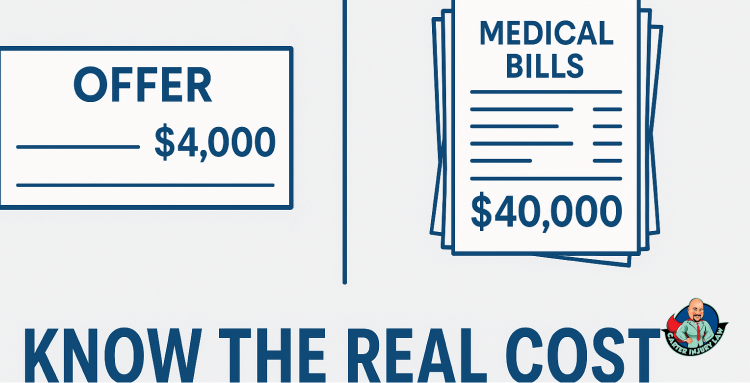
After a crash, it’s natural to wonder who’s actually on the hook for your medical bills. Let’s clear that up. In Florida, the first place to look is your own insurance, specifically PIP (Personal Injury Protection). This coverage pays for about 80% of your medical bills, up to $10,000. It’s there to help you get care quickly without waiting for someone else to admit fault.
Now, if your accident isn’t a car crash, say you slipped on a wet floor or got bitten by a dog, you might have what’s called Medical Payments Coverage under someone’s policy. That usually kicks in up to about $5,000 to cover those bills.
Once those limits are hit, or if you don’t have those specific coverages, your health insurance steps in. Medical providers can send bills straight to your health insurance, so you don’t have to deal with negotiating those payments yourself.
Here’s something important to remember:
“In Florida, over 90% of auto insurance policies include PIP coverage but many drivers still don’t know how to use it.”
(Source: Florida Office of Insurance Regulation)
Knowing this can make a big difference in getting your bills covered without rushing into a deal that might leave you short later.
3) The Insurance Trap: The $4,000 Offer That Costs You $40,000
Right after the accident, an insurance company might call you up with an offer—say, $4,000 or $5,000—to cover your medical bills. It sounds like a quick fix, and on the surface, it might seem fair. But there’s a catch that could cost you way more down the road.
Before they hand you that check, they’ll ask you to sign a release. And that release isn’t just about the money in front of you. Once you sign it, you’re giving up your entire claim. That means no more money for surgery, rehab, or any pain and suffering that shows up later. You’re locked in, no matter what happens next.
The problem? Medical bills can skyrocket fast, especially in emergencies. For example:
“Average ER visit in Florida after a car accident costs $3,300–$7,500 before diagnostic imaging or follow-ups.”
(Source: Florida Health Price Finder)
That initial $4,000 offer might cover a visit or two, but it won’t touch what happens if your injuries need more care later. So before you sign anything, it’s critical to think about what you’re really giving up and who’s truly looking out for your best interest.
4) Progressive, Allstate, and the Swoop & Sign Tactic

You’ve probably heard about it — the infamous “swoop and sign” move. Companies like Progressive and Allstate are known for rushing in right after an accident, offering to pay your medical bills quickly. It sounds helpful, but it’s really a tactic to get you to settle before you even know how badly you’re hurt.
They want you to sign a release fast, locking you into a deal that saves them millions. And the truth is, once you sign, there’s no going back — even if you need surgery down the line or your pain lasts for years.
It’s not just hearsay.
“Insurance companies save millions annually by settling claims before full injuries are diagnosed.”
(Source: Consumer Federation of America)
That’s why it’s crucial not to rush into anything. Don’t let them swoop in and shut the door on what you might really deserve. Here’s an explanation video about all of their infamous tactics.
5) Your Injuries Deserve Time And So Does Your Claim
It’s easy to underestimate an injury in the beginning. The adrenaline hasn’t worn off yet, you’re just trying to get through the day and then someone waves a check in your face. However, injuries evolve. And they rarely get better on a schedule that fits an insurance company’s timeline.
Maybe your back seizes up at work, and your doctor tells you you’ll need surgery. Or you start getting those hospital bills in the mail, and they’re a lot higher than anyone expected. Or maybe it’s just this dull pain that creeps in once the meds wear off, and it doesn’t go away.
These things take time to show up. Understanding the value of your claim also takes time. Settling too early doesn’t just cut you short — it can leave you footing the bill for injuries you didn’t even know you had yet.
6) Before You Sign Anything, Talk to Someone Who’s On Your Side

You do not owe anyone a signature immediately following an accident, not the other driver, the insurance adjuster, or the person offering to pay your bills. You have every right to pause, ask questions, and get a clear picture of what’s really being offered.
We offer free, confidential case evaluations. You tell us what’s going on, we’ll walk you through your options. And if the offer on the table is fair, we’ll tell you that, too.
The paperwork may look simple. The dollar amount might seem reasonable. But once it’s signed, it’s done. You can’t go back. And what you don't know about your recovery, needs, or rights may be the most expensive part of all.
There’s no obligation to hire us, no pressure to commit. You only get one chance to settle this the right way. One chance to protect your health and your future. Rushing that decision for the comfort of right now? That’s how people end up paying twice. Once with pain and once with regret.
Call us before you sign. Before you settle. Before you say yes.

Can I Go Back to Work After an Accident? Here’s What You Really Need to Know
After an accident, we don’t just deal with bruises and broken bones. We face decisions no one prepared us for. Do I rest or push through? Will going back to work hurt my case? Will staying home hurt my life?
We talk to people every week who feel this exact tension — torn between healing and surviving. Sometimes, the answer is simple. Sometimes, it’s not.
But before you decide, before you call your boss or send that email… there’s something you should know. And it might change how you look at this whole situation.
1) Can You Work? The First (and Most Honest) Question
That’s not a legal trick question. It’s the first thing we ask because everything else depends on it. If you can do your job, even a modified version of it, that’s important. If you can’t, that’s just as important. However, you need to be clear and honest about it, with yourself and with your doctors.
Please, Talk to your doctor, get an evaluation, and make sure it’s documented. It’s not just about how you feel, it’s also about what you can safely do without making things worse.
“Roughly 2.8 million nonfatal workplace injuries and illnesses were reported in 2022.”
— U.S. Bureau of Labor Statistics
That number might sound like just another stat, but behind it are real people trying to answer the same question you're asking. And the answer isn't always obvious. So, if you're not sure what you can handle, let your doctor, not your boss, not your attorney, or even your gut guide your decision. Because once we know where you stand physically, we can start building everything else around that.
2) You Have a Duty to Try And It’s Called ‘Mitigating Damages'

This legal idea often trips people up sometimes. Mitigating your damages sounds complicated, but it’s actually pretty straightforward.
It means that if you’re able to do something to reduce the financial impact of your injury, like working, you’re expected to try. Not to suffer.
So let’s say your old job had you lifting 50-pound boxes. That might be off the table for now. But could you do something else at work? Could you answer the phone? Could you type? Maybe your employer can shift you to something lighter for a while and by the way, they’re not just doing you a favor.
without making things worse.
“Under the Americans with Disabilities Act (ADA), employers must provide reasonable accommodations unless doing so causes undue hardship.”
That means your employer should be open to working with you, if you ask. And if they won’t? We deal with that too, but the key is to make the effort. Because if you don’t, and the case goes to trial later, the other side will say you didn’t even try to get back on your feet.
3) What If You Can’t Work? Just Document Everything
Look, sometimes, there’s just no way around it. The injury is too serious. You can’t do your job, not even a little bit. And that’s okay. Nobody expects you to work through pain or risk making things worse.
However, if you can’t work, you need to prove it. It’s about building your case so the insurance company can’t deny what’s real.
Start by gathering doctor’s notes that clearly say you can’t work, pay stubs showing what you made before the injury, and all the way through the time you’re off. If you asked your employer for accommodations and they denied them, keep those emails.
This documentation becomes your strongest evidence. It’s what helps your lawyer show the court or the insurance company that you lost income because you simply couldn’t work. The clearer and more organized you are, the better.
4) The Harsh Truth About Lost Wage Claims
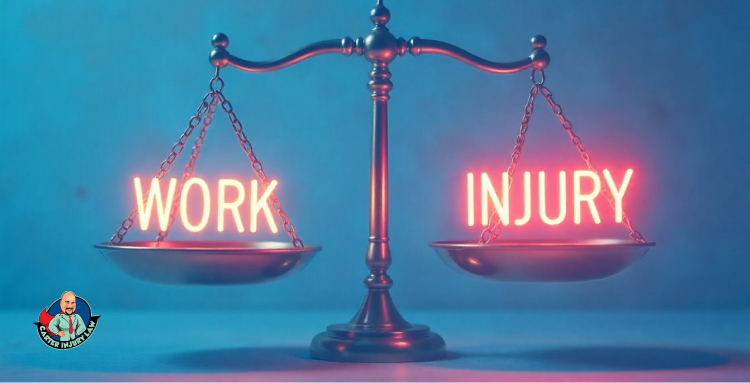
Insurance companies and defense attorneys don’t like to pay for time you weren’t working. They’ll dig into your medical records, question your injury, and act like sitting out of work was optional. It’s not personal. It’s business. But that doesn’t make it fair.
Let’s say you miss three months of work and lose $15,000 in income. Best case? You wait 2 to 3 years while we argue with the insurance company. You go to trial, maybe. Eventually, they agree to pay. You get your $15,000 and then you pay taxes on it.
Meanwhile, your rent was due three years ago. The grocery bill didn’t wait. And that money you finally got? It’s not worth what it would’ve been if you’d earned it in real time.
That’s why we always tell clients not to stay out of work just for the case. If you can’t work, we’ll fight that fight. But if you can work, don’t delay just hoping for a bigger check later. The system doesn’t reward that. Here's a quick video breakdown of your current situation.
5) Don’t Lose 3 Years of Pay Waiting on a Settlement
Insurance companies don’t see your time off as proof you were hurt. They see it as an opportunity to argue that you didn’t try to recover, didn’t try to work, didn’t mitigate damages. And while you’re waiting for them to come around, your bills keep coming, your savings shrink, and your stress skyrockets.
We don’t want that for you. Our job is to make you whole but no one can turn back time. That’s the honest truth. We’re here to help recover what you lost, but if you missed 3 years of income unnecessarily, there’s no legal miracle that gets those years back.
So here’s what we tell every client: if you can earn your paycheck now, earn it. Be honest with yourself and your doctors.
6) Accommodations, Modified Duties, and Real-Life Examples

If you’re a landscaper or a mechanic, the work is physical. You’re lifting, bending, carrying. That’s not something you can just push through with a sore back or a busted shoulder. It’s not safe, and frankly, it’s not possible.
However, not all jobs look like that. If you're in a more flexible role — maybe you’re in an office, working at a computer, answering phones — there may be a way to keep working, even with limitations. Ask for a modified duty assignment. Request accommodations. Sit instead of stand. Type instead of lift.
“Only 37% of U.S. jobs are primarily physical labor.”
That means most people can return in some form but it has to make sense for your body and your role.
7) Got Questions? Let’s Tackle ’Em Side by Side
The truth is, no two injuries and no two people are exactly the same. Some folks bounce back quickly. Others carry pain you can’t see. That’s why you don’t have to figure this out in a vacuum. That’s not the expectation, and it’s definitely not the smart play.
So if you’re unsure, if you’re hesitating, if you just want someone to explain what’s smart, what’s fair, and what’s next — that’s what we’re here for.
Call us. Before you return to work, after you have tried, or whenever you are ready.

Do I Have to Sue After an Accident? (And Why You Might Not Have To)
They say that life changes without warning. And in that moment, between impact and aftermath, most people aren’t thinking about lawsuits. They’re thinking, “Am I okay?” and then, very quickly, “What happens now?”
However, somewhere along the way — maybe it’s the insurance forms, or the medical bills, or the well-meaning friend who says, “You should sue them” — it starts to feel like you’ve been dropped into a courtroom drama you never signed up for.
And that’s where the misunderstanding begins. Most people think getting hurt means you’re now part of “the system.” But what if we told you… that’s not actually how it works?
Believe it or not, most of the time you don’t even have to sue. But to understand why, we need to start at the very beginning…
1) Claims Process is Not a Lawsuit, Just Step One
Let’s break this down, filing a claim is not the same thing as filing a lawsuit. You’re not dragging someone to court just because you opened a case. What you're really doing is starting a conversation — a formal one, sure, but a conversation nonetheless.
When you file a claim, you’re asking for help covering your medical bills, your missed work, and your pain. You’re saying, “Hey, this happened, and it wasn’t my fault. Let’s talk about making it right.” That’s very different from accusing someone in a courtroom.
In fact, most personal injury cases never make it to a courtroom. We handle things in what’s called the pre-suit stage — before a lawsuit is even filed. During this phase, we gather your medical records, calculate your damages, and send it all to the insurance company with a demand for a fair settlement.
“Around 95% of personal injury claims are resolved before they ever go to court.”
The first step is just getting your story in front of the right people and seeing if we can resolve it the straightforward way. And more often than not, we can.
2) “But I Don’t Want to Sue My Landlord (or That Nice Old Lady)”
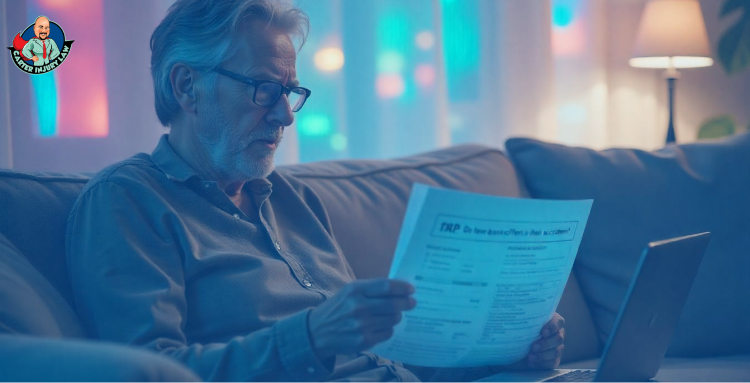
We hear this more often than you’d think — someone gets hurt, they know they need help, but there’s this hesitation. “I don’t want to sue my landlord.” Or, “She was just an old lady who made a mistake.” And hey, we get it. No one wants to feel like they’re attacking someone they know, or someone who didn’t mean to cause harm.
However, you’re not actually going after them personally. What you’re really doing is filing a claim through their insurance. That’s what insurance is for.
It’s not about being aggressive. It’s about being made whole. If you’re injured and facing medical bills, time off work, or long-term issues, you deserve help and the system is set up to provide that help through insurance.
“1 in 3 people involved in an accident hesitate to seek legal help because they don’t want to sue.”
— American Bar Association Consumer Perception Survey
You’re not being difficult. You’re not being dramatic. You’re just protecting yourself and that's a smart move.
3) When Does a Claim Turn Into a Lawsuit?
Most claims move along just fine. We send the demand, the insurance company responds, and we go back and forth trying to reach a fair number. But sometimes, things stall.
Maybe the offer that comes back is way too low. Maybe they flat-out deny the claim. Or maybe… they just don’t respond at all. When that happens, we have to ask a different question: Is it time to take the next step?
Yes, and it’s called filing a lawsuit. Now, just to be clear, filing a lawsuit doesn’t mean you're heading to court tomorrow. What it does is give us more tools to work with. We can request evidence, take depositions, and apply pressure that we can’t during the claims process.
And even then, most of these cases still don’t go to trial. Filing just keeps the process moving forward when the other side stops cooperating.
“Nearly 70% of personal injury lawsuits settle before they ever reach trial.”
— National Center for State Courts
So, if it reaches that point, it’s not a failure. It’s just the next phase. And we’ll walk you through it every step of the way.
4) What Happens If You Do Have to Sue?
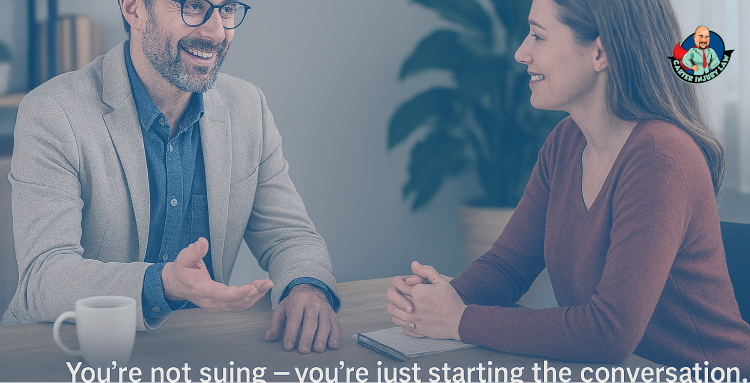
Alright, so let’s say the insurance company won’t budge and you decide it’s time to file. Here’s what that actually looks like.
We draft a document called a complaint. That’s the official legal filing that lays out your case like who was responsible, what happened and what damages you're claiming. Once it's filed with the court, a process server delivers it to the person or company you’re suing.
Yep, this is the moment where someone actually says, “You’ve been served.” It’s not quite like the movies, but it’s still a real thing.
From there, the case moves through a few phases: there’s discovery (where both sides exchange information), possibly depositions (interviews under oath), and if it doesn’t settle during those stages, it heads toward trial.
Now the good news is you’re not handling all this on your own. We take care of prepping documents, dealing with deadlines, and keeping everything moving. Your job is to focus on healing and staying informed. We handle the rest.
“The average personal injury lawsuit lasts 12–18 months from filing to resolution.”
— Martindale-Nolo Research 2022 Personal Injury Study
It’s not a fast process, but it’s not meant to be rushed. It’s meant to get you the result you deserve and we’ll make sure it’s done right. Here's a video from David Carter that can help simplify the process…
5) Why You Shouldn’t Wait to Call a Lawyer Even If You Don’t Want to Sue
Look, we know the idea of calling a lawyer can feel like you’re jumping into something big. And if you’re not even sure you want to sue, you might think, “Why bother yet?”
When we’re brought in early, we can gather the right documentation, like your medical records, accident reports, photos, and case specific items before anything goes missing or gets complicated. We make sure deadlines aren’t slipping by. And we deal with the insurance companies so you’re not stuck on the phone trying to figure out what to say and what not to say.

This is what’s called pre-suit support, and it’s a huge part of what we do. We’re helping clients navigate the process, set things up properly, and negotiate from a position of strength.
“Accident victims who hired a lawyer received 3.5 times more in compensation than those who didn’t.”
So no, you don’t need to be ready to sue just to talk to us. But having someone in your corner early on? That can make a whole lot of difference later.
6) You Have Options And Support
Somewhere between the pain and the paperwork, people start to feel alone. Like the whole thing is too big, too messy, and too legal. However, you’re not in a lawsuit unless you file one. And even then, you’re not in it alone.
If you have questions, ask them. If something feels off, say so. Call us before you file or even before you think about it. We’re here to walk you through it, patiently, clearly, and without pressure.

Should I Buy Uninsured Motorist Coverage Even Though I Have Health Insurance
We understand you have paid your premiums. You’ve got health insurance. Maybe you even feel a little responsible, prepared. However, accidents have a way of testing not just your body but your beliefs. And belief in the system? That’s often the first thing to break.
Because what nobody tells you is that health insurance has its limits. And when the person who hit you has no insurance at all, those limits show up brutally fast.
So let’s talk about that. Because if the crash hasn’t happened yet, this is your chance to do something most people never get.
1) Florida Doesn’t Require Bodily Injury Coverage
In Florida, bodily injury coverage isn’t even required.
Yes. You can register a vehicle, hit the road, and never carry a dime of bodily injury liability coverage. That means if that person runs a red light and slams into you, they could be fully legal and still have zero coverage to pay your hospital bills, your surgeries, your lost income, or any of it.
Florida is one of only two states in the entire country that does this, the other being New Hampshire, believe it or not. It’s not right. But it is reality. And the only way around it is to protect yourself before the accident ever happens, not after.
2) “David, What Can I Do?” The Call That Comes Too Late

I can’t even count how many times I’ve picked up the phone and heard the same thing on the other end, “David, what can I do? The guy who hit me doesn’t have insurance.”
And I can hear it in their voice, the pain and the regret. Because what they’re really asking is, “Is there any help left?” Sometimes there is. But too often, there isn’t. And that’s the part that’s hard to say out loud.
Because when someone doesn’t carry bodily injury coverage and you haven’t added uninsured motorist coverage to your own policy, there’s no secret safety net. Bills pile up, work stops, and the person who hit you walks away. It’s not just money. It’s your career, your plans, your ability to lift your child or hold a knife if you’re a chef. These are real stories. I’ve seen them firsthand.
And every time, I think, if only they had known. If only someone had explained it before the crash. Before the ambulance. Before the letter from the insurance company. That’s why I’m telling you now. So this isn’t your story later.
3) Health Insurance Pays Your Bills But Not Your Pain, Suffering, or Lost Future
Therefore, when someone tells you, “You don’t need uninsured motorist coverage — you have health insurance,” they’re either confused or they’re selling you short. Because those two things are not interchangeable.
Let’s break it down:
Health insurance pays the hospital, sure. But you’re still on the hook for deductibles, co-pays, physical therapy, maybe ambulance rides and none of it touches your pain and suffering.
Uninsured motorist (UM) coverage kicks in when the other driver does not have adequate coverage and helps you recover everything else. Things that don’t show up on a receipt but change your life all the same.
“The average hospital bill after a serious crash is over $62,000.”
And that’s just the beginning. That number doesn’t include the lost income. The years of therapy. The things you won’t get back.
So ask yourself, do you want a policy that just pays a few bills, or one that protects your future?
4) Insurance Agents Don’t Always Tell You the Whole Truth
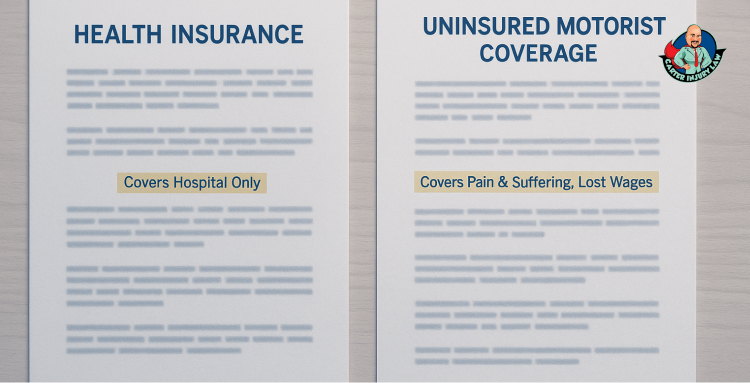
I’ve heard some things from insurance agents that should make your jaw drop. The big one?
“You don’t need uninsured motorist coverage if you already have health insurance.”
That is flat-out false. Insurance companies in Florida are legally required to offer you uninsured motorist coverage. They can’t just leave it off your policy and hope you don’t notice. The law requires them to offer it, and they cannot raise the price without the state's approval.
So what do they do instead?
They try to get you to reject it. They hand you a form full of dense legal language and say, “Sign here to save a few bucks.” What they don’t say is, “You’re giving up your right to be protected if someone hits you and has no insurance.”
That’s how they work around the law. They get your signature. They file that rejection form away. And then when you’re lying in a hospital bed, they say, “Sorry, you opted out.”
And why don’t they want you to have UM coverage? Because it costs them money when you use it. They don’t like selling you something that actually works in your favor.
Listen, not all agents are bad. But there’s a reason they’re trained to push certain lines and skip over others. The system rewards that. It’s not right, and it’s not transparent.
5) Protect Yourself Before It Happens And It’s Cheaper Than You Think
In Florida, UM coverage is actually one of the best deals you can get. That’s because the rates are regulated by law. Insurance companies can’t just charge any price they want. They have to get permission from the state if they want to raise your premiums for it. That makes this one of the few protections out there where the value is actually in your favor.
And the truth is saving a few bucks now could cost you everything later.
It sounds harsh, but I’ve seen it. People reject UM coverage to save $8 a month, and then years of hard work get wiped out in seconds by a driver who never carried proper insurance in the first place. The good news? You still have time to make a different choice. Here's a quick explanation to help you better prepare for what's coming.…
6) Not Sure If You’re Covered? We’ll Walk You Through It Right On Your Phone
If you’ve made it this far and you’re thinking, “Wait, I don’t even know if I have uninsured motorist coverage,” don’t panic. Most people don’t. They either forgot, they never really looked, or they signed whatever the insurance agent handed them without a second thought.
However, we can help you find out. Right from your phone.
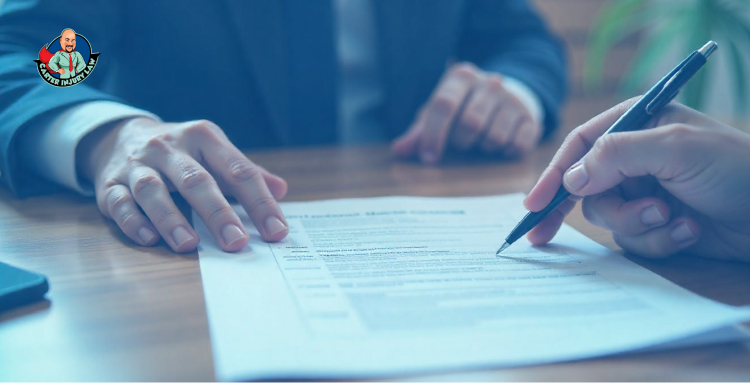
You can open your insurance app, and we’ll walk through it together. We’ll show you where to look, what coverage you have, and what it actually means.
Still can’t tell? That’s okay. We’ll send a letter to your insurance company for you. We’ll ask the right questions and get you the real answers.
And if you do have the coverage? Great. Now you can breathe a little easier. If you don’t? At least now you know. And you still have time to fix it. The goal here is to make sure you’re not stuck in the dark when life hits the brakes.
7) Uninsured Doesn’t Mean Unlucky, If You’ve Got the Right Coverage
You don’t get to choose who crashes into you. However, you do get to choose today whether that moment leaves you defenseless, or just shaken but standing.
And no, having UM coverage doesn’t make you paranoid. It makes you prepared. So whether the accident’s already happened, or you’re just starting to wonder what if, the answer is the same:
Call us. Before the crash, or after but call.
Because if no one else shows up to take care of you… your policy still can. And so can we.

Is It Legal To Drive A Golf Cart In A Neighborhood?
In neighborhoods where the world feels just small enough to know everyone’s dog by name, it makes sense to trade horsepower for something more… human. Something less about the destination, and more about the short, quiet ride.
But laws don’t always align with how we feel. And in Tampa, that’s where things get a little complicated. Because what feels harmless on your quiet street might not be legal. And something as simple as driving a golf cart to the mailbox or to a neighbor's barbecue could result in fines, insurance issues, or worse.
So the question isn't just "Can I?" It’s—what don’t I know yet… that I should?
1) Golf Cart or Low-Speed Vehicle? The Legal Line That Could Cost You
A golf cart is defined under Florida law as a vehicle that’s not capable of exceeding 20 miles per hour. These are commonly used in residential communities, retirement areas, and, of course, on golf courses. When used appropriately, they don’t require a title, registration, or insurance.
However, once that same vehicle is modified or built to exceed 20 mph, even slightly, it becomes a Low-Speed Vehicle (LSV) under both state and federal law.
And that changes everything.
An LSV must be registered with the Florida Department of Highway Safety and Motor Vehicles (FLHSMV), titled, and insured. It also has to meet strict safety standards: headlights, brake lights, seatbelts, rearview mirrors, reflectors, turn signals, a windshield, and a parking brake, just to name a few.
All Low-Speed Vehicles must comply with Federal Motor Vehicle Safety Standard 500 (FMVSS 500).
Understanding this line between casual and classified helps keep your Sunday drive from turning into a Monday court date.
2) Are Tampa Streets Golf Cart Friendly? Not All of Them.

Under Florida Statute, golf carts are only permitted on public roads that have been specifically approved by the local government. Even then, those roads must have a posted speed limit of 30 miles per hour or less.
You can’t just hop in a golf cart and drive down your suburban street unless the city or county has made that street legally accessible for golf cart use.
In the Tampa area, Davis Islands is the most well-known example of this. There, local authorities have approved certain routes for golf carts, and the roads meet the required speed and safety standards.
However, for most neighborhoods in Hillsborough County, golf cart access is still off-limits.
“As of 2023, Hillsborough County has approved golf cart access for less than 5% of its neighborhood roads.”
— Hillsborough County Public Works
Why is approval so limited? The process involves a formal request, traffic studies, safety evaluations, and signage. The county looks at things like road width, traffic volume, pedestrian risk, and visibility before giving the green light.
If your community is not on that list and you drive a golf cart on an undesignated street, you may be cited and, worse, held liable in the event of a collision.
3) How Old Do You Have to Be?
As of July 1, 2023, Florida law changed to make it crystal clear: anyone operating a golf cart on public roads—even in a golf-cart-approved community—must carry valid identification.
That means
If you’re 14 or older, you need at least a learner’s permit
If you’re 16+, a valid driver’s license is required
And this isn't just about ticking a box. Violating the age or licensing rule can lead to fines, traffic citations, and more serious implications if an accident occurs involving injuries or property damage.
Because if an unlicensed minor is behind the wheel during a crash, it could complicate insurance claims, lead to denied coverage, and open the door to personal liability lawsuits.
4) Before You Ride, Ensure Safety Equipment

Whether you’re driving through a designated community or just crossing a public road, your golf cart must be equipped with basic operational gear. That means
Reliable brakes
Reflectors (front and rear)
A rearview mirror
Proper steering control
Tires in safe, usable condition
Those are the minimum expectations for daytime use on approved roads.
Planning to drive after sunset? The requirements are even stricter. If your route is legally approved for nighttime use, your cart must also have:
Headlights
Brake lights
Turn signals
A windshield
And here's why it matters beyond just legal compliance:
“The U.S. Consumer Product Safety Commission reports over 13,000 golf cart-related injuries each year, often caused by missing or malfunctioning safety equipment.”
— U.S. Consumer Product Safety Commission
We’ve represented individuals seriously injured because a golf cart didn’t stop in time, wasn’t visible at night, or lacked the basic features needed to avoid a preventable crash.
5) Who’s at Fault When Things Go Wrong?
One of the most common misunderstandings we see is people assume their homeowner’s or auto insurance will automatically cover a golf cart accident. That is not always true, especially if the cart was being driven illegally.
If you're driving a golf cart on a public road that hasn't been officially designated for golf cart use, your insurance provider may consider that a breach of policy terms. And if the driver is unlicensed, or the vehicle lacks required safety features, the coverage could be denied altogether.
In these scenarios, even minor accidents can turn into major problems:
Medical bills for injured pedestrians, cyclists, or passengers
Property damage—to vehicles, fences, landscaping, or city infrastructure
Lawsuits from injured parties or their insurers
Personal liability if the claim isn’t covered under any existing policy
The rule is, if your golf cart isn’t street-legal, don’t treat it like a car. And if you are using it on the road—even in a golf-cart-approved area—call your insurance provider and make sure you’re covered. Some policies offer specific golf cart riders. Many don’t.
Don’t guess. Don’t rely on what your neighbor told you. Know your policy, your rights, and the law before the keys ever leave the hook.
6) Carter Injury Law Provides Legal Protection for Life’s Unexpected Turns
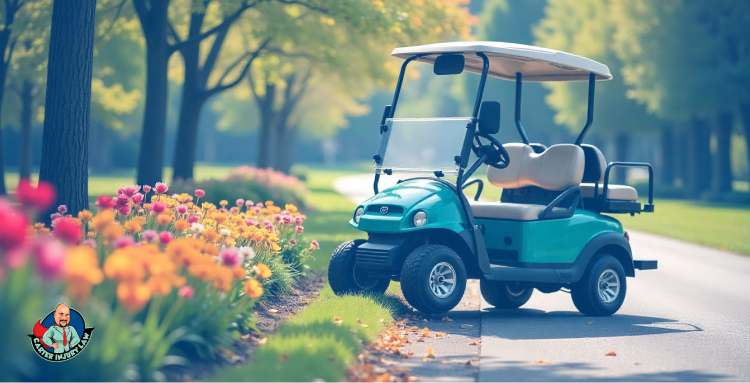
It starts quietly like most things that go wrong. One moment you're waving to a neighbor, coasting through your street, and the next, there’s a sound you can’t ignore. Then come the questions. The reports. The forms. And silence from the insurance company that once promised they’d be there.
We’ve represented injured pedestrians, wrongfully blamed drivers, and families navigating complicated insurance denials—all because a golf cart was used in the wrong place at the wrong time. Florida’s laws may look simple on the surface, but when liability enters the equation, it takes an experienced legal team to protect your rights and fight for what’s fair.
That’s why we don’t rush to conclusions. We listen first. We look at what happened. We find out what the law says and what the insurance companies aren’t telling you. Then we fight for the outcome you deserve. Because in moments like these, you shouldn’t be alone, and you definitely shouldn’t be left guessing.
We offer free consultations, full case evaluations, and we work on a contingency fee basis because justice shouldn’t depend on your bank account.
Call Carter Injury Law. Let’s talk before you decide, before you sign, before the silence gets louder.

What Really Happens in Demand Letters & Settlement Talks Phase
Somewhere between the hospital visits, the calls you didn’t want to make, and the pain you didn’t ask for, time kept moving. You did everything right. You went to the doctor. You answered every email from our office. You waited because healing takes time, and so does justice. And now, here we are. The demand phase.
However, this part isn’t just about documents or deadlines. We’ve been preparing for this moment from the very beginning.
But what happens next… isn't always fair, or predictable. In fact, it’s often the part where the story takes a sharp turn.
1) What Your Lawyer’s Doing Behind the Scenes While You’re Recovering
While you're focused on getting better, we're working behind the scenes to build the strongest case possible.
That starts with your medical records. We request them from every provider you've seen since the incident. Then we go through them line by line. We build out charts and spreadsheets that show not just what was charged, but what was actually paid, what was adjusted, and what you still owe.
That last part matters more than most people realize, because when it comes time to talk settlement numbers, your net medical bills are a huge factor in the negotiation.
And if there’s a doctor or a visit you haven’t told us about yet, let us know—now. We do our best to catch everything, but if we don’t know about a provider, the insurance company won’t either. They won’t consider it in the value of your claim unless it’s in the demand package we send.
And if it’s not in the package, it’s not on the table. As I often say, we scour your records. We build spreadsheets. We make sure nothing is missed.
2) The Demand Letter Gives You Power
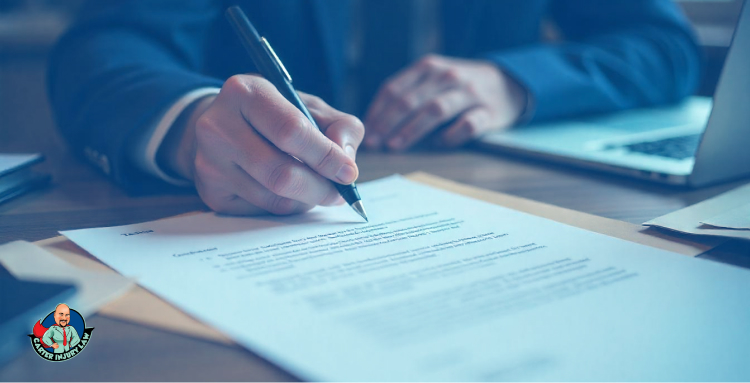
When we talk about a demand letter, we’re not talking about a generic form or a polite request. This is a carefully constructed, fully-loaded case presentation that lays out why you’re owed compensation and exactly how much.
We build a full narrative:
Your medical records
The bills
The treatment timeline
The liability story, how the accident happened and why the other party is at fault
The policy coverage involved
And most importantly, how all of it connects back to you. What you’ve been through, what you’re still dealing with, and what it’s going to take to make it right.
We send this out in multiple formats—on CD through certified mail, and if we can, we’ll also fax or email it directly to the insurance company. Because we want to eliminate their excuses. They can’t say they didn’t get it. They can’t say it wasn’t clear.
“In 2023, only 50–60% of personal injury cases settled before trial because early demand packages weren’t strong enough.”
That’s why we don’t just send a letter, we send a message. And it sets the tone for everything that comes next.
3) What Happens After We Hit ‘Send’
Once the demand goes out, the clock starts ticking. Most insurance companies are given 30 days to respond. That’s the general rule but like most things in this process, there are exceptions.
If we’re dealing with a government agency or a large corporation with layers of red tape, they might not get back to us for 60 to 90 days. And sometimes, let’s be honest, we get silence. No offer. No response. Just silence.
Now, that can be incredibly frustrating. You’ve been through enough already, and the idea of more waiting doesn’t sit right. However, we play the long game, and we do it with a paper trail. Why are we giving insurance companies extra time? It’s because we’re showing good faith. That matters down the line, especially if we need to take them to court.
“Under Florida law, insurers must acknowledge and act promptly but delays still plague up to 25% of serious injury claims.”
— Consumer Federation of America
So yes, waiting is part of this phase. But it’s not wasted time. It’s us building the pressure, positioning your case, and letting them know—we’re watching every move they make. Check out this video for an overview of demand letters and settlement talks.
4) Five Possible Outcomes And What They Mean for Your Case
Once the demand letter is out, there are a handful of ways things can go. Some are encouraging. Some are aggravating. All of them are part of the process and we’ve seen them all.
I) Policy Limits Are Tendered
This is the best-case scenario. The insurance company reviews your claim and agrees to pay the full amount of coverage available under the policy. If their insured has a $100,000 policy and they write a check for $100,000, that means they know the value of your case and they want to wrap it up.

II) Reasonable Settlement Offer
Sometimes they don’t offer the full policy, but they come to the table with a number that makes sense. That doesn’t mean we just accept and move on—we negotiate. Our experience lets us read between the lines of an offer.
If it’s a solid start, we go back and forth with them to push it higher. That dialogue can lead to a resolution without a lawsuit and that’s always worth exploring when the numbers are fair.
III) Claim Denial
Unfortunately, this does happen in slip and fall cases, premises liability, or intersection accidents where they think you’re more than 50% at fault. They’ll say, “We’re not paying anything.” When that happens, we regroup and walk you through your options. Sometimes it means filing suit. Sometimes it means digging deeper and giving them more evidence.
IV) Delay Tactics (Triple D)
Deny, Delay, and Defend. It’s about wearing you down. But we’ve seen it too many times to fall for it. If they’re playing games, we move forward. Sometimes that means a lawsuit. Sometimes that means calling their bluff. But it never means sitting back.
V) Lowball Offer
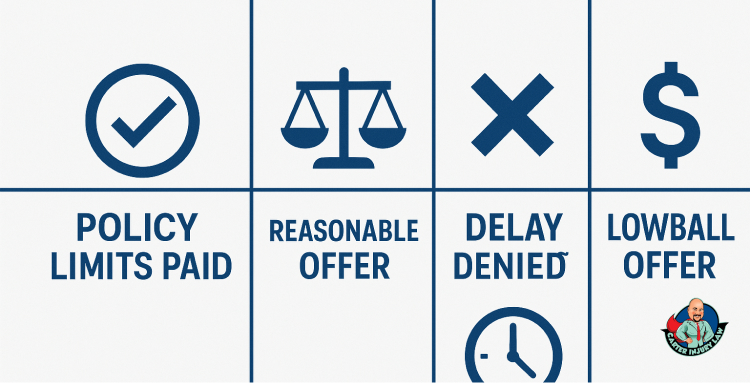
They offer you less than what you owe in medical bills. And while it’s technically “an offer,” it’s not one we take seriously. Negotiating off a lowball can actually hurt your position. If we believe the gap is too wide, we’ll likely recommend skipping the back-and-forth and going straight to litigation.
5) If the Offer Stinks, We File And We’re Ready.
Filing a lawsuit isn’t some dramatic move we pull to scare the insurance company. If they’re not serious, we file.
We’ve done everything in good faith. But if they still come back with an offer that doesn’t reflect your injuries or your bills, or worse, they ignore us altogether, then we pivot.
That said, we never file without your approval. Before anything goes to court, we’ll sit down, explain the process and talk through what filing means for your timeline, your case, and your options.
You’re the decision-maker. We give advice. You give the go-ahead.
Because this is your case. Your future. And when you're ready to take the next step, we’ll already be ten steps ahead. You’ve got a team behind you.
And we’re not going anywhere.

Can I Change My Lawyer During a Personal Injury Case in Florida?
There’s a strange kind of silence that settles in when your lawyer stops calling you back. You wait. You wonder. You tell yourself maybe they’re just busy. But eventually, that silence turns into doubt. Are they doing anything? Do they care? Shouldn’t I feel something more than ignored in my own case?
Most people don’t plan for this moment but it happens. More often than you think. And when it does, there’s one question that slowly rises above the noise.
Can I really change my lawyer? Let’s talk about that. But first, something you should know…
1) Yes, You Can Change Your Attorney in Florida And Here’s Why
In Florida, the law gives clients the right to discharge their attorney at any time, with or without cause. You don’t need to wait for a milestone in your case, and you don’t need to justify your decision to anyone. If something doesn’t feel right, whether it’s communication, trust, or just a disconnect, you have the freedom to explore a better fit.
The Florida Bar actually addresses this directly in their Consumer Guide to Hiring a Lawyer. They explain that a client may end the relationship at any time, although the discharged lawyer may have a right to compensation for the work already performed.
You’ve got one case and one shot at getting it right. So if you’re starting to question whether your current representation is serving your best interest, it’s okay to pause and ask what’s next.
2) The #1 Reason People Switch Lawyers? Communication Breakdown

It’s not always about the outcome. More often, it’s about the silence. One of the most common reasons clients decide to change lawyers is simple—they’re not hearing back. They’re left wondering what’s going on with their case, and they’re tired of chasing down answers.
In fact, the American Bar Association has reported that over half of all complaints against attorneys have to do with poor communication. Not malpractice. Not billing issues. Just a lack of response, updates, or clarity. And that tells you something.
Of course, it’s not always just about phone calls or emails. Sometimes the issue runs deeper. Maybe there’s a disagreement about strategy. Other times, it’s professionalism. Missed deadlines, short tempers, or a general sense that things aren’t being handled the way they should.
And sometimes… people just don’t click. That’s okay, too. This is a working relationship, and trust is everything. If it’s not there, no one benefits—not you, and not your case.
3) What If Your Case Is Already in Litigation?
Now, if your case has already made it to court, switching lawyers is still very possible but there’s just a bit more to it.
Litigation doesn’t lock you in. What it does is add a few extra steps. At that stage, your attorney has likely filed documents on your behalf, maybe even appeared in court. So changing counsel means officially letting the court know that someone new is stepping in.
In Florida, this is handled through what’s called a Substitution of Counsel, and it’s all governed by the Florida Rules of Civil Procedure. It’s a formal process, but it’s nothing to stress over. Most of the time, your new attorney handles it for you, from notifying the court to coordinating with your previous lawyer.
4) What Happens to Fees If You Switch Lawyers?
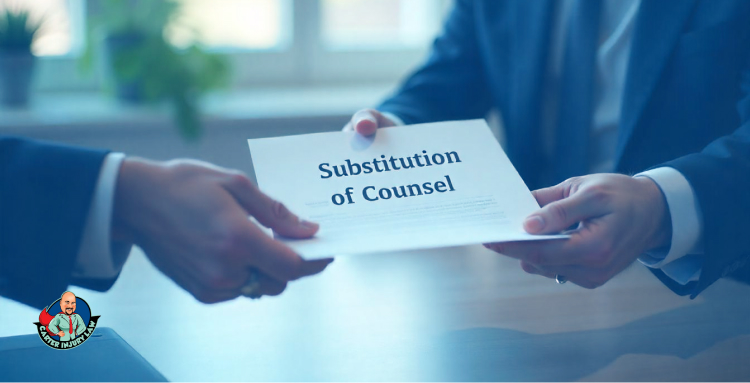
One of the first questions people ask when thinking about switching attorneys is, “Will it cost me more?” And I get it, that’s a fair concern.
However, in most personal injury cases, the answer is no. You're likely working under what's called a contingency fee agreement, which simply means your attorney only gets paid if and when you win a settlement. You’re not paying anything out-of-pocket along the way.
So if you decide to change lawyers, you’re not stacking up two fees. The fee is usually a set percentage of your settlement that is split between your previous and new lawyers. It doesn’t come out twice. It just gets divided based on who did what and when.
Now, there are some cases where the outgoing attorney may claim a lien, basically a right to payment for the time they already spent working on your case. That’s not unusual. The amount depends on the hours logged or the value of the work done. But even then, it’s handled between the lawyers. You’re not stuck in the middle of a fee dispute.
5) When to Get a Second Opinion Without the Guilt
We do it with doctors. We do it with mechanics. So why not with lawyers? Getting a second opinion on your case doesn’t mean you’re being difficult or disloyal. It just means you’re being thoughtful and when it comes to something as personal and life-altering as a legal claim, that’s exactly what you should be.
There’s no rule that says you have to stick with the first lawyer you hired. And just because you’re asking questions doesn’t mean you’re burning bridges. You’re allowed to explore your options. In fact, you should, especially if something feels off.
Now of course, we always keep things professional and ethical. If you reach out to us while you’re still represented by another attorney, we’ll make sure everything’s handled the right way. No backdoor moves, no pressure. Just an honest conversation about where your case stands—and what could come next if you decide to make a change. Here's a more straightforward explanation of how the process works.
6) How to Switch? A Simple Step-by-Step by Carter Injury Law
If you’ve made the decision to move forward with a new attorney, here’s what the process actually looks like. It’s simpler than most people expect and we make sure it stays that way.
Review your current agreement
Just take a look at the paperwork you signed with your current lawyer. We’re mainly looking at the fee arrangement and any language about ending the relationship. If you’re not sure what you’re reading, don’t worry, we’ll help you break it down.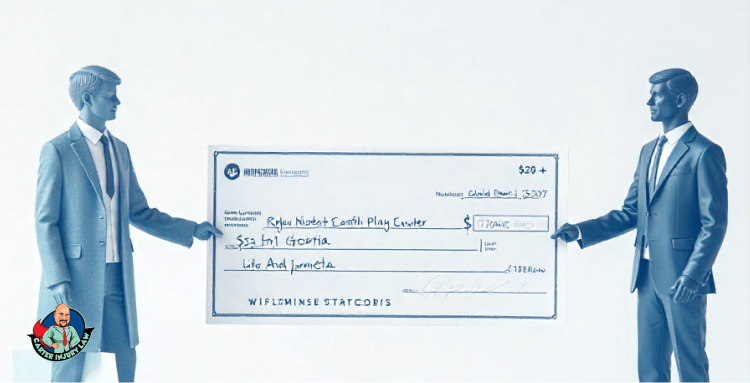
Contact a new attorney (like us)
This is the moment where you take back control. We’ll talk through where your case stands, what’s been done so far, and whether switching makes sense for you. If it does, we’ll move forward—no pressure, no rush.We’ll handle the transition paperwork
Once you give the go-ahead, we’ll send formal notice to your previous attorney, notify the court (if your case is in litigation), and file the necessary documents. You won’t be stuck making awkward calls or chasing anyone down.
And that’s it. We take care of the details so you don’t have to. You focus on healing, on moving forward. We’ll make sure the handoff happens smoothly and that your case doesn’t miss a beat.
If you’re standing at that crossroads, unsure whether to stay or move on, you don’t have to figure it out alone.
Call Carter Injury Law at 813-922-0228 or visit Carterinjurylaw.com

What Happens When You Reject an Insurance Settlement Offer?
They say a number is just a number. But sometimes, it feels like someone took your pain, ran it through a calculator, and handed you back a dollar amount that barely scratches the surface.
You open the envelope. Or maybe the settlement came by email. The offer looks official, like the kind of thing you should accept and be grateful for. After all, the bills are piling up.
It’s tempting, isn’t it? The idea that this whole mess could just… be over. One signature and you move on.
However, accepting too soon might not just shortchange your claim. It could cost you the rest of your recovery. Because in Florida, rejecting a settlement doesn’t close the door. It might just open the right one.
1) Why So Many Claims End in Low Offers
Florida is a no-fault insurance state, which means after most car accidents, your own insurance company pays for your initial medical bills and lost wages, regardless of who caused the crash. This is done through Personal Injury Protection (PIP) coverage.
Sounds fair in theory, right? But there is a catch, PIP only pays up to $10,000, 80% of medical bills, and 60% of lost wages. In a serious crash, that barely scratches the surface. And unless your injuries qualify as “serious” under Florida law, you may not be able to pursue additional compensation from the at-fault driver at all.
That’s where many claims hit a wall. People assume that what they receive is all they’re entitled to—when in reality, they might have the right to file a personal injury lawsuit for damages well beyond the PIP cap. But without legal guidance, those rights often go unused.
The result? A flood of quick, lowball settlement offers and far too many people walking away with less than they need to heal.
2) Rejecting the Offer: What It Really Means
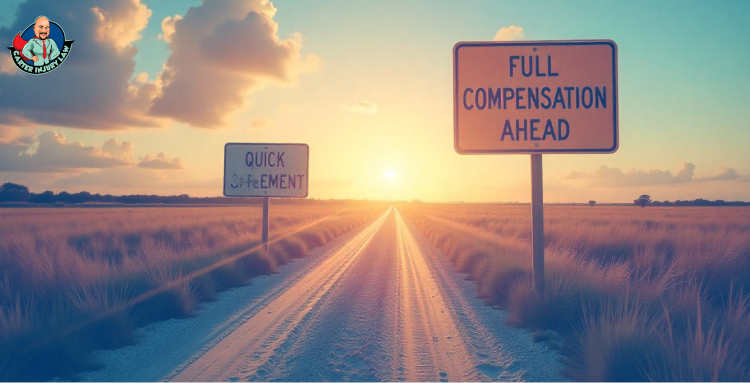
Saying "no" to an insurance settlement doesn’t make you difficult. It makes you deliberate. You’re not closing the door; you’re simply keeping it from being slammed shut on what you rightfully deserve.
Rejecting an offer is part of the legal process. It means you're standing up for a full and fair outcome. The insurance company has their bottom line in mind. You should have yours, too.
So how do you do it the right way?
Put it in writing. The rejection should be formal, respectful, and preferably sent by your attorney. It should include specific reasons why the offer falls short. That might be unaccounted-for medical costs, ongoing treatment needs, lost income, or long-term impacts on your life and ability to work.
Include documentation. Don’t just say it’s not enough—show why. That means attaching medical records, wage loss statements, doctor assessments, and any projected costs for future care.
Stay professional. You’re not cutting ties with the insurance company; you’re laying out a counterpoint backed by evidence. It keeps negotiations open and solidifies your position if the case goes further.
Rejecting an offer is about buying yourself time to get it right. Because once you accept and sign, there’s no turning back.
3) Florida Laws to Know Before You Say ‘No’
Before you turn down that settlement offer or accept it, it’s worth knowing what the law says about your window of opportunity and how fault is handled in Florida.
As of 2023, Florida’s statute of limitations for negligence-based personal injury claims is 2 years.
That’s down from 4 years in the past. So, if you’re thinking about rejecting a lowball offer and possibly filing a lawsuit later, the clock is already ticking. 2 years might sound like plenty of time, but between medical treatment, paperwork, negotiations, and insurance delays, it can slip by faster than you think.
Florida also uses a modified comparative negligence system. What does that mean? If you’re found partially at fault for the accident—say, 20%—your compensation is reduced by that percentage. So a $100,000 settlement becomes $80,000.
However, if you’re found more than 50% at fault, you get nothing.
And once you accept a settlement and sign the release, your case is closed permanently. No appeals. No renegotiation. Even if you discover you’ll need surgery six months from now or your condition worsens, the deal is done.
That’s why Florida law gives you the right to reject, reassess, and renegotiate but only within the rules and only within the time frame.
4) What Happens After You Reject it & How Carter Injury Law Changes The Game
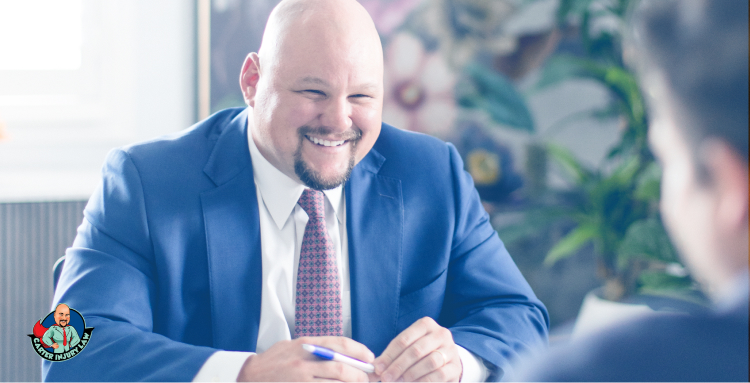
When you're dealing with an insurance company, you’re not just up against a claims adjuster. You’re facing a corporation with lawyers, algorithms, and decades of experience aimed at paying out as little as possible.
Most people only look at the bills they have in front of them, like an ER visit or maybe a few weeks off work. But our team looks deeper. We account for future surgeries, long-term care, permanent limitations, lost earning potential, and pain that doesn’t show up in a receipt.
We know how the game works. Insurance companies expect resistance and when Carter Injury Law is involved, they know it’s more than just pushback. It’s a problem they have to take seriously. Here’s how we take it from there:
Step 1: We Send a Counteroffer That Commands Respect
We don’t just ask for more—we build a demand package backed by real numbers. Medical bills, long-term care projections, lost earnings, pain and suffering—we lay it all out. And we do it in a way that makes it crystal clear: this case has value.
Step 2: We Negotiate Relentlessly
The insurance company might drag its feet, request more records, or toss out slightly better offers. That’s where our experience comes in. We don’t settle for small wins—we press forward with a strategy built to get you the best result, not the fastest one.
Step 3: We Can Recommend Mediation if It Moves the Needle
If talks stall, we might suggest mediation. It’s a more informal setting, guided by a neutral third party. And when we walk into that room, we come prepared—with evidence, leverage, and a clear ask.
Step 4: We’ll File the Lawsuit If That’s What It Takes
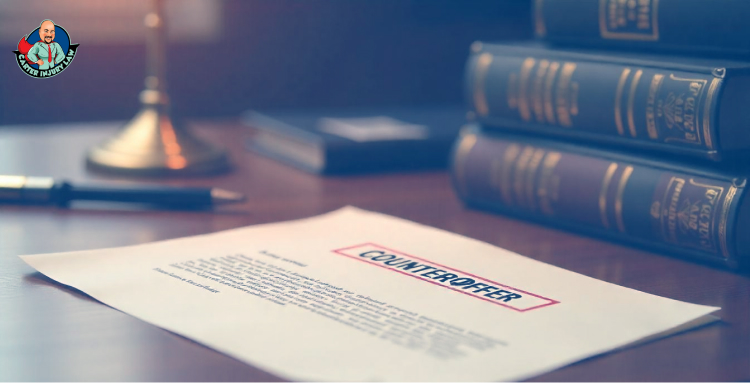
When negotiations hit a wall, we don’t hesitate. Filing a personal injury lawsuit often gets the insurer’s attention in ways negotiation letters never will. And no, we don’t bluff. We prepare like we’re going to trial, because that’s how serious cases are won.
Roughly 95% of personal injury cases settle before they ever reach a courtroom.
There are moments in life when the hardest thing to do is to wait. To pause. To say, “Not yet.” Rejecting a settlement offer can feel like stepping into the unknown, but sometimes, it’s the only way to avoid trading your future for a quick, quiet exit.
So, before you say yes, say hello. Get a free consultation. You only pay us if we win your case. And we’ll tell you what your case is really worth and fight to get it.

What Is The Average Settlement For A Motorcycle Accident?
You don’t think about the pavement when you're riding. Not really. You know it’s there, but your mind isn’t on the ground. It's on the wind. On the rhythm. On the freedom. Until it isn’t.
Florida doesn’t cushion the fall. It doesn’t offer the quiet security of no-fault protections to bikers. No warm guarantees. Just asphalt, sirens, and questions nobody prepared you for.
How bad is it? What happens now? And the one question that always comes later, What is a wrecked life worth in dollars and cents? Let’s start there…
1) Florida’s Roads, Realities & Risk: Why Riders Pay the Price
Florida has long been a haven for motorcyclists. Year-round sunshine, flat open highways, and a strong riding culture make it one of the most motorcycle-friendly states in the country, at least on the surface.
However, beneath that freedom is a far less forgiving reality. Florida may offer the ride, but it also carries some of the highest crash and fatality rates in the U.S. for motorcyclists. Whether it’s tourists unfamiliar with the roads, distracted drivers, or high-speed sprawl on highways like I-75 and US-1, riders here face unique risks every time they gear up.
"In 2022, Florida saw over 8,600 motorcycle crashes, with more than 600 resulting in death."
— Florida Department of Highway Safety and Motor Vehicles
This isn’t about scaring people away from riding — it’s about facing the road with both eyes open. Because while the wind and the freedom are real, so are the consequences when something goes wrong.
2) No PIP for Bikes & Florida Riders Start at a Disadvantage

Florida operates under a no-fault insurance system but there’s a catch. While drivers of cars and trucks are required to carry Personal Injury Protection (PIP), motorcyclists are left out of that equation entirely. The law doesn’t extend PIP coverage to motorcycles, which means riders don’t get immediate access to medical benefits through their own insurance after a crash.
So, what does that actually mean in practice?
It means that if you’re injured in a motorcycle accident, even if it wasn’t your fault, there’s no automatic help for your hospital bills. No fast track compensation for lost wages. Instead, you’re left to pursue a claim against the at-fault driver, assuming they even have insurance… or assets to recover from.
And that assumption? It’s a risky one in Florida.
"Motorcyclists are 28 times more likely to die in a crash than passengers in cars."
— National Highway Traffic Safety Administration
For motorcyclists, this creates a dangerous gap. You’re exposed twice; once on the road and again in the aftermath, when coverage you assumed would be there… isn’t.
3) What’s the Average Motorcycle Accident Settlement in Florida?
There’s no universal price tag for pain. The numbers vary based on how badly you were hurt, how much time you’re out of work, and how strong the evidence is around who caused the crash.
Here’s a general breakdown:
Minor injuries (like sprains, soft tissue damage, or road rash): Typically fall between $10,000 to $30,000
Moderate injuries (fractures, surgery required, some missed work): Range from $30,000 to $75,000
Severe injuries (traumatic brain injuries, spinal damage, permanent disability): Often valued at $100,000 to $500,000+
Fatal accidents or wrongful death claims (especially involving a primary wage earner): Can exceed $1 million, depending on the case
Each case is shaped by its own set of facts. The insurance limits involved, the long-term impact on your health and livelihood, and even the quality of legal representation you choose. A cracked rib and 6 months of missed wages can settle for more than a broken wrist, depending on how the injury affects your life.
4) What Factors Shape Your Settlement?
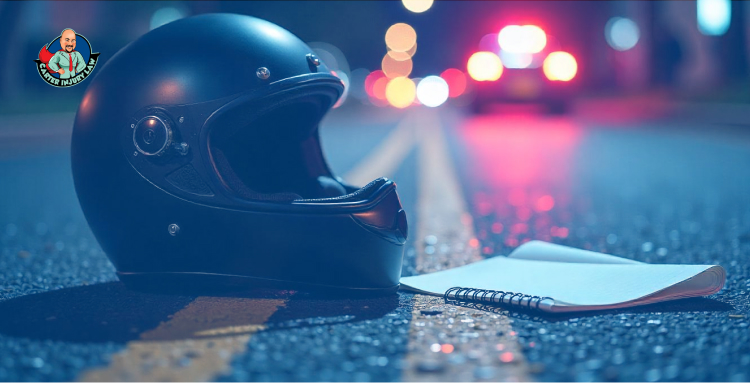
There isn't a single golden rule when it comes to valuing a motorcycle accident claim but certain factors consistently move the dial. In Florida, the outcome of your case depends not just on what happened, but on how the law applies to the details of your story.
Let’s break it down:
Liability and fault
Florida follows a pure comparative negligence rule, which means even if you were partly at fault, you can still recover damages but your payout is reduced by your percentage of fault. So if you’re awarded $100,000 but were 30% responsible, you’d receive $70,000.Severity of the injury
Broken bones heal. Traumatic brain injuries don’t always. The more long-term or permanent the damage, the more compensation your claim may demand. Especially if it limits your ability to live or work independently.Medical expenses
Not just what you’ve paid but what your doctors say you’ll need going forward. That includes physical therapy, surgeries, prescriptions, and even mobility devices or home modifications.Lost income & diminished earning capacity
If you’ve missed work, that gets added to your claim. But if you can’t return to the same job or work at all, the financial impact grows dramatically.Pain and suffering
There’s no bill for chronic pain or anxiety, but Florida law allows for these damages to be included in serious cases. The more disruption to your daily life, the more weight this factor carries.Insurance policy limits
Even a million-dollar injury won’t result in a million-dollar settlement if the at-fault driver only carries the state minimum unless they have significant personal assets or you’ve purchased uninsured/underinsured motorist coverage.
Two people could suffer the same injury but walk away with vastly different results—all because of how these factors stack up. The law offers a structure, but the outcome depends on the specifics of your case.
5) Carter Injury Law Fights for Your Maximum Compensation
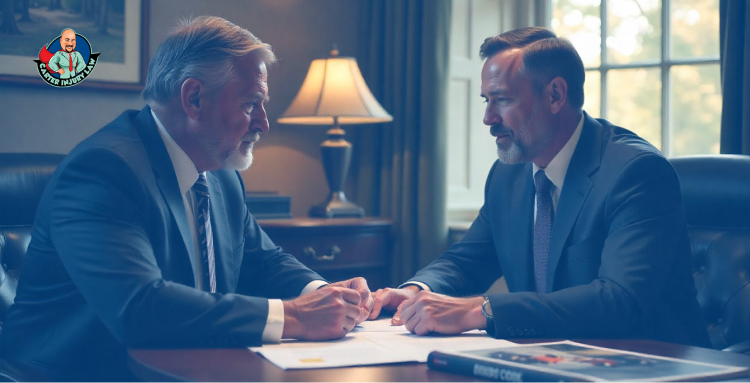
Here’s the part no one tells you at the dealership, you can follow every rule on the road, wear your helmet, stay visible, and still end up in a hospital bed with no coverage for your injuries. That’s because Florida’s insurance system has a blind spot when it comes to bikers.
And it’s not just PIP that’s missing. The real danger lies in what other drivers are carrying or not carrying.
If someone hits you and they’re uninsured (or carry the bare minimum), you could be left holding the bag for tens of thousands in medical bills.
Therefore, we start with a thorough investigation, reviewing police reports, analyzing damage, interviewing witnesses, and pulling surveillance footage if it exists. Every detail counts because the burden of proof is on you, the injured party.
We work closely with:
Medical experts who can document your injuries and project long-term care needs
Accident reconstructionists who help explain how and why the crash happened
Insurance adjusters, not as adversaries but as negotiators who need to know you’re prepared to go the distance
And most reputable injury firms, including ours, operate on a contingency fee basis. That means you don’t pay anything up front. We only get paid when we win your case.
The law can’t undo the accident. However, it can offer something that helps you begin again with the right hands guiding the way.

How Long Do I Have to File a Personal Injury Claim in Florida
No one wakes up thinking today will be the day everything changes. But then it does. One careless moment, one unexpected injury and suddenly, your world shifts.
In the days that follow, there’s pain, confusion, paperwork… and silence. A quiet question begins to creep in: What now? Or, more urgently, how long do I have before I lose the opportunity to file a personal injury claim?
It's odd how time passes after an accident. You feel like you should have plenty of it, until someone tells you otherwise.
The truth is, Florida’s injury laws are not as generous with time as they used to be. And that’s not just a legal technicality; it’s a detail that could decide whether your claim stands or falls.
1) If You Were Injured Before March 24, 2023, Here's What Applied
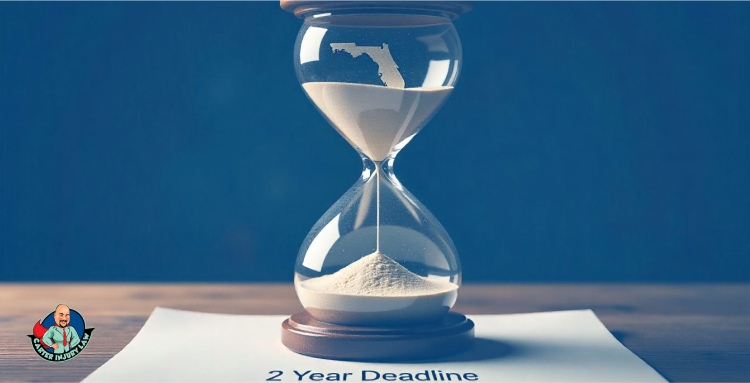
If your injury happened on or before March 24, 2023, the time you had to file a personal injury claim was a little more generous. Florida law gave injured individuals up to 4 years to bring a lawsuit against the party responsible for their injuries. That was the general rule.
But of course, not every situation falls under the same umbrella.
Wrongful Death Claims Were Treated Differently
In cases where the injury resulted in the tragic loss of life, the timeline was shorter. The law allowed 2 years from the date of death to file a wrongful death lawsuit. These cases tend to move faster, not just legally, but emotionally too. So the state gave less time to act.
Medical Malpractice Had Its Own Clock
Now, if your case involved medical negligence—say a doctor’s mistake or a misdiagnosis—the deadline was also 2 years. These types of claims are complex and often require expert testimony, so that shorter window made it all the more important to get legal guidance early on.
Uninsured Motorist Claims Followed Contract Law
Then there’s the situation where you’re dealing with your own insurance company—specifically your uninsured motorist coverage. These cases are handled a bit differently because they’re based on your policy contract. In those situations, you typically had up to 5 years to file a claim. That extra time reflected the nature of a contractual dispute rather than a traditional injury lawsuit.
For Most Injuries, You Had Four Years
So if your case involved something like a car accident, a slip and fall, or any type of injury caused by someone else’s carelessness, that four-year window was the standard. It gave people enough time to recover, assess their situation, and figure out the next steps.
2) Injured After March 25, 2023? Here's What Changed

On March 25, 2023, the clock started ticking a little faster for injury victims in Florida. That’s when a major change in the law took effect, and it’s one that anyone filing a personal injury claim needs to know.
The Statute of Limitations Was Cut in Half
Before this date, most people had four years to file a lawsuit after an injury. But under the new Florida statute of limitations for personal injury claims, that window was reduced to just 2 years.
That means if you were injured on or after March 25, 2023, you now have 2 years from the date of the incident to take legal action. Whether it was a car accident, trip and fall, or any injury caused by someone else’s negligence—that two-year deadline applies.
Not sure how this affects your case?
Attorney Rob Johnson breaks it down clearly in this short video, so you know exactly what to expect:
Why This Change Matters for Injury Victims
It may not seem like a significant difference at first. However, in the legal world, two years can pass quickly—especially when you're focused on healing, dealing with insurance, and getting your life back on track.
3) Waiting Comes at a Cost: Don’t Let Time Take Away Your Options
When it comes to filing a personal injury claim, time is both a deadline and a strategy. The earlier you take action, the more control you have over the direction of your case.
Evidence Doesn’t Wait
The longer you wait, the harder it becomes to gather the proof you need. Video footage can be erased, scene conditions change, and critical documents can go missing. Even things like vehicle damage or unsafe property conditions might get repaired—eliminating key pieces of your case.
People Forget Details
It’s natural. Witnesses who were sharp and certain at the time of the accident might start to second-guess themselves months later. Their memory fades, and their confidence in what they saw weakens. The sooner statements are taken, the more reliable they are—and the stronger your case becomes.
Insurance Companies Move Fast And So Should You
Insurance adjusters often reach out quickly after an accident, sometimes before you’ve even seen a doctor. Why? Because they know the sooner they catch you off guard, the better chance they have of minimizing your claim. Acting fast levels the playing field.
The sooner we step in, the sooner we can secure the evidence, talk to witnesses, and start building your case.
4) What If You’re Not Sure How Much Time You Have? Here's What a Lawyer Can Tell You That the Law Can't

The majority of people don't prepare for mishaps. And when they happen, time becomes a strange thing. It speeds up and slows down all at once. One moment, you're just trying to catch your breath. And then you're told that you might have already waited too long.
That’s why guessing is never the answer. Laws change. Exceptions exist. And what applied to someone else’s case may not apply to yours.
More than 50% of personal injury plaintiffs don’t pursue legal action within the statute of limitations because they don’t realize how short the window is.
Source – Florida Bar Journal, 2023
And just like that, the door can close before you even know it was there.
That's what we say to help you, not to frighten you. Because if you were hurt and you’re still unsure whether you have a claim, the best thing you can do is ask. A simple conversation could mean the difference between recovery and regret.
Carter Injury Law is here to help you figure that out. Call us today at 813-922-0228 or visit carterinjurylaw.com. Let’s find out what time you have before it slips away.

How Are Personal Injury Settlements Paid Out?
There’s a quiet kind of uncertainty that comes after the storm. You’ve fought your case, stood your ground, and won. But now what? How are personal injury settlements paid out, really? It's a quiet question that just sits there, waiting for clarity. Because winning a case is one thing. Getting paid is another.
Most people imagine that a check just arrives one day. No strings, no steps. However, the truth is more nuanced. Your settlement is more than just a number; it is a process that breaks down what you owe, what is deducted, and what ultimately ends up in your hands. And understanding that process means understanding your power.
Let’s walk through it together.
1) What Are Personal Injury Settlements?
A personal injury settlement is the compensation you receive after you’ve been hurt due to someone else’s actions. Think of it as a way to make up for the physical, emotional, and financial toll an injury has taken on your life. It's not just about paying for your medical bills; it's about addressing lost wages, pain and suffering, and other damages that affect your well-being.
There are a few types of settlements that may come up in a personal injury case. One common option is the lump sum settlement. This is typically how most personal injury cases are resolved. Essentially, you receive a single, one-time payment for everything your case covers—from your medical bills to any wages you've lost due to the injury.
Another type is a structured settlement, where payments are made over time, but we won’t get into that today. For now, we’ll focus on the lump sum, because it’s the most straightforward and the one you’ll likely encounter. The beauty of this option is its simplicity: you get a full settlement amount in one check, which can be a relief after a long process.
2) The Most Common Settlement Option: Lump Sum
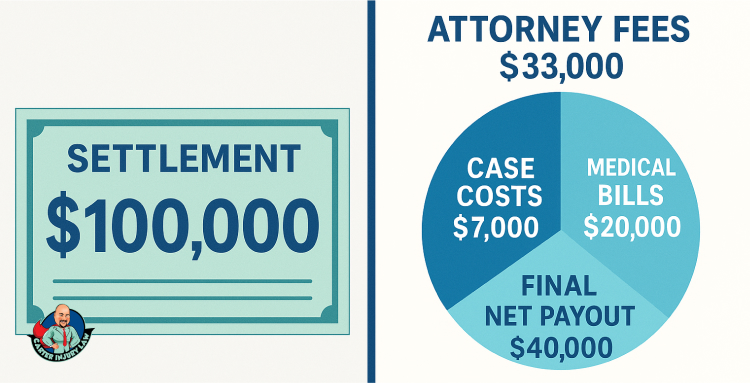
The lump sum settlement is by far the most common option you’ll come across. It’s straightforward, easy to understand, and typically the best choice for most cases. In simple terms, it means you receive a one-time payment that covers everything in your case.
For example, if your settlement is $100,000, that amount is meant to cover your injuries, damages, and lost wages. Everything you’ve gone through—from the moment of the accident to the ongoing impact on your life—is included in that lump sum.
"The lump sum is paid by the insurance company or the at-fault party."
"That $100,000 is yours to use as you need, after deductions for fees, costs, and medical bills."
This makes the lump sum a practical option, allowing you to manage the funds however you see fit, whether that’s paying for medical expenses, covering lost income, or simply getting back to normal life.
Watch the short video below where Rob Johnson breaks down exactly how a lump sum settlement works and what it means for your recovery:
3) What Comes Out of the Lump Sum?
When you receive your lump sum settlement, it’s important to understand that not all of it will be in your pocket right away. There are a few things that need to be covered first, but don’t worry, we’re here to help you navigate the process.
Attorney Fees
The first thing that will be deducted is your attorney’s fees. At Carter Injury Law, we work on a contingency fee basis, which means we only get paid if you win. These fees are typically a percentage of the settlement, and they are taken out of the lump sum before anything else.
Costs Associated with the Case
In addition to attorney fees, there are certain costs that come up during the case. This might include court filing fees, expert witness costs, or other expenses related to preparing your case. These costs will also come out of your settlement before you see the final amount.
Medical Bills
One of the things that sets us apart at Carter Injury Law is our approach to medical bills. We don’t just leave you to deal with these bills on your own. We work directly with your medical providers to reduce those costs, helping you keep more of your settlement in the end. This is something we’re very proud of and believe it’s one of the ways we truly add value for our clients.
We understand these numbers, these deductions—they can feel like too much all at once. But that’s why we’re here. While the system has its steps, its fees, its bills, none of it should weigh heavier than your healing. We take care of the details, the paperwork, the quiet negotiations behind the scenes. So you can do what matters most—breathe, recover, move forward.
4) The Closing Statement: What to Expect
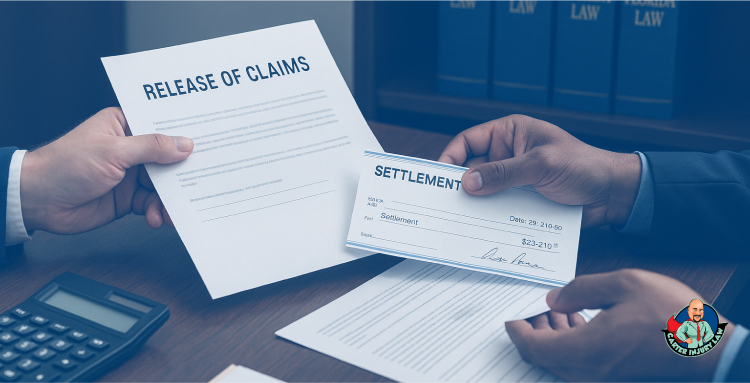
Once all the deductions have been made from your lump sum settlement, the next step is signing the closing statement. This is an important part of the process that ensures everything is accounted for and clearly outlined.
What Is a Closing Statement?
A closing statement is essentially a breakdown of your settlement. After we’ve covered all the necessary deductions—attorney fees, case costs, and medical bills—this document will show you exactly what’s been paid out and what remains for you. Think of it as the final summary of how the lump sum has been distributed.
Breakdown of the Closing Statement
The closing statement will list all of the payments that were made throughout the process, giving you a clear view of where your settlement money has gone. It will also show any remaining balance after all fees and expenses have been deducted, leaving you with a transparent understanding of your net settlement.
The Final Check: Your Net Settlement
Once everything is finalized, what’s left over is the final check you receive—the net settlement. This is the amount you’ve been working toward, the money that is yours after everything has been taken care of. It’s the payout you’ll use to cover your ongoing needs and start getting back to normal life.
Our Other Relevant Blogs You Would Find Useful:
Why Local Tampa Attorney is Vital for Winning Your Personal Injury Case
What Does Full Coverage Mean in Florida? Understanding the Misconception
How Long Will Your Personal Injury Case Take? Carter Injury Law Reveals the Truth
5) The Final Step: Release and Getting Paid
After everything is settled, there are just a few final steps before you get your check. While it’s the last part of the process, it’s crucial to understand what happens at this stage.
Release of Claims
The final step involves signing a release of claims. This is a legal document that clears the insurance company and the at-fault party from any future claims related to your case. Once you sign it, you're officially releasing them from any further liability. It’s an essential part of closing out the case, but don't worry—we’ll walk you through it, so you fully understand what you’re signing.
Receiving the Check
Once the release is signed and all the details are in order, you’ll receive the final settlement amount—minus the previously discussed deductions. This is the check you’ve been waiting for, the net settlement, which you can use as needed for your recovery, future expenses, or anything else that will help you move forward.
Let’s Talk, If You’re Ready
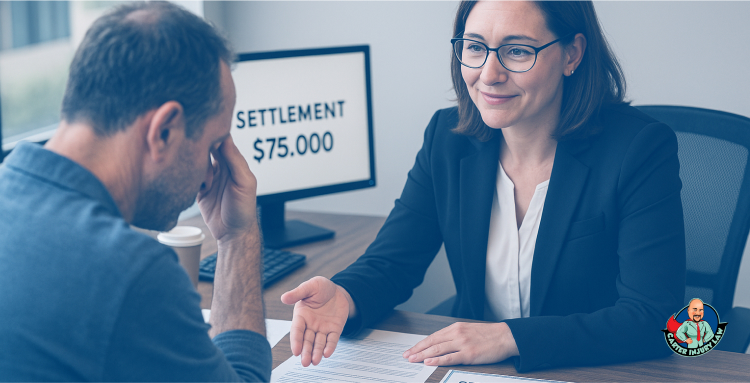
Sometimes the hardest part isn’t the injury itself, it’s what comes after. The paperwork, the calls, the waiting. The unknown. But you don’t have to sit in that uncertainty alone.
If you’re wondering what this all means for your case, or just need someone to walk you through it, we’re here. You can find us at CarterInjuryLaw.com or call us at 813-922-0228. No pressure—just answers, and a plan if you want one.
Thanks for spending a few minutes with us. When you’re ready, we’ll be here to help you take that next step forward.

What to Expect in a Nursing Home Abuse Lawsuit in Florida
They say old age brings peace, a quiet dignity earned after decades of noise. But what happens when that peace is betrayed behind closed doors, when the people meant to care are the ones who cause harm? It’s not always loud. Sometimes it’s a bedsore that’s been ignored. Other times, it’s a bruise that shouldn’t be there or an empty bank account that no one can explain.
Nursing home abuse doesn’t always scream. We’ve seen what it does to families. We’ve seen the guilt, the anger, the disbelief. And we’ve also seen what it takes to fight back.
So if you’re here wondering what happens next… If you suspect something’s wrong and you’re not sure what to do about it, you’re in the right place.
1) Types of Nursing Home Abuse to Watch For
When you place a loved one in a nursing home, you’re putting your trust in the hands of people you assume are trained, responsible, and above all— caring. But sometimes, that trust gets shattered. And abuse isn’t always obvious. It takes many forms. Here’s what you should be looking out for.
Neglect and Abandonment in Nursing Homes: The Quiet Harm
This is one of the most common issues we see. It’s not always dramatic, but it’s devastating. Think about someone who can’t move on their own, lying in bed for hours or days without being turned. That’s how bedsores start, and they can become serious medical problems if left untreated.
We’ve seen cases where someone tries to get up, falls, and stays on the floor because no one checked on them. That’s not an accident; that’s neglect. Caretakers might be off watching TV, on a smoke break that never ends, or just flat-out ignoring their responsibilities. Whatever the excuse, it’s unacceptable.
Physical Abuse: When Care Turns Violent
This one is more direct. Physical abuse can look like unexplained bruises, bleeding, cuts, swelling, or worse. It can happen in a moment of frustration, or it can be a repeated pattern. Either way, there’s no excuse for putting hands on a vulnerable senior in anger or punishment.
And just because someone doesn’t report it doesn’t mean it didn’t happen. Many elders won’t or can’t speak up. So if something feels off, trust your instincts.
Sexual Abuse: The Unthinkable
We don’t like to talk about this one, but we have to. Sexual abuse happens in nursing homes, and it’s every bit as horrific as you’d imagine. These are often the most emotionally difficult cases, not just for the families, but for us too.
We’re not going into graphic detail here, but know this: if something seems wrong, if you see signs you can’t explain, or if your loved one’s behavior suddenly changes, you need to ask questions. This type of abuse needs to be confronted head-on, and the people responsible must be held accountable.
Financial Exploitation: Theft Disguised as Help
Sometimes the abuse doesn’t leave bruises—it drains bank accounts. We’ve seen staff members manipulate patients with cognitive decline into signing over checks, granting powers of attorney, or even changing their wills.
When someone’s mental state is compromised, they’re an easy target. And unfortunately, there are people out there who take advantage of that. Keep an eye on bank statements. If something doesn’t add up, don’t brush it off.
2) What You Can Do as a Family Member
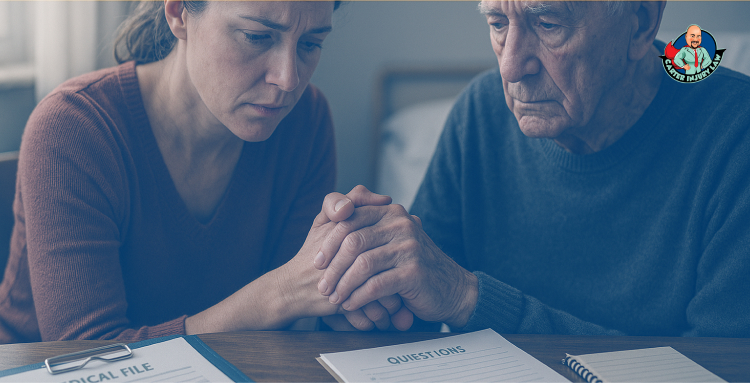
When someone you love is living in a nursing home, you are their biggest line of defense. You're not just visiting—you’re watching, listening, and protecting. And that vigilance can make all the difference.
Look Closer Than What They Show You
Don’t just sit by their bedside and chat for a few minutes—look. Really look. Check their arms, their legs, their back. Bedsores don’t always show up right away, and bruises can be hidden under clothing. If your loved one can’t tell you what’s going on, their body might.
Ask Questions, Even the Hard Ones
It might feel awkward, but ask. “Has anyone hurt you?” “Do you feel safe here?” “Has anyone touched you or taken anything from you?” If they can answer, give them the space and the comfort to do it. If they can’t, your job is to speak up on their behalf.
Talk to the Staff And Listen to What They Don’t Say
You don’t need to be confrontational, but pay attention to how the staff responds when you ask about care. Do they get defensive? Do they dodge your questions? You can learn a lot from how someone avoids eye contact or gives vague answers. If something feels off, it probably is.
Keep an Eye on the Money
This one catches a lot of people off guard. Review their accounts. Look for strange withdrawals or changes in who’s authorized to access funds. If your loved one suddenly has a new “friend” helping with paperwork or making financial decisions, that’s a red flag. Financial abuse can happen right under your nose if you’re not paying attention.
Trust Your Heart
At the end of the day, no one knows your parent, grandparent, or sibling like you do. If something feels wrong, you don’t need to wait for proof. You have every right to ask questions, demand answers, and, if needed, call a lawyer. That kind of intuition has helped families catch abuse early and stop it before it gets worse.
3) What to Expect If You File a Lawsuit
If you think you have a nursing home abuse case, it helps to know what’s ahead. This process can feel overwhelming, especially during an already emotional time, but we walk our clients through every step with care. Here’s how it usually goes:
The First Call Is Free And It Matters
We start with a consultation. No pressure, no cost, and no obligation. You tell us what happened, we ask some questions, and if it sounds like there’s something to look into, we dig deeper.
One of the first things we’ll do is request the nursing home’s insurance information. Florida law gives us the right to see what coverage they have that helps us figure out if this is a claim we can pursue and how to structure it.
Medical Records Tell the Story
Once we’ve confirmed there’s a potential case, we need to get our hands on the medical records. These records often show what the nursing home did or didn’t do and whether those choices led to harm.
If your loved one has passed, we may need to help you get an estate set up so we can access those records legally. That doesn’t mean you have to file a probate case or go through a big legal process. We can connect you with someone who handles that part. But getting that estate in place can help us move the claim forward with clarity. I’m sure this is already on your radar, but… Should You Accept an Insurance Company’s Offer to Pay Your Medical Bills After an Accident?
The Notice of Intent Starts the Clock
Before we can sue a nursing home in Florida, we’re required to send what’s called a Notice of Intent. It’s basically a formal letter saying, “We believe you caused harm, and we’re planning to file a lawsuit.”
Once that notice goes out, a 75-day countdown begins. During that time, both sides are allowed to request documents and conduct an informal investigation. Sometimes, they’ll ask for mediation. Sometimes, they ignore it altogether. Either way, this period gives us a window to gather facts and see if the case can be resolved without going straight to court.
Still wondering how this process works in real life? Attorney David Carter breaks it down in this short video—what happens when you call, what we look for, and how we begin building your case from day one.
4) When the Case Doesn’t Settle: What Happens Next
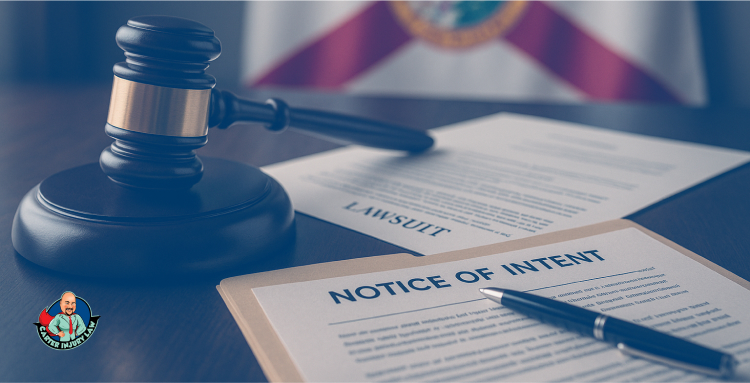
Sometimes, despite our best efforts during that pre-suit period, the case doesn’t settle. Maybe the nursing home denies responsibility, maybe they lowball the offer, whatever the reason, we don’t stop there.
When It’s Time to File
If we don’t get a fair resolution during the pre-suit window, we move forward and file the lawsuit. That officially kicks off the litigation process. We don’t do this lightly but if it’s what your loved one deserves, we’re going all in.
Discovery: Digging for the Truth
Once the case is filed, both sides begin what’s called discovery. This is where we start asking questions under oath, like taking depositions of staff members, reviewing internal records, and gathering evidence about what really happened behind those nursing home doors.
This phase helps us build your case piece by piece, showing not just that something bad happened, but why it happened and who’s responsible.
Trial Is the Last Stop but It’s on the Table
Most of the time, these cases don’t go all the way to trial. We hope they don’t. A fair settlement, something that provides closure and accountability, is always the goal. However, if the nursing home won’t step up and take responsibility, we’re ready to take it to court. We’ve done it before, and we’ll do it again if that’s what it takes.
You Don’t Pay Us Unless We Win And That’s a Promise
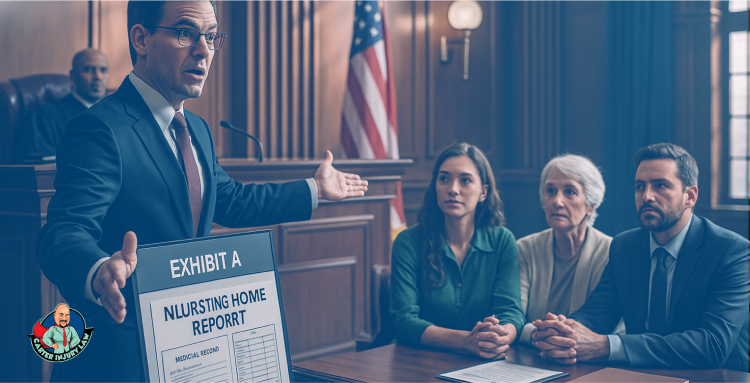
There’s no financial risk in calling us. We don’t charge for consultations. You don’t owe us a dime unless we take your case and win. We work on a contingency fee arrangement. That means you can get answers, guidance, and peace of mind without worrying about the bill.
Whether it’s the middle of the day or late at night, we’re here to listen. We’ll look over the records, ask the right questions, and help you figure out if you have a case. Even if it turns out you don’t, at least you’ll know. And if you do, you’ll have a team ready to fight like hell for your loved one.
Talking about what happened isn’t easy. For some families, the details are too painful to speak aloud. That’s okay. We’ve been through this with clients before, and we understand how to approach these conversations carefully. We ask the questions we need to build your case, but we never forget that behind every question is someone who’s been through hell.

Dog Bites in Florida: What You Need to Know About Your Rights
They say a dog is man’s best friend. But what happens when that trust—so freely given, so deeply felt—is broken by the snap of a jaw?
It’s easy to brush off a dog bite, especially if the dog “didn’t mean it” or belongs to a friend. However, Florida law doesn’t deal in feelings. It deals in facts, and the truth is, dog bites are more common and more costly than most of us like to admit.
So what do you do when loyalty turns to liability? Let’s talk about the laws, the numbers, and the rights you may not know you have.
1) How Common Are Dog Bites and Why You Should Care
Dog bite claims come across my desk more often than you'd think. People are usually shocked—either that it happened to them or that it turned out to be more serious than they expected. But let’s talk about the actual numbers here because they paint a clearer picture than any story I could tell.
4.5 million dog bites happen in the U.S. every year.
Source - DogsBite
That’s not a typo. Millions. And that’s just what gets reported. A good chunk of these involve kids, neighbors, even the dog’s own family.
1 in 5 of those bites need medical attention.
Source - Centers for Disease Control and Prevention
Not just a little band-aid situation. We’re talking stitches, antibiotics, sometimes even surgery. The kind of injury that keeps you off work or sends your kid home from school with more than just a scrape.
The average hospital stay is approximately $18,200.
That’s a hefty bill. And it’s higher than what you'd see for a lot of other common injury-related hospital visits. Why? Because dog bites don’t just break the skin—they can tear through muscle, leave scars, or worse, lead to infections that require serious treatment.
There are 30 to 50 fatalities from dog bites every year in the U.S.
Source - National Library of Medicine
It’s not something we like to think about, especially because it’s often the most vulnerable—children and the elderly—who suffer the worst outcomes. And a lot of the time, it’s from dogs they know.
These numbers aren’t meant to scare you, but they should make you pause. Dog bites aren't rare, and they’re not always minor. When they happen, they deserve to be taken seriously.
2) Why Dog Bite Cases Aren’t Like Other Injury Claims
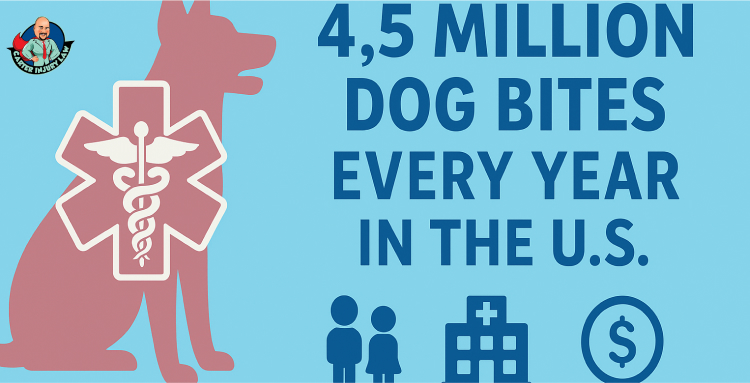
Not all injury cases are created equal. If you’ve ever been involved in a car accident or a slip-and-fall, you know how much time is spent proving who was at fault. But with dog bites? It’s a different ball game.
Florida follows a “strict liability” rule when it comes to dog bites.
What that means is if a dog bites you, the owner is usually responsible. Even if the dog has never bitten anyone before and even if the owner took precautions. We don’t have to prove that they were careless or that the dog had a history of aggression. That alone sets dog bite cases apart from most other personal injury claims.
Compare that to a car accident. There, you’ve got to dig into traffic laws, eyewitness accounts, maybe even camera footage. Same goes for a slip-and-fall—you need to show that the property owner knew about the danger and failed to fix it. That’s not the case with dog bites.
Florida law only covers actual bites.
That’s right. The dog has to bite you. If the dog jumped on you and knocked you down, even if you broke your wrist, it wouldn’t fall under Florida’s strict liability dog bite statute. That could still be a case, but now we’re talking about proving negligence again.
So yeah, dog bite cases are unique. They come with their own set of rules—rules that, if you understand them, can make your claim.
3) Who Gets Bitten Most
People often assume dog bites are random, but the numbers tell a different story. There’s a pattern and knowing who’s most at risk can help you stay one step ahead.
Let’s start with kids.
Children between the ages of 5 and 9 are the most likely to be bitten.
Source - National Institute of Health
And it’s not because they’re doing anything wrong. Kids are naturally curious and smaller in size, which unfortunately makes them more vulnerable in these situations. A bite that might be minor for an adult can be a serious injury for a child.
Another common misconception? Those dangerous dogs are always strangers.
77% of dog bites come from dogs the victim knows.
Source - Safer America
That includes family pets, neighbors’ dogs, even ones you’ve played with before. It’s not about breed or background—it’s about proximity and behavior that can change in a split second.
Also worth noting:
Males are more likely to be bitten than females.
Households with two or more dogs are five times more likely to experience a bite.
Source - National Institutes of Health
Dog bites don’t always come from the usual suspects, and they don’t always happen the way you think.
4) What Triggers a Dog to Bite?
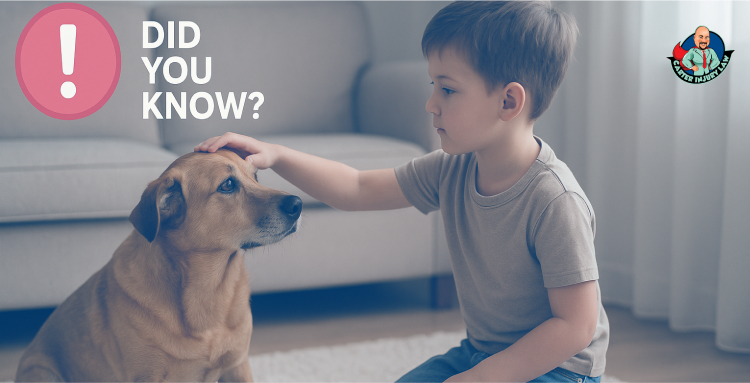
Most dog bite cases we see aren’t from vicious attacks in a dark alley. They’re from familiar settings—living rooms, backyards, playdates. The dog wasn’t “aggressive”… until it was.
One common thread? Roughhousing that escalates.
“Dogs are playing until they’re not.”
A tail wag turns into a warning growl, and before you know it, someone gets hurt. It happens quickly, and often no one sees it coming.
Children, especially those who’ve grown up around the dog, are another high-risk group. They tug tails, hug too tightly, or get too close while the dog’s eating—without realizing they’re pushing boundaries. These interactions aren’t always malicious. But in the eyes of a dog, it’s a provocation.
Territorial behavior is another major trigger.
A knock at the door, a stranger entering the yard, or even someone approaching the owner can put a normally calm dog on high alert.
And then there are cases where someone tries to do the right thing, like breaking up a dogfight or stopping aggressive behavior, and gets bitten in the process. These are some of the most legally complex situations, especially if the bite wasn’t directly intended for the person injured.
5) Is It the Breed or Something Else? The Truth About “Dangerous” Dogs
Let’s clear something up: dog bites aren’t just a “big dog problem.” A lot of people assume it’s the Pit Bulls, Rottweilers, or German Shepherds they need to fear. However, walk into any ER and ask around; you’ll hear stories about Chihuahuas, Jack Russells, even Dachshunds doing serious damage.
Small dogs bite too: Chihuahuas, Jack Russells, Doxies.
These little guys might not always send you to the hospital, but they bite more often than people think. The difference is that smaller dogs are less likely to cause severe injuries, which means they fly under the radar when it comes to public perception.
On the flip side, larger breeds carry a reputation and sometimes that reputation influences the law. Breed-specific legislation (BSL), which bans or restricts certain dogs just because of how they look, sounds good on paper. However, the data tells a different story:
Laws targeting ‘dangerous’ breeds don’t reduce overall bite incidents.
Source - American Veterinary Medical Association
Why? Because it’s not about the breed. It’s about behavior, environment, and training. A well-socialized Pit Bull is far safer than a nervous, untrained small dog with a chip on its shoulder.
In the end, responsibility falls on the owner. Dogs need structure, discipline, and supervision—especially around kids or guests. The more educated and involved the owner is, the safer everyone around the dog will be.
6) When Dog Owners Aren’t Held Responsible (And When They Are)

When we talk about dog bite cases in Florida, most people assume it’s an automatic win for the victim, but that’s not always true. There are certain legal defenses a dog owner can raise that may limit or even eliminate their liability.
One of the most commonly used defenses is signage. If the dog owner had a visible sign that says something like “Bad Dog” on their property, they might be able to avoid liability, but only under very specific conditions.
Signage requirements for ‘dangerous dog’ defenses don’t apply if the victim is under 6 years old.
That’s a key point a lot of people miss. You could have all the warning signs in the world, but if a child under the age of six is bitten, those signs won’t protect you in court.
Another major defense we see is provocation. If the dog was provoked—pulled, hit, stepped on, or otherwise agitated—the owner can argue that the bite was a direct reaction to the victim’s behavior. This is especially relevant in cases involving children, where rough or unintentional provocation happens more often than you'd think.
7) Insurance Surprises in Dog Bite Cases
One of the first questions clients ask after a dog bite is, “Who’s going to pay for this?” The answer isn’t always simple and it often starts with insurance.
Dog bite claims make up a surprisingly large chunk of homeowner insurance payouts.
Dog bite claims account for over one-third of all homeowner liability claims in the U.S., totaling about $1 billion annually.
Source - Insurance Information Institute
That’s a huge number, and it tells us two things: these cases are more common than people realize, and the financial impact can be substantial. Depending on the severity of the injury and how much insurance is available, we’ve seen settlements as low as $8,000 and others that push into the $500,000+ range.
Now there’s a catch— not all homeowner policies in Florida cover dog bites. Some carriers exclude animal liability altogether, especially if the dog is considered a “high-risk” breed. That means even if the dog owner has insurance, it might not apply to the incident at all.
Many Florida homeowners’ policies exclude dog bite coverage, especially for breeds labeled as dangerous.
In those situations, we have to dig deeper. Is there a separate animal liability policy? An umbrella policy? Are there personal assets that could be pursued? These are the details that matter and they’re the ones we know how to find.
If you're wondering how we approach these cases, take a moment to watch this short video from Carter Injury Law. Where we break down how we investigate insurance coverage and fight to make sure our clients don’t end up stuck with the bill.
8) How to Keep Kids and Pets Safe
At the end of the day, prevention is always better than litigation. While we’re here to help after a bite happens, a lot of these situations are avoidable with a little foresight. Especially when it comes to children and pets.
Let’s start with the basics: teach your kids how to behave around dogs. This sounds simple, but you’d be surprised how often bites happen because a child got too close, pulled a tail, or interrupted a dog while it was eating or sleeping.
Education is the most effective way to reduce bite risk. Especially with kids under 10.
We always tell parents: no roughhousing. Dogs might tolerate it up to a point, but when that point is crossed, it’s too late. Even well-trained, gentle dogs have boundaries.
Another big one? Supervision. Never leave small kids alone with a dog. Yes, even if it’s the family dog you’ve had for years.
Most serious dog bites involving children occur when no adult is present.
Owners also have a role to play beyond just training. Spaying and neutering your dog can help lower aggressive behavior and reduce the risk of bites overall.
So if you're a parent, a pet owner, or both, the best thing you can do is stay proactive. Awareness, boundaries, and supervision go a long way in keeping everyone safe.
Bitten by a Dog? Carter Injury Law Walks You Through the Next Steps
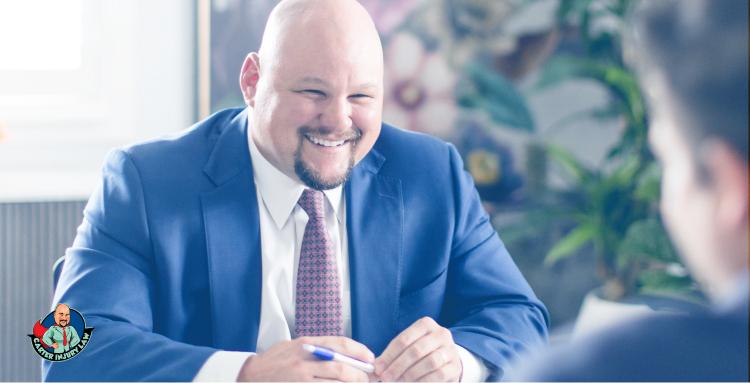
It’s easy to brush off a bite. Maybe it doesn’t seem so serious, or the dog was familiar. But here’s the thing: once a bite happens, the consequences can ripple in ways you might not immediately see.
Don’t wait until the situation escalates. Consult with an experienced attorney early on.
You might think, “It wasn’t that bad,” or “The dog was friendly.” But the truth is, legal options are still available. Florida law can be complicated when it comes to dog bites, and the way it’s handled can make all the difference, especially when it comes to medical bills or emotional trauma.
We offer free consultations. If you’re unsure, take the first step and reach out. We can guide you through the process, answer your questions, and let you know if you’re entitled to compensation.
The last thing you want is to miss an opportunity for justice simply because you didn’t ask the right questions.

Protecting Your Rights As a Cyclist - What to Do After an Accident
Even the most experienced cyclist can end up in trouble due to distracted drivers, rushed right turns, and narrow bike lanes that disappear just when you need them the most.
And in Florida, the stats don’t lie. Cycling accidents are more common and more serious than most riders think.
This isn’t meant to scare you. It’s meant to prepare you. Because once you understand the risks and your rights, you ride smarter. And if something goes wrong, you’ll know exactly what to do.
So let’s talk about it — the dangers, the steps to take, and the safety habits that just might save your life.
1) Florida's Streets Aren’t Built for Cyclists But You're Still Sharing Them
Let's be honest, Florida's roads were not designed with cyclists in mind. In cities such as Tampa, bike lanes frequently disappear without warning, intersections can feel like obstacle courses, and drivers may act as if they've never seen a bike before.
The infrastructure here leans heavily toward cars, leaving cyclists to deal with a variety of obstacles. Every ride requires increased awareness, from narrow lanes that cram you into traffic to intersections with limited visibility.
And the numbers back this up.
82% of bicyclist deaths occurred in urban areas.
Source — Insurance Institute for Highway Safety, 2022
This statistic underscores the risks cyclists face in urban settings like ours. It's a stark reminder that while we share the road, the playing field isn't level.
So, when you're out there, stay alert. Use bike lights, wear reflective gear, and always anticipate the unexpected. Your vigilance is your best defense on roads that weren't built with you in mind.
2) Most Accidents Involve Cars And They’re Often Avoidable

Let’s talk about the elephant in the room: cars. They're big, fast, and often oblivious to the presence of cyclists. In Florida, where urban sprawl meets congested traffic, this combination can be particularly hazardous.
Common scenarios? A driver makes an abrupt lane change without checking mirrors, or speeds through a turn without signaling. Sometimes, they simply don't see the cyclist until it's too late.
One of the most dangerous places for these interactions is at intersections.
27% of bicyclist deaths occur at intersections.
Source — Centers for Disease Control and Prevention, 2022
Intersections are complex environments where drivers are focused on other vehicles, traffic signals, and pedestrians. Cyclists can easily be overlooked, especially if they're not making their intentions clear.
So, what can you do?
Be Predictable: Ride in a straight line, signal your turns, and avoid sudden movements.
Stay Visible: Wear bright clothing during the day and reflective gear at night. Equip your bike with front and rear lights.
Make Eye Contact: Especially at intersections, ensure drivers see you before you proceed.
Avoid Blind Spots: Position yourself where drivers can see you, not tucked away beside large vehicles.
Remember, while you can't control the actions of drivers, you can take steps to make yourself more visible and predictable. These small actions can significantly reduce the risk of accidents.
3) Cyclist Mistakes That Lead to Serious Injuries
Let’s talk about the kind of mistakes that can turn a peaceful ride into a trip to the ER — or worse.
Riding Against Traffic
It might seem like riding against traffic gives you a better view of oncoming cars, but it's a dangerous misconception. Drivers aren't expecting cyclists to come from the opposite direction, which can lead to sudden and severe collisions.
Ignoring Stop Signs and Traffic Lights
Blowing through stop signs or red lights might save you a few seconds, but it's not worth the risk. Intersections are hotspots for accidents, and obeying traffic signals is crucial for your safety.
Wearing Headphones While Riding
Listening to music or podcasts can be enjoyable, but it significantly reduces your awareness. You need to hear the world around you — horns, sirens, or a car approaching from behind. Stay alert; your ears are as important as your eyes on the road.
Cycling Under the Influence
Alcohol impairs your judgment, balance, and reaction time — all essential for safe cycling. It's not just illegal; it's deadly.
Among bicyclists ages 16 and older who were killed in 2022, 21% had blood alcohol concentrations (BACs) at or above 0.08%.”
Source — Insurance Institute for Highway Safety, 2022
Remember, you've got to ride like they don't see you — because sometimes, they don't. Stay sober, stay alert, and stay alive.
4) Nighttime Riding? You're Nearly Invisible Without Lights

Riding your bike at night isn't just a peaceful experience; it's a high-stakes game of visibility. As daylight fades, so does your presence on the road.
The hours between 6 p.m. and 9 p.m. are particularly perilous.
21% of bicyclist deaths in 2022 occurred between 6 p.m. and 9 p.m.
Source— Insurance Institute for Highway Safety
This statistic underscores the importance of being seen.
So, how do you make yourself visible?
Front Light: A white light on the front of your bike ensures that oncoming traffic sees you.
Rear Light: A red light at the back alerts drivers approaching from behind.
Reflective Gear: Reflective tape on your pedals and clothing catches headlights, making you more noticeable.
Remember, visibility is about making yourself as conspicuous as possible. Wear bright clothing, use reflective accessories, and always assume that drivers can't see you.
5) The One Thing You Should Never Skip: A Helmet
Let’s talk about something that might not seem like a big deal until it is.
You wouldn't drive without a seatbelt, right? So why ride without a helmet?
It's not just about obeying the law; it's about protecting your most valuable asset—your brain.
Only 17% of fatally injured bicyclists were wearing helmets at the time of their crash.”
Source — Department of Transportation
That statistic isn't just a number; it's a wake-up call.
Think about it, a helmet can be the difference between a minor injury and a life-altering trauma. Even on short rides, accidents can happen in the blink of an eye.
So, before you hop on your bike, make sure your helmet is snug and secure. It's a simple step that can save your life.
Want to hear this straight from the source? Watch this quick video from Attorney David Carter
6) Accidents Still Happen; Here’s What to Do Right After
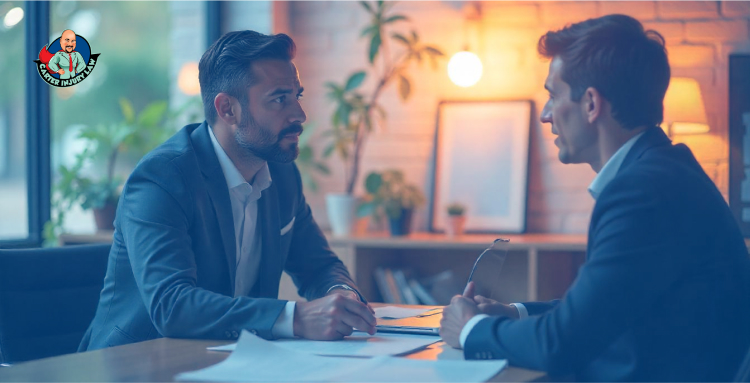
Even the most cautious cyclist can find themselves in an unexpected situation. When that happens, knowing the right steps to take can make all the difference.
Prioritize Safety
First and foremost, ensure you're out of harm's way. If you're able, move to a safe location away from traffic. Then, call 911 to report the incident and request medical assistance, even if injuries seem minor.
Document the Scene
Use your phone to take photos of the accident scene, your bicycle, any vehicles involved, and any visible injuries. Gather contact information from witnesses and note the time, location, and circumstances of the accident.
Mind Your Words
It's natural to feel shaken, but avoid making statements that could be interpreted as admitting fault. Stick to the facts when speaking with others at the scene and with law enforcement.
Only approximately 10% of all bicycle crashes are reported to the police.
Source— Accident Analysis & Prevention Journal
This statistic highlights the importance of reporting accidents, no matter how minor they may seem. What feels like a small incident now could have implications for your health and legal rights later.
Additional Relevant Blogs You May Find Useful:
Why Local Tampa Attorney is Vital for Winning Your Personal Injury Case
How Long Will Your Personal Injury Case Take? Carter Injury Law Reveals the Truth
When You Should Call an Attorney (and What We’ll Do for You)
Even the most seasoned cyclists can find themselves in unexpected situations. If you're involved in an accident, especially one involving injuries, vehicles, or insurance disputes, it's crucial to know when to seek legal assistance.
Accidents can be complex, and determining fault isn't always straightforward. If you've sustained injuries, if a vehicle was involved, or if you're facing resistance from insurance companies, it's time to consult an attorney. Legal professionals can help navigate the intricacies of your case, ensuring your rights are protected.
Adults between the ages of 55 to 59 have the highest death rates in bicycle accidents.”
Source — National Safety Council
This statistic underscores that experience doesn't make one invincible. Even seasoned riders are vulnerable, and legal support can be invaluable in the aftermath of an accident.
Our firm offers a free consultation to discuss your case. We operate on a contingency fee basis—meaning you don't pay unless we win your case. Our team will help you navigate insurance claims, manage medical bills, recover lost wages, and address other challenges that may arise.
Ride Smart, Stay Safe, Know Your Rights
Here’s the truth —we’d rather you never rely on our services. If every cyclist made it home safely, if every driver paid attention, if every street was built with bikes in mind — we wouldn’t have to have this conversation. But until that day comes, we ride with a little more caution, a little more awareness, and the knowledge that even doing everything right doesn’t guarantee a smooth ride.
And if something does go wrong — if you’re shaken, if you’re hurt, if someone tries to pin blame where it doesn’t belong —don’t go it alone.
We’re not here to judge. We’re not here to pressure you. We're here to help. To listen. To guide you through the mess and make sure you're not left carrying the weight of someone else’s mistake.

How Do I Select a Professional Personal Injury Law Firm in Tampa, FL?
No one plans for pain. We plan for birthdays, vacations, and even retirement, but not for the moment a car runs a red light or a distracted driver glances away for a second too long. In that instant, time slows. Sounds distort. And nothing—nothing—feels the same again.
Tampa is full of law firms with glossy ads and bold claims. However, when it’s your life, your health, and your future on the line, you’re not looking for a billboard. You’re looking for someone who sees the human behind the case file. Someone who will stand beside you when the system feels too big to face alone.
So, let’s talk about how to find the kind of law firm that won’t just represent you but will fight for you like it’s personal.
1) You Need a Fighter, Not Just a Friendly Face
In personal injury law, being “qualified” isn’t just about passing the bar exam or hanging a diploma on the wall. It’s about having the right kind of experience — the kind that holds up in a courtroom when negotiations fall apart.
Most cases do settle out of court, yes. But what happens when the insurance company refuses to play fair? That’s when you need more than a polished phone voice — you need a litigator. A firm that knows how to stand up in front of a jury and argue your truth with clarity, strategy, and strength.
Only about 4% to 5% of personal injury cases in the U.S. actually go to trial.
(Source: U.S. Department of Justice, Bureau of Justice Statistics)
But when they do, your attorney’s courtroom ability can be the difference between full compensation and walking away with less than you deserve.
Carter Injury Law prepares for everything. That means understanding the nuances of Florida tort law, staying in step with ever-evolving state regulations, and knowing when it’s time to shift gears from negotiation to litigation.
Our team is focused exclusively on personal injury — not distracted by other practice areas. We know how to build a case from the ground up and how to pursue it when it matters most: under the scrutiny of a judge or jury.
2) Tampa Roads, Tampa Courts, Tampa Strategy
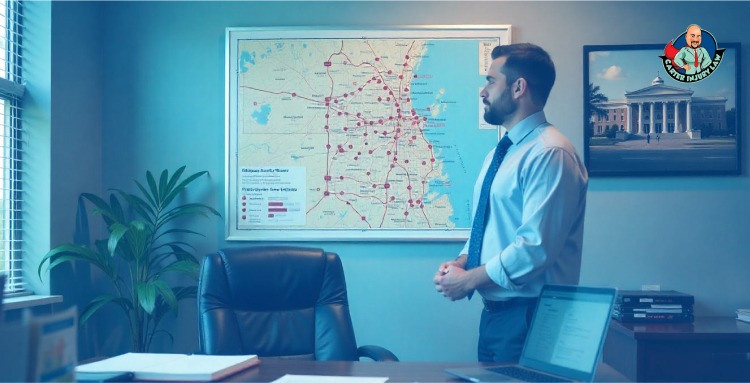
The law may be written in books, but it’s practiced in courtrooms and every courtroom has its own rhythm, personalities, and unwritten rules. That’s why choosing a personal injury law firm with boots-on-the-ground experience in Tampa is a strategic choice.
From understanding how local judges interpret procedural motions to recognizing how specific insurers handle claims in Hillsborough County, local knowledge can shape the outcome of your case before you ever step into mediation or court.
In 2022, Hillsborough County reported 28,020 traffic crashes, including 212 fatalities.
(Source: Florida Highway Safety and Motor Vehicles - Crash Dashboard)
Behind each statistic is a story, and navigating those stories through the local system takes more than just legal training. It takes familiarity with this community.
Carter Injury Law doesn’t just serve Tampa — we live it. We know the stretch of I-275 that sees too many rear-end collisions. We understand which medical providers companies like to question, and we’ve built working relationships within the Hillsborough County legal system that help us move cases forward without unnecessary delays.
When you're up against large insurance companies with deep resources, every bit of local insight becomes an edge. We use that edge to protect our clients, maximize their compensation, and guide them through the legal process with confidence.
3) The Human Side of Representation: Will They Actually Listen to You?
After an accident, it’s not just your body that’s bruised—it’s your sense of stability and, sometimes, your trust in the system. In those moments, legal representation becomes more than paperwork and payouts. It’s about being heard.
Sadly, some law firms treat clients like numbers. You sign a form, maybe shake a hand, and then—you never see the attorney again. Your case is passed off to a paralegal or a junior associate who juggles dozens of files, and your calls start going unanswered.
That’s not just bad business—it’s deeply impersonal at a time when empathy is everything.
62% of legal clients say poor communication is their number one complaint.
(Source: Clio Legal Trends Report, 2023)
That means more people are frustrated by silence than by courtroom losses.
And we get it. You don’t just want someone who knows the law. You want someone who sees you.
Attorney David Carter and Rob Johnson personally handle every case. From your first call to the final decision, they stay in the loop and keep you in the loop too. Because we believe being a great lawyer isn’t just about legal wins; it’s about showing up for people when they need it most.
So if you're looking for more than a firm that treats you like a case file—if you want someone who actually listens to your story—you’ll find that here.
4) You Heal, We Handle the Rest — No Upfront Fees, Ever
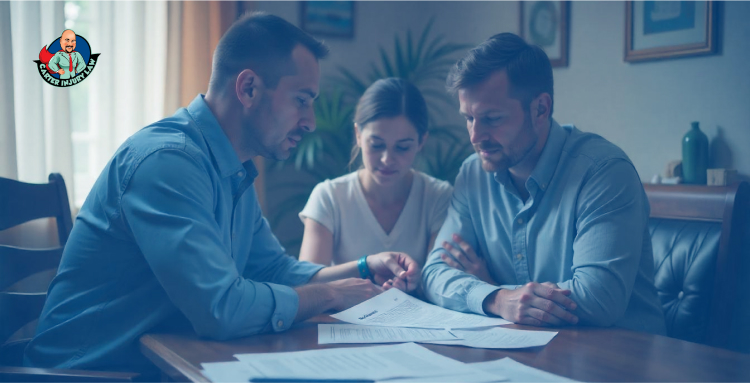
One of the first worries people have after an accident isn’t just about injuries — it’s about money. How do you pay medical bills, keep up with rent, take care of your family, and still afford a lawyer?
The answer is, you don’t have to.
We work on a contingency fee basis. That means you don’t pay us a dime unless we win your case. No retainers, no hourly billing, and definitely no surprise charges down the line. Our payment comes out of your settlement, not your pocket.
About 59% of Americans wouldn’t be able to cover an unexpected $1,000 expense.
(Source: Bankrate Survey)
When you’re injured, the financial pressure is real, and legal representation shouldn’t make it worse.
We know how quickly expenses pile up after an accident. Hospital visits, missed work, childcare, car repairs — it adds up fast. That’s why we’ve built our practice around reducing your risk, not adding to it.
When we say, “You focus on healing, we’ll take care of the rest,” we mean it and we mean all of it. From the first consultation to the final resolution, your financial security stays protected.
5) The Wrong Choice Can Cost You Financially and Emotionally
Choosing a personal injury law firm isn’t just another item on your post-accident checklist. It’s a decision that can change the course of your recovery and your finances.
When you choose the wrong firm, the consequences are very costly.
Studies show that injured individuals who hire experienced attorneys can recover up to 3.5 times more compensation than those who go it alone or settle with inexperienced counsel.
(Source: Insurance Research Council)
However, beyond the dollar signs, there’s the emotional toll:
Settlements that don’t cover long-term medical care
Legal missteps that delay your case or get it thrown out
Feeling dismissed, confused, or completely in the dark
When a lawyer doesn't understand what you're going through or, worse, doesn't care—it deepens the trauma.
We know what’s on the line for you—your health, your livelihood, and your future. That’s why we pursue justice that lasts. We uncover every detail, calculate the full impact of your injuries, and make sure no penny gets left on the table.
6) The Call That Could Rewrite Your Story
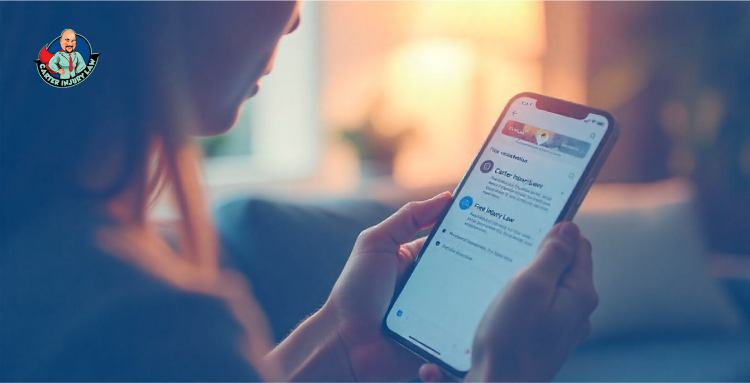
Asking for help after an injury is one of the strongest, most courageous decisions you can make. Especially when everything feels out of your control: your health, your income, and your future. But there’s one thing you still get to decide — what you do next.
Reaching out to an experienced personal injury lawyer isn’t just about compensation. It’s about reclaiming control over your future.
More than 50% of injured individuals delay seeking legal help out of fear or uncertainty.
(Source: American Bar Association, Client Intake Study)
However, the longer you wait, the harder it becomes to preserve evidence, build a strong case, and protect your rights.
We’re here to break down those fears. Our free consultation is pressure-free, judgment-free, and always focused on you. Whether you’d rather text, call, or stop by our Tampa office —we’ll meet you where you are.
Behind every claim is a real person. And we don’t take that lightly. When we say we’ll fight for your recovery like it’s our own, it’s not just a promise. It’s how we practice law — with heart, grit, and relentless focus on getting you the justice you deserve.

Understanding Product Liability What Consumers Need to Know About Dangerous Products
We live in a world where everything is packaged, promoted, and pushed to us as if it were essential—convenient, safe, and tested. However, every so often, something slips through. A product that was supposed to make life easier does the opposite. It hurts. It malfunctions. It breaks, not just physically, but trust too.
No one buys a toaster expecting it to explode or a toy expecting it to be dangerous. But here we are, surrounded by shiny things, not always knowing which ones might turn against us.
The question isn't whether accidents happen. They do. The real question is, when they do, who takes responsibility?
1) What is Product Liability?
Product liability is the legal concept that holds companies accountable when they sell something that’s dangerous or defective and it ends up hurting someone. We’re not talking about freak accidents or user error—we’re talking about a product that never should’ve made it to the shelf in the first place or one that wasn’t built with safety in mind.
If a product malfunctions and causes injury, someone has to take responsibility. And that someone is usually the company that made it, designed it, or sold it.
Companies Have a Duty to Put Safety First
If you’re going to put a product out there for the public to use, then you need to make sure it’s safe. That’s not just good business—it’s the law.
We’re not expecting perfection, but we are expecting due diligence. That means proper design, thorough testing, clear instructions, and warnings where they’re needed. If a company skips any of those steps and someone gets hurt because of it, that’s where product liability comes in.
The Law Steps in When Companies Don’t
At the end of the day, product liability laws exist to protect the public. They’re there to say, “Hey, if you’re putting something out into the world that people are trusting with their bodies, their homes, or their kids, you better do it right.”
These laws don’t just help the injured get compensation—they’re also a powerful way to make sure manufacturers, designers, and sellers take their jobs seriously.
More for you: How to Secure Personal Injury Compensation in Florida Expert Tips from Carter Injury Law
2) Why Product Liability Laws Are Important
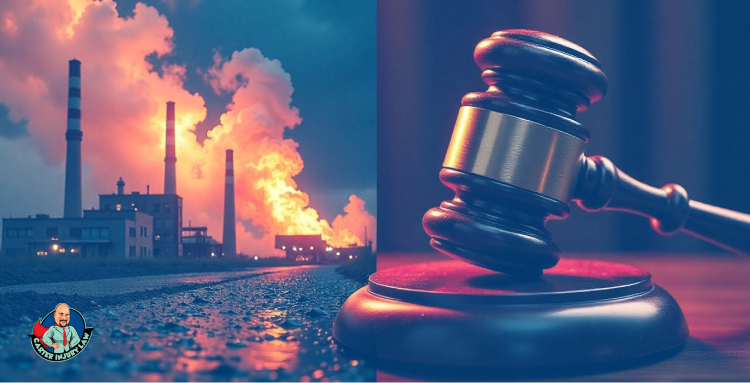
Product liability laws are about prevention. When companies know they can be held accountable for putting out dangerous products, they’re a lot more likely to slow down, double-check, and do things right the first time. That kind of pressure keeps harmful or defective items off the shelves before anyone gets hurt.
They Force Companies to Step Up
Without consequences, some companies cut corners. These laws make sure they don’t. When there’s a real risk of being sued for negligence, manufacturers and sellers take their responsibilities a whole lot more seriously. It’s not just about avoiding court—it’s about doing right by the people who trust them.
They Shine a Light on Where Products Really Come From
In today’s world, a lot of stuff is made overseas. And sometimes, the safety standards in those places aren’t up to par. Product liability laws put pressure on U.S. companies to know exactly what they’re importing and who they’re buying from. That added layer of accountability encourages transparency because they know if something goes wrong, they can’t just blame a factory overseas.
They Protect People from Corporate Carelessness
Big companies have teams of lawyers, insurance policies, and mountains of money. The average person doesn’t. Product liability laws give regular people a fighting chance when they’ve been hurt by something that should’ve been safe. These laws exist to say, “Your injury matters. And someone’s going to answer for it.”
They Even the Odds
Most of the time, you’re not just going up against a brand name. You’re going up against a corporation that’s bigger, richer, and has more resources than you’ll ever have. Product liability laws balance that power. They give individuals a real shot at justice, even when the odds feel stacked against them.
3) The Three Main Types of Product Liability Claims
When someone gets hurt by a product, the law breaks it down into three main types of claims. Each one gets to the root of why that product was dangerous. Let’s walk through them.
Manufacturing Defects – Something Went Wrong on the Line
This one’s all about mistakes during production. The design might’ve been solid, the instructions might be clear—but something went sideways while the product was being made.
Think of it like when you buy a car, and the brake pads are defective on just your vehicle. Or you open a box of cereal and find shards of plastic in it. That’s a manufacturing defect—something went wrong that shouldn’t have and now the product is dangerous because of it.
These are one-offs, but they’re serious. Just because it’s rare doesn’t make it any less harmful.
Design Defects – It Was Built Wrong from the Start
Unlike manufacturing defects, design defects affect every single product that comes off the line. The issue is baked into the blueprint. It’s not that something broke during production—it’s that the product was never safe to begin with.
For examples, A space heater that catches fire after 10 minutes of use. A children’s toy with small parts that pop off way too easily and become choking hazards. A lawnmower that doesn’t shut off when you release the handle.
In these cases, it’s not about a fluke. It’s about a flawed design that never should’ve passed inspection.
Marketing Defects – When Warnings Are Missing or Misleading
Even if a product is made correctly and designed well, it can still be dangerous if people aren’t properly warned about the risks. That’s where marketing defects come in—this is about failure to warn or poor instructions.
Suppose a medication label that doesn’t list a serious side effect, a power tool with no mention of the safety gear needed to operate it, or a cleaning product with no warning that it’s toxic if inhaled.
If the average person wouldn’t know about the danger—and the manufacturer didn’t make that danger crystal clear—that’s a marketing defect. And when someone gets hurt, it’s on the company for keeping them in the dark.
4) The Power of Strict Liability

Strict liability is a legal concept that really matters in product liability cases—and it’s one of the most powerful tools a victim has. Let’s break it down.
You Don’t Have to Prove Negligence
This isn’t like a car accident where you have to show someone was texting or speeding. With strict liability, the question isn’t how careful the company was. It’s about, “Was the product defective, and did it cause harm?”
If the answer to both is yes, then there’s a valid claim. You don’t need to prove the company was careless—you just need to show the product failed in a way that hurt you.
Defect + Injury = Case
The law says if a company puts a defective product out into the world and someone gets hurt, that’s enough to hold them accountable. The focus stays on the product, not the company’s intentions.
That’s important because it means victims aren’t stuck chasing down emails, warning signs, or employee screwups. If the product is unsafe and you’re injured, that’s the core of the case.
Everyone in the Chain Can Be Responsible
Strict liability doesn’t stop at the manufacturer. Distributors and sellers can also be held accountable—yes, even if they didn’t make the product.
That includes big-box stores, third-party sellers, and even international manufacturers. It doesn’t matter if the product came from overseas or was sold by a small shop—if it ended up in your hands and caused you harm, they can be brought into the case.
5) Florida’s Unique Laws on Product Liability
Every state has its own spin on the rules when it comes to product liability—and Florida? We’ve got a rule that can seriously impact your ability to recover compensation. It’s called comparative fault, and if you’ve been injured by a defective product, you need to know how it works.
As of March 25, 2023, Florida follows a modified comparative fault rule. What does that mean in plain English?
If a jury finds that you were more than 50% at fault for your own injuries, you can’t recover any money. Zero. Even if the product was defective. Even if someone else should’ve shared the blame. If you're over that 50% line, the court shuts the door on your case.
This isn’t just about car crashes or slipping on a wet floor. It applies to product liability cases too—like when a tool malfunctions, a household appliance catches fire, or a toy injures a child.
Want to hear it straight from the source? Watch the explanation of what product liability means and why strict liability matters.
Want to hear it straight from the source? Watch the explanation of what product liability means and why strict liability matters.
6) What to Do If You’re Injured by a Defective Product

When a product fails and someone gets hurt, it’s not just frustrating—it’s scary. Most people don’t plan for that kind of thing. So if it happens to you or someone you love, here’s what you need to do—step by step.
Step One: Get Medical Help—Right Away
Your health comes first. Before anything else, go see a doctor. Even if you think the injury isn’t “that bad,” let a medical professional take a look. Some injuries take time to show up, and a delay in treatment can hurt both your recovery and your legal case. So don’t wait. Get checked out.
Step Two: Don’t Toss the Product
It might be tempting to throw the thing away—especially if it scared you or hurt your kid. But don’t do it. That product is evidence. Whether it’s a broken appliance, a recalled food item, or a toy that malfunctioned—hang on to it. Put it somewhere safe, because we may need it later to prove what went wrong.
Step Three: Document Everything
Snap photos. Take videos. Save your receipts. If there’s a warning label or packaging, keep that too. Write down what happened while it’s still fresh in your mind—where you were, what you were doing, how the product failed, and how you were hurt. The more you can document now, the stronger your case will be down the line.
Step Four: Consult With a Lawyer
Once you’ve gotten medical care and preserved the product, it’s time to speak with a lawyer who understands product liability. Not every injury turns into a lawsuit, but you won’t know your options until you talk to someone who does this for a living. A good lawyer can walk you through your rights, explain the process, and help you make an informed decision about what to do next.
And remember—big companies have teams of lawyers ready to protect their bottom line. You deserve someone in your corner too.
Another insight to learn: What to Do After a Car Accident in Florida with Out of State Insurance
Carter Injury Law Doesn’t Back Down from Dangerous Products or Big Companies
Most of us don’t buy things expecting them to hurt us. We assume that what’s on the shelf—or online—is safe. However, when a company cuts corners, skips safety checks, or fails to warn people about dangers they knew were there; that’s not just a mistake. That’s negligence. And someone needs to hold them accountable.
We’re not afraid to take on big manufacturers, overseas suppliers, or corporate legal teams. If you’ve been injured by a defective product—whether it’s something you used at home, ate at the table, or gave to your child—we’re here to listen, investigate, and fight for you.
Give us a call. Let’s talk about what happened. And if there’s a case, we’ll walk you through every step—clearly, honestly, and with your best interest at the center of it all.

What Should You Do if You’re the Defendant in a Florida Car Accident Lawsuit?
We talk a lot about justice for the injured. About what to do when someone hits you, hurts you, leaves you with bills and questions. But what if you're the one who caused the damage? What if it really was your fault?
It’s uncomfortable, sure. Maybe even embarrassing. However, it’s also real, and it happens more often than people like to admit. The truth is, there’s a process for this too. And it starts with not hiding from it.
Let’s talk about what happens next.
1) Step One: Check Your Insurance Coverage
Alright, let’s start at square one — your insurance. Because once you're in a crash and it’s your fault, the first question becomes: What kind of protection did you actually buy?
Bodily Injury Coverage: This One’s Big
This is the coverage that steps in if you’ve hurt someone. And if you don’t have it? Your insurance company’s not going to help. They’re not paying out, they’re not hiring a lawyer, and they’re certainly not defending you in a lawsuit.
A lot of people skip this to save money — big mistake. You’ll wish you hadn’t.
Property Damage Coverage: Florida’s Bare Minimum
Every auto insurance policy in Florida includes at least $10,000 in property damage coverage. That’ll go toward fixing someone else’s car if you caused the crash. But just know — $10K doesn’t go far when vehicles are totaled.
Why the Insurance Company You Pick Matters
Not all insurance companies are created equal. There are the good ones that pick up the phone, assign an adjuster quickly, and start handling the claim like they’re supposed to.
And there are the “cut-rate” companies. The cheap ones. They don’t answer calls, they drag their feet, and when it’s time to protect you? They disappear. That’s not who you want on your side when someone’s threatening to sue.
2) Step Two: Report the Claim Right Away
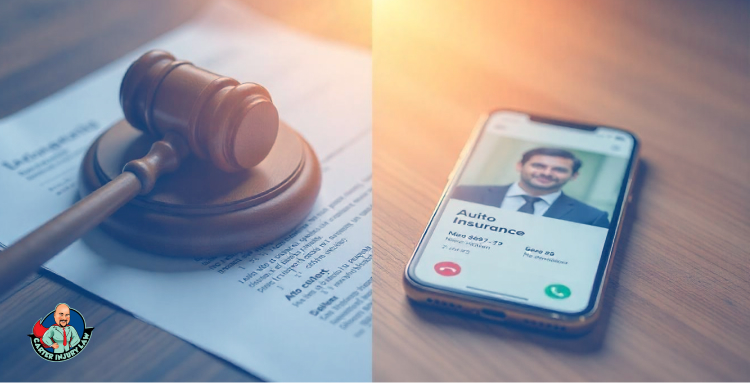
You’ve been in a wreck, and it was your fault. Now what? Simple — don’t wait around. Call your insurance company right away. The longer you wait, the worse this gets.
Why You Need to Call ASAP
There’s no trophy for “waiting it out.” Your insurance company can’t help you if they don’t know what happened. The faster you report the accident, the sooner they can open a claim and start protecting you.
Delaying just gives the other side a head start.
Your Obligation to Cooperate
This isn’t optional. When you bought your policy, you agreed to work with your insurance company if something goes wrong. That means answering their calls, giving a statement, and helping them evaluate the situation.
If you blow them off or go silent, they can walk away from your defense. Don’t give them that excuse.
Give Them the Full Picture
Send in everything you’ve got — photos from the scene, dashcam footage if you have it, any videos, witness info, even your own notes about what happened.
The more details they have upfront, the better they can protect you. Don’t assume they know anything. Make sure they do.
3) Step Three: Let Your Insurance Company Handle It
You’ve called it in, given them everything they need—now let them do their job. That’s what you’ve been paying them for.
They Take Over From Here
Once the claim is reported, your insurance company steps in. They’re the ones who should be talking to the other driver’s lawyer and insurance company—not you. That’s a battle you don’t want to fight alone.
So let your adjuster carry that weight. That’s the whole point of having coverage.
They’ll Deal With the Legal Side Too
If the other side sends a demand letter or if a lawsuit gets filed, your insurance company is supposed to respond. They’ll either try to settle or assign a defense attorney to represent you. And no—you don’t have to find that attorney yourself (at least not right away).
Why “Policy Limits” Are a Big Deal
Your insurance company only has to protect you up to the amount of coverage you actually bought. That’s called your policy limits.
If the other side wants more than that—say you’ve got $50K in coverage and they want $100K—you could personally be on the hook for the difference. That’s why it’s smart to make sure your insurance isn’t just cheap—it’s enough.
A must-read for you: Should You Take the First Offer from an Insurance Company?
4) Step Four: Protect Yourself from an Excess Judgment

Sometimes, doing everything right still isn’t enough. If the other side thinks your insurance coverage isn’t going to cut it, you’ve got to start thinking about protecting yourself—because nobody else will.
What If They Want More Than Your Policy Covers?
Let’s say you’ve got $50,000 in bodily injury coverage, and the other party’s attorney says, “That’s not enough. We want $100,000.” Now they’re looking at you to make up the difference. That’s called an excess judgment—and it’s exactly what you want to avoid.
Tell Your Insurer to Offer the Full Policy Limits—In Writing
If a demand comes in and it’s within your coverage limits, tell your insurance company—clearly and in writing—to offer the full amount. Not just part of it, not to play games—the full limit.
Say, “Protect me from any judgment beyond this coverage. I want you to offer the policy limits now.” Put that in an email, send a certified letter, and keep records. It shows you tried to resolve it the right way, and that matters if this thing ends up in court.
Sometimes, it’s easier to understand your options when someone explains it to you face to face. Watch it to get real answers from someone who handles these cases every day.
5) Step Five: If You Get Sued — Act Fast
So now it’s gotten real. You’ve been served. This is the part where you don’t want to wait around.
What Does It Mean to Be “Served”?
Being served means someone physically hands you legal papers—usually a complaint and a summons—saying you’re officially being sued. You’ll know it when it happens. And once it does, the clock starts ticking.
You’ve Got 20 Days to Respond
Florida law gives you 20 days to file a response once you’ve been served. That’s not a lot of time. You can’t afford to let that deadline slip by, because if you do, the other side can move for a default judgment—and now you’re in a worse spot.
Get the Lawsuit to Your Insurance Company — Fast
As soon as you're served, get those papers to your insurance adjuster. Don’t just call—email the documents, send them by certified mail, or do whatever you need to do to create a paper trail. Keep a copy for yourself too.
You’re not the one who has to respond to the lawsuit—your insurance company is. However, they can’t do that if you don’t get them the paperwork. It’s part of your duty to cooperate under the policy.
More for you: How to Handle Out-of-State Car Insurance Claims in Florida Accidents
6) What Happens Next: Insurance Lawyers and Court

Alright, so you’ve turned over the lawsuit to your insurance company. Now what? Let’s walk through what comes next once things start moving in the legal system.
Your Insurance Company Hires the Lawyer — Not You
As part of your policy, your insurance company is required to provide a defense. That means they’ll assign an attorney to your case, and they’re the ones who get to pick who that attorney is—not you.
You don’t get to shop around. You don’t get to say, “I want this guy I saw on TV.” They make that decision, and you’re expected to work with whoever they hire.
Watch Out for In-House Attorneys
Some insurance companies use what are called in-house attorneys—lawyers who work directly for them. And while that might sound convenient, you have to remember: their paycheck comes from the insurance company, not from you.
The Insurance Company Covers the Legal Costs
The good news is your insurance company is on the hook for the legal defense. They’ll pay for the lawyer, the court costs, the expert witnesses—everything involved in defending the claim.
You’re not writing checks every week to keep your defense alive. That’s what you’ve been paying those premiums for all these years.

Feeling Ghosted by Your Lawyer? Here’s What You Can Do About It (Even in the Middle of Your Case)
We rarely notice the exact moment when trust begins to slip. It’s quiet at first—a missed call here, a vague answer there. You tell yourself they’re busy, that there’s a plan, that everything’s under control. But something shifts. And then, before you know it, that gut feeling starts to whisper that “Something’s off.”
It’s not easy to question the very person meant to defend you. But when the silence gets louder than the support, it’s only natural to wonder—can I really switch lawyers? Is it too late, too complicated, or too risky?
Let’s talk about that. Because staying stuck with the wrong lawyer might cost you the entire case.
1) The Simple Answer: Yes, You Can Change Your Lawyer
If you’re asking yourself whether you can change your attorney, the answer is yes—you absolutely can, especially here in Florida. It doesn’t matter what stage your case is in. If you're not happy with your current lawyer, you have the right to find someone else who better fits your needs.
You’re not locked into the first attorney you hired. If something doesn’t feel right, you’re allowed to make a change—and you should if it means getting the support and representation you deserve.
A must-read for you: What Are Your Rights to Cancel an Attorney Contract in Florida
2) Common Reasons People Switch Attorneys
Now, if you’re thinking about changing lawyers, you’re not alone—and you're not being unreasonable. There are a few common reasons why people decide their current attorney just isn't the right fit anymore.
The most frequent one we see? Communication—or really, the lack of it. If your attorney isn't calling you back, keeping you in the loop, or making you feel like you’re chasing down your own case updates, that's a problem. You deserve better than radio silence.
Sometimes, it’s not about silence but about disagreement. You might not see eye-to-eye on how your case is being handled, what steps are being taken, or how aggressively your lawyer is pursuing your claim. If you’re not confident in the strategy, that’s worth paying attention to.
Then there are cases where things just feel off—maybe the professionalism isn’t there. Maybe deadlines are being missed or you’re not getting the respect and focus your case deserves.
And finally, there’s the simple reality that sometimes two people just don’t click. You and your attorney might not have the connection or trust needed to move forward. And that’s okay—it happens.
What matters is recognizing it and knowing you have the option to move on.
3) Things to Consider Before Making the Change
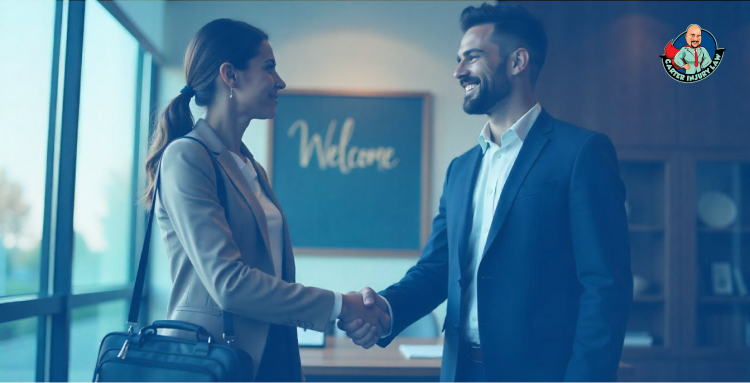
So yes—you can change your lawyer. But before you do, there are a few things you need to think through. It’s not always as simple as just walking away, especially if your case has already made some progress.
Is Your Case in Litigation?
If your case has already been filed in court and you're in the middle of litigation, changing lawyers is still possible—but it can come with a few more steps. There may be court procedures involved, and your new attorney will have to file certain documents to officially take over. It’s doable, but it’s something you and your new lawyer will want to plan for.
What Does Your Fee Agreement Say?
Most people sign a contingency fee agreement with their personal injury attorney. That means your lawyer only gets paid if you win or settle your case. But if you switch lawyers, the first attorney may still be entitled to a portion of that final settlement—even if they don’t finish the case.
Are They Owed for Their Time?
If the first lawyer has already spent time working on your case, they may be entitled to compensation for the hours they’ve already put in. That doesn’t necessarily mean you'll be double-billed—sometimes, depending on the amount, the fee may get split between your old and new attorneys based on the work done, but your new attorney does not have to agree to this. Still, it’s something you’ll want to understand before making the switch.
How Much Work Has Already Been Done?
This part matters. If your original attorney did very little—maybe they just opened the file and made a few calls—it’s likely a clean break. But if they’ve gathered evidence, negotiated with insurance companies, or even started drafting court documents, then the value of their work may need to be accounted for.
Before you make a decision, it’s always smart to consult with the new attorney first. For more clarity on the process of changing lawyers, here's attorney Rob Johnson explaining your rights..
4) Can You Get a Second Opinion? Absolutely.
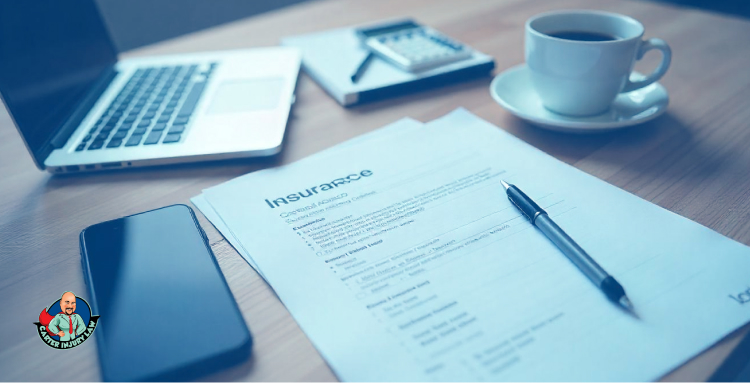
If something doesn’t feel right about your current representation, getting a second opinion is undoubtedly a smart move.
You Have the Right to Ask Another Attorney
Just like with any major decision—whether it’s about your health, your finances, or your legal case—you’re entitled to another perspective. There’s no rule that says you have to stick with the first lawyer you hired if you’re not sure they’re the right fit. A new attorney will not be able to go over the specific details of your case since they do not have the file, but they can answer general questions about the process.
You don't need to look elsewhere: Meet David Carter A Personal Approach to Injury Law
Yes, There Are Ethical Rules But They’re Clear
Now, there are professional guidelines that attorneys follow when a client wants to switch representation, but none of that stops you from talking to someone else. A good attorney knows how to handle the situation respectfully and ethically, without stepping on any toes or creating conflicts.
It’s Okay to Want Clarity
Sometimes, you just want to know if you’re on the right track. Maybe you’re not ready to switch attorneys—but you’re not ready to settle for silence or uncertainty either. A second opinion gives you a clearer picture of your options, and that can make all the difference.
Need a Second Opinion? Carter Injury Law Is Here
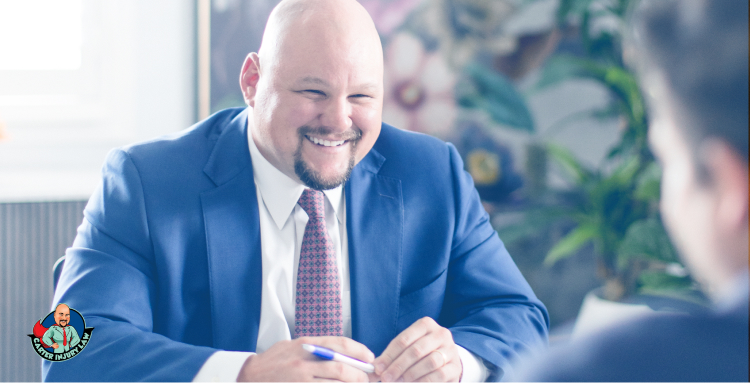
If you’re in a spot where you’re unsure about your current lawyer—or you’re just not feeling heard—it’s okay to reach out. Sometimes you just need to talk it through with someone who’s going to listen and give it to you straight. That’s what we’re here for.
My name is Attorney David Carter, and at Carter Injury Law, we’ve helped plenty of people who found themselves questioning their current legal representation. Whether you’re ready to make a change or you just want another set of eyes on your case, we’re more than happy to help.
You can reach us at 813-922-0228, or head over to our website at Carterinjurylaw.com. Just honest advice so you can make the best decision for your future.

How to Find the Right Motorcycle Accident Lawyer in Florida?
Some things you never see coming. One moment, the wind is in your face, the road is yours, and life feels beautifully uncomplicated. The next, brakes screech, metal bends, and everything that felt free now feels uncertain.
That’s the truth about riding. It’s thrilling and raw, but when something goes wrong, it’s rarely minor. And in Florida? Let’s just say the odds haven’t exactly been in riders' favor.
Florida reported over 590 motorcycle fatalities in 2022—ranking among the highest in the nation.
(Source: Florida Department of Highway Safety and Motor Vehicles)
And yet, even with numbers like that, motorcyclists often get blamed, overlooked, or flat-out ignored when filing a claim. That’s why finding the right lawyer becomes more than just a next step—it becomes the thing that sets the record straight.
So if you’re asking, “How do I even begin to find someone who truly understands what I’m going through?” you’re in the right place. Let’s talk about what matters and how Carter Injury Law is built for this exact road ahead.
I) The Road Isn’t Always Fair: Why Motorcyclists Face an Uphill Battle After an Accident
It’s no secret that motorcyclists often get an unfair reputation. Even when they’re following every rule of the road, they’re still seen as “risky” by insurance companies and sometimes even by law enforcement officers responding to the scene.
This bias can quietly shape the entire outcome of your case. Adjusters may question your decisions more harshly. Officers might file reports with assumptions instead of facts. And the person who caused the accident? They may walk away with far fewer questions than you do—even if you were the one seriously injured.
And then there’s Florida’s insurance system.
Florida’s No-Fault insurance laws don’t cover motorcyclists the way they cover drivers of cars. Personal Injury Protection (PIP)—the coverage that typically pays for initial medical bills and lost wages regardless of who was at fault—doesn’t apply to motorcycles. That means after a crash, you’re not guaranteed any upfront financial relief unless the other party’s insurance company steps in or you have strong legal representation to push the case forward.
This legal distinction leaves motorcyclists financially exposed, especially in accidents that result in serious injuries, which unfortunately are all too common.
Motorcyclists are 24 times more likely to die in a crash than passenger vehicle occupants.
(Source: National Highway Traffic Safety Administration )
So when the system is stacked this way—where bias meets legal limitations—the need for a lawyer who truly understands the dynamics of motorcycle accidents in Florida becomes non-negotiable. It’s not just about proving fault. It’s about shifting the narrative, protecting your rights, and making sure you’re not the one left carrying the financial burden of someone else’s mistake.
2) Signs You Need a Motorcycle Accident Lawyer Immediately
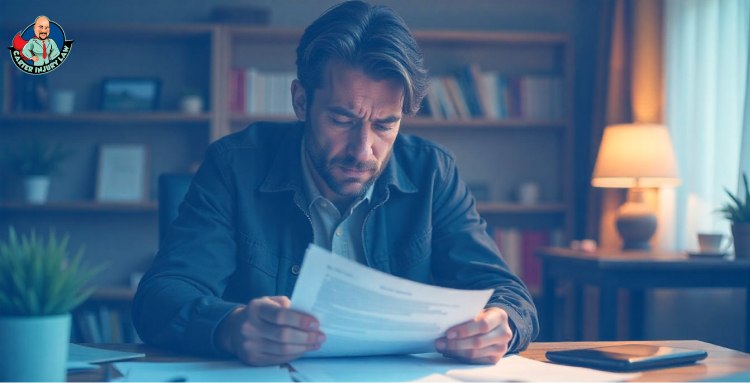
Not every crash ends with lights and sirens. Some seem manageable at first—just bruises, a busted bike, maybe a few days off work. However, the trouble often begins after the accident.
Warning Signs You Shouldn’t Ignore:
Here’s when to stop trying to “handle it” alone and start thinking about legal backup:
Your insurance claim is denied or delayed without a solid reason.
You’re being blamed for part or all of the accident, despite evidence.
The other driver’s liability is unclear or hotly contested.
You’re confused about your next steps and just want someone to fight for you.
The legal challenges after a motorcycle accident aren’t always about catastrophic injuries (though those happen far too often). They’re also about denied claims, vague liability, missing police reports, and insurance tactics designed to minimize payouts—especially when the rider isn’t represented.
And let’s not forget the financial stakes. Even a short hospital stay after a moderate crash can derail your finances completely:
The average hospital stay cost after a serious motorcycle crash may exceed $20,000.
(Source: Centers for Disease Control and Prevention)
That doesn’t include follow-ups, physical therapy, missed work, or replacing your bike.
If you’re dealing with injuries, mounting bills, or a claims process that’s suddenly full of loopholes, waiting could cost you more than just peace of mind. The sooner a lawyer steps in, the sooner you take control of your recovery not just physically, but legally and financially too.
3) What to Look for in the Right Lawyer (And Red Flags to Avoid)

Florida’s motorcycle laws are full of fine print, like the fact that riders over 21 can ride without a helmet, but only if they carry at least $10,000 in medical coverage. A good motorcycle accident attorney knows this. A great one uses it strategically when your case is being assessed.
And yes, there are red flags—things you should never ignore. If a lawyer can’t answer basic questions about similar cases they’ve handled, or they give you vague, noncommittal responses, take a step back. If they seem unfamiliar with Florida’s specific legal landscape, that’s another problem. The law here recently changed.
Florida’s new comparative fault law (as of March 2023) bars any financial recovery if the plaintiff is more than 50% at fault.
(Source: Florida House Bill 837)
That’s a critical piece of your case strategy, and your lawyer needs to be able to work within that framework confidently and clearly.
Then there’s the financial side. Any attorney worth your time will work on a contingency basis. That means you don’t pay unless you win. It’s that simple. If a lawyer wants you to pay hefty fees up front just to “look over the details,” that’s not advocacy—that’s a warning sign.
However, beyond the paperwork and payment plans, there’s something even more telling: how they talk to you. Do they explain things clearly? Do they call you back? Keep you informed? The best legal relationships are built on trust, and trust starts with communication. You should feel heard, not handled.
4) The Clock Is Ticking: Time Limits for Filing Motorcycle Accident Claims in Florida
Time doesn’t just heal; it also runs out. After a motorcycle accident in Florida, most people think they have time to figure things out. And while it’s completely normal to feel overwhelmed, confused, or even stuck in a cycle of “What just happened?” the legal system won’t wait.
As of March 2023,
Florida’s statute of limitations for personal injury claims, including motorcycle accidents, was reduced from 4 years to 2 years.
(Source: Florida House Bill 837)
Missing this deadline means you lose your right to seek compensation no matter how strong your case is. Courts don’t make exceptions for delays, even if you were still in recovery or waiting on an insurance company to “do the right thing.”
However, the ticking clock isn’t just about the statute of limitations. Insurance companies often have strict notification windows—sometimes as little as 14 days—for reporting accidents or injuries. Miss those deadlines, and they’ll use it as leverage to deny or devalue your claim.
5) When the Road Gets Rough: How Carter Injury Law Fights for Every Rider's Right
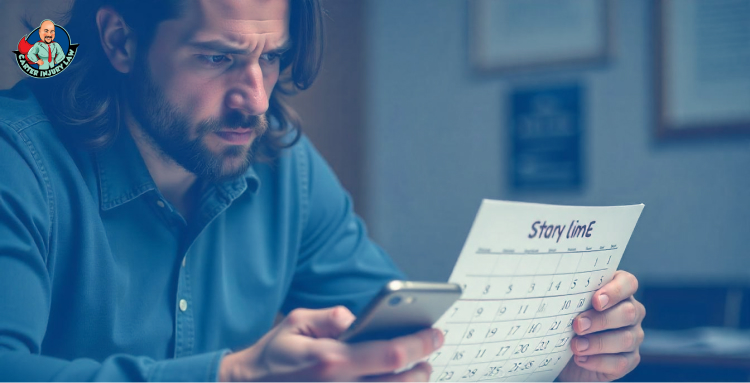
When the dust settles after a motorcycle crash, one thing becomes painfully clear that you need someone in your corner who actually gets what you’re up against.
Florida Roads, Florida Roots
This isn’t some out-of-state firm with billboards across the highway and zero face time. Carter Injury Law is proudly based in Florida. That means we know the roads, we know the laws, and we know the unique challenges riders face here—from helmet law nuances to how Florida’s No-Fault system excludes motorcyclists from PIP coverage. We’ve seen it all. And we’ve fought through it.
Not Just Another Case—A Whole Different Kind of Fight
Motorcycle cases aren’t just “car accidents with fewer wheels.” They require a different kind of legal strategy—one that anticipates bias, rebuilds missing narratives, and holds insurance companies accountable when they try to twist the facts. Carter Injury Law has that strategy down to a science.
Told You It Wasn’t Over
Our track record speaks for itself. We’ve helped countless injured riders recover the compensation they were told they’d never get. Not because the system is fair but because we know how to challenge it. We go toe-to-toe with insurance companies, cut through red tape, and build cases that can’t be ignored.
We’re With You—Every Mile, Every Moment
What really sets us apart isn’t just how hard we fight—it’s how deeply we care. We take every call. We explain every step. We show up. Because at the end of the day, this is your life, your recovery, and your story—we’re just here to make sure it doesn’t get rewritten by someone else.
We work on a contingency fee basis, which means you don’t pay unless we win. And the moment you reach out, we’re already on your team.
So if you're feeling overwhelmed, uncertain, or just ready to take the next step—call us.
Every rider has a story. Let’s make sure yours is heard and honored.

What Are Your Legal Options After a Bicycle or Pedestrian Accident in Florida?
You don’t notice how fragile a moment is until it shatters.
One second, you’re crossing the street under a warm Tampa sky. Maybe you're pedaling your bike on your usual route, thinking about dinner, a phone call, or a playlist. And then—screeching tires, the blur of a car, pain where there wasn’t any.
It’s strange how something as simple as walking or biking—things we’ve done since childhood—can turn dangerous in an instant. We share the roads with people we don’t know, trusting they’re alert, focused, and responsible. But not everyone is.
And that’s where this conversation begins—not in fear, but in awareness. Because if you walk or ride a bike in Tampa or anywhere nearby, you deserve to know what to do if the road turns against you.
1) The Risks: Why Biking and Walking Are Becoming More Hazardous
If you’re out there walking or riding your bike, it’s not as safe as it used to be. The roads have changed, the traffic’s heavier, and the system just hasn’t kept up.
A big part of the problem is Infrastructure. You’ve got areas in Tampa where sidewalks just stop out of nowhere. Bike lanes are either too narrow or shared with speeding traffic. Some intersections don’t have proper signals or crossings, which means pedestrians and cyclists are left to figure things out on their own. That kind of setup creates confusion and confusion on the road leads to accidents.
Then there’s driver behavior. More people are distracted behind the wheel—texting, rushing, not paying attention. And you’ve got those aggressive drivers who treat the road like a racetrack. The mix of inattention and recklessness is a real threat, especially to someone on foot or riding a bike with zero protection around them.
And let’s not forget when a vehicle hits a pedestrian or bicyclist, the injuries are almost always serious. There's no metal frame or airbags to cushion the blow. It’s your body versus a car. The outcome can be devastating like broken bones, head trauma, life-changing injuries. These aren’t minor fender-benders. They’re real, painful situations that can change everything in a heartbeat.
That’s why knowing your risks and your rights is so important.
2) The Role of Uninsured Motorist Coverage
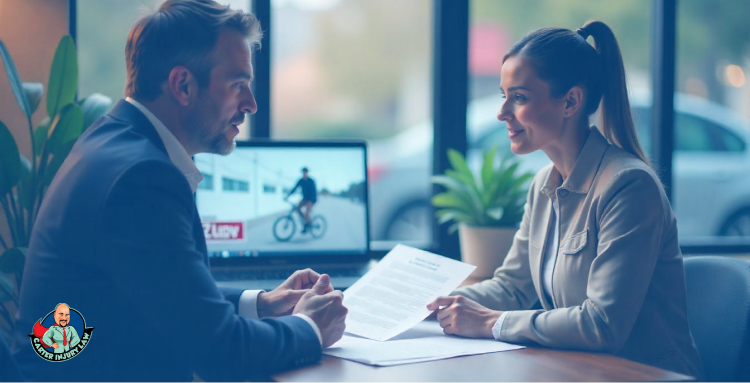
Here’s something a lot of people don’t realize that your car insurance can actually protect you even when you’re not in your car. If you’ve got uninsured or underinsured motorist coverage—what we call UM or UIM coverage—it could be one of the smartest things you have on your policy.
Why is that important? Because not every driver out there has insurance. And some of them have the bare minimum, which doesn’t go very far if you’ve been seriously injured. Now imagine you're hit while walking or biking. You’re vulnerable, you're hurt and the person who hit you either doesn’t have insurance or not enough to cover your medical bills, lost wages, or long-term care.
If you've got it, and especially if you've got it stacked across multiple vehicles, you’re giving yourself a bigger safety net. Stacking just means you’re combining the coverage limits from more than one vehicle on your policy.
So, for example, if you’ve got two cars and $50,000 of UM on each, stacking gives you up to $100,000 in potential coverage. That extra coverage can make a huge difference if you're facing a long recovery after an accident.
And yes, it can cover you even if you were walking across the street or riding your bike when the accident happened. You weren’t in your car but the policy still follows you. It’s one of those details that can really catch people off guard in a good way.
More for you: How to File a Claim After Being Hit by an Uninsured Driver In Florida
3) What to Do Immediately After an Accident
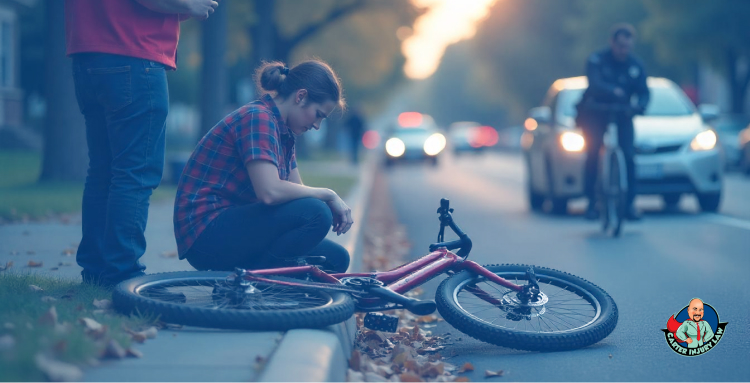
When you’ve been hit—whether you were walking or biking—everything feels like a blur. However, what you do in those first few moments can make a huge difference later on, especially if you’re thinking about filing a claim.
First and foremost, get medical attention. That’s not just about covering your injuries—it’s about protecting your health long-term. A lot of people try to shake it off, say “I’m fine,” and skip the hospital. However, the truth is, some injuries take hours or even days to show up. Getting checked out right away can catch things early, and it also creates a clear medical record tied to the accident.
Next, document everything. If you’re physically able or if someone with you can help, start taking photos and videos right there at the scene. Get pictures of where it happened, the position of the vehicle, the bike or pedestrian path, any damage to your bike or personal items, and, of course, your injuries. Video is great too, especially if traffic conditions or weather played a role.
Why does all this matter? Because that evidence becomes the foundation of your case. Memory fades, witnesses disappear, and the scene changes. But photos and videos stay solid. They tell your story clearly—what happened, how it happened, and how serious it really was.
Sometimes, it’s easier to hear the details straight from an expert. In this video, Rob Johnson breaks down the key steps you should take if you’ve been involved in a bicycle or pedestrian accident in Florida.
4) Filing a Claim as a Pedestrian or Bicyclist
A lot of people think that if they weren’t in a car at the time of the accident, they can’t file a claim. That’s just not true.
If you were hit by a vehicle while walking or biking, you absolutely have the right to file an injury claim. Whether the driver was distracted, speeding, or just flat-out careless, you were the one who ended up injured, and the law gives you the right to seek compensation for that.
Now, timing matters. Florida has specific deadlines for when you can file a personal injury claim. Waiting too long could mean losing your chance altogether. That’s why it’s so important to talk to a lawyer early—so you understand what your options are before time runs out.
When it comes to what you can recover, it’s not just about your medical bills. A claim can cover a lot more than people realize. That might include lost income if you’ve been out of work, future medical expenses, pain and suffering, and in some cases, long-term care or rehabilitation costs.
You may want to know: How Long Will Your Personal Injury Case Take? Carter Injury Law Reveals the Truth
5) Understanding PIP (Personal Injury Protection) Benefits
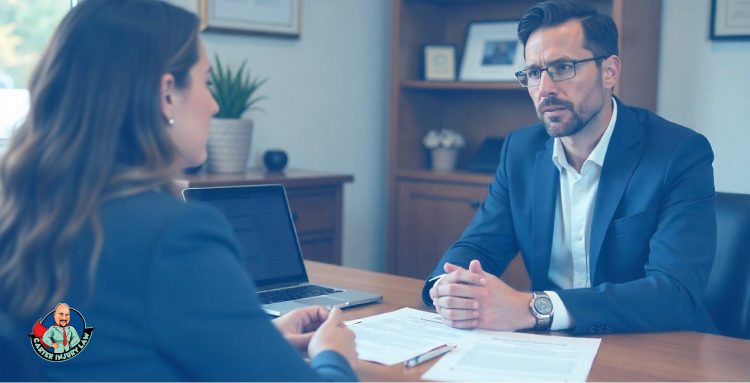
Here’s something that surprises a lot of people—your Personal Injury Protection (PIP) benefits might still apply even if you were walking or riding a bike when the accident happened. Yep, even if you weren’t behind the wheel.
If you own a car in Florida, you’re likely required to carry PIP coverage on your auto insurance. And in certain situations, that coverage can step in to help with medical bills after a pedestrian or bicycle accident. That sounds like a good thing—and sometimes it is—but this is where you really want to slow down and talk to a lawyer first.
Because accepting PIP benefits isn’t always the best move. In some cases, it can actually work against your claim, especially if there are other insurance policies or legal strategies that would offer stronger protection or higher compensation.
When to Call Carter Injury Law (And What You’ll Get)
You don’t need to wait until things get complicated to call a lawyer. In fact, the sooner you get guidance, the better.
A lot of people hesitate because they think calling an attorney means they’re committing to a lawsuit or paying out of pocket. That’s not how we work at Carter Injury Law. The consultation is completely free—no cost, no obligation. You’ve got questions, and I’m here to help you get some clarity, plain and simple.
Whether you were walking across the street or biking through your neighborhood, accidents like these come with a lot of unknowns. Insurance companies don’t always play fair. Medical bills pile up. And trying to figure it all out on your own can feel overwhelming.
My job is to listen to your story and show you what your legal options look like from here. If you’ve got a case, I’ll tell you. If you don’t, I’ll tell you that too. Either way, you’ll leave the conversation with answers and a lot more confidence.

Can You Still Have a Personal Injury Case If There’s Little to No Car Damage?
You step out of your car. The impact was real—you felt it in your chest, the sudden jolt snapping you forward. However, as you turn to look at your vehicle, all you see are a few scratches, maybe a dent if you squint hard enough.
And that’s when the doubt creeps in.
How could you be hurt if your car barely shows any damage? Who’s going to believe you? The insurance company? The other driver? Maybe even you’re starting to wonder if the pain in your neck is just in your head.
However, injuries don’t care what your car looks like. And neither should you. Because the truth is...
(1) Low-Impact Collisions Can Still Cause Injuries
When you think of car accidents, you might picture a scene of twisted metal and shattered glass. However, not every accident looks like that. In fact, low-impact collisions, where your car doesn’t seem damaged, can still result in significant injuries.
Your Body Takes the Force, Even When Your Car Doesn’t
Just because your car doesn’t look damaged doesn’t mean your body didn’t take the hit. Cars are built to absorb impact, but your body isn’t. Even a low-speed crash can cause whiplash, back pain, or other injuries because your body is moving inside the car while everything around you comes to a sudden stop.
Cars Are Designed to Minimize Visible Damage
Modern vehicles are made to crumple in certain areas to protect passengers. That means the impact is spread out in a way that doesn’t leave behind obvious dents or broken parts. The lack of damage to your car doesn’t mean the crash wasn’t serious—it just means the car did what it was built to do.
Research Proves That Minor Crashes Still Cause Injuries
Studies have shown that even at low speeds, the human body can suffer injuries from the sudden force of impact. Soft tissue damage, concussions, and spinal injuries don’t require a car to look totaled. If you feel pain after a crash, that’s not just your imagination—it’s your body telling you something is wrong.
(2) Don’t Let Insurance Companies Decide If You’re Hurt

After an accident, the last thing you want to deal with is an insurance company telling you that your pain doesn’t matter. The reality is, they don’t know what you're feeling, and they don’t want you to question their judgment. Here's why you shouldn’t let an insurance company decide the extent of your injuries.
Insurance Adjusters Will Try to Minimize Your Claim
Insurance companies have one goal—to pay out as little as possible. They’ll tell you that if your car isn’t crushed, you couldn’t have been seriously injured. However, that’s not how the human body works, and they know it. They just hope you don’t fight back.
People Get Hurt in Low-Speed Collisions All the Time
You don’t have to be in a high-speed crash to suffer real injuries. A sudden jolt, even at a low speed, can cause herniated discs or other long-term issues. It happens every day, and we’ve seen it firsthand.
Your Pain Is the Only Truth That Matters
An insurance adjuster doesn’t live in your body. They don’t wake up feeling the pain in your neck, your back, or your head. Only you know what you’re going through, and no amount of insurance company tactics can change that.
(3) Every Person’s Injury Is Different
Just because someone doesn’t show the same physical signs doesn’t mean they’re not suffering. Here’s why every injury, and every person, is unique.
Same Crash, Different Outcomes
Two people can be in the exact same accident and walk away with completely different experiences. One might feel fine, while the other is in serious pain. That doesn’t mean one is exaggerating—it just means every body reacts differently to impact.
Age, Health, and Pre-existing Conditions Matter
An 85-year-old with arthritis won’t handle a crash the same way a 25-year-old athlete would. Someone with prior back issues might suffer a severe injury, while another person in the same car barely feels sore. Your body’s history plays a role, and that’s something insurance companies conveniently ignore.
Your Pain Is Real, No Matter What the Car Looks Like
A car’s condition doesn’t determine how much you’re hurting. Just because the bumper isn’t falling off doesn’t mean you’re not dealing with nerve damage or chronic pain. Your injuries aren’t measured in dents and scratches—they’re measured by how they affect your life.
For more details on how even low-impact collisions can result in injuries, watch this video where we discuss the truth about insurance claims and personal injury in these cases.
(4) Your Right to a Claim – Even in a Low-Damage Accident

If you've been injured, regardless of how your car looks, you still have the right to make a claim. Here's why you shouldn't let the lack of visible damage stop you from seeking the compensation.
Car Damage Doesn’t Decide Your Injury Claim
Yes, the insurance company will look at the damage to your car when valuing a claim. Your body doesn’t follow the same rules as metal and plastic—injuries happen even when the car looks fine.
Your Pain Is the Only Truth That Matters
If you’re hurting after an accident, that’s the reality—not whatever an insurance adjuster wants you to believe. They’ll try to downplay your injuries, but they weren’t in the car with you. They don’t feel the stiffness in your neck, the headaches, or the shooting pain in your back. You do. And that’s what counts.
You Have the Right to Fight for Compensation
Regardless of what the insurance company claims, you have the legal right to seek compensation if you’ve been injured. From medical expenses and lost wages to pain and suffering, you shouldn’t have to shoulder the financial burden of someone else’s negligence.
Will You Go to Court After a Car Accident? Carter Injury Law Explains It All
How to Handle Out-of-State Car Insurance Claims in Florida Accidents
Why Hiring a Lawyer Who Goes to Court Could Be the Best Decision After an Accident
Justice Isn’t Given, It’s Earned – And We’re Here to Help You Earn It
The insurance company wasn’t there when the accident happened, yet they often act as if they know your experience better than you do. They often believe they have the authority to determine the validity of your pain.
We don’t play by their rules. You know your body, and that’s the only truth that matters. We help you cut through the noise—the paperwork, the excuses, the tactics meant to wear you down. We make sure your injuries aren’t dismissed just because the damage to your car doesn’t tell the full story.
If they fail to recognize the seriousness of your case, we make sure your rights are fully represented. In the courtroom, in front of a jury, wherever it takes to make sure you’re heard. Because your pain is real. And we won’t let anyone tell you otherwise.

Why Uninsured Motorist (UM) Coverage Is Essential in Florida
Most people don’t think about insurance until they really need it. By then, it’s too late. The accident has already happened, the medical bills are piling up, and the person responsible doesn’t have the coverage to pay for your injuries. You stare at the paperwork, wondering how you ended up here.
It wasn’t your fault. Yet now it’s your problem.
In Florida, this happens more often than you’d think. Too many drivers on the road don’t have the insurance they should. And when they hit you, it’s not them who suffer the consequences; it’s you.
So, what happens next?
(1) What Is Uninsured Motorist (UM) Coverage?
Uninsured Motorist (UM) coverage is exactly what it sounds like—it protects you if you’re injured in an accident caused by someone who doesn’t have insurance or doesn’t have enough insurance to cover your losses. In some cases, it’s also called Underinsured Motorist (UIM) coverage. However, it does the same thing. It steps in when the at-fault driver can’t pay for your damages.
When you have UM coverage, your own insurance company steps into the shoes of the at-fault driver and covers your damages, just like their insurance should have. That includes:
Medical bills from emergency care, hospital stays, and ongoing treatment
Lost wages if your injuries prevent you from working
Future medical expenses for long-term care or therapy
Pain and suffering, because your injuries affect more than just your bank account
The reality is, you can’t control how responsible other drivers are; however, you can control how well you protect yourself.
(2) Why Florida Drivers Need UM Coverage
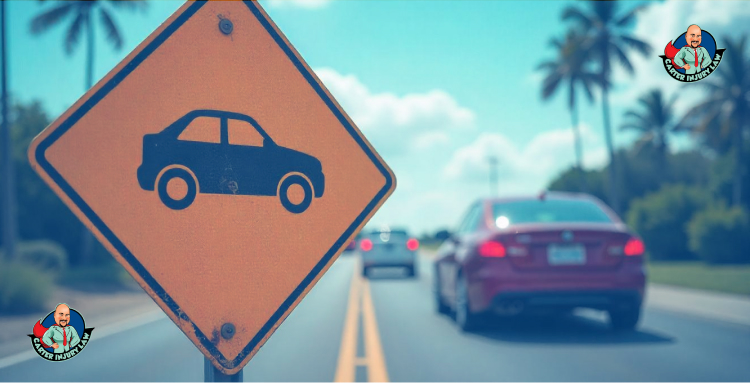
If you live in Florida, where so many drivers are uninsured or underinsured, having UM coverage is a necessary one. Here’s why:
Too Many Drivers in Florida Are Uninsured
Florida ranks among the worst states for uninsured drivers. Many people are on the road without any coverage, which means if they cause an accident, they have nothing to pay for your injuries.
Florida Doesn’t Require Bodily Injury Insurance
Unlike many other states, Florida does not require drivers to carry bodily injury liability insurance. This means that even if the driver who hits you has insurance, their policy might not cover your medical bills at all. That’s why UM coverage is so important. It makes sure you’re protected when the other driver isn’t.
High Number of Tourists and Out-of-State Drivers
Florida is a major travel destination, which means a lot of people on the road are unfamiliar with the area—and that leads to accidents. Many of these out-of-state drivers have minimum insurance that might not fully cover your injuries. If their coverage isn’t enough, your UM policy steps in.
Without UM, You Pay Out of Pocket
If you’re hit by an uninsured or underinsured driver and don’t have UM coverage, you’re on the hook for your own medical bills, lost wages, and future expenses. Most people don’t realize how costly an accident can be until they’re faced with hospital bills, rehab costs, and time away from work. UM coverage is what keeps you from paying the price for someone else’s mistake.
Here’s a breakdown of how UM coverage works and how to select the best policy for you
(3) How Much UM Coverage Should You Get?
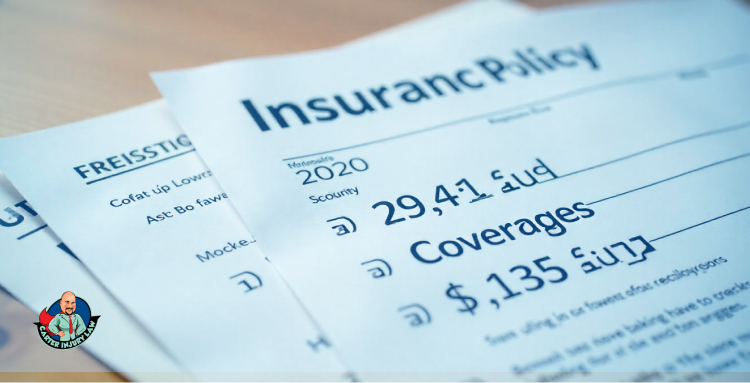
When it comes to UM coverage, having the right amount can make all the difference. Too little coverage, and you might still be left paying out of pocket after a serious accident. Here’s what I recommend:
The Ideal Coverage Amount
If you can afford it, I strongly recommend carrying at least $100,000 per person and $300,000 per incident in UM coverage. This ensures that if you’re injured in an accident with an uninsured or underinsured driver, your policy can cover medical expenses, lost wages, and long-term care.
The Bare Minimum If You’re on a Budget
If higher limits aren’t financially possible, at the very least, you should have $10,000 per person and $20,000 per occurrence. While this won’t cover everything in a serious accident, it’s far better than having no protection at all.
Why More Coverage Is Better
Medical bills add up fast. A trip to the emergency room, follow-up treatments, physical therapy—it all gets expensive quickly. If you only have minimum coverage, you could burn through it in a matter of days, leaving you with thousands of dollars in unpaid expenses.
(4) What Happens If You Don’t Have UM Coverage?
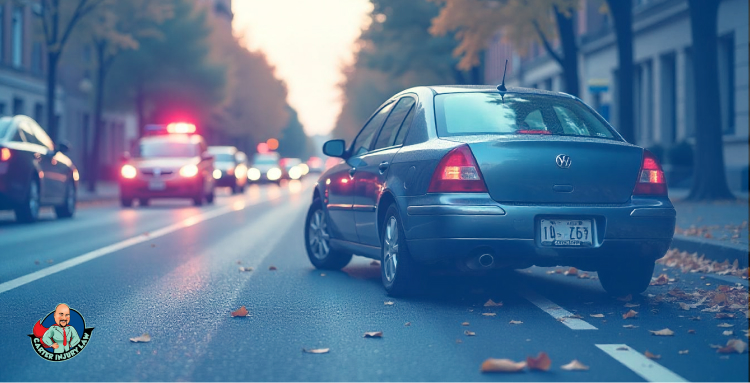
If you don’t have uninsured motorist (UM) coverage, the reality is simple—you could be left with no compensation after an accident with an uninsured or underinsured driver. Let’s break it down:
No UM Means No Compensation for Your Losses
Let’s say you’re involved in an accident with someone who doesn’t have insurance. Without UM coverage, you’re stuck paying for your own medical bills, lost wages, and pain and suffering. The person who caused the accident isn’t going to pay for anything—and neither will their insurance company.
It Could Cost Thousands
Even a relatively minor accident can lead to significant expenses. Medical bills can pile up quickly, from emergency room visits to follow-up care. Add in lost wages if you can’t work, ongoing treatments, and future medical expenses, and you’re looking at thousands, if not tens of thousands of dollars, that you have to cover on your own.
Most People Realize They Need UM Coverage—Too Late
The unfortunate truth is most people don’t think about UM coverage until they’re already in an accident. At that point, it’s too late to get the protection you need. It’s not until you’re facing the financial burden of an accident that you realize how important it is to have coverage in place.
Hesitation costs, Action wins—Start with a free call
The right insurance, especially UM coverage, isn’t something to ignore. It’s the safety net you never think about until you need it.
So, if you haven’t already, take a moment. Look over your policy. Although it’s easy to miss, it’s crucial that you’re covered. Maybe it’s just a slight adjustment, or maybe you need a full review, but whatever it is, make sure you’ve got the right protection for your family.
And if you find yourself with questions or if an accident has left you wondering what comes next, don’t wait. Call me. I’m Rob Johnson, and I offer free consultations—no cost, no fee. Let’s talk about your coverage, your future, and make sure you’re taken care of when it matters most.

Should You Accept an Insurance Company’s Offer to Pay Your Medical Bills After an Accident?
It always starts the same way. A phone call, a letter, maybe even a friendly visit. Someone from an insurance company reaches out, their voice calm, their words rehearsed. We understand what you're going through. We just want to help. How about we cover your medical bills? No hassle, no waiting. Just sign here.
It sounds reasonable. It sounds like relief. However, something about it doesn’t sit right. Why would they be so eager? Why the rush? You were just in an accident. You’re still figuring out the pain, the paperwork, the long nights of discomfort. And yet, here they are, ready to pay.
Most people don’t question it. They sign, they shake hands, they take the money. And that’s when they realize—they’ve just signed away something far more valuable than a check for medical bills.
(1) Understanding Your Own Insurance Coverage (PIP in Florida)
Let’s clear something up right away—if you have a Florida auto insurance policy, your own insurance company is required to pay a portion of your medical bills after an accident. That’s called Personal Injury Protection (PIP).
PIP covers 80% of your medical bills, up to a maximum of $10,000. This is your coverage. It’s there to help you get medical treatment, no questions asked. And most importantly, you don’t need to sign anything to get it.
If your own insurance company is paying through PIP, that’s normal. That’s how the system is designed to work. However, if the other driver’s insurance company suddenly steps in and offers to pay your medical bills, that’s when you need to be careful. Because that’s not normal. That’s when you start asking, Why? What’s the catch?
(2) When the Other Party’s Insurance Company Offers to Pay

Now, here’s where things get tricky. If the other driver’s insurance company calls you up after the accident and says, "We’ll pay your medical bills," you should immediately start asking some serious questions.
First off, why are they offering to pay? Your own insurance should be handling your medical bills through PIP. So why is the other guy’s insurance suddenly so eager to step in? Are they trying to be nice? Or is there something they’re not telling you?
And here's the biggest red flag, Are they asking you to sign something in return? If they are, you need to be cautious. A release is often involved—one that could end up shutting down your right to pursue further claims for future expenses related to the accident.
You have to ask yourself—Why are they making me sign this? The moment they ask you to sign anything, you need to take a step back. This isn’t as simple as it seems.
To help you understand this better, watch the video below where we dive deeper into the risks involved with signing any documents from the other party's insurance.
(3) The Hidden Trap: Signing Away Your Rights
Most accident victims have no idea what they’re signing. The insurance companies know this. They count on it. They use confusing legal language to trick you into signing away your right to pursue future claims.
(i) Giving Up Future Compensation
You might think you're just agreeing to let them cover your medical bills, but what you're really doing is agreeing to give up the right to seek additional compensation down the road. That means if your injuries worsen or require more treatment, you won’t be able to go after them for those costs.
(ii) Pain and Suffering: What You Could Be Sacrificing
It’s not just about medical bills, either. Pain and suffering—the discomfort, the trauma, the emotional toll—that’s another thing you might be signing away. And if you ever need future treatments or surgeries, well, you could be stuck paying for those out of pocket because you’ve already agreed to close the door on those claims.
The point is, these insurance companies aren’t offering to pay your medical bills out of the goodness of their hearts. They want to get you to sign a release so they can move on—and leave you with nothing when your needs grow down the line.
(4) The “Swoop and Sign” Tactic: Why Insurance Companies Rush You
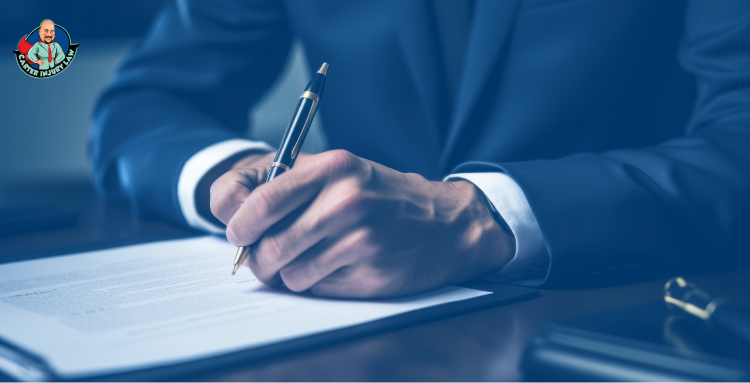
Insurance companies have a well-known trick they like to use—it’s called the “swoop and sign.” Basically, they swoop in right after an accident, before you’ve had a chance to fully assess your injuries, and try to get you to sign away your rights as quickly as possible.
Now, why do they rush? It’s not because they care about you. It’s because they want to close your case on the cheap—before you realize what you’re really entitled to. They don’t just want to cover your medical bills; they want to pay you the least amount possible and be done with it.
The longer you take to understand the full extent of your injuries, the more it’ll cost them. So, they try to get you to sign anything that will prevent you from coming back for future claims, and they do it while you're still in the dark about the long-term effects of the accident. The goal is to settle fast and low, leaving you with less than you deserve.
To Avoid Common Pittfall, Check Out Our Related Blogs:
How to File a Claim After Being Hit by an Uninsured Driver In Florida
Can You Pursue an Auto Accident Case Even With a Prior Injury?
What Does Full Coverage Mean in Florida? Understanding the Misconception
(5) What Should You Do If an Insurance Company Wants You to Sign Something?
Here’s the bottom line—don’t sign anything without talking to an attorney first. That document they’re asking you to sign could be more dangerous than you realize, and you need someone who understands the fine print to guide you through it.
Before you make any decisions, call an attorney. Once you do, email them the document. Don’t try to figure it out on your own. Let the lawyer take a look. Most personal injury lawyers, including us, offer free consultations for situations just like this.
We’ll review that document with you, break it down, and tell you exactly what you’re signing—and more importantly, what you’re giving up. Getting that legal advice can save you from making a costly mistake you’ll regret later.

Should You Take the First Offer from an Insurance Company?
One moment, life moves as it always has. The next, it fractures. An accident, a blur of pain and confusion, and suddenly, the world is no longer the one you knew. Before you can even make sense of it, the phone rings. The insurance company. Their voice is steady, practiced—almost kind. They have an offer. A few thousand dollars, handed over without trouble, without delay.
It sounds tempting, right ? After all, you have bills piling up, maybe even lost wages. Whereas there’s something unsettling about it—why are they in such a hurry? Why does it feel like they know something you don’t?
Maybe it’s because they do. And that’s exactly why you should think twice before saying yes.
(1) The First Offer: Why You Should Almost Always Say No
Right after an accident, the insurance company might come to you with an offer—$2,500, maybe $3,000—if you agree to release your claim. "We’ll give you this money right now," they say, as if they’re doing you a favor.
However, they’re not.
This is a lowball offer, plain and simple. The insurance company isn’t in the business to take good care of you—they’re in the business of saving money. And they know that if they can get you to settle early, before you even know the full extent of your injuries, they win.
Because here’s the thing—what if you’re more hurt than you think? What if your pain gets worse or you need more treatment down the road? If you take that first check, you’re done. You can’t go back and ask for more. That release is final.
So my advice is to never accept the first offer without talking to an attorney. A quick payout might seem nice at the moment, but your future health and financial stability are worth more than whatever they’re offering upfront.
(2) Evaluating a Settlement Offer Later in the Case
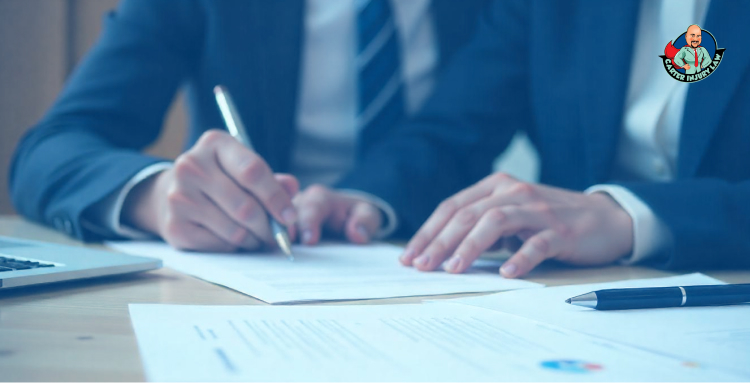
Once you’ve gone through treatment, the insurance company might come back with a new offer. This time, it’s a bigger number. It might even seem reasonable. However, before you even think about accepting, you need to ask yourself a few key questions:
Does it cover all my past medical expenses? Every bill, every doctor visit—those costs add up fast.
Will it reimburse my health insurance? If your insurance company paid anything for your treatment, they’re going to want their money back.
Am I being fairly compensated for pain and suffering? This isn’t just about bills. It’s about what you’ve been through.
What about future medical costs? Even if you have health insurance, you’ll still have co-pays, deductibles, and out-of-pocket expenses. Will this settlement take care of that?
Does it account for mental anguish or loss of enjoyment of life? Your injuries might not just affect you physically—they could change your entire quality of life.
What about my spouse? If your injuries have affected your ability to support your spouse emotionally or financially, they may have a claim, too.
A settlement isn’t just a number. It’s about making sure you’re fully covered—past, present, and future. If the offer doesn’t do that, then it’s not enough.
(3) The Insurance Company’s Real Goal
Insurance companies want you to think they’re on your side. However, make no mistake—their priority isn’t you.
The Adjuster’s Job Isn’t to Help You
That friendly voice on the phone? Their job is to settle your claim for as little as possible. They might sound sympathetic, but at the end of the day, they work for the insurance company—not for you.
Filing a Lawsuit Can Increase Their Offer
If you push back—if you file a lawsuit—their tune often changes. Why? Because they know that a trial could cost them a lot more than settling. Many times, just the threat of going to court can make them offer you more.
Going to Trial Might Be the Best Option
If they’re refusing to offer fair compensation, sometimes you have to take them to court. A jury sees what you’ve been through, and they’re not looking out for the insurance company’s profits—they’re looking at what’s fair.
A lowball offer isn’t them doing you a favor. It’s a tactic. And if they’re not offering you what you deserve, you have options.
Explore some of our other related blogs:
How to Handle Out-of-State Car Insurance Claims in Florida Accidents
How to Avoid Common Pitfalls in the Car Accident Claims Process in Florida
(4) When It Might Be Okay to Accept a Settlement
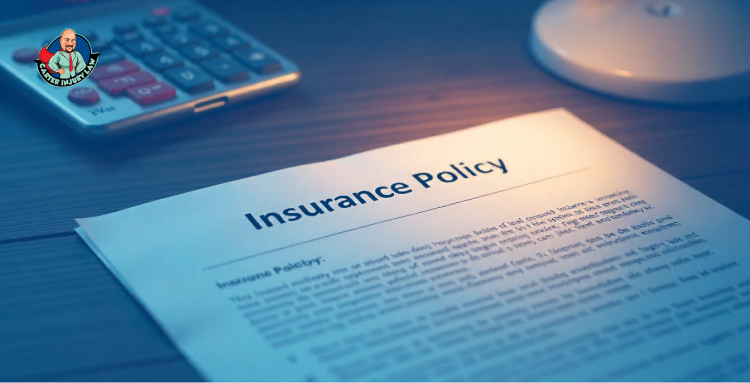
Not every settlement offer is bad. Sometimes, taking the offer makes sense—but only under the right circumstances.
If It’s the Full Policy Limits
Insurance policies have a maximum payout amount. If they’re offering you every dollar available under the policy, that might be as good as it gets. In that case, accepting could be the right move.
If They’re Offering Less Than the Policy Limits
Now, if they’re offering you less than the full policy limits, that’s when you need to stop and evaluate. Is this offer really enough? Does it cover everything—your medical bills, pain and suffering, and future treatment? If not, you may want to push back.
Only You Can Decide—But Get Legal Advice First
At the end of the day, it’s your case, your injuries, your life. You have to make the call. But an attorney can help you understand what’s fair, what’s not, and whether you’re being lowballed.
Settling isn’t always a bad thing, but don’t accept an offer without knowing exactly what you’re giving up.
Watch this video to hear more about how we can help you decide whether to accept an offer or fight for more.
(5) The Insurance Company Has a Strategy. So Should You—Call Carter Injury Law
Insurance companies know exactly what they’re doing when they make you an offer. Do you?
Understanding the Real Value of Your Claim
We will break down what your case is actually worth, factoring in medical bills, lost wages, pain and suffering, and future expenses. You deserve the full picture before making a decision.
You Have the Final Say, We’re Here to Guide You
We don’t make decisions for you. We give you the facts, the strategy, and the best advice based on years of experience. But at the end of the day, it’s your case, and you make the call.
We Don’t Work for Insurance Companies, We Work for You
Insurance adjusters are trained to minimize payouts. We’re trained to maximize them. Unlike them, we have one goal: fighting for you and making sure you get every dollar you deserve.
No Risk, No Upfront Fees
We offer free consultations, and you don’t pay us a dime unless we win your case. That means there’s no risk in reaching out. However, there’s a lot to lose if you settle too soon.

How Long Will Your Personal Injury Case Take? Carter Injury Law Reveals the Truth
The first question that inevitably crosses every client’s mind is, “How long is this going to take?” And rightfully so. After an accident, you need answers—and you need them fast. The thing is, the timeline for your case can vary. Some cases settle quickly, while others might take a bit longer, depending on a number of factors.
It could be that the insurance company is responsive and the facts of the case are clear, or maybe there are complications along the way that extend the process. The key is understanding that the timeline is fluid—it depends on how fast things move along, what challenges arise, and how the other side responds. However, I’ll give you a general timeline and walk you through each phase so you’ll know exactly where things stand.
Phase 1: The First Month – Investigation Begins
The moment you sign up, we get to work. No waiting around, no delays. We start building your case from day one because the stronger the foundation, the better your outcome.
Sending Letters to Insurance Companies
One of the first things we do is notify the insurance companies. We send out letters letting them know we’re representing you, and we start gathering critical information—what policies are in place, what coverage limits exist, and what potential defenses they might throw at us.
Finding Out About Insurance Coverage and Possible Defenses
Insurance companies don’t just hand over money; they look for ways to reduce or deny your claim. So, we dig into the details. How much coverage is available? Are they trying to claim you were partially at fault? We uncover these answers early so there are no surprises down the road.
Investigating Slip-and-Fall Cases
If your case involves a slip-and-fall, we act fast. We reach out to the property owner, their insurance company, and anyone else involved. Our investigator gets out to the scene, takes photos, and documents everything before evidence fades. If you have pictures, we’ll use those too—because solid proof makes it harder for them to deny liability.
Phase 2: The Next 5-6 Months – Medical Treatment & Recovery

This part of your case isn’t about negotiations or legal battles—it’s about you. Your health comes first. The goal is to heal, to get as close as possible to the life you had before the accident. We don’t rush this process because settling too soon could leave you with unpaid medical bills and ongoing pain.
Medical Visits, Treatment Plans, and Documenting Injuries
During this time, you’ll be seeing doctors, following treatment plans, and doing everything necessary to recover. Every appointment, every test, and every diagnosis is documented because those medical records are going to be the backbone of your case. The more thorough your treatment history, the stronger your claim.
The Importance of Following Through with Doctor Visits
One thing insurance companies love to argue is that you weren’t really injured. If you skip appointments or stop treatment too soon, they’ll use that against you. They’ll say, "If you were really hurt, you would have kept going to the doctor." That’s why we tell our clients—follow through. Keep going until your doctor says you’re fully recovered or you’ve reached the best possible outcome.
Focus on Feeling Better Before Settling
We never push for a quick settlement before you’re ready. Because once you settle, that’s it. You can’t go back and ask for more if your injuries turn out to be worse than expected. So, take your time, focus on healing, and when the time is right, we’ll fight to get you the compensation you deserve.
Phase 3: Around 7-8 Months – Making a Demand
A "demand" is our way of saying, "It’s time to settle this." We’ve gathered all the facts, the evidence, and your medical records. Now, we package everything up and send it over to the insurance company or the defendant, telling them, "Here’s what we think your responsibility is, and here’s the amount we’re expecting to settle the case." This is the point where we take all our hard work and put it into a formal request.
Packaging Medical Records, Bills, and Investigation Findings
We carefully organize everything—the medical records, bills, photos, investigation results—and put it all together in a neat, professional package. This shows the insurance company the full picture—how your injuries have affected your life and why the amount we’re requesting is fair.
Sending It to the Insurance Company to Settle the Case
Once we’ve got everything put together, we send the demand off to the insurance company or the responsible party. From here, it’s in their hands. However, don’t expect an immediate response. They’ll need time to review everything, check the details, and decide whether they’re going to meet our demand or not.
Expected Response Time (30-90 Days, Sometimes Longer for Government Agencies)
Most of the time, you’ll get a response within 30 days, but depending on the situation, it can take anywhere from 30 to 90 days. If the case involves a government agency, it could take even longer. Government entities often take more time to respond, but rest assured, we actively follow up to ensure they don’t delay unnecessarily.
Phase 4: 8-10 Months – Settlement or Lawsuit?
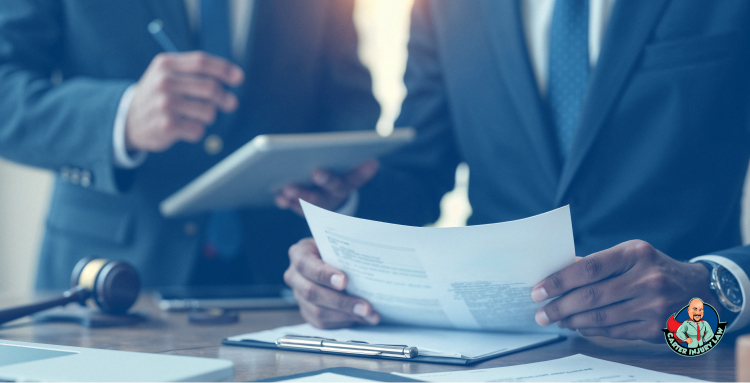
By the time we reach the 8-10 month mark, we’ll have an idea of what your case is worth based on the offer from the insurance company. The question is, Do you take it, or do you fight for more in court?
What Happens If the Offer is Fair?
If the insurance company comes back with a fair offer that properly compensates you for your injuries, medical bills, and lost wages—it might be time to settle. The advantage here is that you get your money and move on with your life without the stress or uncertainty of a lawsuit. We’re not here to drag things out if a fair settlement is on the table.
What If It’s Too Low?
If the offer is too low, that’s a problem. We don’t settle for less than what your case is worth. We’ll go back to the table and negotiate harder, and if we can’t get the insurance company to budge, we’ll advise you to take it to court. They can’t intimidate us into accepting a lowball offer, and we’ll make sure your case is treated fairly.
Some Companies Refuse to Respond—What Happens Next?
There are cases where the insurance company just doesn’t respond. They ignore us, hoping we’ll give up. That’s when we kick things up a notch. If they’re not responding to our demand, we move forward with filing a lawsuit. They’ve had their chance to settle, and now it’s time for them to face us in court.
Phase 5: 10-12 Months – Case Closure or Lawsuit Filing
If all goes well and the insurance company offers a fair settlement, we'll call you in to hand over the check and walk you through the closing documents. Once you sign, your case is wrapped up, and you’re compensated for your injuries. This is the ideal outcome we aim for from the start. However…
If No Fair Settlement, Lawsuit Filing Begins
Now, if the settlement offer hasn’t been fair, or if the insurance company is still playing hardball, that’s when we step up our game. We’ll file a lawsuit and take your case to court. It’s a big step, but it’s one we’re ready for.
Gathering Documents and Information for Court
Once you’ve made the decision to file a lawsuit, it’s all about preparation. We’ll gather everything we need to present a strong case in court. This includes medical records, bills, witness statements, photos, and anything else that supports your claim. We’ll make sure your case is solid and that we’re ready for whatever the defense throws at us.
To get a better sense of how long the entire process could take, check out our video where we break it down for you in detail:
Phase 6: 12+ Months – The Court Process Begins
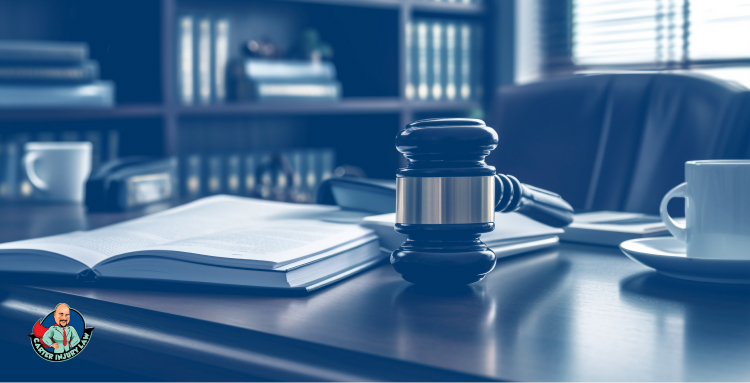
The courts are backed up. Whether it's the effects of COVID or the new laws that rolled out in March of 2023, there’s a lot of cases on the docket, and that means delays. The court system is underfunded and overwhelmed, and while we do everything we can to keep your case moving, it’s out of our hands once it’s in the court system.
Differentiated Case Management Orders – What They Mean for Your Case
Once we get into the court system, you’ll likely encounter "differentiated case management orders." These are the judge’s orders that will govern how your case moves along. They outline timelines for what happens next, and they’re meant to keep the case on track. But, remember, just because there’s a schedule doesn’t mean things will always go according to plan. With everything going on in the courts right now, we might see delays.
Depositions: What to Expect When Talking to the Opposing Attorney
One of the first things that’ll happen in court is the deposition. This is where you sit down with the opposing attorney, and they ask you questions under oath about your case. It’s part of the discovery process, and while it might feel intimidating, we’ll make sure you’re prepared. You’ll be asked about the details of your accident, your injuries, and the impact it’s had on your life. It’s also important to be honest and clear.
Mediation: Most Lawsuits Settle at This Stage (10-12 Months After Filing)
Now, most lawsuits settle during the mediation stage, which usually happens between 10 and 12 months after we file the lawsuit. Mediation is a chance for both sides to sit down and try to reach a settlement before going to trial. Both sides present their cases to find common ground. If we settle, you get paid; if not, we fight for you in court. Either way, we’re pushing for the best outcome.
You Might Also Enjoy These Helpful Reads:
Understanding the Statute of Limitations for Personal Injury Cases in Florida
What Damages Can You Recover in a Florida Personal Injury Case?
How to Secure Personal Injury Compensation in Florida Expert Tips from Carter Injury Law
The Harsh Truth: Why Trials Can Take Years
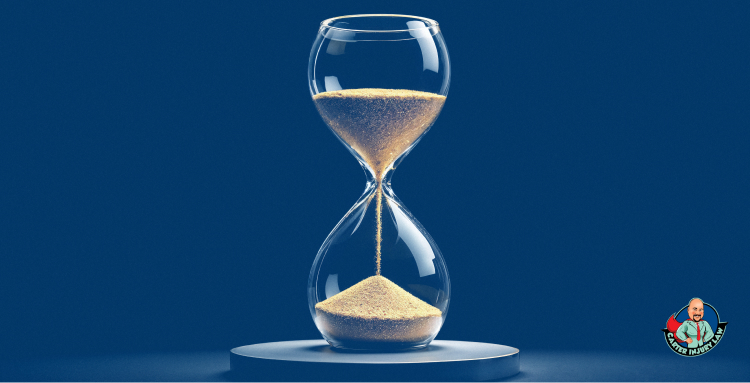
Trials can take 2 to 3 years due to delays in the court system, including backlogs and other unforeseen factors. While this timeline is beyond our control, the best approach is to stay patient.
Delays Aren’t the Lawyer’s Fault
I know it can be frustrating when things are moving slowly. However, delays aren’t really our fault. They’re part of the system we’re working in. The courts are overloaded, and while we fight to keep your case moving, sometimes it takes longer than expected. This isn’t something that’s under our control, and it’s definitely not because we’re not doing our job. We’re pushing hard, but we also need you to be patient and trust the process.
Some Cases Settle Before Trial, but Lawsuits Often Increase Case Value
While most cases settle before trial, sometimes filing a lawsuit can actually increase the value of your case. Insurance companies know that once a lawsuit is filed, the stakes are much higher. They can no longer drag their feet or offer lowball settlements. A lawsuit signals that you’re serious and ready to fight, and that often pushes the other side to make a fair offer. So, while it may seem like the trial process is dragging on, it can actually lead to a better result in the end.
What Are Your Next Steps?
Every case is different, and that’s why it’s important to get a personalized timeline for your specific situation. The general timeline I’ve laid out gives you an idea, but I can give you a much clearer picture once I know the details of your case. So, don’t wait—pick up the phone and call us for a free consultation. It’s risk-free, and I’ll be able to give you an idea of how your case will likely unfold based on your unique circumstances.
And remember, there are no fees unless you win your case. That’s right—no fees unless we secure a settlement or win in court. So, take the next step and reach out to us. You’ve got nothing to lose and everything to gain.

What Are Your Rights to Cancel an Attorney Contract in Florida
Sometimes, the hardest decisions are the ones that seem to demand answers before you’ve had a moment to think. In life, as in law, the pressure to act quickly can leave us questioning whether we’ve chosen the right path. How do you know if the hand you’ve reached for is steady? How do you trust that the words on the page are meant to protect you, not trap you?
These moments of doubt are natural, even necessary. They remind us that choice is a powerful thing—perhaps the only thing we truly own. And when it comes to something as personal as your legal representation, the freedom to choose, to step back, or to start fresh shouldn’t feel like a luxury. It should feel like a right.
(1) What is a Contingency Fee Agreement?
A contingency fee agreement means that your attorney’s fee depends on the outcome of your case. If you win your settlement, the attorney gets paid. If you don’t win, they don’t get paid. It’s that straightforward. This setup allows you, the client, to pursue your case without having to worry about upfront costs or hourly fees. The attorney is only compensated if you get the result you’re looking for.
Now, why is this so common, especially in personal injury cases? Well, the reason is simple—most people don’t have the money to pay for an attorney’s time upfront, especially when they’re dealing with medical bills or missing work due to their injuries. Contingency fees level the playing field. They give everyone the chance to fight for what they deserve without financial barriers getting in the way. It’s a way for the attorney to show they’re invested in your case, because if you don’t win, they don’t get paid. So, in a way, they’re as committed to your success as you are.
(2) The Right of Rescission in Florida—Your 3-Day Window
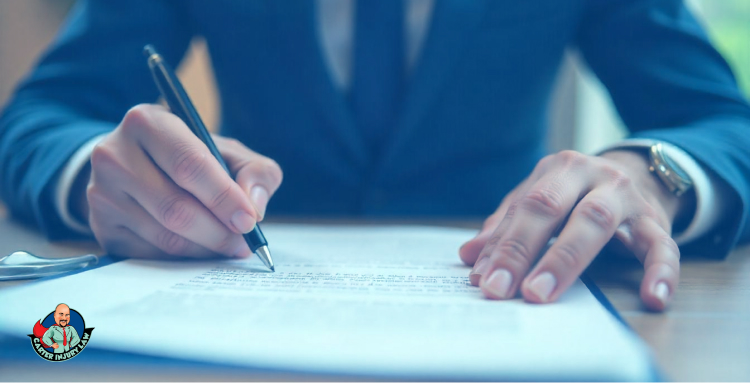
In Florida, if you’ve signed a contingency fee agreement with an attorney, you have what’s called a "three-day right of rescission". This simply means that you have three full days from the date you sign the contract to change your mind and cancel it—without owing the attorney a dime in fees. If you decide to back out, you won’t have to pay for their time or legal work. It’s a safety net that lets you make sure you’re comfortable with your decision before moving forward.
However, and this is important, you may still owe the attorney for any costs they’ve already spent on your case. For example, if they’ve conducted an investigation or had any other out-of-pocket expenses, those costs will still be your responsibility. But, in terms of attorney fees? Nothing. That’s the benefit of the 3-day window—it’s a chance to make sure you’re really comfortable with the attorney you’ve chosen, and if something doesn’t feel right, you have a way out without any penalty.
This right matters because, as much as we’d like to think we’re making the right choice every time, sometimes things don’t feel like they’re working out. Whether it’s a gut feeling, a change of heart, or simply a matter of needing more time to make a decision—you have the right to cancel within that three-day period.
(3) How to Cancel Your Attorney Contract in Florida
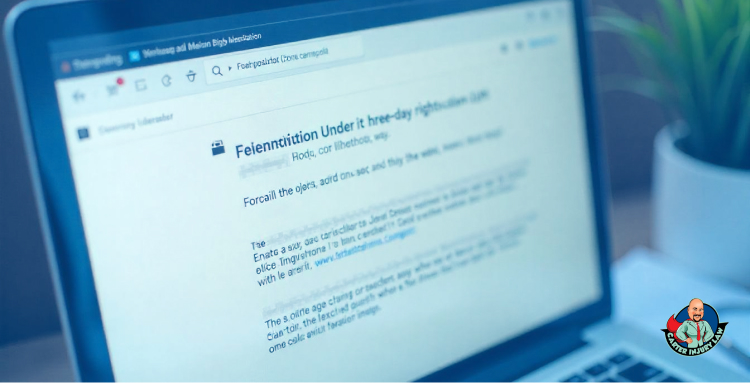
So, you’ve decided that the attorney you signed up with isn’t the right fit for you. No worries, you’ve got options. If you're within that three-day window, here’s what you need to do to cancel your contract:
Write it Down: First things first, you need to put it in writing. Whether you prefer email or a physical letter, make sure you clearly state that you’re canceling the contract. You don’t want there to be any confusion later on. If you go with email, make sure it’s something official, like a formal resignation letter or a simple, clear email. The main point is—document it.
Be Direct: In the email or letter, mention that you’re canceling the agreement under Florida’s three-day right of rescission. You don’t have to give a detailed explanation of why, just keep it straightforward and to the point. You’re within your rights to cancel, and the attorney should respect that.
Send It Right Away: Time is of the essence. You want to make sure your cancellation is done within those 3 days, so don’t delay in sending the letter or email. The sooner, the better. Remember, the clock starts ticking the day you sign the agreement, so act fast.
Keep a Copy: Always keep a copy of what you sent. You never know when you might need proof that you canceled in time. If it’s a letter, get a delivery confirmation. If it’s an email, save the sent copy and any read receipts.
Avoid Liens: The last thing you want is for the attorney to place a lien on your case for the time they’ve already spent working on it. That’s why it’s so important to cancel before they get a chance to do that. If you wait too long, they might have already started working on your case, and they can try to claim payment for that work. By canceling early, you can avoid that situation.
(4) Carter Injury Law Difference: A 30-Day No-Fee Guarantee
Now, what happens if you miss that three-day window? Well, don’t panic. At our firm, we understand that sometimes you need a little more time to be sure about your decision. That’s why we offer a 30-day no-fee guarantee.
Unlike the standard three-day rescission period, we give you 30 days to decide if you’re happy with the way we’re handling your case. That’s right—30 full days to evaluate whether you feel comfortable with our communication, our approach, and our service. We know that choosing the right attorney is a big deal, and we want you to be 100% confident in your choice before you move forward.
Why We Offer It ?
The benefit of this extended window is you have more time to really get a sense of how we work. In the first 30 days, if you feel like we’re not the right fit for you—maybe we’re not returning your calls or not keeping you in the loop as you expected—just let us know. No hard feelings. You won’t owe us anything for our time or legal fees. You’ll just be responsible for any costs we’ve already incurred on your case—things like investigation fees, for example.
The 30-day window gives you the breathing room to make an informed decision without feeling rushed or pressured. It’s our way of showing confidence in our service and making sure you feel comfortable with us. You don’t have to make any snap judgments—we’ve got you covered for a full month. That’s how sure we are about our ability to get the job done right and take care of you as a client.
(5) Recognizing Unethical Practices in the Legal Field
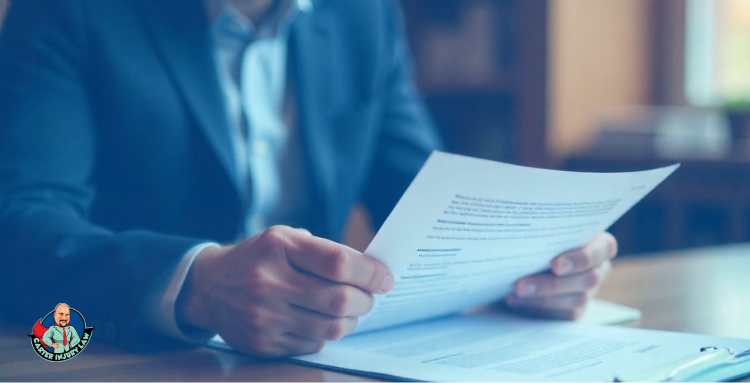
When it comes to choosing an attorney, one of the most important things you can do is make sure they’re operating ethically. You deserve someone who truly has your best interests at heart—not someone who’s just out to sign another client. Unfortunately, not every attorney out there plays by the rules.
Let me give you an example. Imagine you’re in a hospital room, vulnerable and in pain, and someone walks in trying to get you to sign a contract right then and there. If that sounds like a scene out of a movie, you’re not far off—it’s straight out of The Rainmaker. That kind of behavior is not just unprofessional; it’s unethical. A good attorney doesn’t pressure you into signing anything when you’re not in the right state of mind to make that decision. If someone approaches you like that, it’s a major red flag.
When to Be Wary:
If an attorney comes to you unsolicited—whether in a hospital, at your home, or anywhere else—you should stop and question their intentions. Ethical attorneys don’t chase after clients. Instead, they let you come to them when you’re ready. Another sign to watch for is an attorney who seems more interested in signing you up quickly than explaining your options or answering your questions. If they’re not taking the time to listen to you and understand your situation, that’s a big problem.
Get More Legal Insights To Avoid Common Pitfalls:
Can I Switch My Car Insurance Company During the Personal Injury Case?
Understanding the Statute of Limitations for Car Accident Claims
A Choice That Defines Your Path
In the end, the choices we make often come down to a single, quiet question: "Am I doing what’s best for me?" When it comes to selecting the right attorney, the answer should never feel rushed or uncertain. It’s about trust, integrity, and the confidence that the person standing beside you truly has your back.
Reach out today for a free consultation. No pressure, no obligation—just an honest conversation about how we can help. Because in the pursuit of justice, every step should feel like the right one.

Slip-and-Fall Secrets Revealed What You Must Know to Win Your Case
There’s a moment, just after it happens, when time seems to stand still. You’re lying there, on the cold floor of a supermarket or the hard pavement of a parking lot, and the world feels both distant and uncomfortably close. Embarrassment floods in first, followed quickly by a sharp pain or a dull ache that whispers: This isn’t how today was supposed to go.
Slip-and-fall incidents are rarely about the fall itself. They’re about what follows—the questions, the frustration, the realization that this wasn’t an accident at all, but the result of someone’s negligence. And while the world keeps moving around you, you’re left wondering how to make sense of it, how to make it right.
Carter Injury Law understands the chaos that comes after the fall. And more importantly, we’re here to help you rise.
(1) What Are Slip-and-Fall Cases?
Slip-and-fall cases are a type of premises liability claim, which means they arise when someone gets hurt because a property owner or establishment failed to maintain their premises in a reasonably safe condition. These cases are about more than just the fall itself—they’re about the responsibility a business or property owner has to the people who walk through their doors.
For example, when you enter a store, a restaurant, or even a residential property, you trust that the environment is safe. You’re not expecting hazards that could trip you up or cause you harm. Legally, that trust isn’t just a courtesy—it’s a standard of care that the property owner is obligated to uphold. If they neglect that duty and someone gets hurt, that’s where a slip-and-fall case comes into play.
(2) Common Causes of Slip-and-Fall Accident Cases

Slip-and-fall accidents can happen in a variety of ways. Let’s take a closer look at some of the most frequent causes:
Wet or Slippery Floors
This is one of the most common culprits. Whether it’s from spilled liquids, recently mopped floors, or even rainwater tracked in from outside, wet floors create a dangerous environment. Businesses have a duty to promptly clean up spills or post warning signs if the floor is still wet. If they don’t, it can lead to serious injuries.
Uneven Surfaces
Broken pavement, loose tiles, or uneven flooring may not seem like much at first glance, but they’re accidents waiting to happen. Walking on a surface that suddenly changes height or texture can easily cause someone to trip and fall. Property owners are expected to repair these issues or at the very least warn people of the hazard.
Poor Lighting
Without proper lighting, it becomes difficult to see obstacles or changes in the surface ahead. Poor lighting isn’t just inconvenient—it’s dangerous. Businesses must ensure their lighting is adequate to help prevent unnecessary accidents.
Obstructed Walkways
Walkways cluttered with boxes, merchandise, or other obstacles are a hazard to anyone trying to pass through. It’s the responsibility of the property owner or manager to keep pathways clear and accessible, ensuring that people can navigate the space safely.
Slippery Parking Lot Coatings
Parking lots might not be the first place you think of when it comes to slip-and-fall accidents, but they’re a common site for injuries. Sometimes, the surface of a parking lot is made slippery because the wrong type of paint or sealant was used. Facilities are often required to use non-slip coatings to prevent falls, but not all of them comply. When they fail to meet these standards, it puts everyone at risk.
(3) Where Do Slip-and-Fall Accidents Happen Most?

Slip-and-fall accidents can occur almost anywhere, but certain locations tend to see them more often. Let’s break it down:
Retail Establishments
Whether you’re shopping at a big-box store or a local boutique, retail spaces are a frequent site for slip-and-fall accidents. From slippery entranceways during rainy weather to merchandise cluttering the aisles, there are countless hazards if the store isn’t properly maintained. Retailers invite the public in, and with that invitation comes a legal responsibility to ensure the shopping environment is safe.
Restaurants and Supermarkets
In places where food and drinks are served or sold, the risk of slip-and-fall incidents increases. Spilled beverages, dropped food, and freshly mopped floors are all common hazards. Restaurants and supermarkets have a duty to address these issues quickly and make sure the public is warned about any potential dangers, like wet floors or broken tiles.
Public Spaces
Parks, sidewalks, and government-owned buildings are other places where slip-and-fall accidents frequently occur. In these spaces, the responsibility often falls on a municipality or public entity to maintain the area. That means ensuring sidewalks are even, stairways are safe, and any hazards are addressed promptly to avoid injuries.
Residential Properties
If you’re visiting an apartment complex, condominium, or private home, the property owner or landlord has a duty to keep the premises safe for guests. Hazards like broken steps, slippery driveways, or poorly lit pathways can lead to accidents and property owners can be held responsible if they fail to address these risks.
Most businesses and property owners carry general liability insurance to cover incidents like these. These policies are designed to protect them from the financial fallout of an injury claim. But just because they have insurance doesn’t mean they’ll admit fault or willingly compensate you for your injuries. That’s why it’s so important to understand your rights and work with someone who can advocate for you.
(4) What to Do if You Experience a Slip-and-Fall Incident

The steps you take immediately afterward can have a significant impact on your health, your recovery, and your ability to seek justice. Here’s what you need to do:
Report the Incident
The first step is to notify someone in charge—whether it’s an employee, manager, or property owner. Let them know what happened and where it occurred, and make sure an incident report is filed. This report creates an official record of the accident, which can be invaluable later. If possible, ask for a copy of the report for your own records. Keep in mind that in Florida, businesses are not required to give you a copy, but it never hurts to ask.
Seek Medical Attention
Your health should always be your top priority. Even if you think your injuries are minor, it’s crucial to get checked out. Many injuries from slip-and-fall accidents, like sprains, fractures, or even concussions, don’t always show immediate symptoms. Visit an urgent care clinic, see your primary care physician, or if necessary, go straight to the emergency room. In severe cases, don’t hesitate to take an ambulance.
Document Everything
While you’re still at the scene, try to gather evidence if you’re able. Take photos of the area where you fell, including any hazards like wet floors, poor lighting, or uneven surfaces. Make note of the time, date, and any witnesses who saw what happened. If someone else is with you, ask them to help you document these details.
Explore Our Blogs For Further Legal Insights:
What to Do After a Car Accident in Florida with Out-of-State Insurance
Can I Switch My Car Insurance Company During the Personal Injury Case?
(5) Let’s Talk About Your Case
The first thing you need to do is reach out to us for a free consultation. It’s not just some brief chat. It’s a moment for us to listen to your story, to understand the details of your accident, and to offer you clarity in a world full of confusion. If you’re burdened with medical bills, lost wages, or the endless back-and-forth with insurance companies, we’re here to help you find the best way forward.
In that consultation, we’ll make sure to answer every question you have and address the concerns you’ve been carrying. You shouldn’t feel lost, and you shouldn’t feel alone. Just an opportunity to get the answers you need and to understand how we can help.
We’re your advocates, your support, your partners in the pursuit of justice. If you’ve had a slip-and-fall accident, don’t wait. Call us now. Whether you want to meet face-to-face in our office or have a conversation over the phone, we’re here to offer you the attention and guidance you deserve.

Will You Go to Court After a Car Accident? Carter Injury Law Explains It All
If you’ve found yourself in the aftermath of a car accident, the uncertainty can feel paralyzing. The confusion, the mounting stress, the questions that never seem to have simple answers. One of the biggest concerns people have is whether their case will go to court. It’s a natural question, a fear that lurks in the back of your mind as you wonder if you’re heading toward a long, drawn-out legal battle.
However, that doesn't mean it's always smooth sailing. There are twists and turns in the journey ahead, and sometimes, the path to resolution can be much more complex than you’d expect. So, where does this leave you? And what happens if it takes an unexpected turn? Well, that’s the real question—and it’s one we’re here to help answer. Let’s explore what happens when it begins…
(1) The First Step: Filing a Claim
Right after an accident, a lot of people wonder, "Am I in a lawsuit now?" The simple answer is, no, not yet. Your case doesn't go straight to a lawsuit. Instead, it starts as something much more straightforward: a claim.
Think of this as the first official step in the process. After an accident, you’re essentially telling the insurance company—or sometimes the person or business responsible—that you’re seeking compensation for your injuries. It’s not a lawsuit yet, but it’s where we begin the journey of making sure you’re taken care of.
(i) What Happens After You File a Claim
When you file a claim, the insurance company will give you something called a claim number. This number is crucial because it helps track your case as it moves through the process. It’s a sign that your case has officially entered what we call the “pre-suit process.”
In this phase, we begin gathering the details. First, we reach out to the insurance company to find out the specifics of their policy. What are the insurance limits? How much coverage do they have? This information is very important because it helps us understand what we’re working with when it comes to negotiating a settlement.
(ii) Negotiating a Settlement: The Goal Before Court
Our goal during this time is to settle your case without going to court. That’s why we send a demand letter to the insurance company. In that letter, we explain exactly how the accident has affected you—whether it’s your health, your job, or your everyday life. We make a solid case for the compensation you deserve. Most of the time, we aim to negotiate with the insurance company to get you a fair settlement, avoiding the stress of a trial.
(2) Settlement or Lawsuit: What Happens Next?
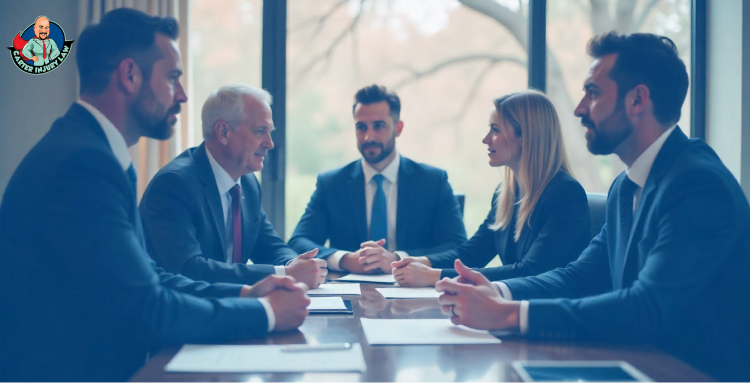
Now, here’s where it can go one of two ways: settlement or lawsuit. Let’s explore them with more details
(i) Settlement: The Ideal Outcome
In many cases, we’re able to settle your claim without stepping foot in a courtroom. That’s our goal, after all—to reach a fair settlement as quickly and efficiently as possible. This means the insurance company agrees to compensate you for your injuries and damages, and we’re able to wrap up your case without the need for a trial. We can do this through careful negotiation, presenting a strong case to the insurance company that shows why they need to offer you fair compensation. This avoids the stress of a lengthy legal process and gets you the help you need faster.
(ii) When the Insurance Company Doesn’t Play Fair
But sometimes, the insurance company doesn’t play fair. If they offer you a lowball settlement, you don’t have to accept it. We’ll push back and demand what you truly deserve. If they delay your case—meaning they drag their feet, keep asking for more information, or don’t respond in a timely manner—that’s another sign that we may need to move to the next step. Or, worst case scenario, they might outright deny your claim, and that’s when things get a little more complicated.
(iii) Filing a Lawsuit: When Settlement Efforts Fail
When that happens, we need to seriously consider filing a lawsuit. This is where things can get a little more formal. In Florida, there’s a statute of limitations, which sets a deadline for filing your lawsuit. You have two years from the date of the accident to file your case in court. This is a hard deadline, so if it comes to filing a lawsuit, we want to make sure we do it within that window.
Once we file a lawsuit, it officially enters the litigation process, and we start with a complaint. This is a formal document that outlines your case and the reasons why you’re seeking compensation. From there, we file it with the court and serve the defendant (the person or company responsible for your injuries) with a copy of the complaint. This is when your case officially transitions from a claim to a lawsuit.
(3) Do You Have to Go to Court?
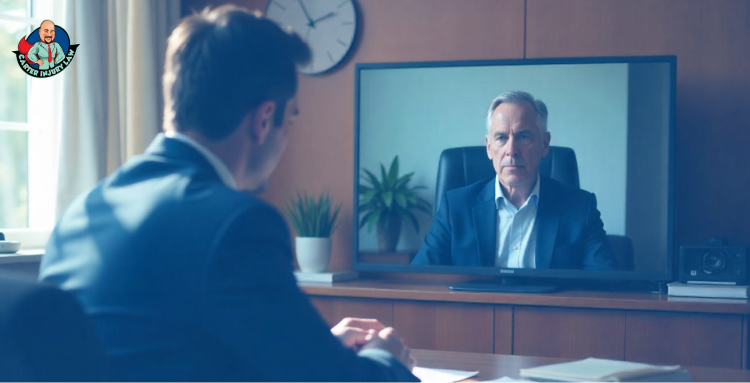
Okay, so your case is now officially a lawsuit. But does that automatically mean you have to go to court? Not necessarily. I know that the idea of going to court can be intimidating, but most cases don’t end up in court right away—if at all. Once the lawsuit is filed, there’s still a lot of behind-the-scenes work that goes on first.
(i) Discovery: Gathering the Evidence
The first step in this phase is what’s called discovery. This is where both sides exchange information. Think of it as a process of both of us gathering the evidence needed to support our case. We’re going to request documents, question the other party, and get a clear picture of what happened and what damages were caused. This is an important step because it helps build your case, but it’s not something that requires you to go to court.
(ii) Depositions: What They Are and How They Work
Now, you might be wondering about depositions. A deposition is another part of the discovery process. It’s a chance for the other side’s attorneys (and sometimes the defendant themselves) to ask you questions under oath. It sounds a little like something you’d see in a courtroom drama, but in reality, it’s usually much less formal.
Most depositions take place outside of a courtroom, often over Zoom or at a neutral location, like a court reporter’s office. You’ll be asked questions about the accident, your injuries, and how this has affected your life. It can feel a little uncomfortable, but don’t worry—I'll be there with you, making sure you know what to expect and helping you navigate the process.
So, while depositions are court proceedings, they’re not the same as a trial. You won’t be in a courtroom with a judge and jury—at least not yet.
(4) Mediation: A Court-Required Step
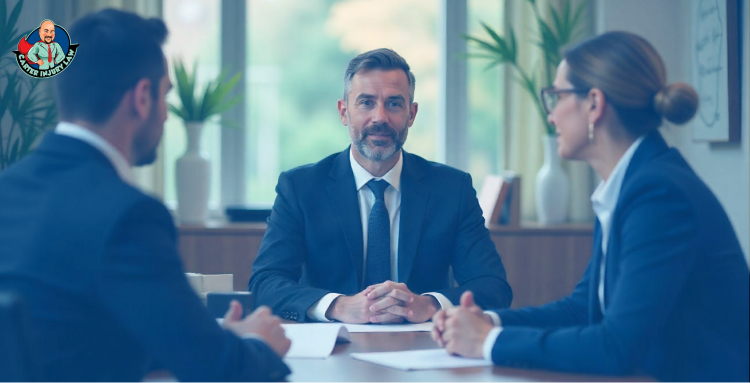
Before we even think about heading to trial, most cases go through a process called mediation. You’ve probably heard the term before, but what exactly does it mean for your case?
Mediation is essentially a settlement meeting, but with a twist—it’s led by a neutral third party, known as the mediator, who helps both sides try to resolve the case without the need for a full trial. The mediator’s job is to listen to both sides, understand the issues, and then try to guide us toward a resolution that both parties can agree on.
Now, mediation is required by the court. Before we can move forward with a trial, the judge will typically require that we go through this step. It’s not optional. However, while it’s a required step, mediation isn’t in front of a judge, so it’s much more informal and relaxed than what you might imagine a courtroom to be like.
(5) The Rare Occasion: Going to Trial
So, when do you actually have to go to court? The short answer is only if your case goes to trial. But very few cases actually end up going to trial. Most of the time, insurance companies will step up and settle the case before it gets to that point. They know that going to trial is a big deal, it’s expensive, and it’s unpredictable for both sides.
It’s important to understand that trial is the rare exception, not the rule. Most of the time, we’ll be able to negotiate and come to a settlement before things ever get that far. But if we do end up in a situation where the insurance company refuses to offer a fair settlement, or if they deny your claim outright, we may have no other choice but to take your case to court.
Contact Us, and Let’s Turn Your Fight Into a Win
If you're feeling unsure or overwhelmed about what to do next, you don't have to face it alone. Pick up the phone and give us a call for a free consultation. We’ll walk you through the process, clear up any confusion, and answer the questions that keep you up at night. In a world that often feels indifferent, it's important to know that someone is in your corner.

Can You Pursue an Auto Accident Case Even With a Prior Injury?
You’ve been through it before—an accident, an injury. It’s a part of life that can feel inevitable, like a chapter in a book you didn’t choose to write. But then, another accident happens. And suddenly, you're left wondering: Can you still pursue justice for your pain, even though your body bears the scars of past misfortune?
It’s a question that taps into something deeper than just legalities. It's about what happens when life pushes you down, yet again. Do you stay down, or do you get back up, even when you’re bruised from before? Many would say that your past injury limits your chances. They’d tell you that your history of pain might stand in the way of recovery. But what if they’re wrong?
(1) Yes, You Can Still Pursue a Case
Even if you’ve had a prior injury from an earlier accident or incident, you can absolutely pursue a new auto accident case. Just because you've been hurt before doesn’t mean you don’t have a right to seek compensation again.
I get it—many people worry that their past injuries might hold them back. But let me tell you, don’t let that fear stop you from fighting for what you deserve. You have the right to recover, regardless of whether your current injury is similar to or even the same as one you've had before. Your past doesn’t define your future, and in the eyes of the law, you are entitled to compensation for any new damage caused by someone else’s negligence.
(2) Why Some Lawyers May Not Take Your Case
Many lawyers might hesitate to take on your case if you’ve had a prior injury. They might think it complicates things, or that it’ll be too hard to prove you deserve compensation. It's understandable—dealing with a history of injuries can seem like extra baggage. Some lawyers might even see it as a reason to turn you away.
However, at Carter Injury Law, we see it differently. We understand the reality of what happens when you've been hurt before. If you've been injured in the past, you're actually more likely to be hurt again. It’s not a reason to turn you away—it’s the reason we’re here to help. Just because you’ve been through it once doesn’t mean you don’t deserve to be made whole again. We’ll fight for you, no matter what your injury history looks like.
(3) The Law Backs You Up

Under the law, if your previous injury has been aggravated, exacerbated, or activated by a new accident, you still have a valid claim.
Let’s say you were in a car accident years ago, and you hurt your lower back. You’ve been managing it with mild discomfort, but then, another accident happens, and your back pain becomes significantly worse. The new accident has aggravated your prior injury, and because of that, you have the right to pursue a claim for the pain and suffering, medical treatment, and other damages resulting from the increased injury.
While the settlement may not be as large as if it were a brand-new injury, you are still entitled to compensation for your aggravated injury. This includes covering medical expenses, lost wages, and pain and suffering caused by the worsening of your pre-existing condition.
(4) Why You Shouldn't Settle for Less
Even though you may have a prior injury, that doesn’t mean you should settle for less. If your injury has been aggravated by a new accident, it’s important that this is properly taken into account when settling your case. You deserve to be compensated for the pain, medical costs, and any other damages caused by that aggravated injury. Don’t let anyone convince you otherwise.It’s important that this is properly taken into account when settling your case as highlighted by the American Bar Association.
Let’s say you were in a previous accident and hurt your knee. The pain wasn’t severe, but you managed it. Then, you’re involved in another accident that causes your knee pain to flare up, making it much harder to walk or work. Now, the pain is more intense, and you need to go through physical therapy and maybe even have surgery. If you settle for a lower amount because of the old injury, you’ll be shortchanged for the extra treatment and time off that this new accident caused. Make sure that the full extent of your aggravated injury is accounted for in your settlement.
(5) Carter Injury Law: Your Trusted Ally in The Toughest Times

If you’re unsure about your case or have questions that keep circling in your mind, don’t let them hold you back. We all find ourselves at a crossroads where the path ahead is uncertain. This is one of those moments, and you don’t have to walk it alone.
When you contact us, there’s no cost and no fee. There’s no pressure, no catch—just a chance to have a conversation about what’s best for you. Whether it’s in person or over the phone, we’ll find a time that fits into your life. After all, the journey to getting the compensation you deserve doesn’t need to be complicated or intimidating. We’re here to make it as easy as possible for you to take the next step.

Florida Statute of Limitations for Auto Accidents What You Need to Know
Did You Know Florida’s Auto Accident Laws Have Changed? It means it’s more important than ever to know your rights and act quickly. Missing the deadline to file could mean losing your chance to recover damages, and nobody wants that. The time frame for filing a claim after an auto accident in Florida is a bit tricky right now. Why? Because the law changed recently—on March 24, 2023. Before then, you had four years to file a lawsuit after an accident.
But as of the date of this post, that window has been shortened. You’ll find out exactly what’s changed and why having a personal injury attorney on your side can make all the difference in securing the compensation you deserve. Keep reading to learn what you need to know.
What Is the Statute of Limitations?
The statute of limitations is the legal deadline to file a lawsuit in court. It’s not just a random date—it’s a critical part of the law that ensures cases are brought forward on time. Over time, evidence can be lost, memories fade, and witnesses become harder to track down. By setting a clear deadline, the law helps preserve the integrity of your case.
Now, in Florida, the statute of limitations for most auto accident cases is two years if the injury occurred after the law changed on March 24, 2023. These timelines balance fairness to both the injured party and the defendant, but they also make it easy to accidentally let time slip by—especially when you’re focused on recovery.
Florida’s Statute of Limitations: Before and After March 2023
Let’s talk about how Florida’s statute of limitations for auto accidents has changed. It’s a big deal because it directly impacts how much time you have to protect your rights after an accident.
Before March 2023
If you were injured in an auto accident before March 25, 2023, you had a four-year window to file your lawsuit. That meant you had more time to recover from your injuries, gather evidence, and make decisions about pursuing your case. Four years is a significant period, giving people a lot of flexibility to take action.
But even with that extended timeline, it wasn’t something you could afford to take lightly. Waiting too long always carries risks—witnesses forget details, evidence can get lost, and insurance companies may push back harder as time passes. Even with four years, acting quickly was always the smart choice.
After March 2023
For accidents that happened after the law changed in late March 2023, the statute of limitations has been cut in half—from four years to just two years. Here’s where things have shifted. Two years may feel like a long time, but when you’re recovering from injuries, dealing with medical bills, and juggling life, that clock ticks down fast.
This change means there’s much less room for delays or mistakes. If you miss that two-year deadline, you lose your right to file a lawsuit—no exceptions. That’s why it’s more important than ever to seek legal representation early, preserving your ability to pursue compensation.
Why Is This Change Important?
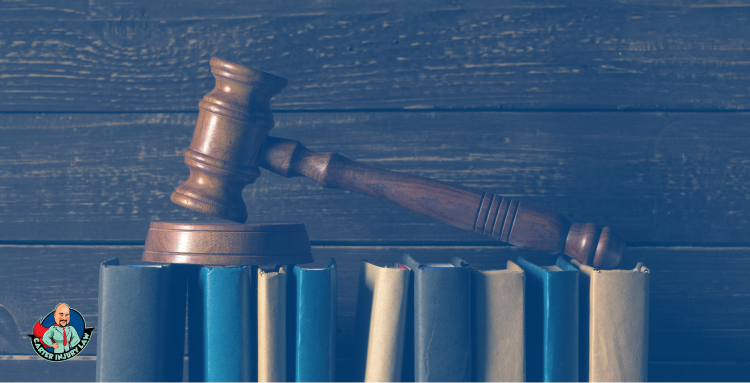
The change to Florida’s statute of limitations isn’t just a small tweak—it’s a major shift that directly impacts your ability to recover after an auto accident. Let’s break it down.
⇒ The Urgency of a Shorter Timeline
After an accident, you’re already dealing with a lot—doctor’s appointments, physical recovery, mounting medical bills, and possibly even the emotional stress of the situation or even just trying to get back to your day-to-day life. Before you know it, that window to file a claim could close.
⇒ The Consequences of Missing the Deadline
The harsh reality is that if the statute of limitations runs out, you’re legally barred from filing a lawsuit. It doesn’t matter how strong your case is or how obvious it is that the other party was at fault. The court simply won’t hear your case.
And when that happens, your ability to recover damages is gone. That means no compensation for medical bills, lost wages, pain and suffering, or any other losses you’ve incurred. It’s a hard stop, and there’s no getting around it once the deadline has passed.
⇒ Why You Should Act Now
Every case is different, and there may be unique circumstances or exceptions that apply to yours. But the only way to know for sure—and to protect your rights—is to consult with an attorney as soon as possible. An experienced personal injury attorney can help you navigate this shortened timeline, gather evidence, and file your claim within the legal deadline.
More For You :
Securing Compensation for Car Accidents in Your Area
Avoiding Common Mistakes in the Car Accident Claim Process
Exceptions and Variations: Not Every Case Follows the Same Rule

When it comes to the statute of limitations in Florida, it’s important to understand that not all cases are the same. Here’s how some exceptional situations can some exceptions and variations could apply to your specific situation.
The General Rule—and the Exceptions
Let me make this clear: every case is unique. The two-year statute of limitations applies to most auto accident claims after the law changes, but depending on the details of your case, there may be exceptions that extend—or sometimes even shorten—that timeframe.
For example, some cases involving minors or individuals with certain disabilities might have different rules. Similarly, claims involving government entities, like if your accident involved a city bus or government vehicle, often come with specific timelines and procedures. These cases can be much more restrictive, with shorter deadlines to act.
Other Types of Injury Claims
Beyond auto accidents, other types of personal injury claims can have completely different statutes of limitations. For instance:
Medical malpractice claims typically have a 2-year deadline, but that clock might start ticking when the injury is discovered, not necessarily when it occurred.
Wrongful death claims usually have a two-year statute of limitations as well, but specific circumstances can affect that timeline.
Product liability cases or injuries involving defective products might follow other timelines, depending on when the defect was discovered or reported.
The key here is that the rules vary widely based on the nature of the claim and the details of your situation.
Carter Injury Law: Expert Help with Auto Accident Claims and Statute of Limitations
Don’t rely on general guidelines when it comes to your case. An experienced attorney will analyze your specific circumstances, identify any applicable exceptions, and make sure you don’t miss a critical deadline. Between recovering from your injuries, dealing with insurance companies, and trying to make sense of legal deadlines, it’s easy to feel lost.
At Carter Injury Law, we understand the importance of getting it right the first time. Our team stays up-to-date on Florida’s evolving legal landscape, so you don’t have to. If you’ve been injured in an auto accident in Tampa, Florida, reach out to Carter Injury Law for a free consultation. We can protect your rights and ensure you receive the recovery you deserve. Your case deserves your attention today.

What Damages Can You Recover in a Florida Personal Injury Case?
If you’ve been hurt in Florida, you might find yourself asking, 'What can I recover from all this?' It’s a fair question, and the answer, like most things, isn’t simple. Life is rarely that generous. But the law, in its imperfect way, offers two types of compensation: economic and non-economic damages. We won’t get into punitive damages here, but those are punishment damages that a defendant sometimes has to pay if their conduct was especially egregious or outrageous.
The first is practical, medical bills, lost wages, and the cost of what’s been broken. The second is harder to measure, like trying to hold water in your hands. It’s for the pain you carry, the nights spent staring at the ceiling, the way your world has shifted. Both are real, yet neither can undo what’s been done. Let’s look closer at what’s possible, and how Florida’s laws shape what remains of your fight.
(1) Economic Damages: Recovering What You’ve Lost
When it comes to economic damages, we're talking about the tangible, out-of-pocket costs you’ve incurred because of your injury—things that you can easily calculate and prove with receipts or bills. These damages are all about covering the actual expenses that have a direct financial impact on your life.
To make things clear, here’s a breakdown of what you might be entitled to:
Past and Current Medical Expenses
This includes any treatment you’ve already received, like emergency room visits, surgeries, physical therapy, or doctor’s appointments. It doesn’t matter if the treatment was in the past or is happening right now—these are all part of the medical expenses you can claim.
And don’t forget about ongoing treatments, like prescription medications or follow-up visits to specialists. These costs add up quickly, and you’re entitled to get reimbursed for them.
Future Medical Expenses
If your injury requires long-term care or future procedures, you’re also entitled to compensation for that. Maybe you need additional surgeries, physical therapy, or home care down the line. Even though you haven’t had those expenses yet, they’re a direct result of your injury, and it’s important to account for them.
Your doctors or medical providers might give a prognosis, recommending certain treatments, and these recommendations can be used to estimate what your future medical bills will look like and help secure compensation.
Lost Wages
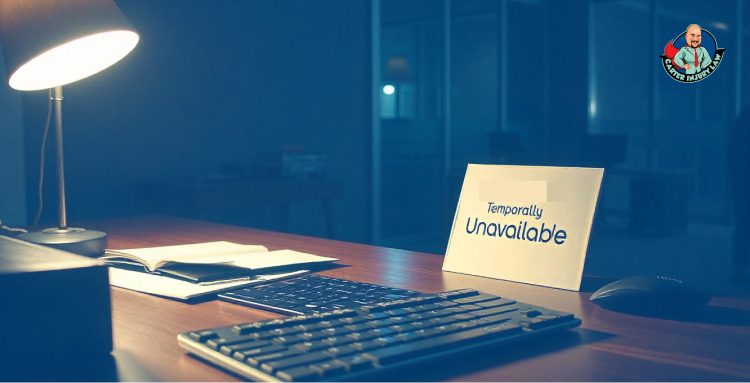
If you couldn’t work because of your injury, that lost income is something you can recover. This includes the paychecks you missed out on while you were recovering. Whether you were laid up in bed or spending time at appointments, you shouldn’t be left financially burdened because of time missed from work. Lost wages can also apply if you have to take time off to care for a loved one after their injury.
Future Loss of Earning Capacity
This is where things get a little more complex. If your injury is severe enough that you can't go back to the same type of work you were doing before—whether because of physical limitations or an inability to perform certain tasks—This compensation covers both your current losses and the long-term impact on your ability to work of any individual injured worker in Florida.
For example, Let’s say you were involved in a car crash and suffered a serious knee injury. After months of physical therapy, your doctors determine that you can’t return to your job as a landscaper because your knee won’t handle the physical demands. Now, you’re facing the loss of income because you can’t do your previous job. In this case, you'd be entitled to compensation for your loss of future earning capacity.
Property Damage
If your car, bike, or any other personal property was damaged in the accident, you’re entitled to recover the costs of repairing or replacing it. This could include things like fixing your car after a wreck or replacing your damaged phone or other personal items. Property damage may seem straightforward, but it’s important to keep track of these costs, as they can add up quickly, especially in auto accidents.
In short, these are the bills you can show on paper—the expenses you can back up with receipts, pay stubs, medical records, or repair invoices. They’re the costs that make the difference between getting your life back on track and struggling to get by after an injury.
(2) Non-Economic Damages: Get Compensation Beyond the Bills
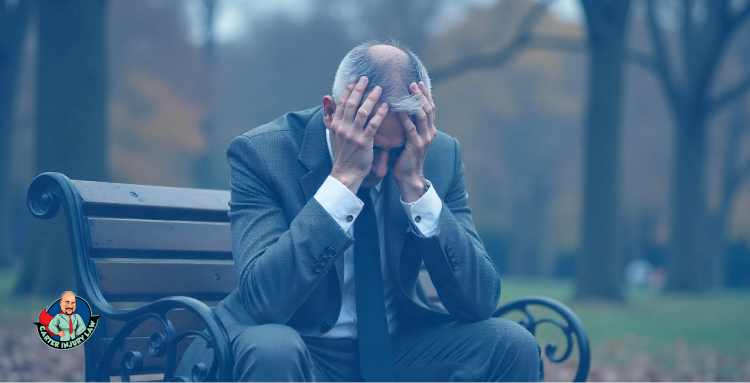
Now, let's talk about the other side of the coin—non-economic damages. These aren’t the types of damages that you can slap a price tag on, like a hospital bill or a car repair. Instead, these are intangible losses, but they still have a huge impact on your life. And while they’re harder to calculate, they are just as important as the economic damages we talked about earlier.
So, what kind of non-economic damages might you be entitled to?
Pain and Suffering
Pain and suffering is a well-known non-economic damage, covering both the physical pain and mental distress caused by an injury. If your injury leads to chronic pain or ongoing treatments, it can take a serious toll on your body and mind. This pain often lingers well after medical care, affecting everyday life—whether it’s back pain that makes sitting uncomfortable or a knee injury that limits your mobility. It’s the kind of pain you can’t see, but it’s very real.
Loss of Enjoyment of Life
Imagine this—before your injury, you were always the life of the party. You loved playing with your kids, running around at the park, or going out with friends. Now, maybe you can’t even enjoy the simple pleasures you once took for granted. That’s a huge emotional loss, and it’s something that the law recognizes as a real loss. You may be entitled to compensation for the activities you can no longer do, whether it’s sports, hobbies, or even spending time with your loved ones in the way you used to.
Emotional Distress
An injury doesn’t just affect your body—it impacts your emotions too. The stress of medical bills, anxiety from missing work, and frustration of losing activities you love can weigh heavily. Emotional distress is the toll of uncertainty and fear, leaving you feeling stuck in a situation that’s not your fault.
(3) How Florida’s Comparative Negligence Rule Affects Your Compensation
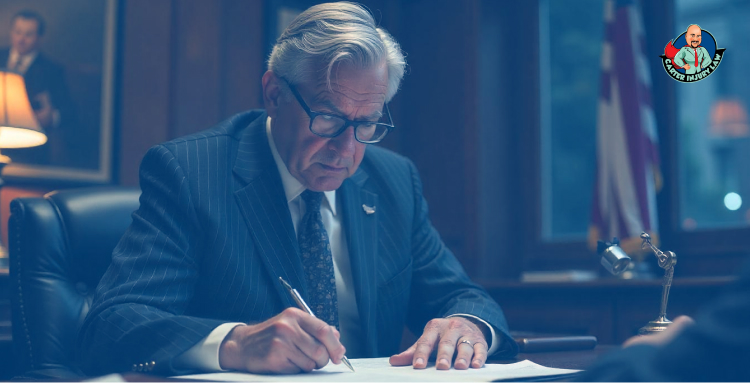
In Florida, the way your compensation is calculated doesn’t just depend on how badly you were injured—it also takes into account how much fault you share in the accident. This is where the comparative negligence rule comes into play. Simply, the comparative negligence rule means that if you're found to be partially at fault for the accident, the amount of compensation you’re awarded will be reduced by your percentage of fault.
For instance, let’s say you're awarded $100,000 by a jury after a car accident, but the jury finds that you were 20% responsible for the accident—maybe you were speeding just a little or didn’t notice a traffic signal change. In that case, your award will be reduced by 20%, which means instead of receiving the full $100,000, you’d only get $80,000.
I know, that might sound a little frustrating. But the good part is that the rule is designed to be fair. It's about making sure that everyone involved in an accident is held accountable for their actions, even if the accident wasn't entirely their fault.
Additionally, on lawsuits filed after March 24, 2023, there is a new rule in play called Florida’s modified comparative negligence 50% rule. If you, as the injured person, are found to be over 50% at fault for the incident or injury, a jury will be instructed to award you nothing. That’s right, zip zero zilch. That’s just another reason it is important not to talk to insurance companies or defendants after a loss and let an attorney start investigating right away. Although this new law is certainly unfair to injured people, it does not mean you do not have a case. It just means you need to have an experienced lawyer evaluate the case as soon as possible.
Carter Injury Law: How We Help Maximize Your Recovery
In Florida, you’re entitled to two key types of damages: economic and non-economic. However, navigating these claims, dealing with insurance companies, and ensuring everything is properly calculated can put in a lot of distress.
With Carter Injury Law on your side, we’ll make sure every dollar you're entitled to gets accounted for. We’ll work to ensure that your lost wages from missing work and any loss of earning capacity are fully recognized. Whether it’s negotiating with your insurance company or pushing for a fair settlement, we’re here to handle the details so you don’t have to. Plus, we'll make sure that your pain and suffering are fully considered when calculating your compensation.
If you or a loved one has been injured, don’t take the hurdles alone. Carter Injury Law offers no-cost, no-obligation consultation to explain your rights and options. Call us today to fight for the compensation you deserve.

Why Hiring a Lawyer Who Goes to Court Could Be the Best Decision After an Accident
If you’ve been in a car accident or suffered a personal injury, you might find yourself asking, “What sets one lawyer apart from another? Does it even matter?” It really does. The truth is, some lawyers shy away from the courtroom, avoiding the battle altogether. They take the easy road, chasing settlements that come quickly, not those that are just.
However, the fight for what you’re owed often demands something more: the courage to step into the arena, to face uncertainty head-on. It’s in that willingness to stand and fight where the real difference lies.
(1) The Importance of a Litigating Attorney
When it comes to personal injury cases, having an attorney who knows their way around the courtroom isn’t just helpful—it’s essential. Insurance companies aren’t in the business of handing out fair settlements unless they’re forced to take you seriously.
The reality is, until you file a lawsuit, the insurance company won’t look closely at your case. They won’t see the depth of your injuries or the weight of what you’ve endured. But the moment you serve that lawsuit, everything changes. The process begins—depositions, mediations, meetings with a judge. It compels them to confront the details, to reckon with what really happened and what it will take to set things right.
Without a lawyer willing to go to court, you're already at a disadvantage. You need someone who knows how to file a lawsuit and has the experience and resources to follow through. That’s how you make sure you’re not outmatched by the big insurance companies. In the end, it’s about evening the odds and ensuring you don’t settle for less than what you deserve.
(2) How the Court Process Works: What to Expect in Litigation

When people hear the word “lawsuit,” it can feel overwhelming, but the truth is, the process isn’t as intimidating as it seems when you have the right attorney by your side. At our firm, we break it all down for you, step by step, so you always know what’s happening and what to expect.
It starts with filing the lawsuit. That’s when we formally notify the person responsible for your injury, and it sends a simple, undeniable message to the insurance company: We’re not backing down until you get what you’re owed.
From there, the case moves into what’s called discovery. This is where the real work begins. We take depositions , where we sit down with the other parties involved and ask them detailed questions about the incident. You’ll also have the chance to tell your story in a deposition, and we’ll make sure you’re fully prepared for it.
Next, there are mediations. This is where both sides come together with a neutral mediator to see if we can reach a fair resolution before heading to trial. It’s not about backing down; it’s about exploring every opportunity to settle on your terms.
If the case still doesn’t resolve, we go to hearings with a judge, presenting evidence and arguing on your behalf.
Through it all, our purpose goes beyond simply fighting the case—it’s about making sure you’re truly seen, truly heard. Representation isn’t just a matter of process; it’s a matter of dignity. We’ve walked this path many times before, navigating the examinations, the arguments, and the relentless machinery of the courtroom. It’s a weight we carry so you don’t have to, leaving you free to focus on what matters most—piecing yourself back together.
(3) Why Some Lawyers Avoid Litigation and What It Means for You
Not all attorneys are built the same, and unfortunately, some avoid litigation entirely. They might tell you they’ll handle your case, but when things get tough—when the insurance company refuses to pay what’s fair—they’re quick to push for a settlement. Why? Because filing a lawsuit takes time, money, and experience, and not every lawyer is ready to make that commitment.
Some attorneys will even refer your case out to another firm once it’s clear that a lawsuit is necessary. The problem with that? They’re financially incentivized to settle before it ever gets to that point. That means they may accept a lowball offer just to avoid the effort of filing and litigating. If an attorney is more focused on their convenience than your compensation, they’re not the right one for you.
At our firm, we don’t take the easy way out. We believe your case is worth the effort, the time, and the fight it takes to seek what’s truly fair. Because if your lawyer isn’t ready to take that stand, can you really trust them to fight for you at all?
(4) What to Ask Your Lawyer Before Hiring Them
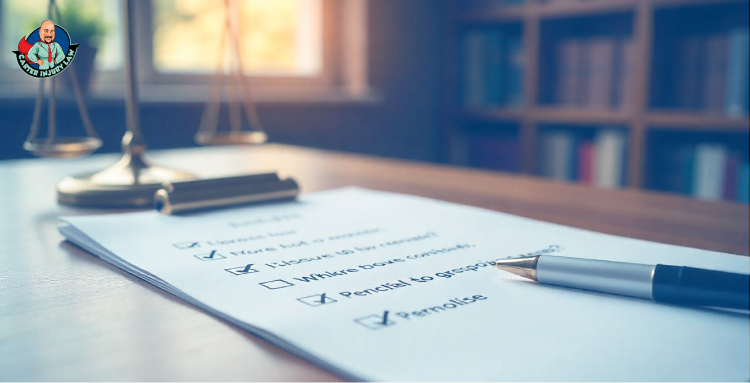
Choosing the right attorney after a car accident or personal injury can feel overwhelming, but there’s one question that can cut through the noise: “What happens if my case doesn’t settle? Will you take it to court?” The answer you get can tell you everything about whether this attorney is the right fit for you.
Don’t be afraid to ask specifics. “Do you file lawsuits? How often? What’s your strategy when the insurance company lowballs my claim?” Their answer will tell you everything you need to know about their readiness to fight for you. A confident attorney will explain their process—how they handle lawsuits, what steps they’ll take, and how they’ll stand up to big insurance companies on your behalf.
The bottom line? Don’t settle for vague promises or excuses. An attorney who’s serious about your case will have a clear answer and a plan to get you the compensation. At our firm, we’re upfront about our commitment to fight for you—whether that means settling your case or taking it all the way to court.
Don’t Wait – Carter Injury Law Will Fight for What You Deserve
The choice of a lawyer in your personal injury case isn’t a small thing—it’s everything. The right lawyer isn’t just your representative; they’re your voice when no one else will listen, the one who ensures your story is told and your rights are defended.
You deserve more than a compromise, more than silence. Don’t gamble with what’s ahead. Call us today for a free consultation. Let’s talk, face-to-face, about where you stand, where you could go, and how we’ll walk that road together.

How to Handle Out-of-State Car Insurance Claims in Florida Accidents
What do you do if you’re involved in a car accident in Florida, and either you or the other driver has out-of-state insurance? It’s a common scenario here—Florida is one of the most visited states in the country. With Disney World, Miami, the Everglades, and even some great football teams, people from all over come here every day. Unfortunately, that also means a lot of accidents involve drivers who aren’t from Florida.
When insurance policies from different states come into play, the rules can get complicated. And if you’re dealing with an out-of-state insurance company, the laws of the state where the policy was issued could completely change how your claim is handled. That’s why it’s so important to talk to a lawyer early on—these cases aren’t as straightforward as they might seem.
1) Understanding Out-of-State Insurance Claims
Dealing with an accident involving out-of-state insurance can get complicated quickly. Every state has its own insurance rules, and those don’t just go away because the accident happened in Florida. Whether it’s your policy or the other driver’s, out-of-state coverage often works differently than what we’re used to here.
Take PIP coverage, for example. Some states require much higher limits than Florida, while others don’t require PIP at all. That means how your medical bills get paid can vary a lot depending on where your policy was issued. And it’s not just about coverage—filing a claim with an out-of-state insurance company brings its own challenges, especially if they don’t operate much in Florida.
There’s also the issue of where to file your case. If the insurance company does business here, you might be able to keep the claim in Florida. But in some cases, you could end up in federal court or even dealing with the state where the policy originated. These jurisdictional hurdles can be frustrating and time-consuming without the right help.
2) What If the Other Driver Has Out-of-State Insurance?
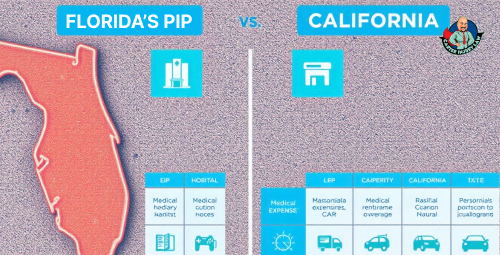
When the driver who hits you has out-of-state insurance, things can get even more complicated. In Florida, insurance companies are required by law to disclose how much coverage their policies provide. But not every state has those same rules. Some states, like Michigan, are non-disclosure states, which means the insurance company doesn’t have to tell us what the policy limits are.
This lack of transparency can make it harder to know what kind of compensation you’re dealing with. Sometimes, we might get a vague response over the phone, but even then, we won’t have a clear picture of how much coverage is available. That’s why identifying the other driver’s policy and limits as early as possible is so important.
3) Filing an Uninsured Motorist (UM) Claim
Florida has a big problem with uninsured drivers, which is why uninsured motorist (UM) coverage is so important. If you’re hit by someone who doesn’t have enough insurance—or no insurance at all—UM coverage can step in to cover your damages. But here’s the catch: UM claims are governed by the laws of the state where your policy was issued, not Florida.
For example, Florida gives you 5 years to file a UM claim, but many states have much shorter deadlines—some as little as two years. If you miss that deadline, you could lose your ability to recover anything under your UM policy. That’s why it’s crucial to know the statute of limitations in your policy’s home state and take action quickly.
4) Jurisdictional Challenges in Out-of-State Claims
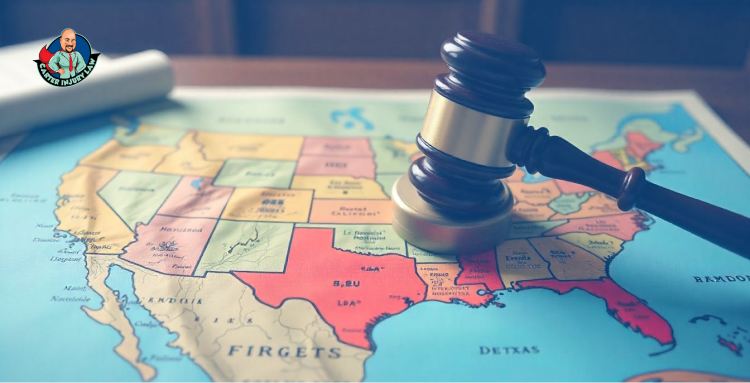
When it comes to filing a lawsuit for an accident involving out-of-state insurance, one of the biggest hurdles is deciding where to file your case. In some situations, you may be able to keep the case right here in Florida state court, especially if the insurance company does significant business in the state or if the other driver is a Florida resident.
But it’s not always that simple. If the other driver’s insurance company doesn’t do business in Florida, or if they’re headquartered in a state where they don’t have much presence here, you may have to file in federal court. In some cases, you could even end up needing to transfer the case to the state where the insurance policy was issued, adding a whole new layer of complexity to the process.
These jurisdictional issues are something you want to address from the get-go because they can significantly impact how your case progresses. Trying to navigate these challenges without legal experience could slow down your claim and make everything more complicated than it needs to be.
5) Why Starting Early is Critical
In cases involving out-of-state drivers and insurance, time is not on your side. The sooner you start, the better. First, you need to gather all the evidence—the details of the accident, medical records, and witness statements. The longer you wait, the harder it gets to track down witnesses or obtain vital documentation that can make or break your case.
Another time-sensitive issue is serving the defendant, especially when they’re from out of state. If the other driver goes back to their home state, tracking them down and serving them with legal papers can become a real challenge. But the earlier we get started, the sooner we can take action and secure compensation. Plus, it is less likely you are to miss important deadlines.
6) Carter Injury Law: Experience You Can Trust for Complex Cases
We’ve seen it all—the tangled mess of insurance claims, out-of-state companies playing games, laws contradicting each other, and uninsured drivers adding chaos to injury. It’s a maze, no doubt, but one we’re not afraid to navigate. Complexity doesn’t scare us; it fuels our resolve to fight for what’s rightfully yours.
When you come to us, it’s straightforward. No tricks, no hidden costs. We’ll sit down with you, talk it through, and evaluate your case—all without any obligation. You don’t owe us a dime unless we win. Life can feel heavy in moments like these, but you don’t have to carry it all alone. We’ll walk with you, step by step, clearing the path as we go.

How to Secure Personal Injury Compensation in Florida Expert Tips from Carter Injury Law
If you’ve been in an accident in Florida, you might be wondering how to secure compensation for your injuries. Well, first of all, Florida has some pretty unique laws when it comes to personal injury cases, especially involving car accidents. For starters, Florida is a no-fault state, which means that your own insurance is going to be the first to cover your medical bills, regardless of who’s at fault.
But there are a lot of nuances to these laws that can impact how much compensation you actually receive. So, let’s break it down and help you understand what you need to do if you’re injured and seeking compensation in Florida.
What Makes Florida’s No-Fault Laws Unique?
Let’s break down how no-fault insurance works in Florida. When you're involved in an accident, your own insurance company steps in first to cover your medical bills. Think of it as a safety net that ensures you're not left scrambling for immediate financial help.
There are some key details to understand. If your injuries are minor, your insurance will cover 80% of your medical expenses, but only up to $2,500. However, if you’ve been seriously injured and require more extensive medical treatment, your coverage can increase, with your insurance paying up to $10,000 for necessary care.
While this coverage helps with your medical bills, it does have limits. Keep in mind, no-fault insurance only applies to medical expenses—it won’t cover lost wages, pain and suffering, or other types of damages you might face after an accident.
By knowing these limits upfront, you can better prepare for the next steps, especially if your injuries go beyond what your insurance can cover.
How Does Fault Impact Your Compensation in Florida?
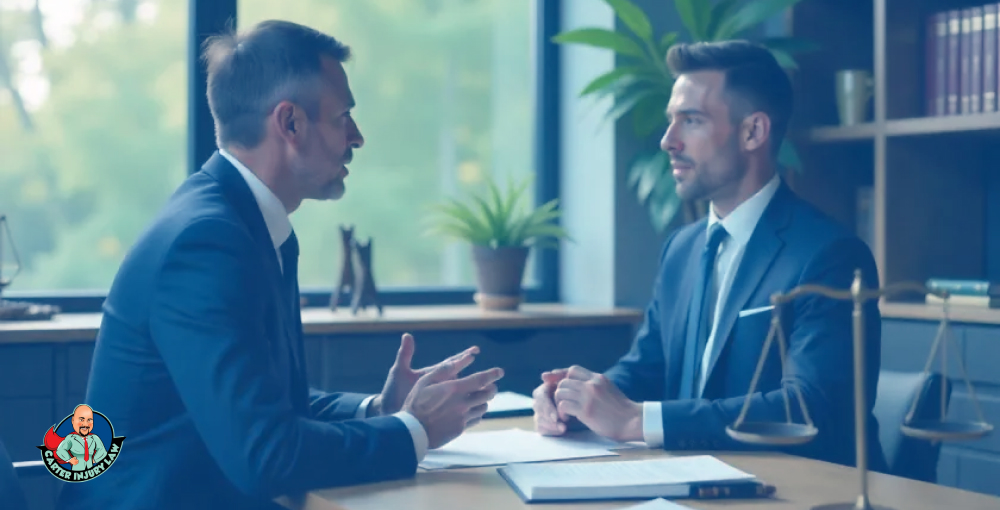
Now, let’s get into the more complex part. In Florida, determining who’s at fault for an accident is taken very seriously.As of march 2023, If the jury finds that you’re more than 50% responsible, you may not receive any compensation at all—yes, that means zero.
That’s why it’s crucial to document everything related to the accident. Take photos of the scene, gather witness statements, and keep a detailed record of your injuries. This will help build your case and show that the other driver was primarily at fault.
If the insurance company tries to place the blame on you, you need to be prepared to push back. That’s where we come in. We can assist you in collecting evidence and negotiating with the insurance company to ensure you get the fair compensation you deserve.
Why Early Documentation is Critical for Your Personal Injury Case

Okay, so you've been in an accident, and now you need to build a strong case to get the compensation. Let's break down what that means.
First, it's important to document everything you can about the accident. Take pictures of the scene, get witness statements, and keep track of your injuries. This will help prove your case and show that the other driver was mostly at fault.
Second, you need to gather medical records and bills to show the extent of your injuries and the treatment you've received. This can include doctor's notes, hospital bills, and any other medical documentation.
Third, if you can't work because of your injuries, you'll need to document your lost wages. This might include pay stubs, time cards, or a letter from your employer.
Finally, you might need to hire a private investigator to gather additional evidence, especially if the other driver is denying fault.
Remember, the stronger your case, the better your chances of getting fair compensation. So, don't be afraid to gather as much evidence as you can.
Don’t Miss Florida’s Personal Injury Statute of Limitations
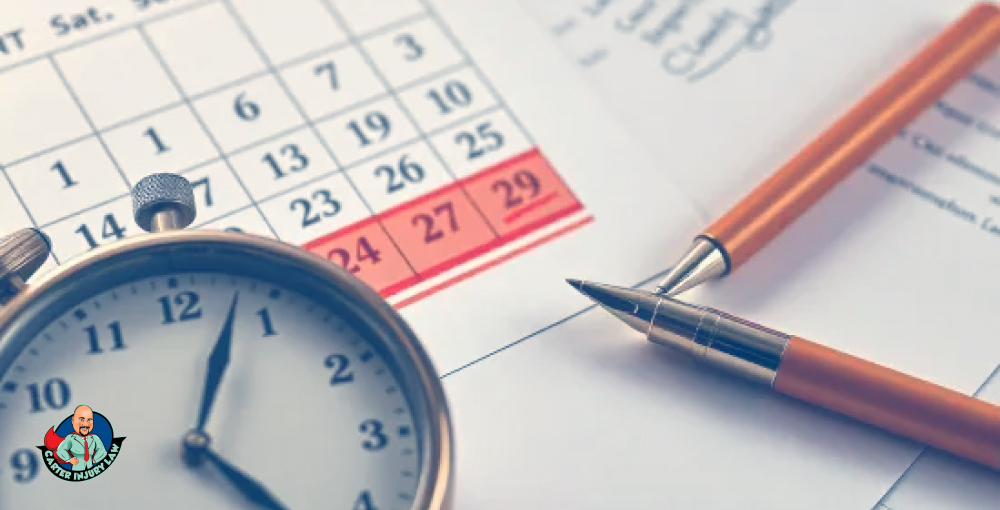
One critical aspect you need to be aware of is Florida’s statute of limitations. This refers to the legal time frame in which you can file a lawsuit after being injured. In Florida, that time limit is now set at two years. What this means is that you have exactly two years from the date of your injury to pursue legal action. If you fail to meet that deadline, even if your case is strong, the courts won’t hear it, and the insurance companies will likely reject your claim without question.
There are some exceptions to this rule, such as in wrongful death cases, but for most personal injury claims—including car accidents, slip-and-falls, or other types of injuries—the two-year statute of limitations applies. That’s why it’s so important not to wait too long to take action. The longer you wait, the harder it becomes to gather evidence, secure witness statements, and build a solid case. Acting quickly not only ensures you stay within the legal time frame, but also strengthens your chances of receiving the compensation.
How Carter Injury Law Supports You Through the Process
We know that your case is more than just paperwork — it's your life, and you're going through a lot. That’s why we’re here to take as much stress off of you as possible. We don’t just handle your case; we guide you every step of the way. From helping you gather the right documentation to dealing with the insurance companies, our goal is to make this process as smooth and stress-free as it can be for you.
We understand how overwhelming this can all feel, but you’re not alone. We’re here to fight for your rights and make sure you get the compensation. We also offer a free consultation. This means you can learn more about your case and our services without any obligation. We’re ready to help you navigate through this and get you the best possible outcome.
Get a Free Consultation with Carter Injury Law – No Fees Unless You Win

If you’ve been injured in Florida and you’re seeking compensation, don’t wait. Give us a call at Carter Injury Law today. We offer a free, confidential case evaluation, so there’s no risk in reaching out to see how we can help. And remember, you won’t pay a dime unless we win your case.
You’ve been through enough already — let us handle the legal side. Contact us today as there is no risk in calling us as everything is attorney client privilege.

What to Do After a Car Accident in Florida with Out of State Insurance
What do you do if you get into a car accident in Florida, but your insurance policy is from another state? This happens more than you think. Florida sees a ton of visitors from all over—whether it’s tourists, snowbirds, or people down here for work. A lot of people come in with insurance from places like Illinois, Michigan, or North Carolina.
When your policy isn’t from Florida, things can get complicated. That insurance policy is a contract between you and the insurance company, However, it’s governed by the laws of the state where it was issued and the statute of limitations will be different. That means the rules you’re used to—like how long you have to file a claim—might be completely different here. And if you don’t know those differences, you could miss out on benefits or even have your claim denied.
Why Out-of-State Insurance Policies Are Tricky
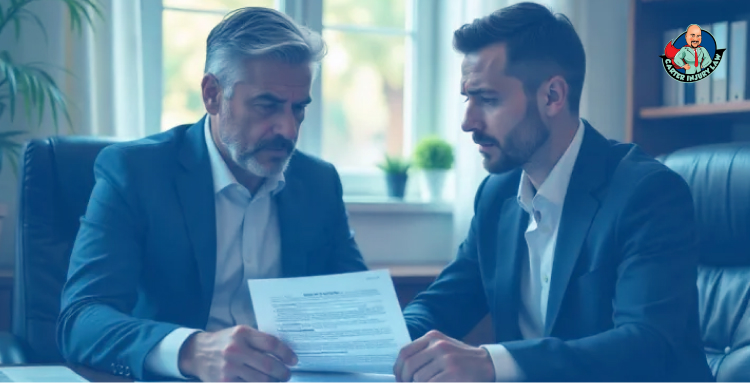
When you have an out-of-state insurance policy, remember it’s a legal contract governed by the laws of that state, not Florida’s. If you’re in an accident here, Florida rules won’t automatically falls well alligned with you due to the difference of the corresponding states.
This is where things can get confusing. For example, every state has its own statute of limitations—that’s the deadline for filing a claim. Some states might give you two years; others might give you four. But if you don’t follow the timeline set by the state where your policy was issued, you could lose your right to make a claim altogether. It’s not uncommon for people to assume they have time, only to find out later that their deadline has already passed.
That’s why having someone with the required legal knowledge on your side is crucial. An experienced attorney can help you understand what the policies are all about and ensure you meet all requirements so your valid claims will not be denied.
Insurance Company Questions: What to Expect
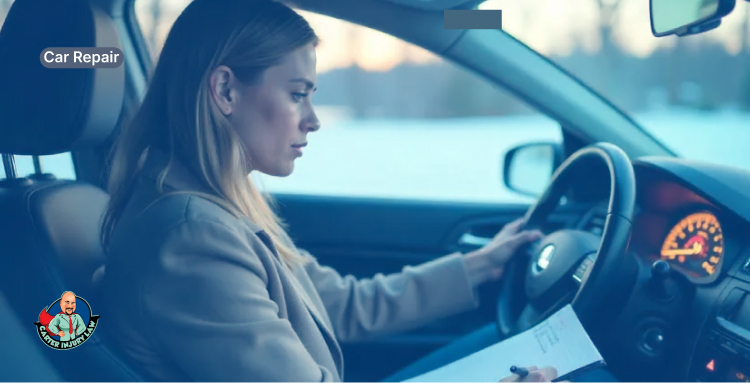
When you file a claim after an accident, the insurance adjuster is going to ask you a bunch of questions. At first, these might sound routine—almost like small talk—but make no mistake, they’re gathering information to figure out if they can deny your claim.
They might ask things like:
How long has your car been in Florida?
What was the purpose of your visit?
Were you just visiting or have you moved here?
Were you driving for Uber, Lyft, or another company when the accident happened?
Now, you might be thinking, Why does any of this matter? After all, you got hit, you’re hurt, and you just want your claim processed. But here’s the thing—these questions are designed to find loopholes in your policy.
For example, if you’ve had your car in Florida for an extended period but haven’t updated your insurance or registration, they might argue that your coverage is invalid because your policy is based in another state. If you were driving for a rideshare service or delivering for a company at the time of the accident, the adjuster might try to claim that your personal insurance doesn’t apply, forcing you to go through commercial insurance instead—which can complicate things even more.
This is exactly why having an attorney on the phone with you during these conversations is so important. We know what they’re trying to do, and we won’t let them twist your answers into something that works against you. We make sure that every question is answered in a way that protects your rights and gives you the best chance of getting the benefits.
Differences in Insurance Coverage: What to Watch Out For
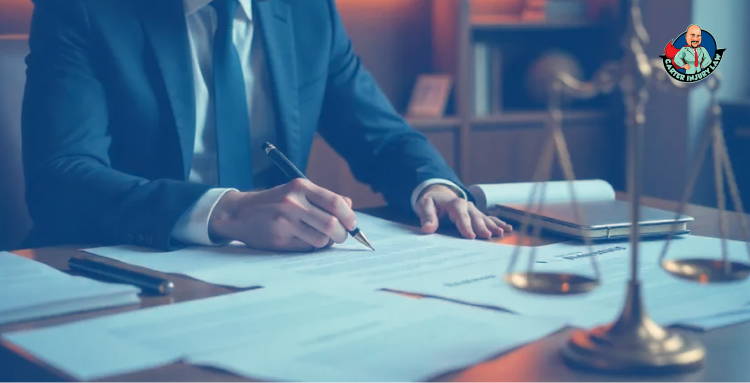
One of the biggest things to know is that not every insurance policy works like Florida’s. Florida has what’s called no-fault personal injury protection (PIP) coverage, which helps cover your medical bills, no matter who caused the accident. But not all states do things the same way. If your insurance is from a different state, it might not include PIP at all. Instead, some policies offer medical payments coverage (also called “MedPay”), which works differently.
MedPay policies are designed to cover your medical expenses up to a specified limit, however, they may only activate right after other insurance has been exhausted. In contrast, Personal Injury Protection (PIP) provides immediate coverage, making the claims process simpler. If you are unfamiliar with how your out-of-state policy operates, you risk incurring out-of-pocket costs for expenses that should be covered by your insurance.
Our team will identify any gaps in your policy and strategize the best ways to maximize your coverage. It’s easy to overlook critical details in the fine print, but that’s precisely why we are here—to ensure you receive the full benefits to which you are entitled and avoid being shortchanged.
How Carter Injury Law Helps You Navigate Out-of-State Claims
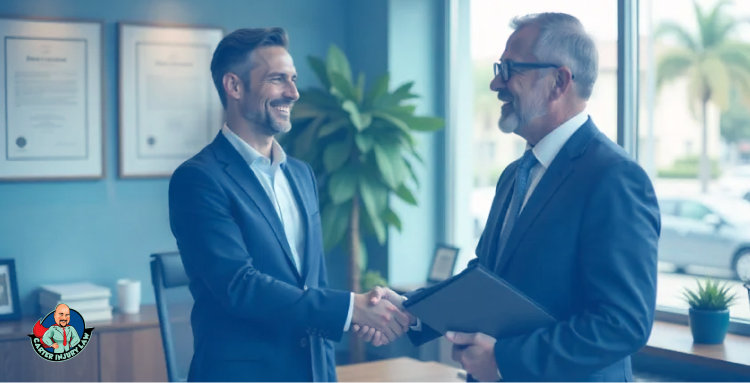
We’ve handled plenty of cases involving out-of-state insurance policies, so this isn’t something new for us—we know the process inside and out. Dealing with different state laws, unfamiliar policies, and adjusters who are trying to deny or delay your claim can certainly get overwhelming. That’s where we come to make the process as smooth as possible for you.
The reality is that out-of-state insurance companies often create complexities in the claims process. You shouldn’t have to worry about the fine print or figuring out which benefits you’re entitled to—we’ll take care of that. If your policy offers medical payments coverage instead of Florida’s no-fault PIP, we’ll explain how it works and ensure those benefits are applied the way they should be.
Our goal is to make sure you get everything you’re entitled to under your policy. We know how to push back when insurance companies try to cut corners or deny valid claims, and we’ll fight to get you the full benefits you deserve. With us in your corner, you can focus on recovering, and we’ll handle the rest.
No Fees Unless You Win
One thing I always tell people: there’s no reason to hesitate about giving us a call because we don’t charge anything upfront. When you’re dealing with an accident—especially in a situation where your insurance is from another state—the last thing you need is to worry about legal fees. That’s why we only get paid if we win your case. If we don’t recover anything for you, you owe us nothing. It’s that simple.
Carter Injury Law also covers all the costs that come with handling your case—things like paperwork, court filings, and expert consultations. You’re not paying out of pocket for any of that. All of the time and resources we put into your case? We front those costs because we believe in your claim, and we’re confident we can get you what you deserve.

How to Stay Calm with Insurance Adjusters After an Accident
A lot of people ask me, "David, how do I stay calm when dealing with an insurance adjuster after an accident?" It’s a totally valid question, and trust me, you’re not alone in feeling overwhelmed. After an accident, emotions run high, and suddenly, you're faced with a cold, calculated corporation that seems to care more about their bottom line than your well-being.
Navigating this process can be confusing, especially if you’ve never been through it before. That’s why I want to take a moment to share some insights on how to handle these situations with confidence. This post is all about helping you stay calm and informed when talking to insurance adjusters, so you can focus on what really matters—your recovery.
What You Should Know About Insurance Adjusters and Their Tactics
When you're dealing with an insurance adjuster, it's essential to understand their primary function: minimizing payouts for the insurance company. They’re not there to help you; their goal is to protect their employer’s interests. While it may seem like they’re on your side, asking questions and gathering information, their real aim is often to find ways to deny your claim or offer you the lowest settlement possible.
Insurance companies operate in a cold, calculated environment where the bottom line reigns supreme. When you reach out for assistance after an accident, you might find yourself treated as just another file in a stack, another case to be resolved quickly and cheaply. This corporate mindset affects how adjusters interact with you. They may come off as indifferent, pushing for quick answers instead of taking the time to understand your unique situation.
This is why having an attorney by your side is so crucial. We ensure that you're treated as an individual, not just another statistic in their profit-and-loss report.
The Importance of Legal Representation: Why Carter Injury Law is Your Best Ally After an Accident

So, why should you reach out to an attorney before speaking with an insurance adjuster? It’s simple: you have an obligation to understand your rights. After an accident, you might feel rushed to give statements or answer questions, but trust me, taking that step back is crucial. An attorney will help you navigate the complexities of the claims process and ensure that you’re fully aware of your rights and options before you engage with the adjuster.
When you become a part of our family, you can rest easy knowing that an experienced attorney will be with you during every conversation with insurance adjusters. We believe in a hands-on approach, which means we don’t just give you the tools and send you on your way—we actively participate in those discussions. You won’t have to worry about the intricacies of legal jargon or feeling pressured into making hasty decisions. We’re here to take that burden off your shoulders so you can concentrate on getting better.
Effective Strategies for Communicating with Adjusters: Let Carter Injury Law Show You the Way
Before you even pick up the phone to speak with an insurance adjuster, I want you to take a moment and breathe. It’s essential not to rush into these conversations, especially when emotions are running high. Accidents are traumatic experiences, and the last thing you need is to add unnecessary stress by feeling pressured to respond immediately.
Take a step back and give yourself some time to collect your thoughts. If you’re feeling devastated, reach out to your attorney first. We’re here to guide you through the process and help you formulate a plan. Remember, you have every right to pause and prepare before diving into a conversation that could impact your future.
When it’s time to talk to the adjuster, there are a few points to keep in mind to ensure you’re communicating effectively:
Provide Only the Necessary Facts: Stick to the basics. The adjuster doesn’t need to know every detail of your life story. Share only the information that is relevant to the claim. The more you say, the more opportunity there is for misinterpretation or manipulation.
Treat the Conversation Like a Business Transaction: This isn’t a friendly chat; it’s a business negotiation. Approach it with a professional mindset. Keep the tone formal and focused. This helps you maintain control over the conversation and reinforces the importance of your claim.
Avoid Personal Emotions; Focus on Your Rights: It’s natural to feel emotional after an accident, but try not to let those feelings drive your conversation. Adjusters may use emotional appeals to sway you, so it’s crucial to stay grounded. Focus on what you know about your rights and the compensation you need. Remember, you have the right to advocate for yourself, and an experienced attorney can help ensure those rights are respected.
The Risk of Accepting Low Settlements: Don’t Leave Money on the Table

A. Explanation of Tactics Used by Adjusters
One tactic that many insurance companies, including Progressive, use is what I call the “swoop in” approach. After an accident, you might receive a call from an adjuster offering you a quick settlement. It might sound tempting—after all, who doesn’t want to resolve things quickly? But let me tell you, this is a red flag. They’re swooping in while you’re still reeling from the accident, trying to get you to sign off on a settlement before you even have a chance to fully understand the extent of your injuries or your claim.
This approach is designed to catch you off guard and make you feel like you’re getting a good deal. In reality, it’s a tactic to minimize their costs. They’re hoping you’ll be so eager to put this behind you that you’ll accept whatever amount they throw at you, even if it’s far less than what you truly deserve.
B. Consequences of Signing Early Settlements
Signing an early settlement can have serious consequences. Once you accept that offer and sign on the dotted line, you’re essentially closing the door on any future claims related to that accident. This means you could miss out on fair compensation for your injuries, medical expenses, lost wages, and even pain and suffering.
Many people don’t realize how their injuries can evolve over time. You might feel fine right now, but what happens when that pain resurfaces weeks or months down the line? Accepting a low settlement too soon could leave you financially strapped when you discover that your injuries require ongoing treatment or when you can’t work due to your condition.
The Personal Touch of Carter Injury Law: Your Advocate in Difficult Times

When you choose Carter Injury Law, you’re not just hiring an attorney; you’re gaining a partner who genuinely cares about your situation. Unlike big insurance companies that see you as just another number, we recognize you as an individual with unique needs and challenges. That personal touch is what sets us apart.
Think of us as your sports agent. Just like a superstar athlete wouldn’t negotiate their own contract, you shouldn’t have to tackle the complexities of dealing with insurance adjusters alone. Our team steps in to advocate for you, negotiating terms and handling tough conversations to ensure your best interests are represented.
As your attorney, we wholeheartedly commit to fighting for the compensation you deserve while you focus on your recovery. With our knowledge of the legal system and effective negotiation skills, you can relax, knowing we’re in your corner, pushing for the best possible outcome on your behalf.
Contact Carter Injury Law for Your Free Case Evaluation Today
In closing, I want to reiterate just how crucial it is to have an attorney by your side after an accident. Legal representation isn’t just about navigating the complexities of insurance claims; it’s about relieving the stress that comes with it.
Don’t hesitate to reach out. If you’re feeling uncertain about how to proceed, I encourage you to contact our law firm for a free case evaluation. It’s completely risk-free; we don’t charge any fees unless we win your case. Let us take the burden off your shoulders and guide you through this process with the care and attention you deserve. You don’t have to go through this alone—call us today, and let’s get started on your path to recovery.

How to Avoid Common Pitfalls in the Car Accident Claims Process in Florida
When you're involved in a car accident, it’s easy to make mistakes that can really hurt your claim. We see it happen all the time—people wait too long to act, skip medical care, or try to handle everything on their own. These pitfalls can cost you the compensation you deserve. But the good news is, most of these mistakes are avoidable if you know what to do.
In this post, we’re going to walk you through the most common pitfalls we see in Florida car accident claims and, more importantly, how to avoid them. Whether you’re just getting started with your claim or you’ve already run into a few of these issues, we’re here to help.
1. Missing the Statute of Limitations: Why Acting Quickly Is Crucial
One of the biggest mistakes people make after a car accident is waiting too long to take legal action. In Florida, the statute of limitations for filing a personal injury claim is two years. That might sound like plenty of time, but it goes by fast—especially if you’re busy dealing with injuries, car repairs, or figuring out insurance. If you let those two years pass, your case is barred, meaning the court won’t even hear it. You lose your chance to get any compensation, no matter how serious your injuries are.
We see this happen all the time. People call us three, four, even six years after their accident and say, “Hey, I’ve been in pain all these years, but now I’m ready to do something about it.” Unfortunately, there’s nothing we can do at that point—it’s simply too late. It’s frustrating for them and for us because we want to help, but the law is clear. Once the deadline passes, you can’t reopen the case or get any compensation, no matter how strong your claim might have been.
What to do instead:
The key takeaway here is to act quickly. The sooner you start the process, the better off you’ll be. Even if you're not sure about filing a lawsuit, it's important to begin so you can keep your right to do so later. Waiting until the last minute—or missing the deadline entirely—is one of the most common mistakes we see, and it’s easily avoidable.
If you’ve been injured, don’t hesitate to reach out to us now. We’re here to help protect your rights and ensure you don’t miss any important opportunities. Time is important, and taking action now can make a significant difference in your case.
2. Delaying Medical Treatment: The Risks of Waiting Too Long for Care
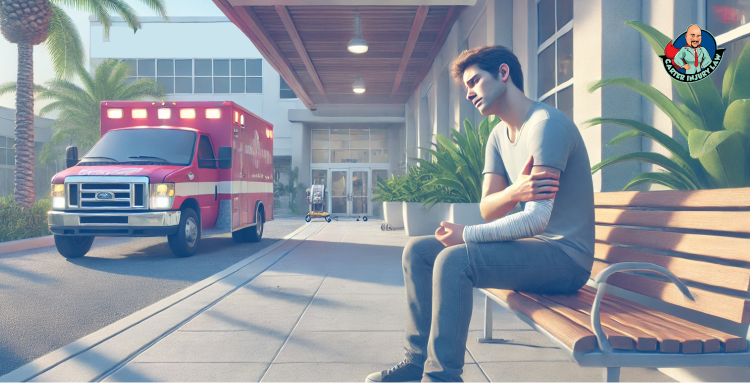
Another common mistake people make after a car accident is waiting too long to see a doctor. If you’re injured, you need to get checked out right away—don’t wait days, weeks, or months. The longer you wait, the easier it is for the insurance company to argue that your injuries aren’t as serious as you say, or even that the accident didn’t cause them at all. They’ll use any gap in your medical care to low-ball your claim and pay you way less than you deserve.
We’ve seen it happen plenty of times. Someone feels sore or in pain after an accident but thinks, “It’ll go away on its own.” Then, months later, when the pain gets worse and they finally see a doctor, the insurance company turns it against them. They’ll say, “If you were really hurt, you would’ve seen a doctor right away.” And just like that, your case gets devalued.
What to do instead:
If you’re in pain, go see a doctor. It doesn’t matter if you go to the hospital, urgent care, your primary care physician, or even a chiropractor—just make sure you get treated by someone who knows what they’re doing. What’s most important is that you document everything. When you see the doctor, tell them exactly what hurts and how the accident happened. Don’t leave anything out, even if you think it’s minor—those small details could matter later.
3. Not Hiring an Attorney: Why Going It Alone Can Cost You
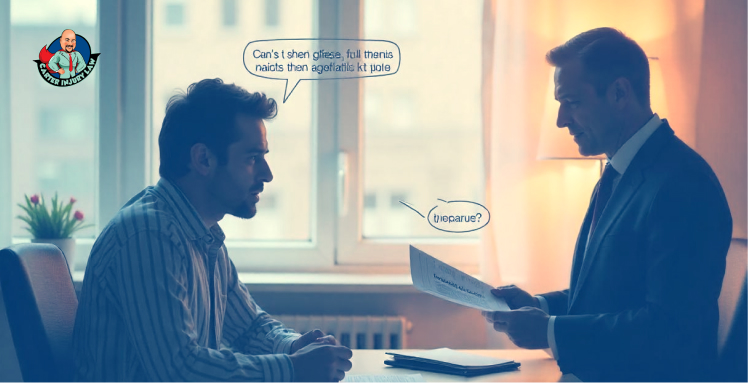
A big mistake we see people make is trying to handle their car accident claim on their own. They think they can deal with the insurance company directly and everything will work out fine—but that’s rarely the case. The truth is, insurance companies are not in the business of paying out fair settlements. Their goal is to save their company money, not take care of you. And the adjusters? They might seem friendly, but they’re trained to limit what you get paid.
When people try to go through the process without a lawyer, they often run into trouble. They miss important details, run into legal loopholes, or deal with doctors who won’t support their case. Then, by the time they come to us, we take one look and think, “Man, this could’ve been handled so much better.” Sometimes, there’s only so much we can fix because mistakes were made early on. That’s why we always say, “Never go it alone.”
How Carter Injury Law Protects Your Rights:
We know what loopholes the insurance company will try to use, and we’ve dealt with adjusters and doctors who aren’t sympathetic to accident victims. Having someone on your side who understands the ins and outs of these claims can make all the difference. There’s a lot more to it than just filling out paperwork—you need to know how to protect your rights at every step.
The best part? There’s no risk to you. We work on contingency fees, which means you don’t pay us anything unless we win your case. So there’s no reason not to hire an attorney. You get the legal support you need without any upfront cost. We’re here to make sure your case is handled the right way from start to finish—because if you try to do it on your own, the insurance company will take advantage of that every time.
4. Talking to the Insurance Company Without Legal Guidance
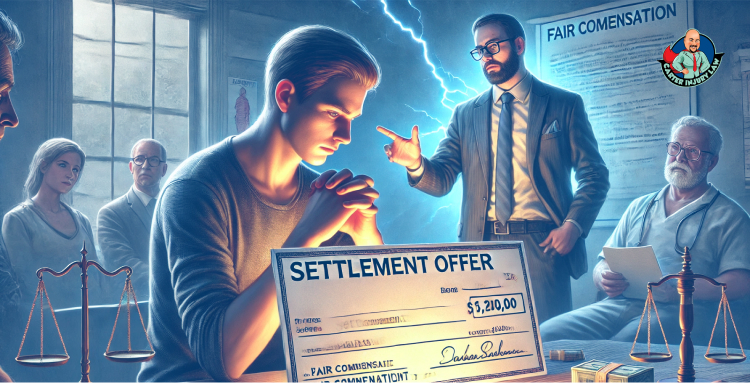
One of the biggest mistakes you can make after an accident is talking to the insurance company without having an attorney by your side. People think they’re just sharing what happened, but every word you say can come back to hurt your case. Adjusters are trained to gather information in ways that benefit the insurance company, not you. Even if you’re being honest and cooperative, they can twist your words or take things out of context to downplay your injuries and lower your payout.
Adjusters ask seemingly harmless questions like, “How are you feeling today?” If you respond with, “I’m doing okay,” they’ll use that to argue that you weren’t seriously injured. Or they’ll throw in questions that don’t even matter, hoping you’ll say something inconsistent that they can use to challenge your claim later on. It’s like the old saying: “Anything you say can and will be used against you”—except here, it’s the insurance company that’s listening.
How Carter Injury Law Protects Your Rights:
We know exactly how to handle these conversations. We coach you on what to say so you don’t accidentally hurt your case, and we block questions that aren’t relevant or that could trip you up. Sometimes, we can even take over communication entirely so you don’t have to deal with the adjuster at all.
The bottom line is, without an attorney, it’s easy to say the wrong thing or give them information they’ll twist to pay you less. But when you have us in your corner, we protect you from their tactics and make sure nothing gets said that could harm your case down the road.
5. Don’t Fall for the First Settlement Offer
One of the biggest traps we see people fall into is accepting the first settlement offer the insurance company throws their way. It’s important to understand that the first offer is almost never the best offer. Insurance companies are trying to close the case as quickly and cheaply as possible. They know that the longer a claim stays open, the more likely it is that the injured person will discover the full extent of their injuries—and that could mean a bigger payout for them.
So, what do they do? They swoop in with a lowball offer right after the accident, hoping you’ll take it before you realize just how injured you are. It sounds tempting—especially when you’re stressed, dealing with medical bills, and just want everything to be over. But If you accept that early offer, you release your claim. Once you sign off, you can’t go back and ask for more compensation—even if you find out later that your injuries are worse than you thought.
We’ve seen it time and time again. Someone takes a quick settlement for a few thousand dollars, thinking it’ll cover everything. Then, a few months later, the pain gets worse, or a new injury shows up, and suddenly they’re facing expensive treatments or surgeries. But by that point, it’s too late. The claim has already been settled, and there’s no way to reopen it. The insurance company has what they wanted—a closed case—and you’re left footing the bill for the care you really needed.
How Carter Injury Law Protects Your Rights:
This is why it’s so important to consult with an attorney before accepting any settlement offer. We know what your case is actually worth and can negotiate a fair settlement that reflects the true extent of your injuries, lost wages, and future medical expenses. An early settlement might feel like a quick solution, but it’s usually not in your best interest. We’ll make sure you don’t get shortchanged and that the compensation you receive covers everything—both now and in the future.
If you have any questions or think you may have fallen into one of these traps, don’t hesitate to reach out. Call us today for a free, confidential consultation. We’re here to help you navigate this challenging time and ensure you get the support you need to move forward. Your rights matter, and we’re ready to fight for them.

Meet David Carter A Personal Approach to Injury Law
If you’re here, chances are you or someone you care about has been injured. First and foremost, I want to say that I hope you’re okay, that you’re safe, and that you’re surrounded by people who care about you. Whatever happened, you’re not alone—and you’ve come to the right place.
At Carter Injury Law, we know how overwhelming things can feel after an accident. You’ve probably got a lot of questions, and we’re here to help you find the answers. Our firm isn’t just about handling cases—we’re about supporting people.
From Local Roots to a Life in Law
I was born in St. Petersburg and raised in Tampa, Florida. This community has shaped who I am, and I’ve spent my career giving back to the people here. My journey in law started early—as a fifth-generation attorney, I knew from a young age that I wanted to be in the courtroom, fighting for justice.
After graduating from Jesuit High School in Tampa, I earned a Bright Futures Scholarship to attend the University of Florida, where I graduated from their Honors Program. I later went on to earn my law degree from the Florida State University College of Law, graduating with honors.
My passion has always been about standing up for people—especially when they’re up against powerful insurance companies and corporate interests. That’s what led me to the personal injury field.
From Big Firms to Carter Injury Law: Putting Clients First
I began my legal career at a large personal injury firm, where I gained invaluable experience helping clients achieve the results they truly deserved. It was rewarding work, but deep down, I felt something was missing. I longed for a connection that went beyond simply handling cases; I wanted to forge genuine relationships with my clients and truly understand their struggles.
That’s why I made the heartfelt decision to join a boutique firm, where I could focus on building meaningful relationships with the people I represented. Yet, after a while, I found myself drawn back to the larger firm. It didn’t take long for me to realize how much I missed treating clients like family, rather than just numbers in a system.
This longing for connection led me to start Carter Injury Law. My goal was clear: to create a law firm that puts people first—a warm, welcoming place where clients feel heard, respected, and genuinely cared for.
Carter Injury Law’s Services: We’re Here to Help
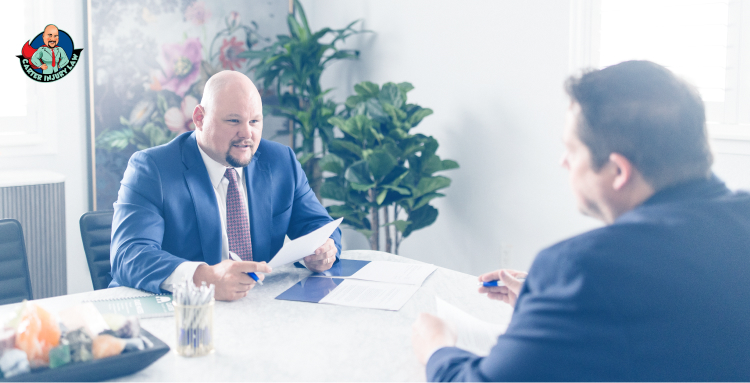
At Carter Injury Law, we handle a wide range of personal injury cases. If you’ve been injured, we can help you with:
Car Accidents: We’re Here to Get You the Compensation
Getting into a car accident is overwhelming—whether it’s a fender bender or something more serious. Maybe you were hit by a distracted driver or got hurt while riding in an Uber or Lyft. No matter the situation, accidents happen fast, and suddenly, you’re left dealing with injuries, insurance claims, medical bills, and repair costs.
We’ve seen it all. We know how the insurance companies operate and the tactics they use to avoid paying claims. Whether it’s arguing over fault or offering you a lowball settlement, they’ll try everything to pay as little as possible. Our job is to make sure that doesn’t happen.
Slip and Fall Injuries: We Hold Negligent Parties Accountable
A slip and fall can happen when you least expect it—maybe you’re shopping at the grocery store, walking through a parking lot, or visiting someone’s home. One moment everything feels normal, and the next, you’re on the ground in pain, trying to figure out what just happened. It might seem like “just an accident,” but many times these falls happen because someone didn’t take care of their property the way they should have—whether that’s failing to clean up a spill, leaving a dangerous surface unmarked, or not fixing a hazard that was obvious to them.
If someone else’s negligence caused your injury, we’ll make sure they’re held accountable. We know how these cases work, and we won’t let the insurance companies brush your case aside or try to offer a quick, unfair settlement. We’ll gather the evidence, talk to the witnesses, and make sure your story is heard.
Medical Malpractice Cases: When a Healthcare Provider’s Mistake Changes Your Life

When we go to a doctor, nurse, or hospital, we put our trust in them. We assume they’ll do what’s right, follow the proper procedures, and help us heal. But sometimes, things go wrong. A misdiagnosis, a surgical mistake, a medication error, or even a negligence can turn what should have been a path to recovery into a life-changing ordeal. When a medical professional’s error leaves you worse off, it feels like a betrayal—and it’s not just about the physical injury. It’s about the emotional, financial, and mental distress it takes on you and your family.
At Carter Injury Law, we know how overwhelming it is to navigate life after a medical mistake. You’re dealing with more doctor visits, hospital bills, lose of probable wages, and the frustration of not knowing who to hold accountable. On top of that, healthcare providers and their insurance companies don’t make it easy. They’ll have teams of lawyers working to protect them, often claiming, “These things happen” or “We followed the standard of care.” Our job is to push back against that narrative.
We’ve been through this process before, and we know how to investigate medical malpractice cases thoroughly. We’ll dig into the details—review medical records, consult with experts, and gather the evidence needed to prove that the healthcare provider’s negligence caused your injury. Our goal is to make sure you get the right amount of compensation you need for medical costs, future care as well as the pain and agony you’ve endured.
Workplace Injuries: Protecting Your Health, Wages, and Future
Getting injured on the job can throw your whole life off track. It’s not just about dealing with the pain—it’s about figuring out how to cover medical bills, missing work and losing wages, and worrying about how your injury might impact your future. Whether you work on a construction site, in a warehouse, or in a corporate office, accidents can happen anywhere. Maybe you slipped on a wet floor, were hurt by faulty equipment, or were involved in a heavy machinery accident. No matter the situation, if you were injured while doing your job, you have rights—and we’ll make sure you get what you’re entitled to.
We’ll handle the paperwork, deal with the insurance companies, and make sure your claim is properly filed so you don’t miss out on any benefits. If your employer or their insurance provider tries to deny or reduce your claim, we’ll fight back. Beyond just medical bills, we’ll make sure you’re compensated for lost wages, future income loss, pain and suffering, and any other damages.
We understand that each case is unique and personal. you’re not just a client—you’re a person with a story. That’s why we offer a free, confidential case evaluation. Whether you’re ready to move forward with a claim or just have some questions, we’re here to help. There’s no pressure and no obligation—just a conversation to explore your options.
The Carter Injury Law Difference: Open Communication & Support
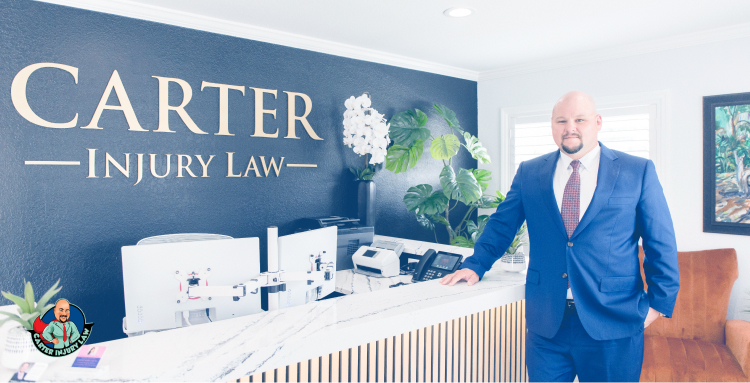
When you work with us, you’ll never feel like just another case in a pile. We’re all about modern connections and open communication, which is why I share my personal cell phone number with anyone who wants it. Need to talk? Reach out anytime—I’m just a text or call away.
At Carter Injury Law, you’re not just a file or a number—you’re important to us. We know how challenging it can be to go through something like this, and we’re here to walk with you through every step of the process.
How to Contact Carter Injury Law: We’re Here for You Anytime
If you or a loved one has been injured, don’t hesitate to reach out to us. We’re here to answer your questions, provide guidance, and help you secure personal injury compensation.
You can call us at 813-922-0228, send us an email, or fill out the form on our website. We understand how important your case is, and we’ll get back to you as soon as possible. To us, you’re not just another case—you’re family.

What Does Full Coverage Mean in Florida? Understanding the Misconception
Have you ever felt the sinking feeling in your stomach after a car accident? The fear, the confusion, and the worry about insurance coverage can be enormous. Many of us assume that "full coverage" means we're completely protected, but the truth is often far more complex.
In Florida, the term "full coverage" can be misleading. It doesn't necessarily provide the comprehensive protection you might think. Understanding what full coverage actually means and how it can impact your financial situation is pivotal.
The Misleading Term—What Is "Full Coverage"?
Let’s set the record straight—“full coverage” is kind of a misnomer. There’s really no such thing as full coverage, at least not in the way most people think. What one person considers full coverage could mean something completely different to someone else.
For instance, if you’re worth $100, you probably don’t need the same level of coverage as someone worth $100 million. It’s all relative. To truly be "fully covered," that person with $100 million would need a ton of insurance, likely in the millions, to feel secure. Meanwhile, someone with less might feel fully covered with a much smaller policy.
The bottom line is, there's no insurance that covers everything. What you really need depends on your financial situation, the risks you're willing to take, and what you're looking to protect. So when you hear “full coverage,” don’t take it at face value—there’s always more to it.
Florida's Mandatory Minimum Coverage
In Florida, the term "full coverage" can technically be applied if someone has the bare minimum insurance required by law. But don’t be fooled—just because someone meets these requirements doesn’t mean they’re fully protected.
Here’s what Florida law mandates: you need $10,000 in Personal Injury Protection (PIP) and $10,000 in Property Damage coverage. That’s it. If you’ve got these two boxes checked, you can say you have “full coverage”—but is that really enough?
Not even close. PIP will only cover some of your medical bills, lost wages, or maybe even mileage to get to doctor appointments. And the property damage? Well, that’s just for damages to someone else’s car. So if you’re involved in an accident and someone tells you, “Don’t worry, I’ve got full coverage,” don’t relax just yet. These minimums aren’t going to cover everything—and certainly not enough if serious injuries or significant damage come into play.
What Does "Full Coverage" Really Include?
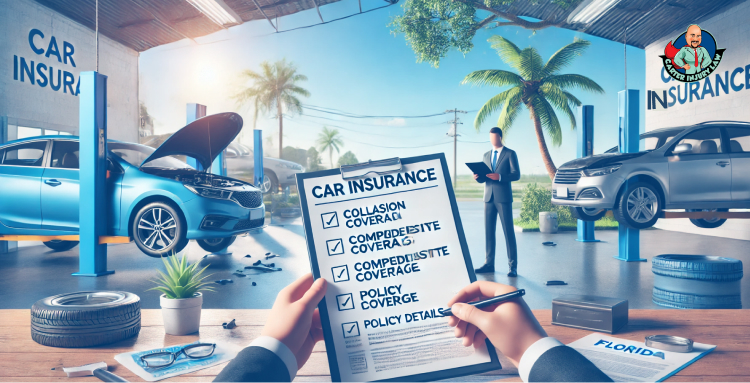
So, what does it mean to be truly “fully covered”? Well, it goes way beyond just the minimums. If you want real peace of mind on the road, you need to look at a few other types of coverage that protect you in different situations.
First up, there’s Collision Coverage. This one’s very important because it pays for damages to your car, no matter who’s at fault in an accident. Whether you rear-end someone or get hit by a distracted driver, collision coverage makes sure you’re not stuck paying for repairs out of pocket.
Then there’s Comprehensive Coverage. This handles those random events that aren’t accident-related. Think about a tree falling on your car during a storm or someone vandalizing your vehicle. If you don’t have comprehensive coverage, you’re covering those costs yourself.
Next, we have Bodily Injury Coverage. This is important because it protects others if you’re the one at fault in an accident. If you cause injuries to someone else, bodily injury coverage helps pay for their medical bills and other expenses, so you're not personally on the hook for those costs.
Don’t forget about Uninsured Motorist Coverage. Unfortunately, not everyone on the road has the proper insurance—or enough of it. If you get hit by someone without coverage or with too little insurance, uninsured motorist coverage steps in to protect you. It ensures that you’re not left paying for damages or injuries caused by someone else’s lack of responsibility.
You might also want to think about Rental Coverage. If your car needs repairs after an accident, rental coverage makes sure you can get a rental car while yours is in the shop. It’s a small thing, but it makes life a lot easier when you’re not scrambling for a ride.
Finally, there’s the Umbrella Policy. This is extra protection that goes beyond your bodily injury limits. So if you’re facing a serious claim where the damages exceed your policy’s limit, the umbrella policy can cover the excess.
So, when someone says they have “full coverage,” I have a lot more questions. True full coverage means having a mix of all these types of insurance to cover you in any scenario—accidents, storms, vandalism, and more. Anything less, and you're leaving yourself exposed.
Why "Full Coverage" Doesn’t Tell You Everything & What Can You Do About It?
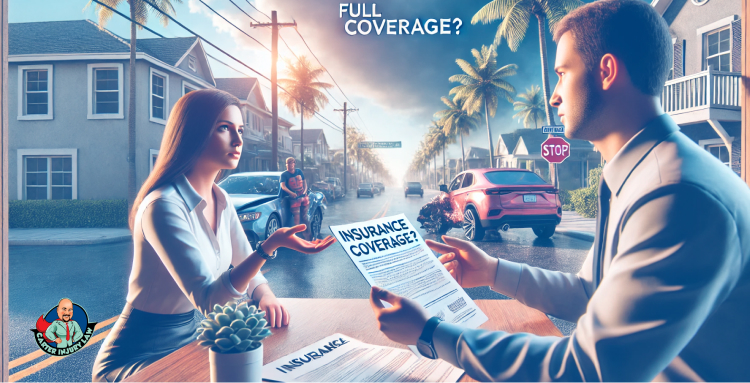
Here’s the thing—when someone says, “I have full coverage,” it doesn’t really tell you much at all. Sure, they might have the basic requirements, but that doesn’t mean they’re fully protected or that you’re covered in the event of an accident.
First off, just hearing "full coverage" doesn’t explain what types of insurance they actually have. They could have the bare minimum, like the $10,000 in PIP and $10,000 in property damage, and still claim they have full coverage. But what about bodily injury coverage? What about uninsured motorist coverage? Those are the real game-changers, and if they’re missing, you could be left high and dry.
So, what can you do to prevent this:
One thing you can do is take a look at their insurance card. Sometimes, you’ll see boxes checked off, and if there’s a check next to "bodily injury coverage," that's a good sign. It means they have some level of coverage to protect you if they’re at fault. But here's the catch: just because a box is checked doesn’t always mean you’re in the clear. The only way to know for sure is to verify the policy.
This brings us to a critical step—always involve the police at the scene of an accident. I can’t stress this enough. Having the police document the incident ensures that everything is on record. When the police get involved, they can verify the insurance details, so you’re not relying on the other person’s word alone. Why is this important? Because, unfortunately, people sometimes hand over fake insurance cards at the scene. If you don't call the police, you might end up with nothing when you try to file a claim.
So, while "full coverage" might sound reassuring, don’t take it at face value. Without seeing the actual policy or getting verification from the police, it’s just words.
Want to learn more? Here are some related posts:
(I) Protecting Your Rights After a Multi-Car Collision: Tips from a Florida Attorney
(II) Staying Calm with Insurance Adjusters After an Accident
How Carter Injury Law Helps You Understand Insurance After an Accident
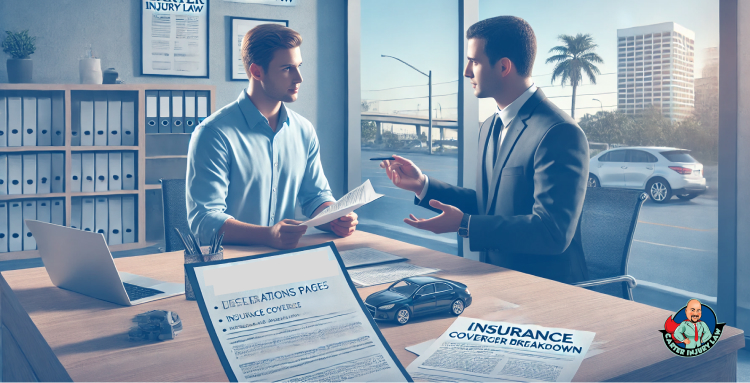
After an accident, understanding what insurance coverage you or the other party has can be overwhelming. That’s where we step in to take the guesswork out of the process and make sure you know exactly where you stand.
Once you hire us, we don’t waste any time. The first thing we do is send a letter to both insurance companies—yours and the other party’s—asking for a copy of the insurance policy and their declarations. Under Florida law, they have to give us that information. What we’re looking for here is a complete breakdown of all the coverages, so we know exactly what kind of protection is in place.
⇓
This is important because the insurance card alone won’t give you the full picture. What we need to see are the declarations pages, which tell us what types of coverage are included and how much coverage is available. We look at everything—PIP, property damage, bodily injury, uninsured motorist, you name it. These documents will tell us what’s real and what’s just talk when it comes to "full coverage."
⇓
Once we have those details, we’ll show you what coverages you have and what coverages the other party has. And if there’s anything missing, like uninsured motorist or bodily injury coverage, we’ll explain what that means for your case.
⇓
But we don’t stop there. We also look at your policy to make sure you’re not missing any critical protections. If we spot gaps in your coverage, we’ll let you know and walk you through options for what you might want to add in the future. We’re not just here to handle the aftermath of an accident—we want to make sure you’re protected moving forward, too.
Need Answers? Don’t Guess—Call Us Today
If you’re feeling unsure about your insurance coverage—or the other person’s—don’t try to figure it all out on your own. Don’t guess, call us. We’ll get the real answers by reviewing the policies and explaining exactly what coverage is available.
We offer a free, confidential case evaluation, so you’ve got nothing to lose by reaching out. And here’s the best part—you don’t pay us a dollar unless we win your case. It’s that simple.

Who Covers Your Car Repairs After an Accident in Florida?
Who’s responsible for fixing your car after an accident in Florida? That’s a question we hear all the time, and it makes sense. After all, if you’ve been in an accident, your car’s damaged, and naturally, you want to know how to get it fixed—and you’re entitled to that.
When it comes to repairs, you’ve got two main options to consider. You could go through your own insurance, or you could file with the at-fault driver’s insurance. Each choice has its own pros and cons, and we’re here to walk you through them. By the end, you’ll know which option might be best for your situation, so you can get back on the road with peace of mind.
Option 1: Filing a Claim Through Your Own Insurance Company
When it comes to getting your car repaired after an accident, the simplest and fastest route is often through your own insurance—if you have collision coverage.
What You Need to Know About Collision Coverage
Collision coverage is what allows you to file a claim for your car’s damages, no matter who’s at fault in the accident. It’s direct, it’s efficient, and it saves you from the extra wait time that often comes with using the other driver’s insurance.
How Deductibles Work When Filing Through Your Own Insurance
If you decide to go this route, be aware that a deductible will apply. A deductible is the portion you pay out of pocket before the insurance coverage kicks in. Deductibles vary by policy, commonly falling between $250, $500, or even up to $2,000. The choice of deductible impacts your payout as well as your premiums.
For instance, if your car is valued at $30,000 and your deductible is $1,000, the insurance company covers $29,000, with you paying the remaining $1,000. This setup keeps you covered but also shares a bit of the cost to control premiums.
The Advantages of Using Your Own Insurance for Repairs
Since you’re filing with your own insurance company, they don’t need to investigate who was at fault before they move forward with repairs or a payout. That’s what makes this option quicker; there’s no need to wait for the other driver’s insurance to respond, verify details, or complete their liability assessment. Your insurance company can get the ball rolling immediately.
Another advantage is that collision coverage protects you regardless of who’s responsible for the accident. It’s there to take care of your car’s damage, so you don’t have to worry about getting tied up in fault disputes to get back on the road.
Option 2: Filing a Claim Through the At-Fault Driver’s Insurance
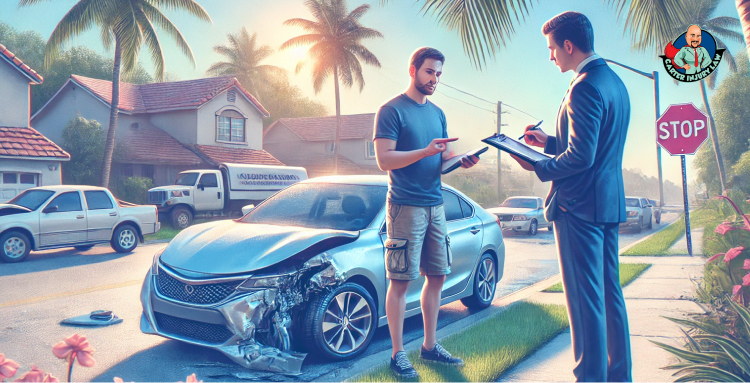
If the other driver was at fault for the accident, you have the option to go through their insurance to cover your repairs. This approach has its advantages, but it also comes with some added waiting time and a bit of patience.
Why Filing Through the Other Driver’s Insurance Can Save You Money
One big perk here is that, unlike filing through your own insurance, you won’t have to pay a deductible. The at-fault driver’s insurance covers the repair costs, so your out-of-pocket expense is zero, assuming everything is confirmed and processed by their insurance company. This can be helpful if you’d rather avoid dipping into savings just to get your car fixed.
Rental Car Coverage: What to Expect When Repairs Are Underway
Another benefit is that if you go through the other driver’s insurance and they have adequate coverage, they should also cover a rental car for you while yours is being repaired. This rental coverage doesn’t come with any extra charge to you and can be a huge relief, especially if you rely on your car for daily commutes, errands, or family needs. Keep in mind, though, that this depends on their policy limits and their insurance company’s guidelines on rental car length.
Potential Drawbacks of Relying on the Other Driver’s Insurance
While going through the other person’s insurance means no deductible and the potential for a rental car, it’s not always the fastest way to get repairs underway. Their insurance company will need to investigate the accident, which can take time.
They’ll likely want to confirm who was at fault and may require additional information, like statements from their driver or a copy of the police report. If everything’s straightforward and there’s a police report showing clear fault, the process might speed up, but without that, delays are common.
Working with the other driver’s insurance company on your own can sometimes feel like a bit of a minefield. Without an attorney by your side, their insurance company may ask you detailed questions about the accident, your injuries, or other aspects of the incident that you’re better off not discussing.
These conversations can be tricky since most of the insurance company’s goal is to minimize their payout. When we handle cases, we make it clear that our clients aren’t to discuss their injuries, medical treatments, or how the accident happened beyond the car repair details. This protects you from giving statements that could complicate or even weaken your claim.
(I) Your Right to Choose a Body Shop and What to Consider
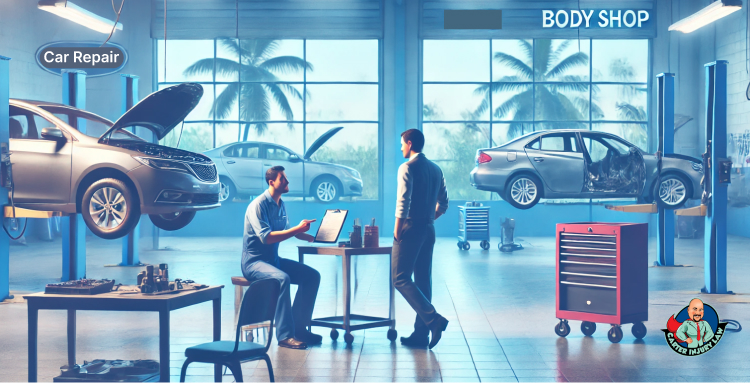
One thing many people don’t realize after an accident is that they have a choice in where their car gets repaired. Whether you’re filing through your own insurance or the other driver’s, you’re entitled to pick the body shop that you trust most to do the work. This decision can make a big difference in how comfortable you feel about the repair process and, ultimately, the quality of the results.
Choosing a body shop that you know, like, and trust can bring a sense of peace within. If you’ve got a favorite shop where you feel confident about the workmanship, going that route can be reassuring. You’re the one who will drive the car once repairs are complete, so having control over the repair quality matters.
But keep in mind that when you choose your own shop, you’ll need to work within the time limits that insurance companies usually place on rental car coverage. If your chosen shop takes longer than anticipated, the insurance company might not cover those extra rental days.
(II) Should You Use the Insurance Company’s Preferred Shop?
If you go with a shop of your choice, you’re in control of who does the repairs, which often translates to higher trust in the quality. This option is perfect if you already have a go-to shop or just want to ensure your car is fixed by a team you’re comfortable with.
On the other hand, if you’re okay with using a body shop that the insurance company recommends, there can be a few extra perks. Insurance companies often have partnerships with certain shops, and if the shop takes longer than expected, they might cover extra rental days without hesitation.
Essentially, if the insurance company’s chosen shop runs behind, they’ll be more likely to extend your rental period to match. Just remember that while you may get a bit of flexibility on rental time, this isn’t the shop you chose, so make sure you feel comfortable with the arrangement before moving forward.
(III) Understanding Florida’s Property Damage Minimum and Its Limits
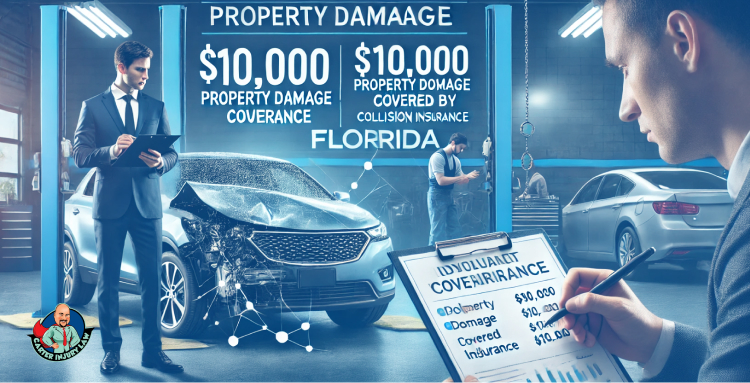
In Florida, the minimum requirement for property damage coverage is $10,000. For minor fender-benders, that might be enough, but consider what happens if you’re driving a high-value vehicle or the damage costs run higher.
Even with their insurance paying up to the limit, you could still be left holding the bag for repairs that go beyond that $10,000. In cases like this, your collision coverage bridges the gap, giving you a space of comfort that your costs are covered regardless of the other driver’s insurance limitations.
For example, you’re hit by someone whose insurance maxes out at $10,000 for property damage. If your repair estimate comes in at $25,000, their insurance company will pay up to $10,000, and the rest – $15,000 – would typically be your responsibility. With collision coverage though, you’re safeguarded.
Instead of bearing the full brunt of those extra repair costs, your collision insurance covers the balance (minus your deductible), ensuring you’re not left in financial hardship due to someone else’s lack of coverage.
Need Help with Your Claim? Contact Carter Injury Law Today
If you’re dealing with property damage after a car accident in Florida or just have questions about how the insurance companies are handling your claim, don’t hesitate to reach out. You can call us anytime for a free, confidential case evaluation. It’s completely risk-free—there are no fees unless we win your case. We’re here to walk you through all your options, answer your questions, and make sure you get the guidance you need. Contact us today, and let’s work on getting the compensation that’s rightfully yours.

Why Local Tampa Attorney is Vital for Winning Your Personal Injury Case
When you’re facing a personal injury case, having a local attorney on your side makes a world of difference. Here in Tampa, our team at Carter Injury Law doesn’t just work in this community—we’re part of it. That means we’ve built a reputation we’re proud of, and every case we take on reflects our commitment to doing right by our clients, our neighbors, and our city.
Hiring a local attorney isn’t just about legal knowledge; it’s about knowing the people, the streets, and the system that’s specific to Tampa. Our team is here to make sure you feel supported, informed, and confident at every step of your case because, at the end of the day, your success matters to us just as much as our reputation.
1) Why It Matters to Hire a Local Attorney
When you’re hiring an attorney, especially for something as personal as an injury case, reputation is everything. Here in Tampa, reputation isn’t just a word—it’s a reflection of how we treat our clients and our community every single day. I understand that when someone chooses Carter Injury Law, they’re putting their trust in me to handle their case with care and integrity.
That’s why I take it personally to make sure every client has the best possible experience. It’s not just about winning cases; it’s about the kind of attorney my clients can confidently recommend to their family and friends.
Staying Connected with Clients: Why Communication Matters
In this city, word travels fast. People know each other, and they talk. If I didn’t follow through, if I didn’t keep my clients updated, or if I didn’t handle their case with the attention it deserves, that would impact not only my reputation but also the level of trust people have in local attorneys.
That’s why I make it a priority to stay connected, to communicate openly, and to make sure my clients know they’re in good hands. When a client feels like they’re left in the dark, that’s when trust breaks down—and that’s not something I’m willing to risk.
The Value of Local Trust: A Reputation That Speaks for Itself
Choosing a local attorney means choosing someone who’s deeply invested in the community and who will go the extra mile to protect that reputation. In a close-knit community like Tampa, my reputation means everything, and I want every client to feel confident they made the right choice.
I know that if I do a good job, my clients won’t just leave with a successful outcome; they’ll leave with a reason to say, “Yes, that’s someone I’d trust with my case.” At Carter Injury Law, that’s exactly the experience I’m here to provide.
2) Local Knowledge of Investigators and Medical Experts
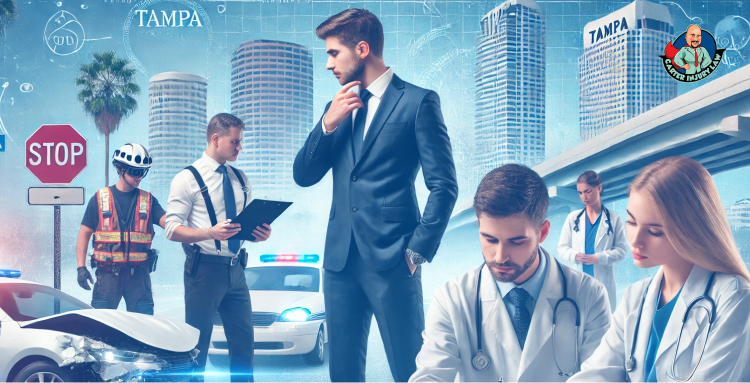
When it comes to personal injury cases, having a team of trusted professionals behind you can be a real asset. That’s why, as a local Tampa attorney, I work with investigators and medical experts who know exactly what it takes to build a winning case. I’m not just hiring any investigator or doctor off a list; I’m calling on people I know, professionals I trust to do the job right because they’re part of this community too.
Trusted Investigators: Knowledge You Can Count On
In Tampa, I work with investigators who know this area like the back of their hands. These are people who can walk onto an accident scene and know exactly where to look, what to document, and how to gather the evidence that can make or break a case.
Tampa has its unique challenges, from busy streets to local business setups, and my investigators know how to work within that landscape. When they’re on the case, they’re not just gathering information—they’re preserving the details that could be the difference between proving your claim or losing vital ground.
Experienced Doctors and Medical Experts
Beyond investigators, one of the biggest assets for a personal injury case is having the right doctors on your side. Over the years, I’ve worked with doctors who are not only great at what they do but are also willing to go the distance for their patients, including showing up in court if needed.
In Tampa, I have the insider knowledge of which doctors can be relied upon to provide clear and honest testimony that supports your case, and I’m also aware of those who may lean more toward aiding insurance companies than their patients. We know the physicians who prioritize your care and those who are primarily there to assist the insurance companies.
3) A Strong Network within the Tampa Legal Community
When you hire a local attorney, you’re not just hiring someone with knowledge of the law; you’re hiring someone with deep connections in the local legal community. Over years of practicing in Tampa, I’ve built a network of relationships with other attorneys—relationships that can make a significant difference when it comes to negotiating your case and crafting a strategy tailored to your situation.
An Inside Advantage: Knowing the Defense Attorneys
In Tampa’s legal circles, knowing who you’re up against can be a huge advantage. I’ve stood across the table from many of the defense attorneys in this area, so I know the ones who approach cases fairly and the ones who may try to complicate the process.
I know which attorneys are skilled negotiators and which ones may try to sidestep a fair settlement. These insights help me anticipate how a case will go, allowing me to adjust strategies to stay one step ahead, whether that means pushing harder in negotiations or preparing for a trial.
Respect and Rapport with Opposing Counsel
We’ve built a rapport with local attorneys over years of working together, so we know who we can trust and who will play fair. This understanding goes both ways too—when opposing attorneys know I’m on the case, they know that I’m not interested in games or shortcuts. That mutual respect helps us focus on what really matters: getting a fair result for you.
Local Connections for Stronger Case Support
Beyond opposing counsel, being part of this legal community means I’m plugged into a network of professionals who understand the unique aspects of practicing in Tampa. From connecting with experts and judges to knowing the courthouse inside and out, my community connections reinforce every aspect of your case.
4) Familiarity with Tampa’s Courthouse and Judges
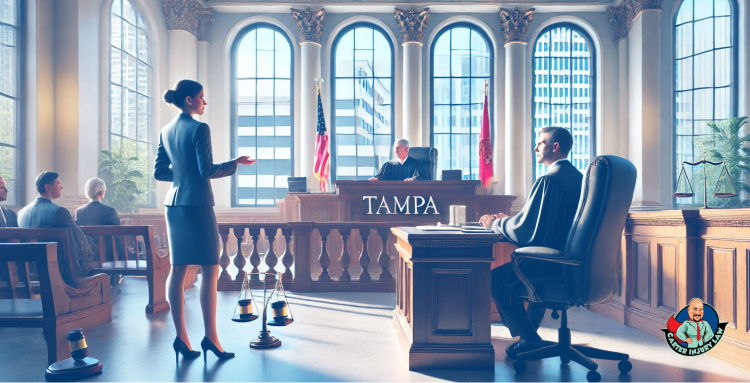
One of the most overlooked advantages of hiring a local attorney is the insight they have into the local court system and the specific judges handling cases. I’ve spent years working in Tampa’s courtrooms, and that experience gives me a unique understanding of how to present each case for the best possible outcome.
Every courthouse has its own rhythm, and Tampa’s is no different—knowing how things work behind those doors can make all the difference when it comes to fighting for your rights.
Understanding Judge Preferences and Courtroom Expectations
Each judge here has their own preferences, standards, and expectations, and that’s something you don’t learn from a law book or by practicing in another city. Some judges are detail-oriented and expect everything to be laid out with precision; others appreciate a more straightforward, concise approach.
Having worked with these judges on many cases, we know how to present your case in a way that resonates in the Tampa courtroom. That familiarity lets us prepare each step strategically, from the initial filing to how we handle evidence and testimony in court.
Strategic Preparation for Every Court Appearance
For you as a client, this experience means we’re prepared to guide your case through Tampa’s legal system, avoiding unnecessary delays and maximizing every opportunity to strengthen your claim. Whether it’s adapting our presentation style to suit a particular judge’s approach or anticipating specific questions they’re likely to ask, I tailor every detail of your case to match the environment we’re working in.
The Advantage of Local Insight and Experience
With a local attorney, you’re getting more than just legal representation—you’re getting someone who knows Tampa’s legal landscape intimately, who’s been through its courtrooms countless times, and who knows how to navigate it all with skill and strategy. It’s that insight and experience that allow us to advocate for you effectively, giving your case the strongest possible foundation in a Tampa court.
5) Commitment to Serving the Tampa Community
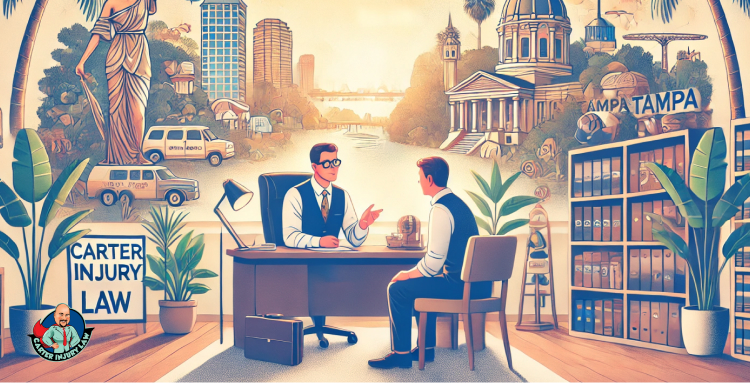
Carter Injury Law isn’t just a law firm in Tampa; we’re woven into the fabric of the Tampa community. From the beginning, our mission has been to stand by our neighbors when they need it most. We know that a personal injury doesn’t just affect your health—it impacts your entire life, from your job to your family.
Support from Day One: Free Consultations and Contingency Basis
When you come to us with a case, you can expect to feel supported from day one. We start with a free consultation because we believe everyone should have access to quality legal advice, regardless of their financial situation. Our team will walk you through the details, answer your questions, and make sure you feel informed and empowered to take the next steps.
We work entirely on a contingency basis, which means that if you don’t win, we don’t get paid. That’s how committed we are to your success. We’re proud to serve Tampa, offering free consultations and working on a contingency basis because your success is our priority.
A Responsibility to Our Tampa Community
This isn’t just a job for us—it’s a responsibility to our community. Being a local firm, we understand the challenges Tampa residents face and the importance of having an attorney who genuinely cares. We’re here to create a positive impact, not just in the courtroom but in the lives of the people who make this city great. Whether you’re dealing with a car accident, a slip and fall, or any other injury, know that Carter Injury Law is here to help you move forward with confidence every step of the way.
Carter Injury Law: Your Community, Your Advocates
Choosing the right attorney after an injury isn’t just about finding someone with legal expertise; it’s about finding someone who truly understands the community you belong to. A local attorney brings insight, connections, and a commitment to representing you with integrity. At Carter Injury Law, we know the people, the streets, the doctors, and the legal network of Tampa—and we use that knowledge to fight for the best outcomes for our clients every day.
When you’re ready to work with an attorney who understands your community, reach out to Carter Injury Law. Schedule a free consultation with us, and let’s talk about how we can put our local knowledge and dedication to work for you.

Multi Car Collision in Florida Who’s at Fault & What You Should Do Next
Have you ever found yourself stuck in traffic on a busy Florida road, only to see a multi-car collision unfold right in front of you? It’s a situation that happens far too often in our state. Understanding the common causes of these accidents and how negligence is determined can help you navigate the aftermath if you find yourself in such a predicament.
In Florida, multi-car collisions usually occur when one driver suddenly slams on their brakes, setting off a domino effect of rear-end collisions. You may be wondering, “How do we figure out who’s at fault in these scenarios?” Well, that’s exactly what we’re here to discuss. From maintaining a safe following distance to knowing what to do after an accident, we’ll break it all down so you can stay informed and prepared.
(I) Common Reasons Multi-Car Collisions Happen
A. Rear-End Collisions: How a Simple Brake Can Trigger a Chain Reaction
One of the most common causes of multi-car collisions in Florida is rear-end accidents. Suppose a driver in front of you suddenly slams on their brakes—maybe they’ve just spotted a red light or a hazard on the road. That split-second decision can create a chain reaction. The car behind them, caught off guard, rear-ends that vehicle. Then the next car in line hits the car behind them, and so on. It’s like a row of dominoes falling one after another.
This scenario highlights how quickly a single action can escalate into a major accident involving multiple vehicles. When you’re driving, it’s not just about being aware of what’s in front of you; it’s also about anticipating what could happen behind you. That’s why understanding this chain reaction is crucial. If you’re not maintaining a safe distance, you might find yourself not just involved in the collision but also contributing to a much larger problem.
B. The Following Distance Rule
Now, let’s talk about the importance of maintaining that safe following distance. Following too closely can be a recipe for disaster, especially in heavy traffic. The general rule of thumb is to keep one car length for every 10 miles per hour you’re traveling. So, if you’re cruising along at 70 miles per hour, you should ideally be keeping a distance of about seven car lengths between you and the vehicle ahead.
This spacing isn’t just a suggestion; it’s a safety measure designed to give you enough time to react if the car in front of you suddenly stops. If you’re too close, you won’t have enough time to hit the brakes and avoid a collision. By maintaining that safe distance, you’re not only protecting yourself but also reducing the risk of causing a multi-car pile-up. Remember, driving is not just about following the speed limit; it’s also about ensuring that you have enough room to stop safely in any situation.
(II) How to Determine Who’s Negligent in Multi-Car Collisions
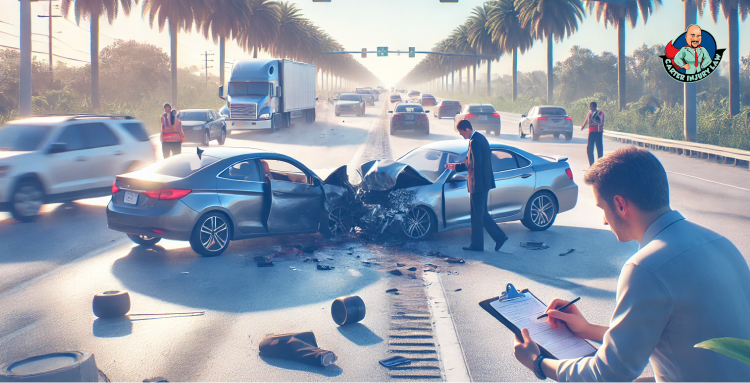
A. Who’s Most at Fault? A Clear Look at Liability in Car Accidents
When it comes to figuring out who’s at fault in a multi-car collision, liability generally falls on the driver who initiated the chain reaction. In most cases, this is the driver who rear-ended the car in front of them. However, the situation can get a bit murky, especially in cases where you find yourself caught in the middle. Imagine you're driving along, and suddenly, a car slams into you from behind, propelling you into the vehicle in front of you. In this scenario, you might feel responsible for the damage to the front car, but that's not necessarily the case.
Typically, the middle car—the one that gets pushed forward—won’t have much responsibility for the accident. The primary liability will rest with the driver who caused the initial impact. That said, there are situations where the middle driver might bear some responsibility, especially if they were following too closely. But remember, your strongest case for compensation will often be against the driver at the back who didn’t maintain a safe distance.
B. The Role of Insurance Companies
Now, let’s talk about the role of insurance companies in these situations. After an accident, you can expect the insurance companies to dive in and start investigating who’s at fault. They may come up with some arguments that try to shift blame away from their insured party, especially if that party is the rear driver. For example, they might argue that the driver in the back had to stop suddenly due to the negligent actions of the middle car. But this line of reasoning often overlooks an important point: every driver is responsible for maintaining a safe following distance.
Understanding this principle is crucial when dealing with insurance companies. If the back driver couldn’t stop in time, they likely weren’t following the safe distance rule. That’s why it’s so important to be able to articulate the facts clearly and emphasize safe following distances when discussing liability.
(III) What to Do After a Multi-Car Collision
A. Document Everything
Make sure to document everything about the scene. After an accident, emotions can run high, and it’s easy to forget important details. Start by collecting names and contact information from any witnesses. These individuals can provide critical insights about the incident, especially if there are conflicting accounts later on.
Additionally, taking photos is one of the best things you can do. Snap pictures of the accident scene, the vehicles involved, and any visible damages. Capture different angles and any relevant road signs or conditions. This visual evidence can paint a clearer picture of what transpired and can be instrumental when discussing liability later on. Trust me; this documentation can make all the difference in your case.
B. Speak with an Attorney First
If you find yourself involved in a multi-car collision, one of the most important steps you can take is to speak with an attorney before engaging with any insurance companies. Why is this so crucial? Well, insurance companies are in the business of minimizing payouts, and they often use your statements against you. By consulting an attorney first, you’re not just protecting your rights; you’re ensuring that you have someone on your side who understands the complexities of these cases.
An experienced attorney can help investigate the accident, gathering crucial information that may be overlooked in the initial moments after the crash. They know the right questions to ask, which can clarify details that are essential for your case. This guidance is invaluable because it sets a solid foundation for understanding what happened and who should be held accountable.
C. Provide Accurate Information
Finally, when you do speak about the accident—whether it’s with an attorney, insurance company, or law enforcement—be sure to communicate clearly and calmly about the nature of the collision. Provide accurate details about what happened, but don’t volunteer unnecessary information. Your words can have significant consequences, so it’s vital to be precise and truthful. For instance, if you felt multiple impacts during the crash, make sure to specify that.
This kind of clarity is essential, especially when determining fault. The more accurately you can describe the events leading up to and during the collision, the better equipped your attorney will be to advocate for your rights. Remember, every detail matters, and your goal should be to build a strong case that supports your claim.
IV. Legal and Financial Consequences: What Costs Should You Expect?
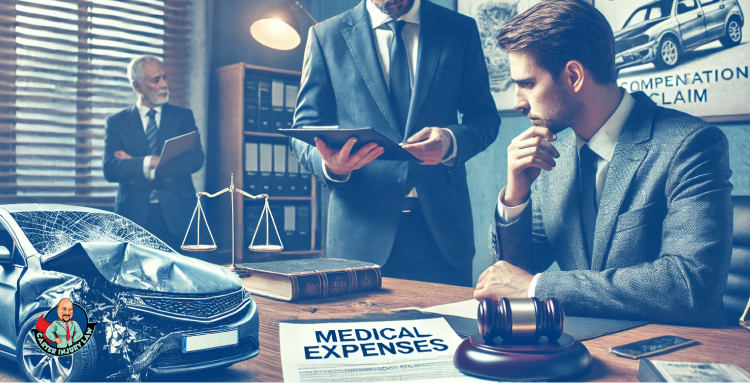
Multi-car collisions can have serious legal and financial repercussions for everyone involved. The first thing to consider is the potential costs that can pile up quickly after an accident. Medical bills can be staggering, especially if you’ve sustained injuries that require ongoing treatment. From emergency room visits to physical therapy sessions, the expenses can accumulate, leaving you feeling empty.
But it’s not just about the immediate medical costs. You may also face lost wages if your injuries prevent you from working. The pain and suffering you endure don’t come with a price tag, but they can significantly impact your quality of life. It’s essential to recognize that these factors will play a critical role in your overall compensation claim.
Identifying who is responsible for these costs is crucial. If the other driver was at fault, you might be entitled to compensation for your medical expenses, lost wages, and even the emotional distress caused by the accident. However, if liability is unclear or contested, it can complicate matters. That’s why it’s vital to gather as much evidence as possible and to have an experienced attorney on your side to navigate these complexities.
Get Your Free, Confidential Case Evaluation Today
We offer a free, confidential case evaluation, allowing you to discuss the details of your situation without any pressure. Your conversation with us is protected by attorney-client privilege, which means that anything you share is kept strictly confidential. This isn’t like talking to an insurance company; we’re here to listen to your concerns and advocate for your best interests.
Don’t wait until it’s too late. If you have questions about your case, how to prove fault, or what compensation you might be entitled to, reach out to us today. We’ll help you make sense of the complexities surrounding your accident and ensure you get the justice you deserve. Call us now for the support you need to move forward confidently.

How to File a Claim After Being Hit by an Uninsured Driver In Florida
Florida is one of the top states where uninsured motorists are most likely to strike. That is partially because the State of Florida does not mandate bodily injury coverage. Statistics show that about 26.7% of people on the roads in Florida are driving without having bodily injury coverage or any auto insurance at all, according to an Insurance Research Council. That means that more than 1 in every 5 drivers driving along with you are doing so without insurance. What happens if you get hit by one of those uninsured drivers? What should you do to protect your rights and claim for damage? In Florida, those uninsured or underinsured drivers can create considerable difficulties for people seeking compensation for their injuries and damages.
So, if an uninsured driver has hit you in Florida, there are certain steps you want to take to make sure that you do the best job you can to preserve the claim.
5 Steps To Take After Getting Hit by Uninsured or Underinsured Driver
Step 1. Call the Police and Document It
The first and foremost step you need to take is to call the police. Calling 911 is the best course of action after every accident and the best way to document it. For reference, a hit-and-run driver is called a “phantom vehicle,” which counts as an uninsured motorist under any uninsured motorist coverage you might have in Florida. Let’s say an uninsured driver or phantom vehicle hits and runs, doing damage to your car and injuring you. Afterwards fleeing the scene and you don't know who they are. If this happens, you still absolutely want to call the police and document that this happened to you.
Sometimes an at-fault driver will try to convince you not to call the police or give you some cash for damage to your car and say there’s no need to alert the authorities. It’s strongly advisable that you do not let that happen. When police arrive on the scene, they will take down everyone’s information and properly document the incident, allowing you to obtain a full police report at a later date that will help you in dealing with insurance companies.
In this crash report, police may add important information about an at-fault driver’s identity, contact information, or even the vehicle owner/s. A vehicle owner is liable to you as well in the State of Florida for the negligence of the driver. This information can be useful if you need to file a request to the Department of Highway Safety and Motor Vehicles for verifying insurance information on the defendant's car. Without it, DHSMV can deny the request.
However, if the at-fault driver doesn't flee the scene (which is hopefully the case), then try to exchange information with him or her, even if they don't have insurance. If you're lucky and you have witnesses, also collect their information to include full names, phone numbers, emails, and addresses. This may be useful to your claim down the road.
Step 2. Report to Your Insurance Company

The next step is probably to report the collision to your insurance company. Reporting a claim to your insurance company early is the key. If you have a complete police report it's really going to back up your story that you were hit by an uninsured driver or a phantom vehicle. Since these people don't have insurance on their cars or they don't have enough insurance coverage, you’ll probably be asking your insurance to handle the claim for you, assuming you have the right coverage.
Step 3. Look at Your Insurance Policy
Next, find out what your insurance policy says. Do you have collision coverage? If you have collision coverage, it's going to cover you when that person who hit you doesn't have enough property damage insurance or does not carry insurance coverage at all. So, if you want to protect yourself and your claim, having collision coverage on your policy is a must.
The next thing you're gonna look at your policy – Do you carry uninsured/underinsured motorist coverage? If you carry uninsured or underinsured motorist coverage it's going to cover you if you get hit by somebody who doesn't have enough bodily injury coverage or doesn't have any insurance coverage at all. It is another type of coverage that your insurance company pays directly to you. However, it’s only applicable if you are not at fault for the collision.
Your UM/UIM policy will pay for any unpaid sums that your PIP coverage does not cover. It is also applicable for pain and suffering compensation. In Florida, UM/UIM coverage must be combined with Bodily Injury coverage.
Through uninsured/underinsured motorist coverage, you can still make a claim for past medical bills, future medical bills, pain and suffering, and loss of enjoyment of life.
Step 4. Seek Medical Help If You’re Injured
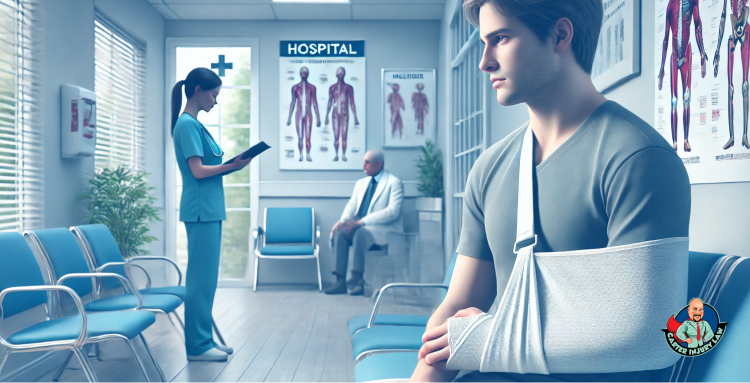
If you didn’t immediately go to the hospital, this is the most important step to take once the dust has settled and you are feeling any pain as a result of the collision. However, you can always call for help from the police and paramedics directly from the scene of an accident. If you are injured, it is important to get treatment within 14 days. To be eligible for PIP compensation in Florida, you must see a doctor within 14 days after the accident. The reality, though, is the sooner the better. The longer you wait to document your injuries, the more likely it is that the insurance company and their attorneys will try to devalue your case by saying that they do not really think you are hurt because you waited too long.
Step 5. Have a Consultation With an Attorney
The aftermath of an uninsured driver's accident can be difficult to handle and confusing. Consult a Florida personal injury attorney that has experience handling these uninsured motorist cases. They can help you navigate the procedure and safeguard your rights successfully.
If you follow these steps, you will increase your chances of success when filing an uninsured motorist claim. Make sure you cooperate with your insurance company and provide them with all of the necessary information and documentation. After that, you may have to negotiate with them. Hopefully, they will deal with the claim fairly and resolve it with you. Unfortunately, that is not the usual experience. Having a knowledgeable and trustworthy attorney on your side may end up getting you a much better result. Insurance companies are not there to look out for you and can even try to trick you into a settlement or action that does not benefit. It truly is best not to go it alone.
What happens when an uninsured driver hits you in Florida?
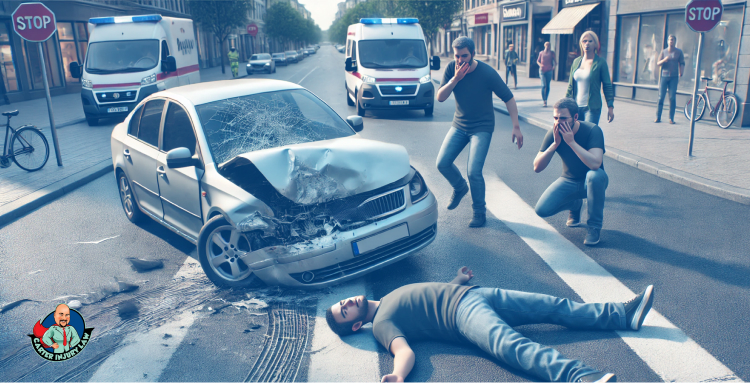
When an uninsured driver hits you in Florida, it is very difficult to collect your damages directly from him or her. Florida is a no-fault automobile accident state, which simply means that your vehicle insurance company should cover 80% of your medical bills, up to a $10,000 maximum (or a $2,500 maximum if you have not experienced an “emergency medical condition.” If the other motorist is at fault, their insurance company would pay the remaining 20%, but they have no bodily injury coverage. This, again, is why it is important to carry coverage that protects you from these people.
What Options Do You Have?
It’s normal to be concerned about not getting compensation for your losses and injuries. Yet, there are some options for you if you are involved in a collision caused by an uninsured driver. The following information can be helpful to get your claim.
PIP insurance. This can be applicable only after you get treatment within 14 days after the accident. This can cover 80% medical cost, 60% lost wages, and $5,000 for death. As stated, the limit of coverage is either $2,500 or $10,000. This insurance covers you, your family, passengers who do not own a vehicle, those who drive your car with authorization and do not have another source of PIP, and sometimes even pedestrians.
Property Damage Liability Coverage. Just because the at-fault driver does not carry bodily injury coverage, they may still have coverage for the damage to your vehicle if they carry this type of liability coverage. This may compensate you for car damage if someone hits your car (like a rear-end collision, for example). The at-fault driver’s insurance company would then pay to repair your vehicle or for its total loss. Florida state law requires at least $10,000.00 in Property Damage Liability coverage.
Body Injury Liability (BI) Coverage. If you or your attorney are able to uncover another source of bodily injury coverage, then that insurance will be responsible for covering your medical bills. This type of insurance also compensates for your pain and suffering. The minimum limit for getting Bodily Injury coverage is $10,000.00 per person/$20,000.00 per accident; however, the State of Florida does not mandate this coverage at all.
Comprehensive coverage. This insurance can help protect your car from damage. But this has to be caused by natural catastrophes, falling items, fire, and so on.
Filing a Legal Lawsuit Against Uninsured Driver
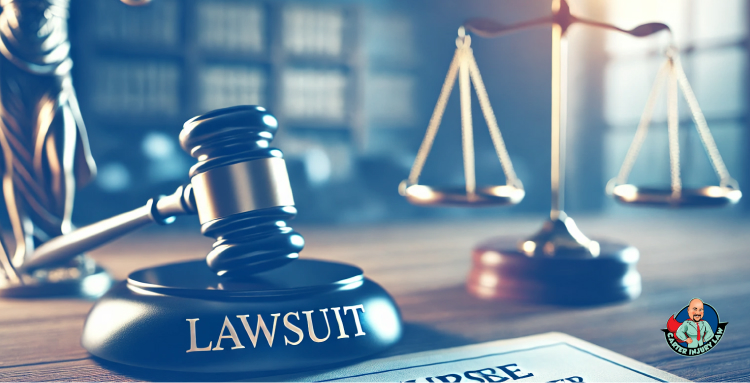
Let’s say your uninsured motorist insurance doesn't properly cover your damages, now what? You can file a personal injury lawsuit against the uninsured, at-fault driver and/or vehicle owner to seek the compensation you deserve. Though it is not always the case, the uninsured motorist in your collision is unlikely to have the financial resources to pay a personal injury award.
There are two ways a personal attorney can help if you decide to seek personal contribution from an at-fault driver. Although, it is very difficult to find a personal injury attorney willing to sue someone without insurance on a contingency fee basis (meaning no payment up front, just a percentage of the award).
First, if you are successful in obtaining a judgment, you can place a lien on the defendant’s property. If the defendant has any assets, you may be able to use that property as collateral to repay for damage owed to you. There are exceptions for homesteads and a small amount of personal property.
Second, you may consider entering into a payment with the defendant. If the defendant has insufficient money to pay you upfront, then you can agree to a weekly or monthly payment or ask the court for an order to garnish the defendant’s wages.
Why Hire Us?
If you have injuries, massive damage that you fear will not be fully covered by insurance, then you should consult our personal injury attorney, David Carter. He will discuss alternative solutions to help you. Every collision with uninsured motorists requires high-quality legal advice and assistance. David Carter and Carter Injury Law can help you in determining what steps you need to take after being hit by an uninsured motorist or involved in a hit-and-run accident.
So, don't go it alone. Contact Carter Injury Law now to set up a free consultation. We have a beautiful location at 3114 N. Boulevard Tampa, Florida where we offer in-person and virtual case evaluations. If you or someone you care about was involved in an accident with an uninsured driver in Florida, call at (813) 922-0228 for a free case review, or send us an email at office@carterinjurylaw.com.

Understanding the Statute of Limitations for Personal Injury Cases in Florida
Let’s say you're driving home from work one day when a reckless driver crashes into your car. You're injured, and the accident turns your life upside down. You decide to sue the at-fault driver for damages, but then you hear about something called the "statute of limitations." What is it, and why does it matter?
In simple terms, the statute of limitations is a legal deadline for filing a lawsuit. It's a ticking clock that starts as soon as the accident happens. If you don't file your lawsuit before the clock runs out, you might lose your chance to get compensation for your injuries.
So, what's the big deal? Well, understanding the statute of limitations is crucial if you've been injured in Florida. It's like knowing the rules of a game before you start playing. If you don't follow the rules, you might end up disqualified.
The Statute of Limitations for Personal Injury Cases in Florida
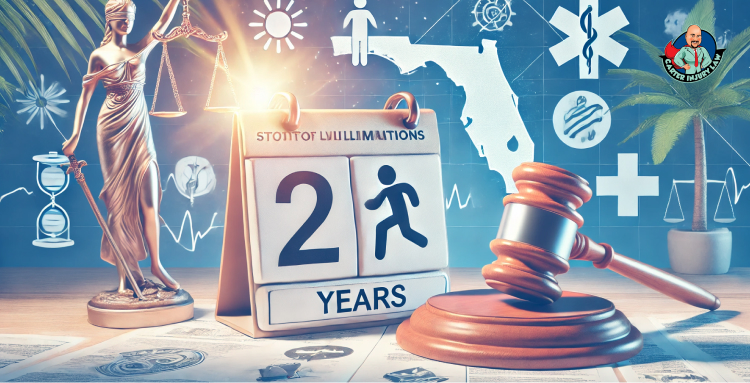
In Florida, the general statute of limitations for most personal injury cases, including slip and fall accidents and medical malpractice, is two years from the date of the accident or injury. This means that the time starts counting as soon as the accident happens.
If you wait more than two years to file your lawsuit, you'll likely lose your chance to get compensation for your injuries. This applies no matter what kind of damages you're seeking, such as medical bills, lost wages, or pain and suffering.
So, if you've been hurt, it's important to talk to a lawyer as soon as possible. They can help you understand your rights and make sure you file your lawsuit on time.
Statute of Limitations for Car Accident Cases in Florida
If you're injured in a car accident in Florida, you generally have two years from the date of the accident to file a lawsuit. This means that the clock starts ticking as soon as the accident happens.
This time limit is the same for most personal injury cases in Florida, including slip-and-fall accidents and medical malpractice. However, some specific rules and exceptions may apply to car accident cases, such as the discovery rule and the tolling of the statute of limitations for minors.
Some important instances to consider:
The two-year time limit applies if you're suing for damages related to injuries or property damage caused by a car accident in Florida. This means you can seek compensation for things like medical bills, lost wages, pain and suffering, or damage to your car.
If someone dies in a car accident in Florida, the time limit for filing a lawsuit is different. In these cases, you generally have two years from the date of death to file a wrongful death lawsuit.
Why Does the Statute of Limitations Matter?

Missing this deadline can have severe consequences, including the following:
Loss of Legal Rights: Once the time limit passes, the courts will typically dismiss your case, and you may lose your right to seek compensation, even if you have a valid claim.
Impact on Settlement: Insurance companies are aware of these deadlines and may be less willing to settle if they know you are close to the statute of limitations running out.
Evidence Degradation: Over time, evidence can be lost, witnesses' memories may fade, and crucial information can become harder to retrieve, making it more challenging to build a strong case.
Why Don’t Attorneys Take Cases Close to the Statute of Limitations?
It’s not uncommon for attorneys to hesitate to take on a case that’s approaching the statute of limitations deadline. There are a few reasons for this:
Time Constraints: Preparing a solid legal case takes time. If the statute of limitations is only days away, the attorney may not have enough time to investigate, gather evidence, interview witnesses, and file the appropriate paperwork.
Potential Legal Pitfalls: Rushing to meet a deadline increases the risk of making mistakes. Attorneys want to ensure they provide the best representation for their clients, and accepting a last-minute case could compromise the quality of their work.
Risk of Dismissal: If a case is filed too close to the deadline, even a minor technicality or mistake in the paperwork could lead to the case being dismissed. Attorneys are cautious because they don’t want to risk harming a client’s chances of success.
Exceptions to the Statute of Limitations: When Do They Apply?
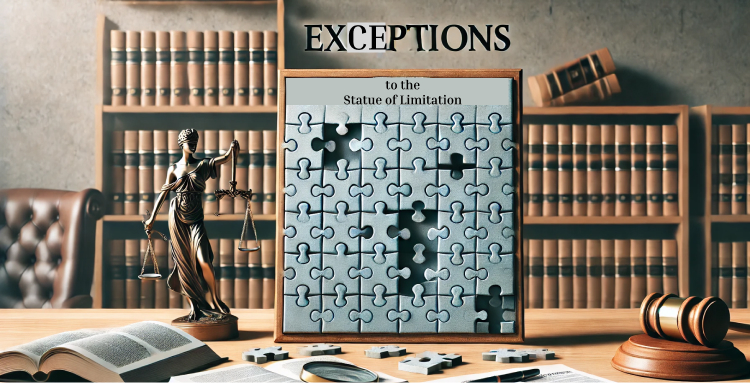
Although the statute of limitations is a strict deadline, there are certain exceptions where the time limit may be extended. These exceptions are rare but can have a significant impact on personal injury cases.
1. The Discovery Rule:
In some cases, the statute of limitations doesn’t begin when the injury occurs but when the injury is discovered. This is particularly common in medical malpractice cases, where the patient may not realize they’ve been harmed until long after the actual procedure or treatment.
For example, if a surgeon leaves a foreign object inside a patient’s body, the statute of limitations might start when the object is discovered, not on the day of the surgery.
2. Wrongful Death Cases:
Wrongful death claims have a shorter statute of limitations—two years from the date of death. However, in some circumstances, this period may be extended. For example, if the cause of death is not immediately apparent or if you suspect any foul play, the statute may be paused until the true reason is discovered.
3. Cases Involving Fraud :
If the defendant intentionally hides evidence or conceals their wrongdoing, the statute of limitations may be "tolled" or paused. This can happen in cases where the responsible party goes to great lengths to avoid detection or liability, making it harder for the injured party to realize they have a claim.
4. Minors or Mentally Incapacitated Individuals:
For individuals who are under the age of 18 or mentally incapacitated at the time of the injury, the statute of limitations may be extended. In these cases, the time may not start until the individual turns 18 or regains mental competency.
Why Do Attorneys Prefer to Take Cases Early?
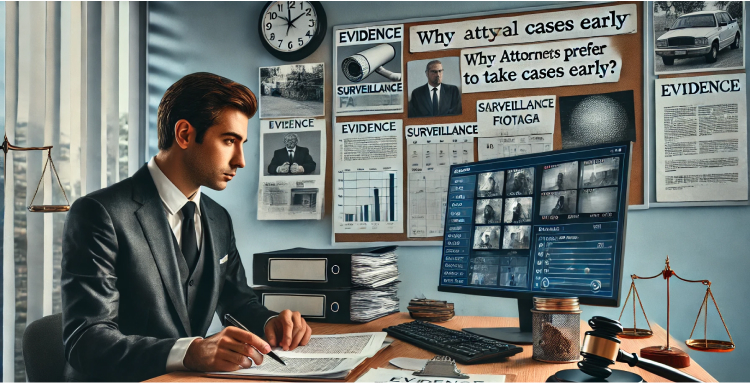
Attorneys often prefer to take cases well before the statute of limitations is near for several important reasons:
Thorough Investigation: The earlier an attorney can get involved, the more time they have to investigate the incident, gather evidence such as police reports, and witness statements, make sure that medical records are documented after the injuries, and build a strong case. Therefore, you get the maximum compensation for your loss.
Securing Evidence: As time passes, evidence may disappear or degrade. By starting early, attorneys can ensure that key pieces of evidence such as surveillance footage, witness testimony, and medical records are collected before they become unavailable.
Client Preparation: Personal injury cases often require clients to undergo medical evaluations, depositions, and other formalities. The more time available, the better prepared both the attorney and the client will be for trial or settlement negotiations.
Maximizing Settlement Opportunities: Insurance companies often take cases more seriously when they are filed well before the deadline. Early filing shows that the attorney is prepared and committed to seeking justice, which can lead to better settlement offers.
Wrapping Up
Understanding the statute of limitations for Florida's personal injury and car accident cases is crucial for anyone seeking compensation. Whether you’re dealing with a four-year limit for most personal injury claims or a shorter two-year period for wrongful death cases, the clock is always ticking.
If you or a loved one has been injured in an accident, it’s recommended that you act quickly. You can contact our expert personal injury attorney here, carterinjurylaw.com. Don’t wait until it’s too late, consulting with an attorney early on ensures that your case has the best chance of success.

How to Maximize Your Car Accident Compensation in Florida
Unfortunately, car accidents have become a common occurrence in Florida. According to a recent report, every year more than 400,000 car accidents happen on the busy roads of Florida. And more than 40% of such accidents lead to injuries. Even if you are careful on the road and follow the traffic rules while driving, car crashes still happen. So, it's clear that driving can be risky in this state.
Individuals involved in car accidents need to know how to reduce their financial burden and ensure a quick recovery. Getting fair compensation helps injured people cover their medical bills, car repairs, and other expenses. So, here are some strategies that would be beneficial to maximize your compensation after a car accident in Florida.
What steps should you take after a car accident?
If you are ever involved in a car accident, you have to understand the actions to be taken immediately. This can help reduce the damages and potential financial recovery after a collision.
Don't leave the scene of the accident. If possible, move your car to a safe position near the road.
Call the police at 911 to file a police report to document the accident.
Seek immediate medical attention from medical providers, including the ambulance and the hospital and/or urgent care. Tell them everything that's hurting you.
After seeking medical help, report the claim to the insurance company.
How can you get compensation after a car accident?
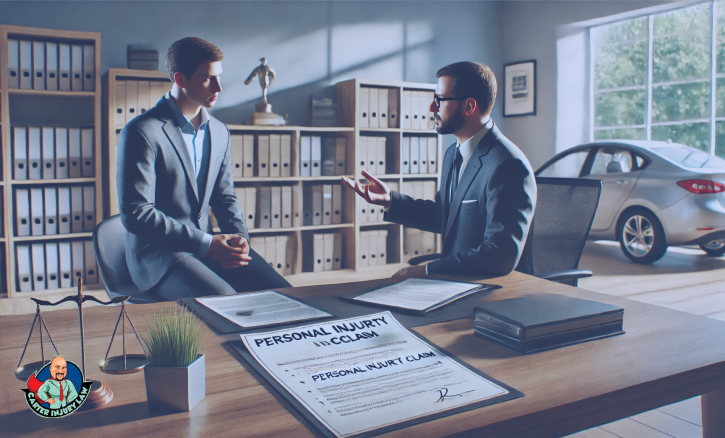
You should follow the steps below to get compensation after a car accident.
Communicating with the insurance companies: You or your attorney has to contact your insurance company. They should cover expenses for medical treatment and potentially other damages. It’s best to have your attorney’s office report the claim or at least have your attorney on the phone when you report the claim. You should not speak with the insurance company for the other driver; your attorney should handle this for you and all communications should go through your attorney’s office.
Hiring an attorney: The auto insurance companies are likely not looking out for you. If they offer you a quick settlement of a few thousand dollars, you should be suspicious. An experienced personal injury attorney can help you determine if they are being reasonable or trying to sneak something by you.
Pursuing a personal injury claim: Even if the insurance company rejects your claim, you can get help by filing a personal injury claim through an attorney's office or on your own.This can include writing demand letters to settle the claim to the at-fault driver’s insurance company as well as your own insurance company. This can also require filing a lawsuit against the at-fault driver and/or your own insurance company.
What compensation does a car accident victim get in Florida?
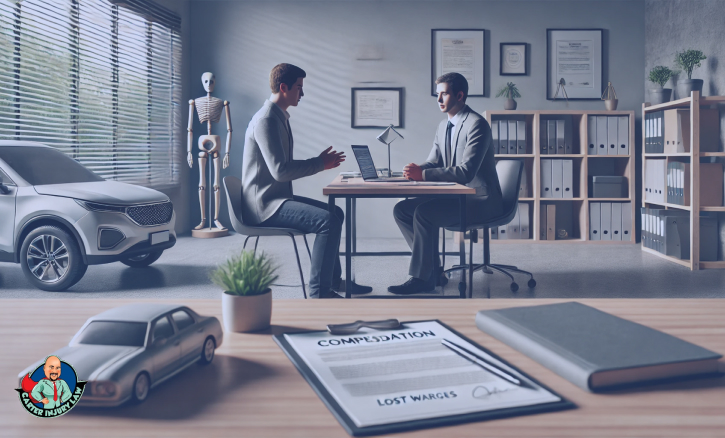
When someone is injured due to a car accident, the victim needs to explore their legal options. This is important to ensure complete compensation for the losses sustained. So, what compensation do they get after a car accident?
Healthcare benefits: This type of compensation covers past and future medical expenses resulting from the accident.
Lost wages: This is the compensation given to injured people for income lost due to injuries.
Damage of property: Damage to a vehicle, whether it is repairable or a total loss, needs to be taken into account. Likewise, children’s car seats, aftermarket add-ons, bicycles, glasses, and other damaged property are all compensable losses.
Pain and suffering: Compensation that is given to compensate for the pain and suffering of the injured person. This can include living in pain and difficulty sleeping at night, and should account for not only past pain and suffering, but also future pain and suffering.
Loss of enjoyment of life: This is compensation that is awarded to an injury victim for their ability to participate in hobbies or activities having been affected by an injury. It can also include the emotional or psychological impact an injury can have on a person’s life.
Mental anguish: Compensation for the mental pain or distress caused by a motor vehicle collision. The National Highway Traffic Safety Administration provides useful information about understanding claims and compensation necessary after a car accident.
How does Florida's no-fault system work for car accident claims?
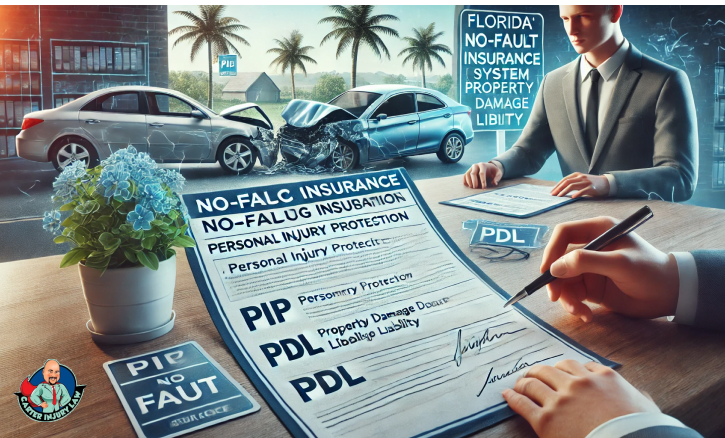
Florida always follows the no-fault insurance system in the case of car accident claims for injuries and damage. According to this no-fault system, after facing a car accident, you must file a claim with your own insurance provider. It does not matter whether you or someone else is responsible for the accident.
Personal Injury Protection (PIP): All the drivers in Florida have PIP insurance, which covers up to $10,000 for medical expenses and lost wages. This system is applicable for all the drivers, it doesn't matter who caused the accident. According to this PIP insurance policy, you will get 80% of medical bills up to $2,500 from the insurance provider. This rule is applicable If you don't have any emergency medical conditions. If someone dies due to the accident they will get up to $5,000 for funeral expenses.
Property Damage Liability (PDL): People who drive in Florida, must also have a PDL insurance. If you are at fault in the accident, the PDL insurance covers the damage to other people's property.
Taking legal action: If the accident left you with a permanent injury, you can take legal action against the person who caused it. This can help you get more compensation than what your PIP insurance provides.
So, what are the benefits and downsides of Florida’s no-fault insurance system?
Florida's no-fault system is specially designed to ensure that everyone gets a certain amount of coverage immediately after an accident. Since Florida is a no-fault state, you can file a claim from your own insurance.
Benefits of no-fault insurance:
You can still get compensation even if the other driver does not have insurance or drives away quickly after the accident.
If you deal with your own insurance provider, the process will be faster.
It can help cover some of your medical expenses and lost wages comparatively faster.
If you have any emergency medical condition, you will get up to $10,000 of compensation.
Drawbacks of no-fault insurance:
It may not cover all your health expenses or lost income.
Your insurance cost may increase after an accident.
The person responsible for the accident may not face any serious consequences as a punishment.
If you don't have a permanent injury, you will not get compensation for pain and suffering or loss of enjoyment of life.
How can you build a strong case to maximise your compensation?
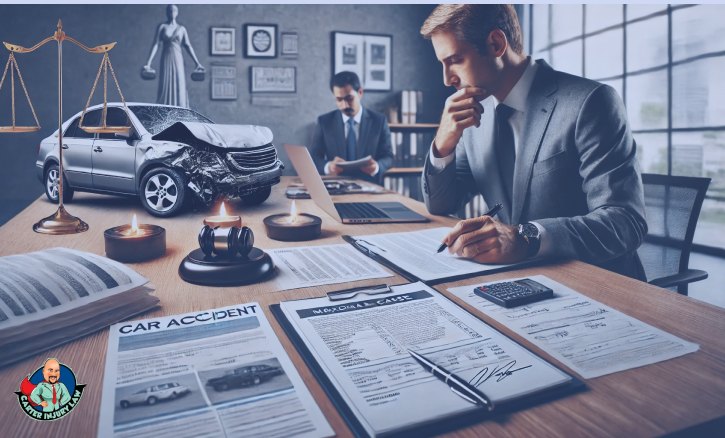
You can build a strong case to receive better compensation by documenting your injuries. So, you have to gather all the documents carefully and submit them to the insurance company. You have to follow some steps to build a powerful case for your claim.
Documenting the medical records and accidents: You need to keep a detailed record of every cost related to the accident. These include medical bills, vehicle repair costs, and other expenses. Keeping the records of each expense will help you prove how the accident affects you financially.
Gathering evidence: You have to collect as much information as possible from the spot right after the accident. Try to take photos and videos of the damage. Besides that, note down the contact information of any witnesses. If the accident occurs due to the fault of another vehicle, record the fault admission statement of the driver.
Maintaining records: Keep track of the record of your pain and the treatment you are going through due to the injury. These documents will demonstrate the ongoing impact of the accident in your life. So, you have to maintain the records carefully to strengthen your claim.
Bonus tip: Never share the accident details with others. Try to avoid admitting faults to them as well, because these can have a detrimental effect on your case.
What factors should you look at when hiring an attorney?
If you want to get fairly compensated for your injury, you need to consult with an experienced personal injury attorney. Make sure that you hire an attorney or consult with an attorney who knows personal injury claims. Look for an attorney who communicates with you from time to time and evaluates your case fairly. If they are not communicative to you, they won't understand your situation, and what you are going through.
How can an experienced attorney help you get fair compensation?
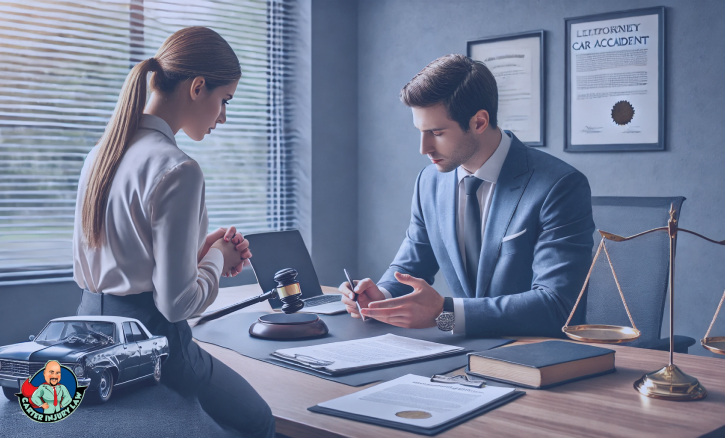
Consulting with an attorney can help you get fair compensation and make the legal process easier for you. A car accident attorney who has expertise in personal injury claims can help you in many ways:
Getting more money: An attorney understands how to fight for the best compensation after a car accident for your injuries and damages. Studies show that those who consult with an attorney, get around 3.5 times more money than people without legal help.
Investigating the accident: Your attorney can help you collect the necessary evidence like medical records, witness statements, and police reports. He can support your case by investigating the accident and collecting the documents.
Dealing with insurance companies: Attorneys know how to negotiate with the insurance providers for your case. They work their best to help you get the fair settlement and the best compensation that you deserve.
Representing you in court: If the insurance company does not provide you with the right settlement, your attorney can represent you at court. As a consequence, you can easily fight for your compensation.
Ensuring high settlement: An attorney will try to ensure that you are fully compensated with future healthcare costs and other expenses. Since they understand the legal steps properly, they will help you avoid accepting a low settlement.
Protecting your rights: They can help protect your rights and make sure that the insurance providers do not reject your claim.
Starting a lawsuit process: Sometimes car accidents can take place due to an intentional attack or careless driving. This type of wrongful act may cause serious harm or death. Attorneys can help you take legal steps in such situations.
Wrapping up
By following some of the steps we have given you here, you can maximize your compensation from a car accident. Still, if you have any queries, you can leave a comment. We will reach out to you at the earliest possible time. Don't forget to share this informative discussion with others, who are concerned about maximizing their compensation after getting injured. If you face any kind of problem about getting money after having a car accident, share your story with us.

Can I Switch My Car Insurance Company During a Personal Injury Case?
One of the most frequent questions we hear is, 'Can I switch my car insurance company while my personal injury case is ongoing?' The short answer is yes, you can. You have the flexibility to change your insurance provider at any time.
Even if you switch companies, your previous insurer is still obligated to handle your claim as long as your policy was active when the accident occurred.
People normally want to change their insurance company for 3 main reasons:
You are frustrated with poor communication or service from your insurance adjuster during a property damage claim.
You find better coverage or a more reputable claims handling process with another insurance company after consulting with a personal injury attorney.
You cancel your policy after an accident because you no longer own the vehicle or asset that was covered.
If you want to change your current insurance company because of these reasons or for any reason, yes you can change. But before switching there are some important things you have to keep in mind:-
Key Considerations When Switching Insurance Companies
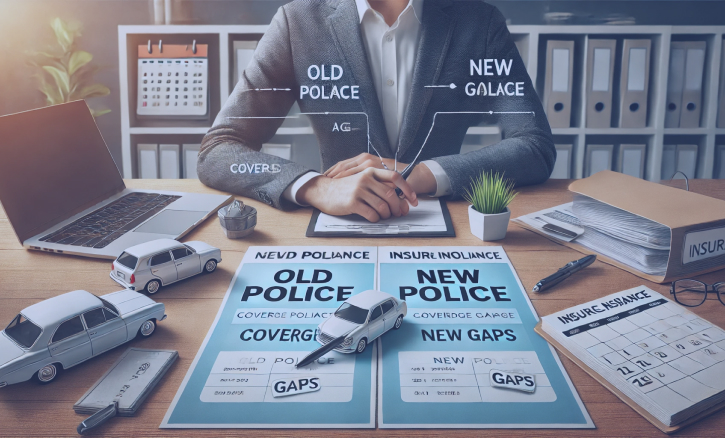
There are a few things to think about when you do it. Here is what you need to consider-
Coverage on the Day of the Accident
You switched insurance companies the next day, your previous insurer still has to cover you for that accident because you had coverage on the date of the accident.
Challenges with Open Claims
Nevertheless, there are challenges to consider when seeking a new insurance company. If you have an open claim with your current provider, it might be challenging to find a new insurer. Therefore, it is crucial not to drop or cancel your current insurance company before you find and secure a new insurance company.
Gap in Coverage
One crucial point to keep in mind – Is there any gap in coverage between the two plans? If there is a gap, the new insurance company may see you as a higher risk during underwriting. Because this coverage gap means you have been uninsured for a period of time.
Let's say you are driving uninsured during this gap. What would happen? Definitely, you would be breaching the law as your car is not insured. If there is any accident, you will be liable for any damage to your vehicle and may face legal repercussions.
So how can you avoid this from happening? When you go shopping with these new insurance companies, make sure to check if their rates are reasonable. Also, ensure that the new coverage is similar to your current one. Most importantly, bind and secure the new policy before dropping the previous one.
This is how you can get a new insurance policy, and cancel your old one. Also, you will not be considered an uninsured one.
Switching Insurance Providers – How it Impacts Discounts and Claims Processing
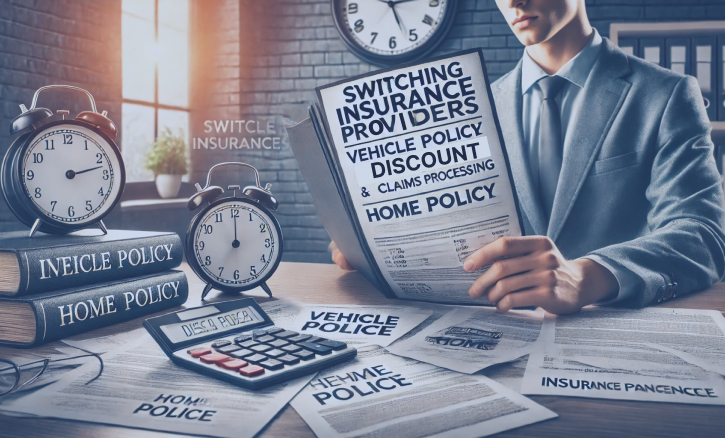
Before binding a new policy, it is crucial to investigate thoroughly. If you combine your vehicle and home coverage with the same provider, you may qualify for discounts on both policies. However, if you discontinue your car coverage, you might lose these discounts and end up paying more for your home insurance.
As long as your policy was active at the time of the accident, switching insurance providers will not affect your claim. Your new insurance company will take responsibility for covering your claim, and your previous insurer will be relieved of any future obligations.
However, it is important to note that switching insurance companies may cause delays in the claims process. The new insurance company must first assess the accident and the current claim before accepting it. This process can take some time, potentially delaying the receipt of the funds you are entitled to.
Insurance Rates – What Happens When You Switch
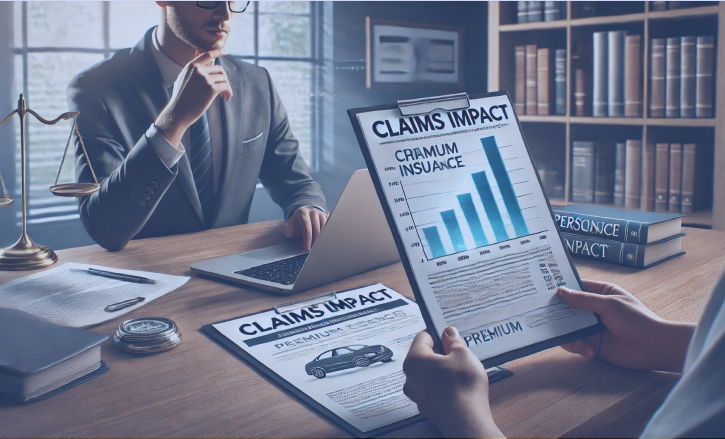
Many individuals are concerned about whether their insurance premiums will increase or if their insurance company will retaliate against them for filing a claim. It is important to understand that insurance companies are regulated entities and must adhere to specific guidelines and laws. While it is possible for premiums to rise after a claim, this is typically based on risk assessment and claims history rather than any form of retaliation.
For example, if you are not at fault for an accident and have only filed one claim in five years, your rates may not increase because you are not considered a high-risk individual. In this case, the company may not raise your rates if you are already being charged market value.
However, if you have filed multiple claims in a short period, such as five claims in the past three years, or are found at fault for an accident, your insurer is more likely to raise your rates due to the higher risk. Accidents that result in points on your license also typically lead to higher premiums.
Consulting a Personal Injury Attorney
Even if you are not at fault for an accident, it is important to consult with an attorney to ensure you are fully and fairly protected. If you have been in an accident and are considering switching insurance companies, you are entitled to do so, but it is crucial to understand the implications. Be sure there are no gaps in coverage, and consider the potential impact on your claim.
If you have any questions or concerns regarding car accident claims or personal injury cases, contact Carter, a personal injury attorney. You can reach him at (813) 922-0228. He will guide you through the process, helping you avoid pitfalls and keep your insurance rates from skyrocketing.

